Annual Report
2024/2025
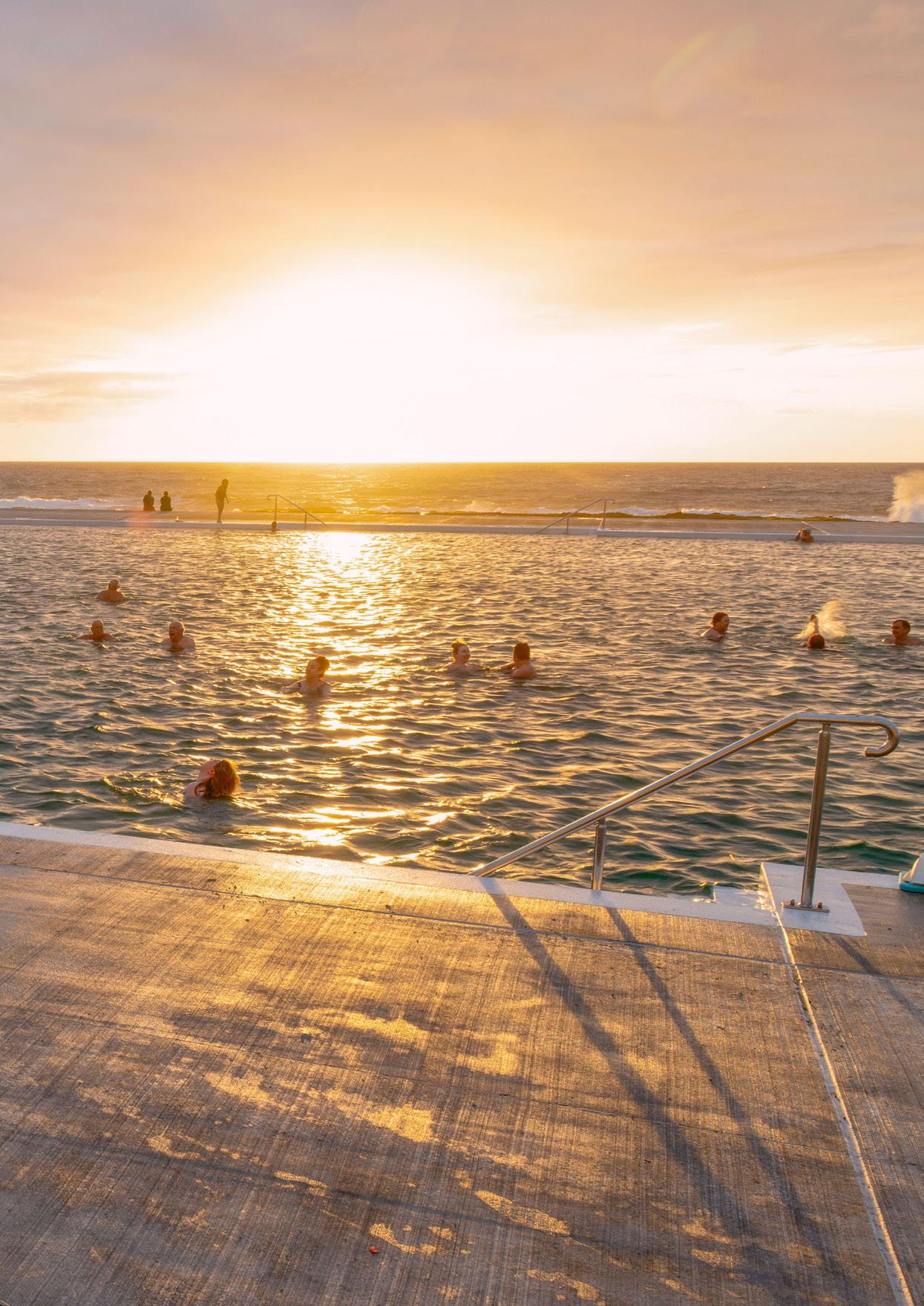
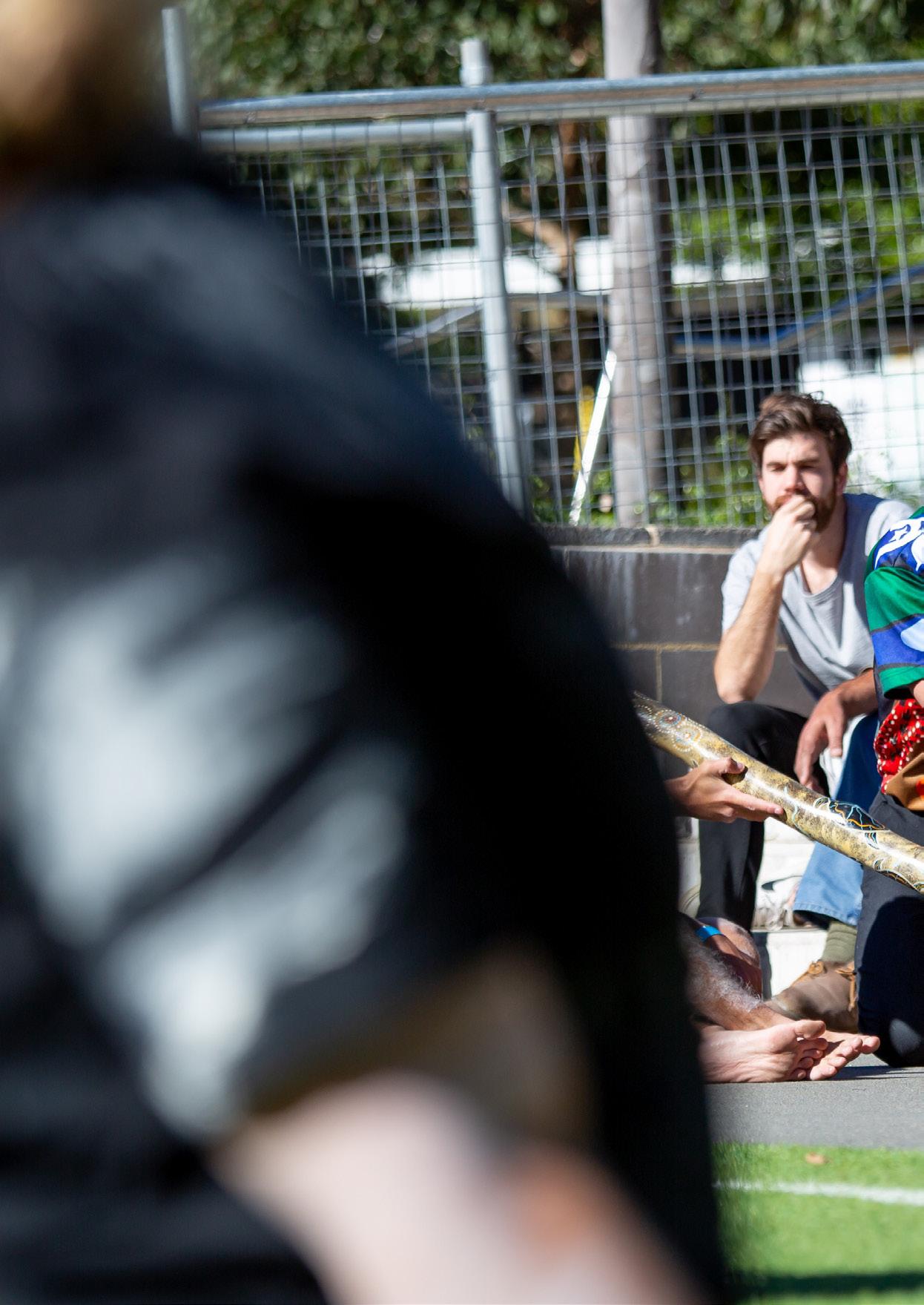

2024/2025


The City of Newcastle (CN) acknowledges the Traditional Custodians of the Local Government Area (LGA). We acknowledge that Country for Aboriginal peoples is an interconnected set of ancient relationships. We acknowledge the custodianship of the Traditional Custodians of this land and the care and stewardship they have performed in this place since time immemorial.
'Wunyibu wunyibu warra wunyibu wunyibu gkuuba Aboriginal burrai.' Always was, always will be Aboriginal land.
In recognition of Aboriginal cultural heritage, eight Newcastle landmarks are officially dual-named with their traditional Aboriginal names. These are based on Aboriginal references to the landmarks documented in maps, sketches and geological descriptions dating back as early as 1798:
• Nobbys Head – Whibayganba
• Flagstaff Hill – Tahlbihn
• Pirate Point – Burrabihngarn
Port Hunter – Yohaaba
• Hunter River (South Channel) – Coquun
• Shepherds Hill – Khanterin
• Ironbark Creek – Toohrnbing
• Hexham Swamp – Burraghihnbihng

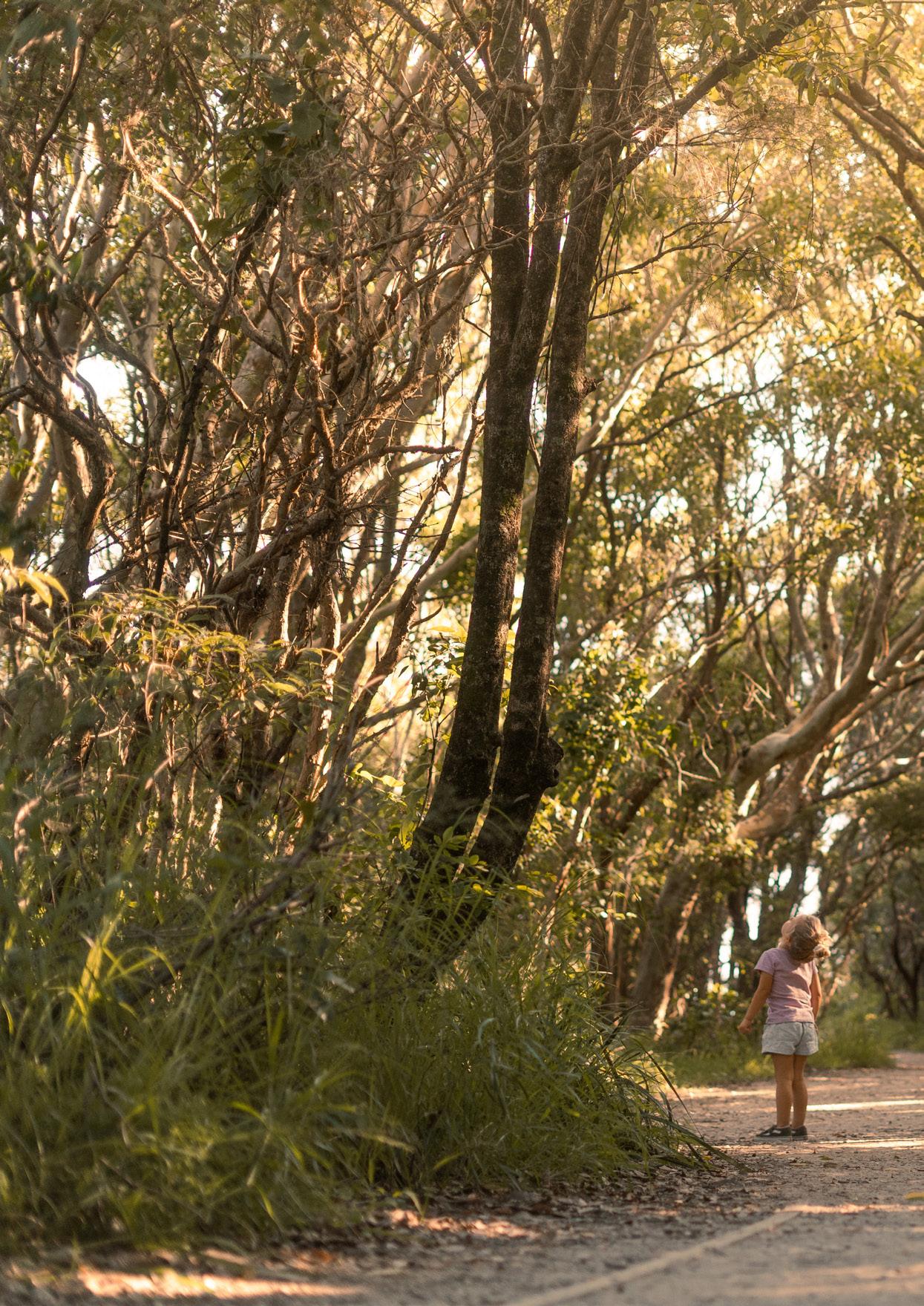
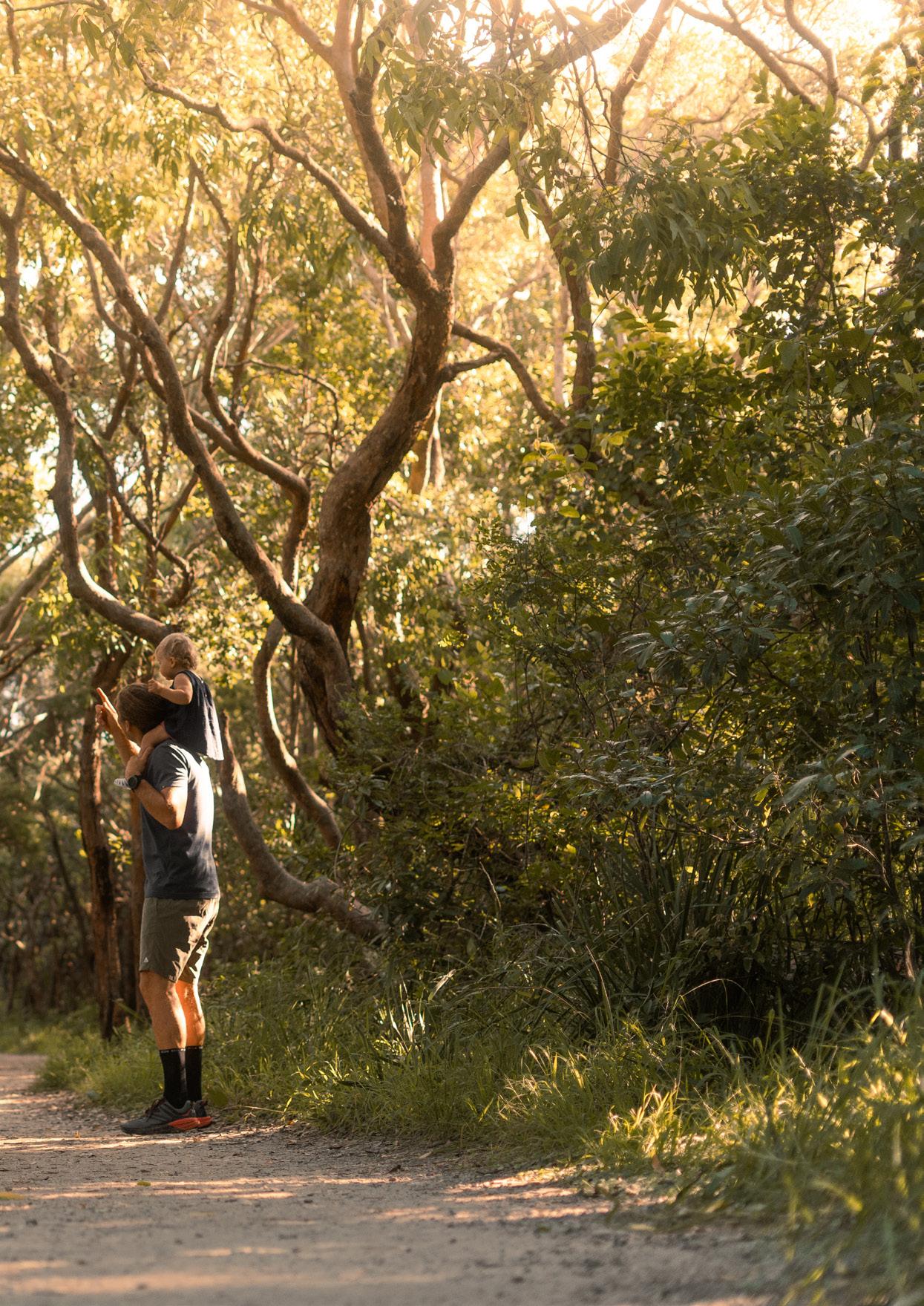
This is CN’s report to the Newcastle community on our performance during the 2024/2025 financial year.
The Annual Report is one of the ways we stay accountable to our community. It provides a clear picture of how CN is delivering on the priorities and goals we’ve set together. Prepared in line with Section 428 of the Local Government Act 1993 and the Office of Local Government (OLG)’s Integrated Planning and Reporting (IP&R) Guidelines, it ensures transparency in how we operate and invest in our city.
The report outlines CN’s financial and operational performance over the past year, showing how we’re progressing against the key themes and objectives in our strategic planning documents, including the Newcastle 2040 Community Strategic Plan (CSP), Delivering Newcastle 2040 Delivery Program and Operational Plan 2024–2025, and Budget. These plans reflect our shared vision and guide the work we do every day.
Importantly, this report also reflects the priorities our community identified during the development and review of Newcastle 2040. It is structured around four key themes – Liveable, Sustainable, Creative and Achieving Together – which emerged through extensive engagement and continue to shape our direction.
This report covers seven sections:
• Introduction
Introduces our city and organisation, outlining CN’s guiding principles and strategic direction.
This section also includes reflections from the Deputy Lord Mayor and CEO on the year’s highlights and future priorities.
• Our Year in Review
Summarises the key achievements and milestones of the year, including major events, infrastructure projects, grants and sponsorships, and community engagement activities.
• Our Performance
Details our progress against strategic goals, focusing on initiatives and legislative requirements under the four themes of Liveability, Sustainability, Creativity and Achieving Together.
• Our Organisation
Provides an overview of CN’s structure and functions, including information about the elected Council, executive leadership, services delivered and workforce statistics.
• Our Governance
Explains CN’s governance framework, including council operations, corporate policies, risk management practices and compliance with legislative requirements.
• Our Financial Information
Presents CN’s financial performance for the year, including audited financial statements, asset management and key financial summaries.
• Appendices
Contains supporting information such as a glossary of terms and a legislative checklist.
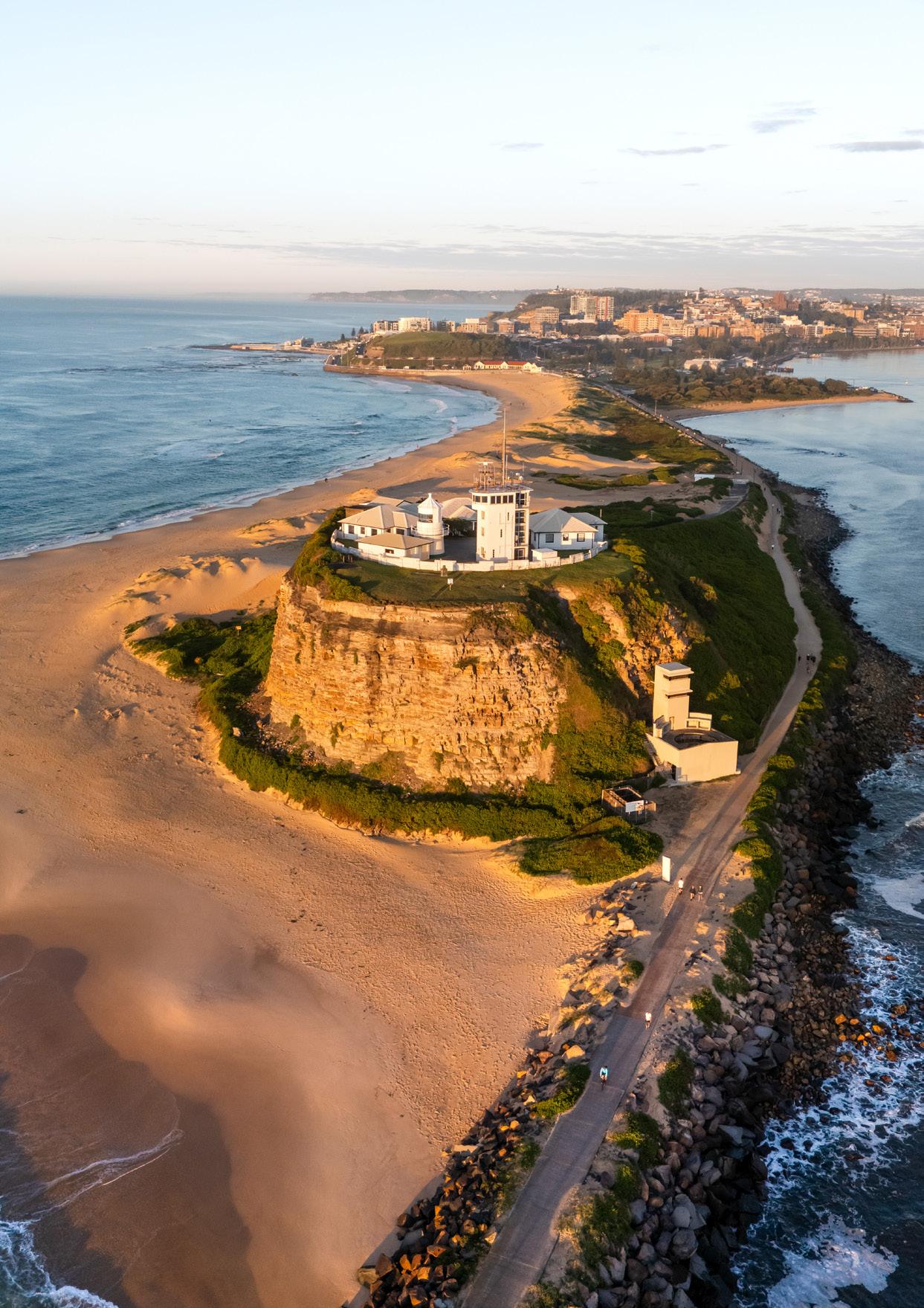

Newcastle is a resilient and proud city, shaped by its rich Aboriginal heritage, industrial legacy and strong community spirit. Located around 160km north of Sydney, it is Australia’s seventh-largest city and the heart of the Hunter Region – a major economic, cultural and innovation hub in New South Wales.
The local Aboriginal peoples are the Traditional Custodians of the land, sky and waters of Newcastle and have cared for this land for thousands of years. Their enduring connection to Country continues to enrich the city’s identity today.
Newcastle has evolved from its early days as a penal colony and coal port into a diverse, dynamic city. While our industrial roots remain important, our economy now spans health, education, research, tourism, the arts and professional services. We are home to the University of Newcastle (UoN), the John Hunter Hospital, and leading research institutions including CSIRO Energy and the Hunter Medical Research Institute (HMRI).
Our natural environment is one of our greatest assets – from iconic beaches and coastal headlands to wetlands, bushland and rainforest gullies. Our suburbs are equally diverse, ranging from heritage precincts to new, growing communities.
Newcastle is also the cultural heart of the region, with a thriving creative scene, major institutions like Newcastle Art Gallery and Civic Theatre, and a year-round calendar of events. As the gateway to the Hunter’s resources and lifestyle, Newcastle continues to grow as a liveable, sustainable and inclusive global city.
ABS estimated resident population 2024 176,860
Population by 2046 205,445
Greater Newcastle population 2021 604,115
Population by 2041 773,825
Estimated annual population growth rate 0.77%
0-4yrs 5.2% 5-11yrs 7.8% 12-17yrs 6.3%
18-24yrs 11.2%
Planning NSW Population Projections, forecast.id
Median age
Newcastle 37
NSW 39
Aboriginal and Torres Strait Islander population
Newcastle 4.4% NSW 3.4%
Born overseas
Newcastle 15% NSW 29%
Speak a language other than English
Newcastle 11% NSW 27%
134 different languages spoken at home – most widely spoken include Mandarin, Macedonian, Italian, Greek and Arabic. Languages spoken with greatest need for translation include Arabic, Mandarin, Swahili, Persian/Dari and Tibetan.

I’m pleased to present City of Newcastle’s (CN’s) Annual Report for the financial year ending 30 June 2025.
This report highlights our achievements during the past year and reaffirms our commitment to the Newcastle 2040 Community Strategic Plan - our long-term vision for a liveable, sustainable and inclusive global city.
We remained focused on delivering core services, progressing citywide initiatives and strengthening our financial foundations.
This year, CN delivered key programs and infrastructure that strengthened our community’s connection to nature and advanced our climate goals. More than 1,500 residents participated in the Empowering Newcastle event series, which explored electrification, renewable energy and climate resilience. We also launched our first Climate Champions training program, certifying 50 locals who developed over 30 community-led net-zero projects.
Our public EV charging network tripled in size with 34 new ports installed across 11 sites, all powered by 100% renewable energy and co-funded by the NSW Government.
At Blackbutt Reserve, we opened a $3.2 million multipurpose facility and café, creating a new hub for environmental education and community events. These initiatives reflect our commitment to building a sustainable, inclusive and future-ready Newcastle.
Engaging with our community
We deepened community connections through inclusive engagement, strategic planning and awareness initiatives. CN hosted stalls at major events, including the Hunter Disability Expo, Seniors Week and the Multicultural Services Expo, expanding in-person outreach.
Our Summer Discovery – Natural Connection Program engaged thousands of families in nature-based learning across city venues, fostering environmental awareness and celebrating the cultural ties of our Traditional Custodians to the coastline.
In conclusion
This Annual Report reflects a year of dedication and progress for our city. While the Lord Mayor, Dr Ross Kerridge, has temporarily stepped down to focus on his health, our thoughts remain with him and his family during this time.
As Deputy Lord Mayor, I am honoured to step into this role and continue leading a Council united in its commitment to civic leadership and community service. I thank my fellow councillors, CEO Jeremy Bath, the executive leadership team and all CN staff for their professionalism and dedication. Your work continues to shape a vibrant, inclusive and sustainable future for Newcastle.
Together, we will build on our progress, support one another, and embrace the opportunities ahead for our community.

Cr Charlotte McCabe Deputy Lord Mayor
At the time of finalising our Annual Report, Dr Ross Kerridge had stepped down from his role as Lord Mayor to receive medical treatment. We hope to welcome him back in early 2026.

This year’s Annual Report is dedicated to the memory of Sinead Francis-Coan. On 23 June 2025, Sinead passed away in her sleep following a brief illness. Sinead was elected at the September 2024 election as a Ward 3 councillor on behalf of the Newcastle Greens. She leaves behind a proud but devastated family and a community grateful for a lifetime of advocacy for social justice. Despite only serving on Council for nine months, Sinead secured many achievements on behalf of her two passions; people and the planet. I will always be grateful for the countless hours Sinead spent helping staff and I to better understand our community.
CN delivered 165 of 167 actions in Delivering Newcastle 2040, continuing our strong track record of achievement over the past decade. The remaining two actions are well progressed and will carry into next year. For details, see pages 24-27 and 88-163.
This year we recorded a third consecutive surplus of $8.7 million. Evidence of the enormity of this achievement, CN was the only council in the Greater Newcastle region to deliver a balanced budget. Infrastructure delivery also reached $164.1 million, our highest infrastructure spend in a single financial year.
In December 2024, Council commissioned an independent review of CN’s operations for the past three years.
A comprehensive review led by Davidson Business Advisory and overseen by the Audit, Risk and Improvement Committee assessed six core areas and drew over 800 public submissions. It confirmed that CN is well-managed, financially sound, and professionally governed. All 20 recommendations will be implemented within 18 months. I sincerely thank our staff for their dedication and professionalism in supporting this significant project.
We continue to deliver projects that enhance Newcastle’s cultural, environmental and recreational assets.
At Astra Street, we completed a major remediation project of the former landfill site, protecting nearby wetlands and enabling future community use. In 2026 we will reveal the exciting news of how we intend to make use of this newly recovered space.
The Bathers Way coastal pathway took a major step forward with the South Newcastle Beach upgrade, delivering new pedestrian and cycle links, a skate bowl, and vibrant public spaces. With final stages at King Edward Park and Memorial Drive in design, the full 6km route will soon offer continuous, accessible coastal access.
Construction has begun on the Foreshore Park inclusive playground and waterpark, a landmark regional playspace set to open in late 2026. We welcomed $16.7 million in Federal funding to accelerate the East End Village revitalisation, including upgrades to Hunter Street and Cathedral Park. Design for Stage 2 of the Newcastle Ocean Baths is progressing, with strong community input shaping the restoration of its iconic art deco façade and improved amenities.
Thank you
I thank the remarkable CN team for their dedication to serving the community. I also thank both the previous Council as well as the newly elected Council for their belief in our staff. Their ability to distil the noise and ensure that their decisions are pragmatic and evidence based is greatly appreciated. Together, we continue to build a city that is inclusive, sustainable and future-focused.

Jeremy Bath Chief Executive Officer
Our vision
In 2040, Newcastle will be a liveable, sustainable, inclusive global city.
This vision, shaped through extensive community engagement, was adopted in the Newcastle 2040 CSP in April 2022. It reflects the aspirations of our community and guides CN’s long-term planning.
In 2024/2025, we revisited Newcastle 2040 to ensure it still aligns with community priorities. The response was overwhelmingly positive, with 84% of survey participants confirming the vision reflects their hopes for Newcastle’s future.
A place for everyone
Collaboration, Respect, Excellence and Wellbeing (CREW) are the guiding principles that shape the daily actions and conduct of our staff, forming the bedrock of our organisational culture.
In 2025, as part of the development of our Culture Strategy, Living the CN Way, we refreshed our organisational values to better reflect who we are and how we work together. These guiding principles shape how we recruit, recognise, reward and manage performance, ensuring that the behaviours we value are consistently supported and celebrated. After consultation with our people, we made a key shift from Cooperation to Collaboration, as we know our success moving forward lies not just in working side by side, but in actively engaging with others, sharing ideas, co-creating solutions and committing to collective success.
Our culture reflects the shared beliefs, norms and expectations that drive our efforts, shape our interactions and define how we invest our time and energy. It's the essence of how we work together - it's our vibe!
Caring
Who we are
we value
We are Constructive
• Our stories connect us, shaping our culture.
• We are accessible, engaged, visible and transparent with each other and our community.
We strive for a better future by embracing change and working together to achieve challenging, realistic goals.
We are Caring
• We feel safe and accepted. We prioritise the wellbeing of ourselves, peers, customers and community.
• We are thoughtful and supportive in our interactions, fostering an environment of encouragement.
We are Courageous
• We courageously face challenging situations and conversations.
• We build an inclusive 'Speak Up Culture' where feedback is encouraged, embracing diversity and promoting ethical behaviour.
• We view mistakes as opportunities for growth and learning.
Employees Central to the success of our organisation by providing valued knowledge, skills and labour
Customers Provide us with feedback and utilise our services and products
Community groups and volunteers
Build trust and connections with local communities through these services
Government Provide funding opportunities, guidance through regulation and legislation, services, planning direction and networks
Partners Provide shared knowledge, networks, cultural experiences and economies of scale
Ratepayers Provide funding for local services and infrastructure; provide guidance, values, engagement and feedback
Businesses Build capacity, create vibrancy and drive our city’s economy
Media Build and protect reputation and raise awareness of events, services and facilities
Residents Provide guidance, values, engagement and feedback
Provide a fair, engaging and enriched work experience with career development and flexible work arrangements
Provide products and services of good value and quality
One Place (intranet), briefings, meetings, surveys, emails, NovoNews (newsletter), interviews and exit interviews
Customer service centre, customer experience and satisfaction measures, follow-ups, website, publications, fact sheets
Provide support and partnerships
Provide local strategies, partnerships and networks
Provide advocacy, leadership, cultural vibrancy and resources in line with policy and legislation
Generate sustainable growth and returns to the community
Provide opportunities for business and promote activities to enhance businesses
Provide trend data on social, environmental, economic and governance information
Provide civic leadership representation, services and facilities
Focus groups, committees and training
Formal meetings, briefings and networking meetings, correspondence and events, legislative reporting and 1:1 meetings
Contract management, account management relationships, networking meetings and regular engagement through site visits
Rates notices, community meetings, surveys, publications, website and annual report
Focus groups and workshops, publications, website, social media, annual report and surveys
Media releases, briefings, interviews and social media
Public meetings, publications, website, social media, annual report, surveys, public exhibitions, community consultations and feedback sessions
Visitors Provide economic benefits by visiting, shopping and studying; generate employment opportunities and financial viability
Suppliers Provide products and services of good value and quality
Provide products, services and facilities
Provide fair access to business opportunities in line with policy and legislation
Website, social media and other published information, and the Visitor Information Centre
Contract management and account management relationships
In September 2015, Australia, alongside 192 nations, committed to the United Nations (UN) Sustainable Development Goals (SDGs), which aim to enhance global conditions for current and future generations.
The 2023 SDG Summit reinforced the urgency of accelerating progress towards the 2030 Agenda. As part of the UN’s Decade of Action, CN is committed to driving transformative change and fostering a liveable, sustainable, inclusive global city.
CN has embedded the SDGs into its long-term vision through Newcastle 2040. Achieving these goals requires strong partnerships across government, business and community sectors. CN continues to lead regionally, contributing to SDG initiatives and reaffirming its commitment through its second Communication on Engagement with the UN Global Compact in 2023.
CN is proud to support the Hunter Regional Taskforce’s Voluntary Local Review, which promotes SDG awareness and encourages collaboration across sectors. Two areas of focus identified by the Taskforce for the local region are climate change and inequality. The SDGs are now a core part of CN’s policy, planning and service delivery.
Together, we can build a better Newcastle and contribute to a better world.
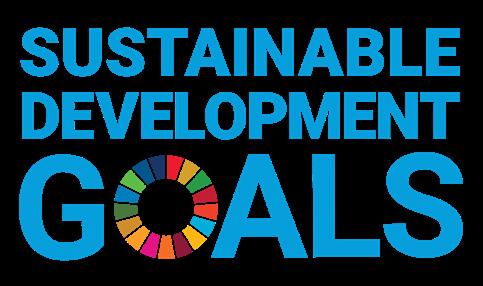
CN supports the Sustainable Development Goals
The table below illustrates some key initiatives undertaken by CN during the 2024/2025 financial year that supported progress in the achievement of the SDGs.
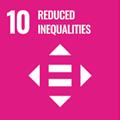
Count Us In Sport: Promoted disability inclusion through five key events, 1,000+ participants and engagement with 90+ sporting groups.
Neighbourly Newy: Celebrated diversity and welcomed refugees through cultural events, education and conflict resolution training.
Seniors Festival: Delivered 65+ events city-wide to promote healthy ageing, connection and access to services for older residents.
Jesmond Neighbourhood Centre activation: Increased community use, supported culturally diverse programs and strengthened partnerships through onsite staffing and incentives.
Homelessness response: Implemented compassionate staff guidelines and training for engaging with people experiencing homelessness; participated in NSW Street Count.
Community Services sector support: Hosted four Interagency Network meetings, distributed 24 sector newsletters, and partnered in early intervention initiatives for children and youth.
Affordable Housing Contributions Scheme: Introduced a structured mechanism for collecting developer contributions to fund affordable housing for low- to moderate-income households.
Rail Bridge Row project: Progressed a mixed-use development on CN-owned land to deliver 30+ affordable housing units, setting a precedent for local government-led housing solutions.
Youth Mock Council: Gave students from seven Newcastle schools a real voice in local government, making civic participation more accessible and inclusive.
SUSTAINABLE CITIES AND COMMUNITIES
Goal 11 –Sustainable Cities and Communities
Waste management: Advanced municipal solid waste management through CN’s Sustainable Waste Strategy
Planting: Added 31,086 plants as part of urban forest expansion program to enhance urban biodiversity and liveability.
National Tree Day: Engaged 420 community members, including students, in planting 7,500 native plants and restoring wetland habitat at Tarro Recreation Reserve.
Natural Connection Program: Delivered nature-based learning through school holiday programs, exhibitions and workshops across cultural venues, fostering environmental awareness and connection to place, attracting over 750 participants.
Textile recycling event: Partnered with BlockTexx to divert 4,471kg of household linen from landfill, supporting circular economy goals.
Summerhill kids’ tours: Educated children and families on waste minimisation and recycling through interactive behind-the-scenes tours of Summerhill Waste Management Centre.
Goal 13 –
Renewable energy leadership: Operations powered by 100% renewable electricity since 2019.
Climate Action Plan: Guides emissions reduction initiatives for CN operations and the Newcastle LGA.
Empowering Newcastle program: Engaged 1,500+ residents in events and launched Go Electric Action Plans and Home Energy Kits to support household electrification and energy efficiency.
Empowering climate champions: Trained 50+ residents through a UN-certified program to lead local climate action projects.
Youth Climate Action Fund: Awarded $207,511 for 30 youth-led climate projects, supporting initiatives in clean energy, sustainable fashion and climate resilience.
EV charging network expansion: Installed 34 new EV charging ports across 11 locations, tripling this infrastructure and supporting low-emissions transport.










The IP&R framework serves as a comprehensive planning and reporting system for CN, helping to align plans and efforts towards a common vision for the community’s future. The framework involves the following key components:
• Community Strategic Plan (10+ years): Newcastle 2040 is the highest-level plan that CN prepares. Its purpose is to identify the community’s main priorities and aspirations for the future and to plan strategies for achieving these goals. Newcastle 2040 guides all other CN strategies and plans and must be developed with and on behalf of the community.
To formulate Newcastle 2040, we received approximately 5,000 pieces of feedback from the community between 2019–2021. Legislation dictates that we review and consider updating Newcastle 2040 in the year following a council election.
The 2024/2025 revised version of Newcastle 2040 reflects further engagement to ensure that we have outlined our key directions and actions successfully, and that we are on track to achieve our goals for a liveable, sustainable, inclusive global city.
• Delivery Program (4 years): The Delivery Program is a four-year plan that specifies actions and ongoing activities to achieve the objectives outlined in Newcastle 2040. It serves as a bridge between our long-term vision and short-term operational planning.
• Operational Plan (one year): The Operational Plan, which corresponds to the 2024/2025 period, details the specific actions, services and projects CN will undertake during the year. It is part of the broader four-year Delivery Program and is reviewed annually to ensure alignment with the community’s long-term goals. Together, the Delivery Program and the Operational Plan are referred to as Delivering Newcastle 2040
In addition to these plans, CN is also required to have a 10-year Resourcing Strategy, which includes a Long-Term Financial Plan, Asset Management Plan and Workforce Management Plan. These plans are essential for ensuring that resources are effectively managed to support CN’s objectives, and were each unanimously adopted by the Council in June 2025.
The IP&R framework prioritises community engagement and regular review to ensure that plans remain relevant and responsive to present and future needs. It provides a structured approach for CN to advocate for the community’s vision and guide its actions and investments accordingly.
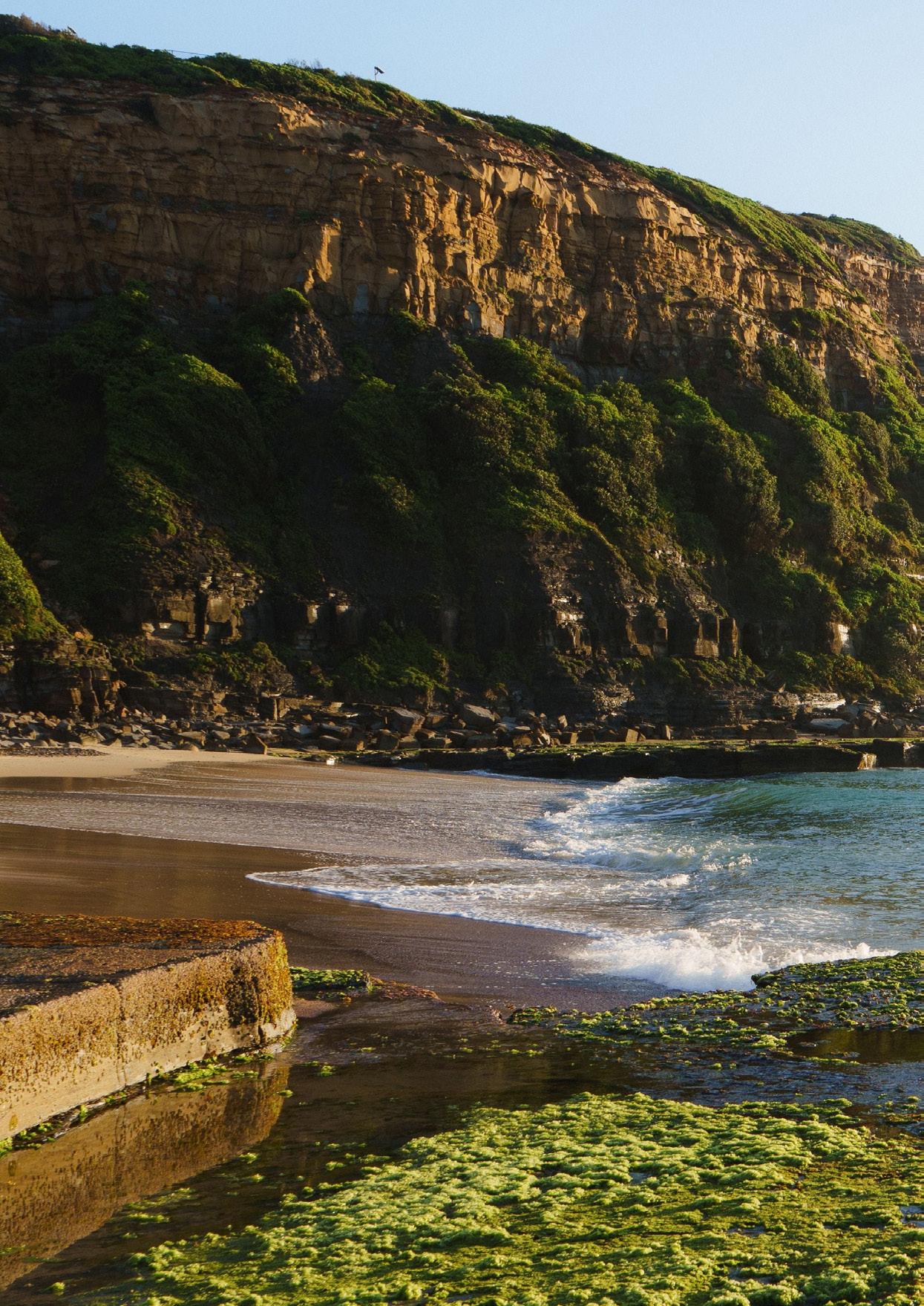

In 2024/2025, we delivered a wide range of projects and initiatives aimed at improving the lives of everyone in our community. From major infrastructure upgrades to local programs and services, our work focused on creating a more liveable, sustainable and inclusive global city.
Our progress was measured against the goals set out in the Newcastle 2040 CSP, supported by the Delivery Program and Operational Plan 2024–2025. Across 42 strategic objectives, 167 one-year actions and 61 performance indicators, we tracked how well we’re delivering on the community’s priorities.
This year also marks the conclusion of the 2022–2026 Delivery Program, with the new 2025–2029 Delivery Program unanimously adopted by Council in June 2025, following the election of a new Council in September 2024. This transition sets the stage for the next phase of delivering on our community’s vision for Newcastle.
Total actions
Actions completed or on track: 165
Total measures
Expenditure by N2040 themes
Measures completed or on track: 36
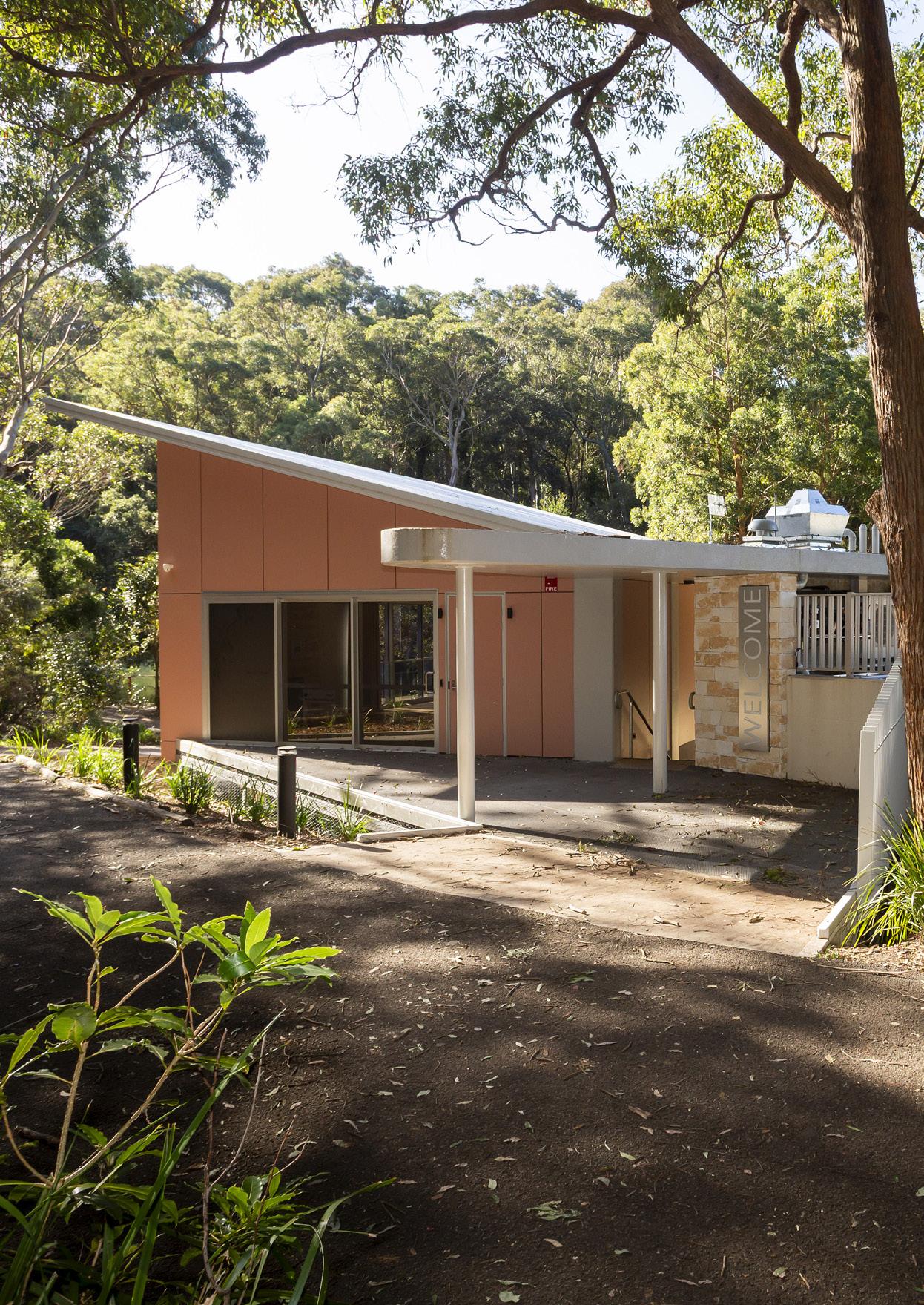
Total actions: 65 100%
Actions completed or on track: 65
Total measures: 20 50%
Measures completed or on track: 10
Cycling and Pedestrian Network More than $9 million was invested in new shared paths, crossings and safety upgrades across key locations including Maud Street, Mayfield; Islington; Jesmond; and Adamstown. These projects improve safety and connectivity for pedestrians and cyclists, supporting active transport across the city.
Coastal Buildings Revitalisation Plan CN launched a first-of-its-kind plan in NSW to guide the future of coastal infrastructure from Stockton to Merewether. Extensive community engagement is shaping the strategy to ensure upgrades reflect local values and long-term sustainability goals.
Broadmeadow Place Strategy The Broadmeadow Place Strategy was adopted in March 2025 following two years of planning and engagement. It sets a long-term vision for one of Newcastle’s key growth areas, with a focus on infrastructure, heritage and community outcomes.
Lambton Park Café A $1 million upgrade will transform the historic Lambton Park building into a modern, accessible café with a commercial kitchen, deck and inclusive design, enhancing the park’s role as a community hub. Construction is set to begin in late 2025.
Newcastle Ocean Baths – Heritage
The Newcastle Ocean Baths were added to the NSW State Heritage Register in March 2025, recognising their cultural and architectural significance. The listing supports CN’s long-term conservation and renewal plans for the precinct.
Newcastle Libraries Newcastle Libraries ranked first in NSW for borrowing and home library services, with over 1.7 million items loaned and 158,000 members. Continued investment supports diverse programs, creative development and inclusive community engagement.
Refer to pages 88-119 for additional highlights relating to Liveable Newcastle.
Total actions: 22 100%
Actions completed or on track: 22
Total measures: 12 75%
Measures completed or on track: 9
More than 420 community members and students planted 7,850 native plants to restore wetland habitat, improve water quality and connect with nature. The event inspired the formation of a local stewardship group and was part of CN’s broader Natural Connection Program.
A city-wide summer program of nature-based learning engaged families in coastal biodiversity among rock pools, beach sand and the connection of our Traditional Custodians to our coastline. Activities spanned Civic Theatre, Newcastle Museum, Libraries, Blackbutt Reserve and Summerhill Waste Management Centre, fostering environmental awareness and connection to place.
Empowering Newcastle – Event
More than 1,500 residents attended a three-part event series focused on electrification, renewable energy and climate resilience. Highlights included a sold-out City Hall event with Dr Saul Griffith and a roundtable with key stakeholders, culminating in the launch of Go Electric Action Plans and Home Energy Kits.
Empowering Climate Champions CN delivered its first community net zero training program, certifying over 50 residents through a six-week course supported by Rewiring Australia and CIFAL-UNITAR. Participants developed more than 30 local climate action projects, forming a passionate network of changemakers working towards a net zero Newcastle by 2040.
CN installed 34 new EV charging ports across 11 locations, tripling the city’s public infrastructure and bringing the total to 50 chargers at 15 sites. Co-funded by a $270,000 NSW Government grant, the network is powered by 100% renewable energy and supports residents without off-street parking.
Refer to pages 120-137 for additional highlights relating to Sustainable Newcastle.
Total actions: 25 96%
Actions completed or on track: 24
Total measures: 18 61%
Measures completed or on track: 11
New Annual 2024 CN delivered the fourth edition of its flagship cultural festival, featuring over 50 events across 10 days and attracting thousands of attendees. Highlights included large-scale installations, First Nations–led programming, multicultural celebrations and artist development, supported by nearly $120,000 in funding.
Newcastle Museum Newcastle Museum had a successful year celebrating stories of history, science and the identity of our city. Highlights included achieving a visitor satisfaction score of 99%, multiple exhibitions exploring our city's past and future, and record-breaking visitation at the Hunter Science Festival, reinforcing the Museum’s role as a cultural and tourism destination.
Civic Theatre Civic Theatre hosted the internationally acclaimed SIX The Musical, attracting nearly 23,000 attendees and placing Newcastle on the national cultural map. CN also supported four local productions through UpStage at the Playhouse, selling over 3,000 tickets and earning nine award nominations at the City of Newcastle Drama Association (CONDA) awards.
Wallsend 150-Year Celebration More than 7,500 people attended Wallsend’s 150th anniversary celebration, transforming Nelson Street into a vibrant festival space. The event featured heritage walks, multicultural food, historical displays and street projections, supported by public domain improvements and the NSW Vibrant Streets Program.
Setting a New Benchmark for Accessible Events – New Year’s Eve 2024 CN delivered one of regional Australia’s most accessible New Year’s Eve celebrations, attended by over 35,000 people at the Harbour Foreshore. Innovations included live audio description for fireworks, a Sensory Story guide, inclusive parade activities and the return of the popular Sensory Zone, setting a new standard for inclusive public events.
Refer to pages 138-149 for additional highlights relating to Creative Newcastle.
Total actions: 55 98%
Actions completed or on track: 54
Total measures: 11 54%
Measures completed or on track: 6
CN formalised strategic partnerships with Upper Hunter, Muswellbrook and Coffs Harbour councils through Memorandums of Understanding. These agreements support shared planning, staff exchanges and regional advocacy, positioning CN as a leader in collaborative service delivery.
CN endorsed the updated Newcastle 2040 CSP, shaped by nearly 6,000 pieces of community feedback. The plan guides inclusive, sustainable development and reflects a shared commitment to Newcastle’s long-term future.
CN honoured outstanding individuals and groups through the 2025 Citizen of the Year Awards, recognising leadership, compassion and civic pride. Highlights included Bailey Myers’ 4,500km walk for Indigenous literacy, youth-led literacy projects, dementia support through music, and a lifetime of volunteer service.
Freeman of the City – Professor Roger Smith AM
CN awarded its highest civic honour to Distinguished Laureate Professor Roger Smith AM for his global contributions to maternal health and medical research. His work has improved outcomes in Australia and abroad, including a 40% reduction in maternal mortality in Nepal.
Refer to pages 150-163 for additional highlights relating to Achieving Together.
Major events we delivered or supported during 2024/2025
JUNE
• NRLW State of Origin
JULY
NAIDOC Community Day
SEPTEMBER
• Girls Day Out
OCTOBER
• Summer of Cricket
• National Parkour Gathering
New Annual Festival
• Hockey NSW Championships
• Junior Theatre Festival
• RSL NSW State Congress and AGM
• Newkulele Festival
NOVEMBER
• National Veterans Cricket Championships
DECEMBER
Bikers for Kids Newcastle Toy Run
• Portside Festival
• New Year’s Eve Celebrations
JANUARY
• Beach 5s Rugby
• Ngarrama
• Iron Series
FEBRUARY
• Island Tri
• Newcastle Show
• Howlin’ Country

• Quad Crown
• Sailfest
• WSL QS Challenger Series
• King of Concrete
• Matildas v South Korea Soccer
• Combined Schools Anzac Day Service
• Anzac Day Dawn Service
CN Fitness Festival Hill to Harbour
• CN Fitness Festival City Marathon
• Newcastle Writers Festival
• Wallaroos v Black Ferns Rugby
• Reconciliation Week Ball
• Coastal Ascent
• Bowls NSW – State Championships

Listening to the community and leading with inclusion, CN delivered one of regional Australia’s most accessible New Year’s Eve celebrations.
In response to community feedback calling for more inclusive events, accessibility was embedded in the planning of the 2024 New Year’s Eve celebration from the very beginning. The result was a vibrant, family-friendly evening that set a new standard for accessible public events in the region.
For the first time, the fireworks display was accompanied by live audio description, allowing people who are blind or have low vision to experience the spectacle in a new and immersive way. This innovation was supported by dedicated viewing areas and headphone access, ensuring an inclusive and enjoyable experience for all.
CN also introduced a Sensory Story to help people who may typically avoid large events feel more prepared and comfortable. This visual guide included information on accessible parking, travel distances, food vendors, entertainment and quiet zones.
The popular Sensory Zone returned for its seventh year, offering a calm and welcoming space for people with disability and their families. Additional features, such as accessible parking and drop-off zones, a continuous path of travel, and inclusive parade activities, ensured that everyone could participate in the festivities.
From the Wish Dome to the Creation Station, and the joyful parade of decorated bikes, scooters, prams and wheelchairs, the event celebrated diversity, creativity and community spirit.
More than 35,000 people attended the event at the Harbour Foreshore, highlighting how inclusive design and accessibility-focused planning can successfully bring the whole community together.

Since 2022, CN’s partnership with Venues NSW has helped secure major events including Elton John, Paul McCartney and the Women’s State of Origin. These events have attracted more than 500,000 visitors and generated an estimated $65 million in economic impact.
In 2024/2025, the partnership continued to deliver strong results, with Newcastle hosting the Wallabies, Wallaroos, Matildas and NRLW Magic Round, further strengthening the city’s reputation as a premier destination for sport and entertainment.

CN proactively informs and educates the community on the diverse range of projects, services, facilities and events we are delivering in line with our shared vision for Newcastle – our Community Strategic Plan, Newcastle 2040
We employ a range of communication techniques to tell our stories and share our news with the Newcastle community and beyond.
This includes working with journalists, editors and producers from traditional media outlets, as well as engaging directly with our community through our social media and email channels.
By combining these approaches, we can reach a broader audience and ensure we connect and communicate with as many different demographics as possible within our community.
In 2024/2025, we secured positive coverage across print, broadcast and online media outlets, connecting us to key audiences locally while also reaching listeners, viewers and readers on a regional, metropolitan and national scale.
Our social media channels help us to build and maintain a positive, active and engaged online audience, ensuring they are the first to know about the issues that are important to them.
This allowed us to promote our achievements and initiatives, celebrate our collaborations with the community, and acknowledge the funding and support we receive from both State and Federal Governments.
Key media moments during 2024/2025 included:
• Ongoing coverage of the landmark Newcastle Art Gallery expansion project
• Construction begins on the Western Corridor Road upgrades, the largest road project in CN's history
• Announcement of landmark affordable housing project at the Rail Bridge Row site on Hunter Street
• Successful advocacy for NSW Government involvement in the delivery of the Extended Stockton Coastal Management Program
• Tender adopted for Newcastle’s first purposebuilt regional inclusive playspace and waterplay area at Foreshore Park
• Adoption of Broadmeadow Place Strategy, a once-in-a-generation opportunity to shape the future of Broadmeadow for 20,000 new homes
• Advocacy to attract and secure a World Surfing League event for Newcastle, in association with Surfest and the NSW Government
• Annual intake of trainees, apprentices, graduates and undergraduates, making CN the largest such employer (50+) in the Hunter region
• Completion of $5 million cliff stabilisation project alongside Memorial Drive, with funding support from the Federal Government
• Concept designs revealed for Stage Two of the Newcastle Ocean Baths revitalisation project and confirmation of Heritage listing for Baths
• Coverage of our flagship festivals – New Annual (arts and culture) and Count Us In Sport (inclusion and accessibility)
• Implementation of multilingual beach safety guides in response to the rise in beach rescues among non-English-speaking residents and visitors
• Educating the community about a mass sea hare spawning event at Merewether Ocean Baths.
Media stats 2024/2025
138 media releases
588 media enquiries and interview requests
50 media opportunities
9,285 media mentions
2,143 interviews, news bulletins and discussions on radio alone
524 items broadcast across local, regional, metropolitan and national TV programs
867 articles published in local, regional, metropolitan and national newspapers and magazines
5,751 articles published online
CN Facebook
Followers: 70,013 (+3,907)
Impressions: 23,000,000
Engagements: 90,697
Video Views (ThruPlay): 622,871
1 July 2024 - 30 June 2025
CN Instagram April – June only
Followers: 974 (+974)
Impressions: 375,000
Engagements: 3,712
Video Views (ThruPlay): 24,581 CN LinkedIn
Followers: 25,906 (+2,499)
Impressions: 614,625
Engagements: 5,902
Video Views: 2,020
Corporate Social Totals
Followers: 96,983
Impressions: 23,989,625
Engagements: 100,311
Video Views: 649,472
CN spent $399.4 million to provide services and facilities to more than 176,000 residents in 2024/2025. We managed $3.9 billion of assets, including roads, bridges, drains, land, halls, recreation and leisure facilities, libraries, and parks for the benefit of the local and visiting community.
Total income from continuing operations
$497.7 million
2024/2025 actual
Total expenses from continuing operations
$399.4 million
2024/2025 actual
Operating result from continuing operations
$98.3 million
2024/2025 actual
Net operating result for the year before grants and contributions provided for capital purposes
$8.7 million
2024/2025 actual
This year, our main source of income (other than rates) was user charges and fees of $108.5 million. Income from rates and annual charges contributed $232.8 million or 47% of total revenue. Federal and State Government grants and contributions assist us to provide facilities and services in the community. This year we received $110.8 million in total grants (including capital and operational grants). Total operating income: $497.7 million
How we spend your rates and other income
Where were our funds spent?
Our total operating expenditure of $399.4 million contributed towards our services to the community such as community and cultural facilities including libraries, Newcastle Art Gallery, Civic Theatre, community centres, Newcastle Museum, waste management, parks, recreation, sporting facilities and our beaches.
How does our financial performance compare with previous years?
Operating result before capital ($’000)
The capital works program has invested over $164.1 million in projects across the Newcastle LGA in the past 12 months – an increase of almost 15% on the previous year’s record investment.
Key projects completed and substantially delivered in 2024/2025 include:
• Dixon Park cliff stabilisation works
• Foreshore Park amenities
• Western corridor road upgrades
• Glebe Road safety and accessibility upgrades
Shared pathway at Minmi Road, Fletcher
• Bathers Way – South Newcastle
• Sand scraping and protection structures, Stockton
Landslip remediation at Memorial Drive, The Hill
• Capacity expansion at Summerhill Waste Management Centre
• Basketball court construction at Adamstown Park
Footpath and cycleway improvements at Chinchen Street and Hubbard Street, Islington
• Major playspace and amenities at Gregson Park, Hamilton
• Street and park tree replacement program
• Inland pool solar replacement at Mayfield and Wallsend
• Drainage upgrades at Adamstown Park and Smith Park, Hamilton North
• Road and drainage upgrades at Georgetown Road, Georgetown (Local Centre)
• Road and drainage upgrades at Orchardtown Road, New Lambton (Local Centre)
Road reconstruction at Fogo Street, Wallsend
• Construction of multipurpose community facility at Blackbutt Reserve, New Lambton
• Newcastle Art Gallery expansion
• Remediation of former landfill site at Astra Street, Shortland.
Delivering this record works program is a significant achievement for our organisation and community, enhancing Newcastle now and into the future to ensure it remains a great place to live, work, play and visit.
26.7km of local roads
16,302m2 of regional roads
1,597 hours of litter removal
9 transport stops

Here is a closer look at some of our major projects.
CN made significant progress this year on the long-envisioned expansion of Newcastle Art Gallery, one of the city’s most important cultural infrastructure projects.
Works commenced in January 2022, following more than a decade of planning and community advocacy. With almost $15 million raised by the community, the project reflects a shared vision to transform the Gallery into a space that better reflects the depth of its nationally significant collection and the creative energy of the region.
Before construction could begin, the site required extensive preparation. Beneath the Gallery lie historic coal mine tunnels dating back to the 1800s. To ensure the site’s stability, 13,500m3 of grout (enough to fill 5.5 Olympic swimming pools) was injected into the Dudley and Borehole seams, 80m below ground. This complex remediation work was supported by the former Newcastle Mines Grouting Fund, which has since been cancelled by the NSW Government.
At the same time, archaeologists uncovered and documented the site’s layered history, which included former homes, a hotel and a cordial factory. Investigations into the existing building’s structure and services, along with the relocation of underground utilities, paved the way for construction to begin.
Since then, the project has achieved several major milestones:
• The building’s footprint has been extended along Darby, Queen and Laman Streets.
Scaffolding has been removed, revealing the Gallery’s striking new façade.
• Public realm upgrades are underway, including new footpaths, seating, lighting and landscaping.
• Internal fit-out is progressing, including new gallery spaces, a café, a retail shop and a learning studio.
The expanded Gallery will deliver an additional 1,600m2 of exhibition space, allowing more of the city’s $145 million collection to be displayed and enabling the hosting of major national and international exhibitions. The first new exhibition spaces opened to the public in September 2025 during the New Annual festival, with a full reopening scheduled for late February 2026.
This project is proudly supported by all levels of government and the community, including the Newcastle Art Gallery Foundation, the Federal and NSW Governments, and of course CN.
CN has delivered a transformative environmental remediation project at the former Astra Street landfill in Shortland, demonstrating our commitment to sustainability and long-term ecological health.
Located at 2 Astra Street, Shortland, the site operated as a landfill from 1974 to 1995, receiving waste from across the Hunter region. Today, part of the 37-hectare site is leased to the Newcastle Golf Practice Centre, while the remainder is undergoing significant rehabilitation to protect the surrounding environment.
In 2022, CN commenced major works to cap and reshape the landfill. These efforts are designed to improve drainage, reduce water infiltration and minimise the escape of landfill gases. These are key steps in safeguarding the water quality of nearby wetlands and aquatic ecosystems, including the Ramsar-listed Hunter Wetlands.
Key components of the remediation include:
• Capping and reprofiling the landfill with new clay layers to meet environmental standards
• Improving drainage to manage surface water and sediment runoff
• Revegetation and landscaping to promote biodiversity and support long-term native plant growth
• Reinstating access roads to facilitate ongoing site management.
Work was completed in July 2025. Future use of the site will be explored through further investigations and community engagement, ensuring any development aligns with environmental values and community needs, while delivering a financial return to ratepayers.
CN delivered a major milestone in the Blackbutt Reserve Plan of Management with the completion of a $3.2 million multipurpose community facility and café in the Carnley Avenue recreation area.
The new facility provides a dedicated space for environmental education, community meetings and events, and includes Durk’s Café + Eatery, offering dining options and picnic catering in a relaxed bushland setting. An accessible path was also installed to improve connectivity between the new building and the playspace, amenities and animal exhibits.
The project was partially funded through the NSW Government’s Resources for Regions grant program, with over $800,000 contributed to support regional infrastructure and tourism.
The facility complements previous upgrades delivered under the Plan of Management, including the adventure playground at Richley Reserve and enhancements to wildlife exhibits and recreation areas. The project honours the legacy of volunteers who operated a temporary kiosk on site for many years. Their dedication laid the foundation for the new facility, which is anticipated to serve more than 150,000 annual visitors to Blackbutt Reserve.
The project was recognised at the 2025 Master Builders Association Awards, with CN contractors, Kingston Building, awarded Best Public Building $1 million to $5 Million and Best Commercial Project $2 million to $4 million.
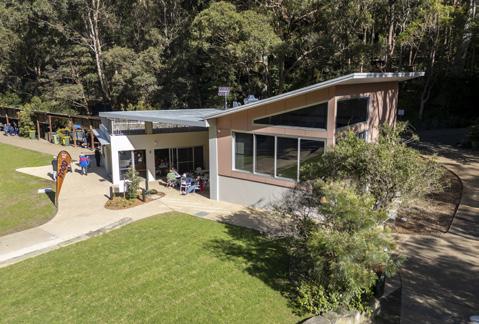
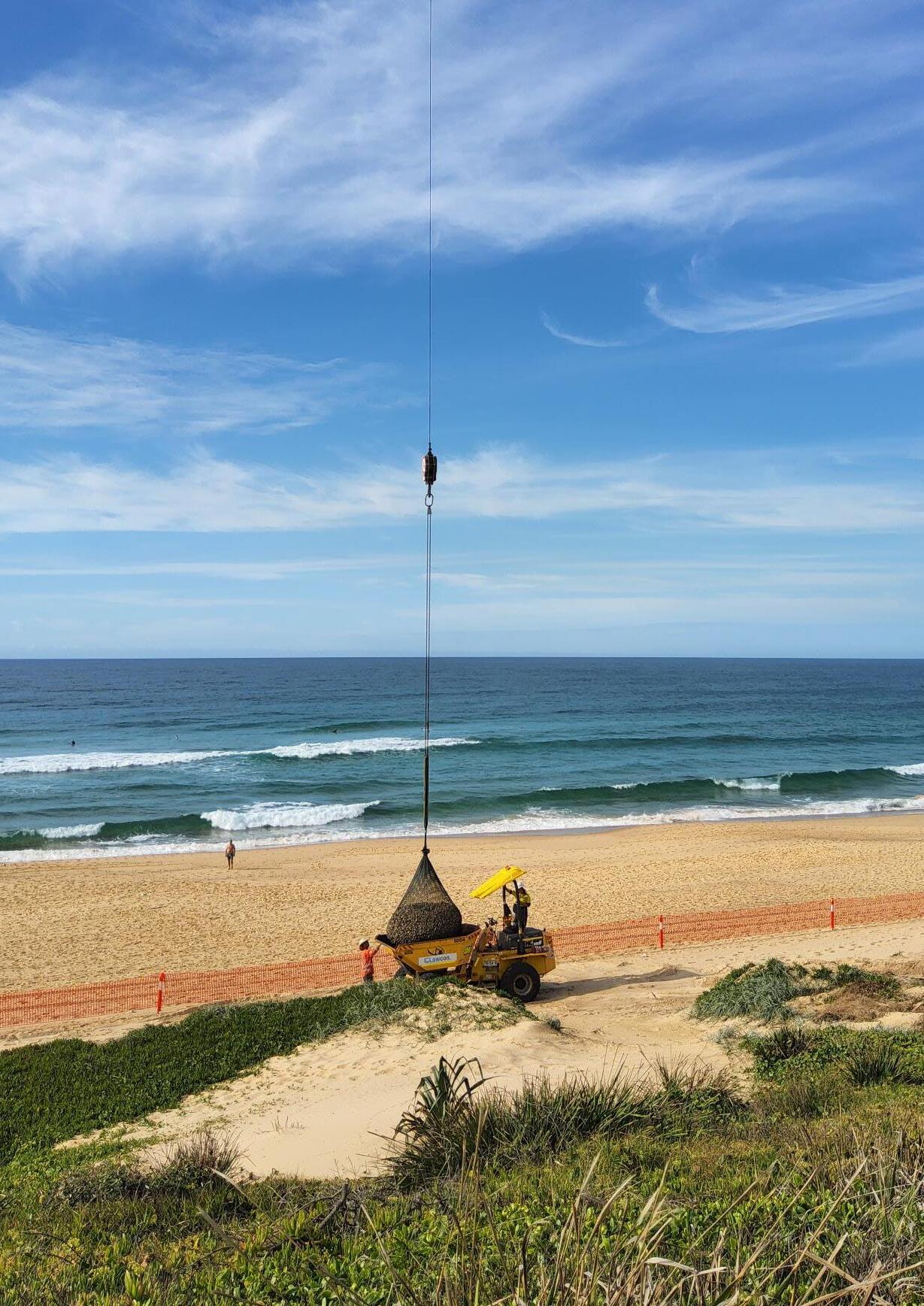
In a proactive effort to enhance coastal resilience and public safety, the Dixon Park cliff stabilisation project was successfully completed ahead of schedule. The works focused on a 60m section of cliff line north of the Dixon Park Surf Life Saving Club, a well-used area along Bathers Way.
Delivered by CN’s Civil Construction and Maintenance team, the project was guided by a strong commitment to safety and risk management, with minimal disruption to the community. The team installed 135 rock bags to form a temporary coastal protection structure, relined the adjacent car park and reopened Bathers Way, restoring safe public access and reinforcing the area against erosion.
In addition to addressing immediate safety concerns, the project built internal capability, with staff now trained in rock bag construction for future emergency responses. The team’s swift and coordinated efforts, including the timely removal of equipment ahead of forecast swells, have already demonstrated the effectiveness of the new protection measures.
The early completion of the works also enabled CN’s Natural Areas team and the Merewether Landcare Group to commence revegetation of the sand dune access path, supporting long-term environmental restoration. This project reflects CN’s ongoing commitment to protecting Newcastle’s coastline and ensuring safe, accessible public spaces for the community. The erosive nature of the cliff lines along the southern beaches was also highlighted at South Newcastle after the torrential rains of May 2025 destabilised a large rock column from the rock face, requiring immediate rectification. CN’s monitoring program, in partnership with UON, identified the movement of this four-tonne rock column, located behind the skate park. CN delivered emergency remediation action within a few weeks, resulting in the site being stabilised and Bathers Way safely reopened.
CN commenced a multimillion-dollar upgrade of the Georgetown Local Centre in August 2024, aimed at revitalising the heart of the neighbourhood shopping precinct. The project is designed to enhance safety, accessibility and amenity, while supporting the area’s growing popularity and preserving its unique village character.
Early works focused on improving traffic safety through upgraded speed control devices and new entry infrastructure to reinforce the existing 40km/h zone. Accessibility improvements were also prioritised, with upgrades to the local bus stop to better support commuters with mobility needs.
The Georgetown upgrade is part of CN’s broader Local Centres program, which has delivered improvements to nine precincts across Newcastle, investing over $20 million into community and small business areas. The program supports vibrant, accessible and sustainable Local Centres that offer an alternative to large shopping complexes.
Construction commenced in July 2024 on a new amenities building at Foreshore Park, marking a key milestone in CN’s plan to deliver a regional-level inclusive playspace and waterplay area, as part of a broader precinct vision by former Lord Mayor Nuatali Nelmes. The new facility will serve both the future playground and the broader park precinct, providing accessible features including unisex ambulant toilets, a parents’ change room and a Changing Places facility.
CN commenced construction on a major road upgrade in Wallsend, targeting congestion hotspots along Minmi Road and Longworth Avenue. The $40 million project, supported by a $7.61 million grant from the NSW Government’s Accelerated Infrastructure Fund, is delivering dual-lane traffic in both directions, improved pedestrian and cycling connections, and enhanced access to key intersections and services.
Works are being delivered in partnership with head contractor Daracon, with foundational inground infrastructure now underway. These early stages include stormwater upgrades and water main renewals to improve long-term resilience and water security for the western suburbs.
The project is designed to support the region’s growth, improve safety and reduce travel times for tens of thousands of daily commuters. It also lays the groundwork for future housing delivery, with over 3,000 new homes planned in the surrounding area.
This is the largest roadworks project ever undertaken by CN and reflects a strong commitment to integrated transport planning and infrastructure investment in the city’s western corridor.
Bathers Way is a 6km coastal pathway linking Newcastle’s iconic beaches from Merewether to Nobbys. Designed to improve accessibility and enhance recreational opportunities, the shared path will be stair-free along its entire length once complete.
Five of the seven stages have been delivered, with the most recent upgrade at South Newcastle Beach transforming the area into a vibrant, inclusive hub. This stage included improved pedestrian and cycle links, a new skate bowl, and public space enhancements that support community safety and activation.
The South Newcastle Beach upgrade was recognised at the 2025 NSW Local Government Excellence Awards, winning the Asset & Infrastructure Excellence Award for its contribution to community wellbeing and placemaking.
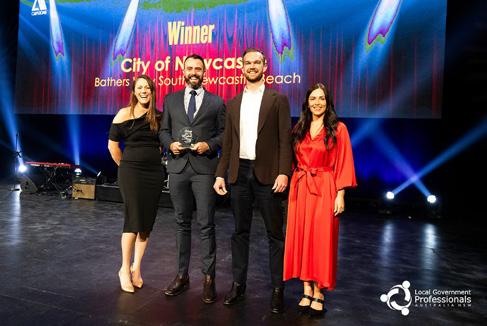
Two remaining stages, King Edward Park and Memorial Drive, are currently in planning and design. Once complete, Bathers Way will offer a continuous, accessible coastal experience for residents and visitors alike.
CN completed a $3.3 million upgrade at the intersection of Glebe Road and Park Avenue in Adamstown, addressing a long-standing traffic black spot. Supported by a $971,000 grant from the Federal Government’s Black Spot Program, the project improves safety and accessibility for thousands of daily road users.
Key improvements include the installation of traffic lights, intersection realignment, a new median strip, pedestrian fencing and upgraded drainage. Cyclists and pedestrians now benefit from a shared path, cycle ramps and safer crossing options, enhancing connections to Adamstown Train Station, local schools and businesses, and the Fernleigh Track.
CN continues to advocate to the NSW Government for the Lower Hunter Freight Corridor, a proposed 30km dedicated freight rail line from Fassifern to Hexham, which would remove freight trains from residential rail lines and significantly reduce congestion in this precinct.
Vital maintenance works were carried out on the historic 181m tunnel, including brick repairs, drainage upgrades and anti-graffiti coating. The project ensured the long-term safety and functionality of one of the Hunter’s most popular shared pathways, while preserving its heritage value.
In 2024/2025, CN continued its commitment to road infrastructure improvements, with a focus on both rehabilitation and resurfacing projects.
Road rehabilitation projects completed during this period include:
• Road upgrade works at western corridor – Minmi Road and Longworth Avenue, Wallsend
• Road embankment reconstruction at Memorial Drive, The Hill
• Road reconstruction at Fogo Street, Wallsend
• Road rehabilitation at Woodford Street, Minmi
• Road repairs at Drury Street and Mordue Parade, Wallsend
• Road repairs at Tillie Street, Wallsend
• Road repairs at Newcastle Road, Wallsend Road repairs at Yangan Drive and Yilen Close, Beresfield.
In addition, CN invested $6.3 million in road resurfacing projects, which encompassed resurfacing of 43 streets (59 street blocks) and three laneways, plus rejuvenation of 55 streets and sealing of three streets, further enhancing the quality and safety of our road network. These efforts align with our ongoing commitment to maintaining and improving essential infrastructure for the benefit of our community.


Foreshore Park – all-abilities playground and waterpark
The inclusive playspace at Foreshore Park commenced construction in mid-2025. The project is the result of over five years of community engagement, and has been shaped by input from accessibility advocates, Aboriginal representatives and inclusive play experts. Designed in line with the NSW Government’s Everyone Can Play guidelines, the playspace will offer intergenerational play opportunities across four distinct zones, including nature-based and waterplay areas, quiet spaces and accessible pathways, as well as an amenities building and a kiosk or café to support visitors and enhance the broader park experience.
The playspace is expected to be completed by late 2026 and will serve as an iconic centrepiece within Foreshore Park, establishing itself as a key regional destination. Designed as a flagship all-inclusive facility, it will foster intergenerational connections and create a vibrant community hub. The scale and quality of the playspace will reflect the significance of Foreshore Park and its value to the city.
Supported by the NSW Government, Variety – the Children’s Charity and the Touched by Olivia Foundation, this project reflects CN’s commitment to creating welcoming, inclusive public spaces for all members of the community.
Future stages of the Georgetown Local Centre project will deliver new pedestrian refuges along Georgetown Road, improved drainage and underground utility works, and enhanced connectivity for pedestrians and cyclists. Streetscape upgrades will include wider footpaths, renewed surfaces, upgraded street furniture, and the planting of approximately 30 new street trees to increase shade and greenery.
A key feature of the upgrade is the creation of a new public plaza at the intersection of Moate Street and Georgetown Road. This space will provide a welcoming destination for socialising and outdoor trade, while also facilitating safer cycle access between Asher and Parkview Streets.
On 18 August 2025, Federal Member for Newcastle Sharon Claydon announced that CN will receive $16.7 million in funding through the Federal Government’s regional Precincts and Partnerships Program (rPPP). We welcome this news, and we are now working with representatives of the Federal and NSW State Government, as well as project partners Iris Capital, Hunter Water Corporation and Hunter and Central Coast Development Corporation, to finalise the funding agreement and confirm plans for project delivery.
This grant funding will support the continuation of our revitalisation of the East End, enhancing public spaces and connections along Hunter Street between Thorn Street and Newcomen Street, including the Market Street lawn area. As with previously completed phases, these improvements are intended to integrate with the almost $1 billion of residential development in Newcastle’s East End, transforming the area into a vibrant and welcoming space for residents, visitors and shoppers.
The grant funding will also support the delivery of upgrades to Cathedral Park, an often-overlooked green space on the hill between the Christ Church Cathedral and King Street. Once completed, visitors will be able to take a seat or lay a picnic blanket on the newly landscaped terrace to take in the views of the harbour and quietly reflect on the past through a series of memorials and monuments commemorating the site and our city’s history.
Stage 2 of the Newcastle Ocean Baths project, shaped by community feedback, focuses on restoring the Art Deco façade, providing updated amenities, installing new bleacher seating and improving access. The design phase is drawing to completion, with community consultation informing the revitalisation of the much-loved baths, culminating in submission of the development application scheduled for the end of 2025.
Playgrounds are identified and selected for renewal from a biennial playground safety audit undertaken on all CN playground sites across the LGA. From this safety audit, every playground is given a condition rating that determines its priority within our renewal program.
2025/2026 upcoming playground replacements include:
• Beauford Avenue Reserve, Maryland
Johnson Park, Lambton
• Morpeth Road Reserve, Waratah West
• Stockton Pool.
Engagement has begun on developing a year-round facility at Lambton Pool, identified as a priority in the Inland Pools Strategy. As Newcastle’s population grows, demand for aquatic fitness and year-round warm water access will increase. This new facility at Lambton Pool will address that need, supporting water safety and providing swim lessons throughout the year for the community.
CN is revitalising the northwest corner of National Park by transforming an underutilised area into a welcoming, green community space. The project follows the demolition of the disused Wal Young House, which had become a safety concern due to its deteriorated condition and reports of antisocial behaviour.
Stage One works are underway and will deliver new landscaping, shaded picnic areas, public amenities, and additional trees to enhance the park’s natural beauty and biodiversity. A new 1.5m-wide footpath will improve pedestrian and cyclist connectivity between Smith Street, Parry Street and the adjacent basketball courts. Bike racks, bubblers, benches and shelters will also be installed to support passive recreation and improve the visitor experience.
The upgrades respond to community feedback and reflect CN’s commitment to creating safer, more inclusive public spaces. The project also lays the groundwork for future improvements to traffic management and connectivity at the intersection of National Park and Parry Streets.
Stage One is expected to be completed by late 2025, with further updates to be shared as the project progresses. Grant funding is being sought for Stage 2 works at No.1 Sportsground in National Park. This phase will upgrade the grandstand and amenities building to meet modern standards, creating a top-quality venue for both local and elite sports.
In December 2024, Council unanimously endorsed the commissioning of an independent review of its operations. This proactive initiative was undertaken to reaffirm CN’s commitment to excellence in governance, transparency and service to the community. The review was not an investigation or audit, but a strategic evaluation designed to assess current practices and identify opportunities for continuous improvement.
The review was conducted by Davidson Business Advisory and overseen by CN’s Audit, Risk and Improvement Committee (ARIC). The review process was rigorous and inclusive, with more than 800 public submissions, 260 internal documents, and 47 interviews and consultations with staff, councillors, ARIC members and community representatives considered.
The review focused on six key areas:
General governance
• Financial governance
• Compliance
• Major projects
• Community engagement
• Organisational culture.
These themes reflect the core of CN’s operations and its relationship with the community.
The review found CN to be a well-managed and high-performing organisation, with numerous examples of best practice. Importantly:
• No instances of fraud, corruption, legislative breaches or maladministration were identified
• CN’s financial position is strong, with a diversified revenue base and well-managed debt
• Governance processes are sound, with professional conduct across Council meetings and operations
• Community engagement strategies are in place, though opportunities exist to strengthen communication and transparency.
While the findings were overwhelmingly positive, the review identified 20 recommendations to build on CN’s success. These include:
• Enhancing transparency in project reporting and financial disclosures
• Improving complaint handling and public access to information
Strengthening councillor engagement and meeting procedures
• Supporting smoother transitions following Council elections
• Increasing community involvement earlier in decision-making processes.
These recommendations are designed to reinforce public trust, improve service delivery and ensure CN continues to operate with integrity and accountability.
The full report can be viewed on CN's website.
CN has committed to implementing the recommendations within an 18-month timeframe, with progress to be reported back to Council.

CN remains dedicated to the advancement of First Nations peoples. CN has increased the visibility and representation of First Nations people throughout the LGA by expanding events that mark Aboriginal dates of significance and partnering with the local Aboriginal community to deliver them. Cultural education offerings have grown, with local Aboriginal community members actively involved in program delivery. CN has also enhanced the representation of Aboriginal culture across the LGA through collaborative projects with the local Aboriginal community.
This year, CN consulted directly with members of the local Aboriginal community on the Broadmeadow Place Strategy, rather than engaging external consultants. This shows a positive shift in the organisation and an eagerness for CN to continue to build relationships with the local Aboriginal community.
CN continues to work closely with the Guraki Aboriginal Advisory Committee and values the strategic advice it provides on matters affecting the local First Nations community.
CN proudly supported and collaborated with the local First Nations community to deliver two major events this year. The Awabakal NAIDOC Community Day, hosted annually by the Awabakal Corporation, is the flagship NAIDOC event in the Newcastle LGA. It offers both Aboriginal and non-Aboriginal community members the opportunity to celebrate NAIDOC Week through cultural performances, stalls, rides and music.
CN hosted the ‘Cuppa with Council’ tent at the event, reinforcing its commitment to community engagement.

Ngarrama, the Survival Day/Australia Day Eve vigil, was held in partnership with UON and the Awabakal Corporation, with support from CN. This event honours traditional First Nations practices and promotes unity and cultural celebration across communities.
CN also participated in the Reconciliation Ball at UON, with attendance from elected Council members and CN employees, demonstrating CN’s ongoing dedication to Aboriginal and Torres Strait Islander peoples in the region.
Additional internal events included the annual CN NAIDOC Morning Tea and the Reconciliation Week Trivia Competition, which provided opportunities for staff to engage with and reflect on days of Aboriginal significance.
Aboriginal employment levels at CN remain at approximately 4%, exceeding the LGA’s Aboriginal population of 3.4% and reflecting CN’s representative workforce. This year, CN employed four new Aboriginal apprentices and trainees, surpassing the Aboriginal Employment Strategy 2022-2025 (AES) target of two per annum.
To support culturally appropriate recruitment practices, CN has implemented measures such as ensuring an Aboriginal panel member is present whenever an Aboriginal candidate is interviewed.

CN is committed to fostering a socially just and inclusive community. Our efforts are focused on removing barriers, encouraging participation and celebrating the rich diversity of our city. This year, we have undertaken several initiatives that demonstrate our dedication to enhancing the wellbeing and connection of all Novocastrians.
Neighbourly Newy is a community-led initiative designed to support Newcastle residents to live safely and happily together. The program takes a twofold approach: it celebrates diversity and welcomes refugees, while also addressing community tensions and discrimination through education, dialogue and collective action.
Neighbourly Newy promotes:
• Diversity education
• Conflict resolution skills
• Deeper conversations
• Customised collective action.
The program celebrates strength in diversity while helping communities grow together, building resilience against future social shocks.
In 2024/2025, Neighbourly Newy contributed to a range of community outcomes, including commemorating the 10th anniversary of Newcastle’s formal recognition as a Refugee Welcome Zone.
Neighbourly Newy supported a series of events and initiatives that showcased multiculturalism and fostered connection:
• Hunter Multicultural Communities Multicultural Fiesta
Community Chef Challenge – a one-day food and culture festival featuring Afghan, Arabic, Indian and African cuisines, created by local women aiming to launch food businesses
• Africa Day
• Multicultural Services Expo – including the launch of the 10-year Refugee Welcome Zone Anniversary publication
• Multicultural Services Directory launch
• Newcastle Multicultural Soccer Tournament
• Refugee Week Community Picnic
• Positive messaging across media and social platforms.
These events provided opportunities for cultural exchange, community celebration, and visibility for refugee and migrant communities.
Deepening conversations and actions for a safe, happy Newy
Neighbourly Newy also delivered training and recognition programs to build skills and strengthen community ties:
Upstander Training – 25 participants from sports and community groups trained to prevent racism and discrimination
• Alternatives to Violence Training – 27 certificates awarded (15 Basic, 8 Advanced, 4 Facilitator)
• Thank You CommuniTEA – 30 certificates acknowledging contributions to refugee settlement.
These activities encouraged deeper conversations and empowered individuals to take positive action in their communities.
Neighbourly Newy is a collaborative effort, co-designed by CN, the Multicultural Action Group and other stakeholders. It aims to build genuine social cohesion, strengthen intercultural connections, and contribute to a more welcoming and equitable Newcastle.

CN delivered its Count Us In disability inclusion program for the fifth consecutive year. The chosen theme focused on inclusion in sport and recreational activities, running over a five-week period between August and September 2024.
Australia’s love of sport provides a powerful platform to promote disability inclusion. By aligning with the 2024 Paris Olympics and Paralympics, Count Us In Sport amplified messages of equity and participation, consistent with CN’s Disability Inclusion Action Plan 2022–2026. The program reinforced the belief that everyone deserves the opportunity to play, volunteer with, support or follow their favourite sport, and to enjoy the social, health and wellbeing benefits that come with it.
Count Us In Sport engaged over 90 sporting groups and programs, raising awareness of the need to better include people with disability, who make up one in six residents in Newcastle, in sport and recreation. The program also promoted Disability Sports Australia’s Accessibility Champions resources to build local capacity and support inclusive practices.
In total, over 1,000 people directly participated in Count Us In Sport activities. The program’s media and marketing campaign reached tens of thousands, with coverage across NBN News, radio, social media and print. Multiple video and photographic assets were produced and shared throughout the campaign.

Key events delivered:
Promotional banner launch
Banners featuring people with disability participating in sport and recreation were displayed along Laman Street in the lead-up to Count Us In and throughout the Paris Olympics and Paralympics.
Inclusive Sport Forum
Held at McDonald Jones Stadium, the forum brought together sport and recreation providers to hear from guest speakers including former Newcastle Knight Alex McKinnon, Paralympian Rae Anderson and Healthy Change Challenge founder Lloyd Valentine.
Inclusive Pitch Night
Sport and recreation providers pitched ideas to improve inclusion in their activities. Seven projects were funded, resulting in new programs in surfing, dance, adaptive tennis, wheelchair sports, accessible football and more, creating hundreds of new opportunities for inclusive play over the past eight months.
Come and Try Inclusive Sport Day
Hosted by CN at National Park No.2 Sportsground, this event featured seven sports and attracted hundreds of attendees.
Paralympics Watch Party
Delivered in partnership with Community Disability Alliance Hunter at a central Newcastle venue, the event celebrated the Paralympics and fostered community connection.
In addition, a database of inclusive sport and recreation activities has been developed, and an Inclusive Sports Guide is in progress for release in 2025/2026.

CN continued its support for Making Change in Our Suburbs – Early Childhood Years, a collective impact initiative led by Mission Australia. The initiative brings together support services, community groups, primary schools and government agencies to improve early childhood outcomes in Newcastle’s western suburbs.
Launched in 2022 in response to community-identified challenges around school readiness and access to services, the initiative began in suburbs such as Birmingham Gardens, Jesmond, Wallsend and Fletcher, and has since expanded to other areas where communities are eager to collaborate for long-term change.
CN, through its Community Planning and Development team, has played an active role in supporting the initiative’s coordinated approach, aligning goals, sharing data and strengthening local networks.
Key outcomes to date include:
• Delivery of professional training in trauma-informed care, mental health first aid and resilience programs
• Improved service connections with schools and families
Establishment of community conversations using the Harwood Model
• Exploration of school-linked clinics (speech pathology, occupational therapy, paediatrics)
• Increased awareness and support for school transitions and early intervention
• Strengthened collaboration between schools and service providers.
The initiative will transition to a formal governance and partnership structure to support long-term sustainability. CN will continue to contribute to data collection efforts across Newcastle’s western suburbs, helping to inform service planning and community engagement. The next phase will also focus on increasing alignment between early years services and schools, and exploring pathways to support transitions from primary to high school.
The 2025 Seniors Festival was delivered as part of CN’s commitment to supporting healthy ageing, inclusion and community participation. The Festival commenced with the Time to Shine Seniors Expo, which welcomed over 400 attendees and featured 55 community organisations. The Expo offered a wide range of activities including Tai Chi, musical performances, community choirs and interactive stalls, encouraging older residents to explore local services, discover new interests, and stay active and informed.
CN services played a central role in the Expo, providing advice and engagement opportunities across areas such as Newcastle Libraries, Newcastle Museum, Newcastle Art Gallery, Customer Service, Rates, Waste Education, Landcare, Community Engagement, Emergency Preparedness, and Community Planning and Development.
Festival planning was guided by input from the Newcastle Seniors Reference Group and the Hunter Ageing Alliance, ensuring the program reflected the needs and aspirations of older Novocastrians. A key feature of the Festival was Shine Central, a pop-up hub on Beaumont Street facilitated by Hunter Ageing Alliance.
Shine Central offered a diverse program including art and poetry exhibitions, technology workshops, and expert-led sessions on healthy ageing, legal rights and financial wellbeing.
The broader Festival program included over 65 events across the city, celebrating the contributions, vitality and lived experience of Newcastle’s senior community. The Festival also marked the launch of the 2025 Seniors Directory, a year-round resource designed to support older residents in accessing services, staying connected and participating in community life beyond the Festival period.
Participation in the Festival demonstrated strong community engagement, with seniors across Newcastle actively involved in events, reconnecting with peers and accessing valuable information and services. The program supports strategic objectives outlined in CN’s Age-Friendly Community Framework, promoting inclusion, wellbeing and active ageing.
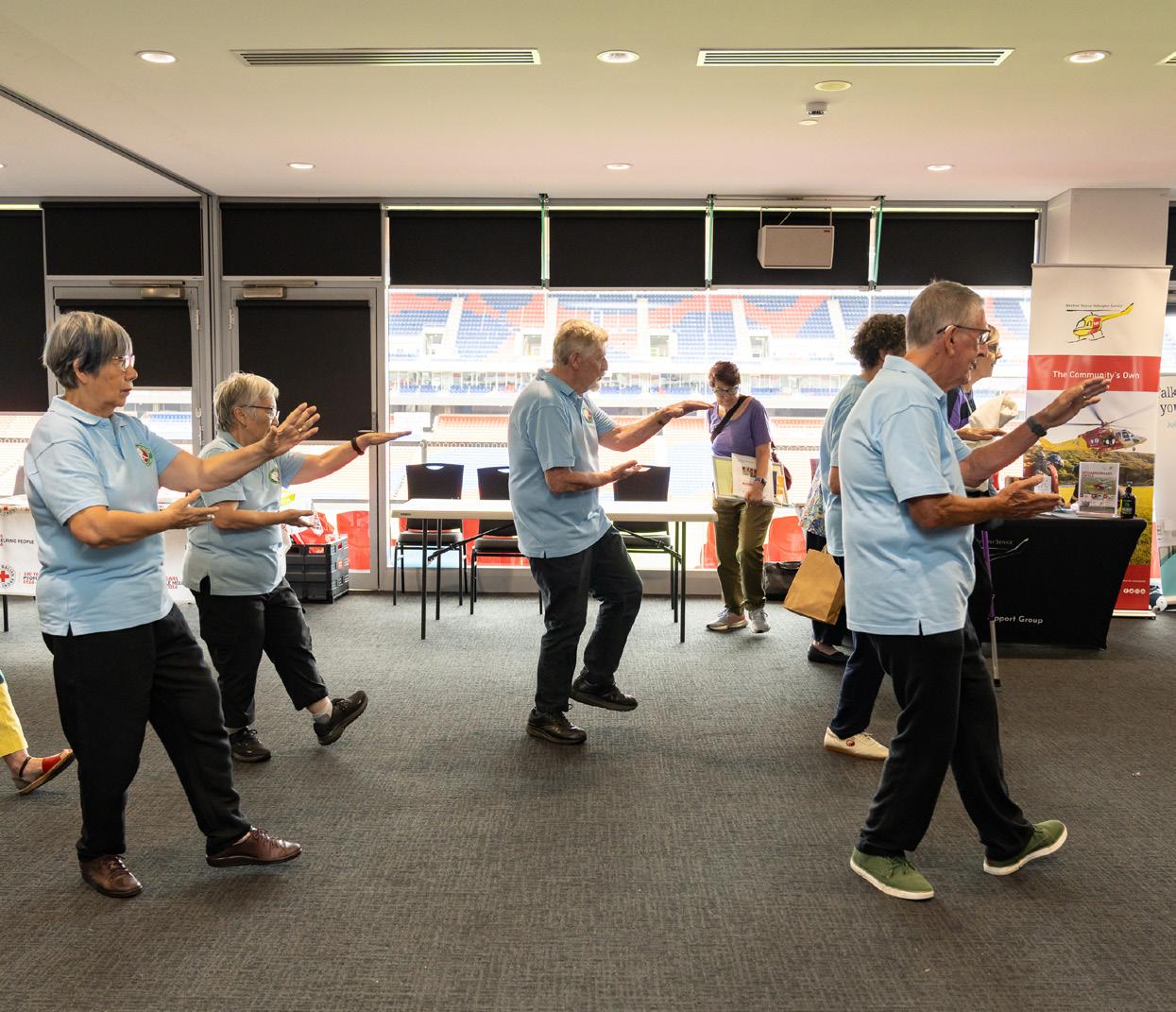
CN continued its work to celebrate and enhance the role of community centres and halls across the city. A key initiative was the six-month activation of Jesmond Neighbourhood Centre, aimed at increasing community access and strengthening local partnerships.
The activation included:
• Reduced-fee incentives for not-for-profit groups to deliver services aligned with community needs
• Increased volunteer support at the Centre
• A dedicated CN staff member working from the Centre one day per week to build relationships and support collaboration.
Key outcomes included a 15-hour increase in weekly community usage and the successful delivery of a Community Open Day, which attracted over 300 attendees. Several new initiatives were introduced during the activation and have since become permanent, including:
• Humanitarian Settlement casework
• Circle of Security Parenting Program Afghan Women’s Group
• Arabic Women’s Group
• Services Australia outreach
• Wesley Mission youth consultation.
Significant changes were implemented across CN’s cemeteries portfolio, following the introduction of the Interment Industry Scheme (IIS) on 1 July 2024. Key updates included:
• A formal contract process for the purchase of new burial rights
• Introduction of a State Government levy for burials
• Enhanced maintenance standards for grounds and monuments
• Recognition of religious and cultural considerations in cemetery operations.
The Cemeteries and Crematoria Act 2013 was also amended in June 2025, with oversight provided by Cemeteries and Crematoria NSW, which will audit operators on IIS implementation.
Across CN-managed sites, Stockton and Wallsend Cemeteries processed 106 burials and ash interments, with an additional 59 burial sites purchased, primarily for future use.
To improve site security and reduce vandalism and illegal dumping, gates have been installed at key locations and are now locked from dusk to dawn.
A new online application system is also in development, with process design and testing completed and implementation scheduled for February 2026.

CN currently manages 11 community venues, with an additional seven venues operated by third-party providers. Across the internally managed sites, there are 53 bookable spaces, including halls, offices, meeting rooms and storage areas.
In 2024/2025, CN processed 392 bookings, covering 4,401 individual booking dates and totalling 14,417.5 hours of use. The most common uses were for fitness and wellbeing classes, followed by social hires such as birthday parties and family events.
Key projects delivered included:
Activation and revitalisation of Jesmond Neighbourhood Centre
• Reintegration of Mayfield Community Centre (formerly Mayfield Seniors) under CN management
• Rollout and trial of remote access and keyless entry technology at Jesmond Neighbourhood Centre.
A focused program has also been initiated to improve the presentation, maintenance and overall condition of CN’s community facilities.
CN has implemented internal guidelines titled ‘Responding to Homelessness in Council-Owned and Managed Spaces’, supporting staff to engage compassionately and appropriately with people experiencing homelessness. These guidelines align with the NSW Protocol for Homeless People in Public Places and provide both quick-reference tools and detailed legislative context for staff.
CN works in partnership with community organisations and government agencies to deliver coordinated responses to individual cases and identified rough sleeping locations. In 2024/2025, training was delivered to 120 staff, with further sessions planned for 2025/2026. CN also participated in the NSW Homelessness Street Count in February 2025.
CN supported the local community services sector by hosting four Interagency Network meetings, including two joint sessions with Lake Macquarie City Council. These forums enabled collaboration, resource sharing and coordinated responses to emerging community needs.
CN also distributed 24 sector e-newsletters, providing updates, opportunities and relevant information to local organisations.
In early intervention, CN continued its partnerships in two key place-based initiatives: Early Years Collective Impact, led by Mission Australia
• Youth Collective, led by Samaritans.
These collaborations focus on improving outcomes for children and young people through coordinated, community-led approaches in areas of greatest need.
Reg cl 217(1)(a5) & Act s 356
Over the past four years, the Grants and Sponsorship program has significantly enhanced community outcomes through updated guidelines and extensive stakeholder engagement. In the 2024/2025 cycle, CN awarded $875,649.01 to 120 projects across a range of focus areas.
CN’s community grant programs provide funding opportunities to support initiatives that contribute to the social, cultural, environmental and economic life of the city. Through partnerships, we strengthen our community’s capacity and deliver a more diverse range of activities that CN may not be able to provide on its own. Our program is designed to respond to local needs and priorities, delivering outcomes that are identified and led by the community itself.
The Infrastructure Grants program is an annual funding program targeting minor capital activities that enhance the economic, social and environmental wellbeing of the local community. Infrastructure Grants include Facade Improvement, Recreation Facilities and Sustainability programs.
Our Facade Improvement grant program is designed to improve building facades and create active frontages in the city that are sensitive to heritage, evoke pride, enhance our city’s presentation, and engage the community in Local and Neighbourhood Centre revitalisation.
In 2024/2025, we received one application, asking an amount of $5,000. The application was approved in full.
Our Recreation Facilities grant program assists in the provision or development of suitable sport and recreation facilities. The program creates opportunities for CN and local sporting groups to form partnerships in upgrading existing or developing new facilities, enabling us to provide a wide range of facilities that assist in meeting the needs of the community in a cost-effective and cooperative manner.
In 2024/2025, we received 14 applications with a total combined asking amount of $99,812.01. Eight applications were approved for a total funding amount of $54,133.01 to support these projects.
Our Sustainability grant program is designed to reduce Newcastle’s carbon footprint, and to increase community capacity and capability to address local needs and opportunities for sustainability. This grant program funds renewable energy and energy efficiency measures, water savings and water storage, capture and reuse initiatives, green walls and use of low-emission construction products.
In 2024/2025, we received eight applications with a total combined asking amount of $59,782.88. Four applications were approved for a total funding amount of $39,463 to support these projects.
The Community Support Grants provide support to community-based groups and service organisations to develop effective activities that address the needs of our local community.
Our Arts, Culture & History grant program supports activities that promote and celebrate our rich heritage and our creative, diverse community. CN also provides funding to professional not-for-profit arts and cultural organisations to support their sustainability and strengthen their ability to attract funding from other sources.
In 2024/2025, we received 36 applications with a total combined asking amount of $636,175. 19 applications were approved for a total funding amount of $89,260 to support these projects.
Our Environment grant program is dedicated to supporting activities that improve our local environment. This could include expanding our urban forest through revegetation initiatives, greening our streets, parks and open spaces, and providing increased pollinator habitat throughout the city.
In 2024/2025, we received six applications with a total combined asking amount of $83,718. Four applications were approved for a total funding amount of $43,218 to support these projects.
Our Social Inclusion grant program is designed to develop our diverse communities by fostering meaningful connection, social inclusion and access for our most vulnerable, and to contribute towards the objectives of our Social Strategy 2030
In 2024/2025, we received 46 applications with a total combined asking amount of $662,271.78. 30 applications were approved for a total funding amount of $238,064 to support these projects.
Young people around the world are concerned about the impacts of climate change on people and the planet. CN, with support from the Bloomberg Philanthropies’ Youth Climate Action Fund, offered microgrants to young individuals or organisations that represent youth to fund climate initiatives.
The Youth Climate Action Grant program supports young people to design and deliver urgent climate solutions that advance our Newcastle Climate Action Plan target of net zero emissions in the Newcastle LGA by 2040.
In 2024/2025, we received 36 applications with a total combined asking amount of $241,529.70. 31 applications were approved for a total funding amount of $215,011 to support these projects.
&
Culture & History University of Newcastle Ngarrama
Culture & History Balar Malar Tamil Educational Association, Inc
&
Lupish Pty
Balar Malar Newcastle Tamil Community Language School, Cultural Immersion Day (Get-together) $2,000.00
Youth Week grants are designed to support events that celebrate and highlight the contribution young people make to the Newcastle community.
In 2024/2025, we received six applications with a total combined asking amount of $7,000. Four applications were approved for a total funding amount of $4,000 to support these projects.
Summary – Approved Youth Week funding applications

CN’s Sponsorship Programs support initiatives that contribute to the economic life of the city by delivering tangible benefits to the city and the community, and helping to make Newcastle a liveable, sustainable and inclusive global city.
There are two main sponsorship programs: Event Sponsorships and Tourism and Economic Development Sponsorships.
Event Sponsorships provide a mechanism to:
• Promote active and vibrant public spaces
• Grow overnight visitation
• Provide positive promotional exposure for Newcastle
• Enhance the city’s image and profile as a visitor destination and event city
• Assist events that contribute to the unique character of the Newcastle LGA and region.
Tourism and Economic Development Sponsorships support activities that provide economic benefit through one or more of the following areas:
Enabling skills
• Enabling innovation
• City-shaping initiatives
• Enabling a vibrant city.
The Event Sponsorship Program comprises four streams:
• General Events: This category provides support for smaller events that play a role in diversifying Newcastle’s events calendar. These events align with strategic goals, boost economic activity and make use of city assets.
In the 2024/2025 period, we received 13 applications with a total combined asking amount of $131,100. Two events received a total funding allocation of $13,000.
• Incubator Events: This category is designed to support emerging and established events that are new or up to three years old. The goal is to increase the profile of these events, encourage visitation and stimulate participation.
In the 2024/2025 period, we received 10 applications with a total combined asking amount of $165,800. Two events received a total funding allocation of $8,000.
• Major Events: This category supports wellestablished events with a proven track record of successful delivery, increased visitation, overnight stays and collaboration with local businesses to enhance economic dispersal.
In the 2024/2025 period, we received 22 applications with a total combined asking amount of $432,100. 10 events received a total funding allocation of $84,000.
The Tourism and Economic Development Sponsorship Program comprises two streams:
• Visitor (Conference): This category supports activities that promote Newcastle as a premier Australian visitor destination. These activities highlight Newcastle’s rich art, cultural and culinary scene, vibrant nightlife, and accessible nature-based and coastal experiences.
In the 2024/2025 period, we received six applications with a total combined asking amount of $108,000. All six activities received a total funding allocation of $60,000.
• Business: This category focuses on fostering local economic development. It supports activities that facilitate local skills development, attract highly skilled individuals to the city, promote local business growth and employment, and encourage innovation and investment.
In the 2024/2025 period, we received six applications with a total combined asking amount of $84,200. Unfortunately none of the activities were approved for funding.
CN is committed to involving our community in shaping the future of our city. Our goal is for the community to feel informed, engaged and empowered to contribute positive change in Newcastle. To achieve this, we are continually enhancing and expanding opportunities for meaningful community input across our projects, plans and activities.
Throughout the 2024/2025 period, our community actively participated in engagement opportunities, both in person and online, influencing decision-making and shaping project outcomes. We had more than 20,000 interactions with the community through our various engagement activities.
We sought ideas and feedback on 38 projects spanning a wide range of topics, including community services and facilities, long-term strategic plans, environment and sustainability, heritage, critical road upgrades, pedestrian and cycleway improvements, and much more.
Highlights during 2024/2025 include:
• Reflecting community priorities in Newcastle 2040: Newcastle 2040 is a key strategic planning document that will guide our decision-making and priorities for the next 10+ years. As part of our review of the document, we engaged early with the community to ensure we were on the right track. Based on community feedback, we refined the document and publicly exhibited the updated draft to confirm it reflected the community’s priorities and aspirations.
• Growing our in-person reach: We expanded our face-to-face engagement by hosting stalls at key community events including the Hunter Disability Expo, Seniors Week, Multicultural Services Expo, and the Emergency and Essential Services Expo. We also delivered successful community events of our own, such as the Summer Safety Partnership with Triple M at Dixon Park, the Gregson Park Playground Opening, the South Newcastle Beach Celebration and the Blackbutt Community Day.
• Advancing the Community Engagement Strategy: Two years on from adopting the strategy, we’re focused on expanding our reach and engaging a broader audience. We’ve been reviewing our progress, identifying new opportunities to strengthen participation and placing a strong emphasis on inclusion and accessibility.
• Planning for a more connected, inclusive city: We progressed key strategic planning projects aimed at improving public spaces and accessibility across Newcastle. This included development of the Civic Public Domain Plan to guide future improvements in the city’s civic heart, early planning and consultation for upgrades at Camp Shortland, and work on the Walking and Mobility Plan to support safer, more inclusive and accessible movement throughout the city.
• Continuing to build community awareness through We Love Our Coast: We continued to develop our We Love Our Coast campaign, creating opportunities to educate the community about the important work we’re delivering along our coastline. This included the public exhibition of the Extended Stockton Coastal Management Program (CMP) and early engagement on the Coastal Buildings Revitalisation Plan. The campaign also promoted broader awareness of remediation works, infrastructure upgrades and our long-term coastal planning initiatives.
We sincerely thank everyone who participated in the conversation and shared their ideas on how we can improve our city. Your input is essential to ensure that our city continues to evolve in ways that reflect our community’s needs and aspirations.

Engagement programs delivered in 2024/2025 include:
Strategies and plans – nearly 2,900 (1,388 online only) people participated in:
• Newcastle 2040 CSP Review
• Delivering Newcastle 2040 (our budget and action plan)
• Extended Stockton Coastal Management Plan
• Planning proposal and development controls –Cameron’s Hill Heritage Conservation Area
Planning Proposal – new heritage item at 22 Victoria Street, Mayfield
• Planning Proposal – new heritage item at 13 Section Street, Mayfield
• Planning Proposal – 14 Sunderland Street, Mayfield
• Draft Planning Agreement – 1/21 Railway Street, Wickham
• Affordable Housing Contributions Scheme
• Local Strategic Planning Statement Update 2025
• Councillor Expenses and Facilities Policy
Broadmeadow Place Strategy
• Blackbutt Reserve Plan of Management
• Reclassification of Land Parcels
• Civic Public Domain Plan
• Walking and Mobility Plan.
Infrastructure and capital works – over 9,100 (5,200 online only) people shared their opinions on:
• Camp Shortland
• National Park Landscape Masterplan
• Islington Cycleway improvements Planning for Mayfield
• Parkway Avenue roundabout safety improvements
• Reduced pool entry fee trial
Newcastle Ocean Baths, Stage 2
• Bathers Way extension into King Edward Park
• Coastal Buildings Revitalisation Plan
• Indoor year-round facility at Lambton Pool
• Waratah Park Masterplan
• Western corridor traffic changes.
Facilities and services – over 4,100 people shared their experiences with:
• Civic Theatre Visitor Experience Survey
• Newcastle Museum Visitor Experience Survey.
Other – more than 4,680 (4,446 online only) people provided their thoughts on:
2025 Community Satisfaction Survey
• Newcastle Show Day
• Public Notice – proposed Rising Tide event
• EOI for Standing and Strategic Advisory
• Astra Aerolab and Newcastle Airport’s Masterplan.
We also hosted two dedicated celebration days, attracting over 1,750 attendees, to build awareness of our engagement brand and strengthen connections with the community.
Breakdown of engagement by topic:
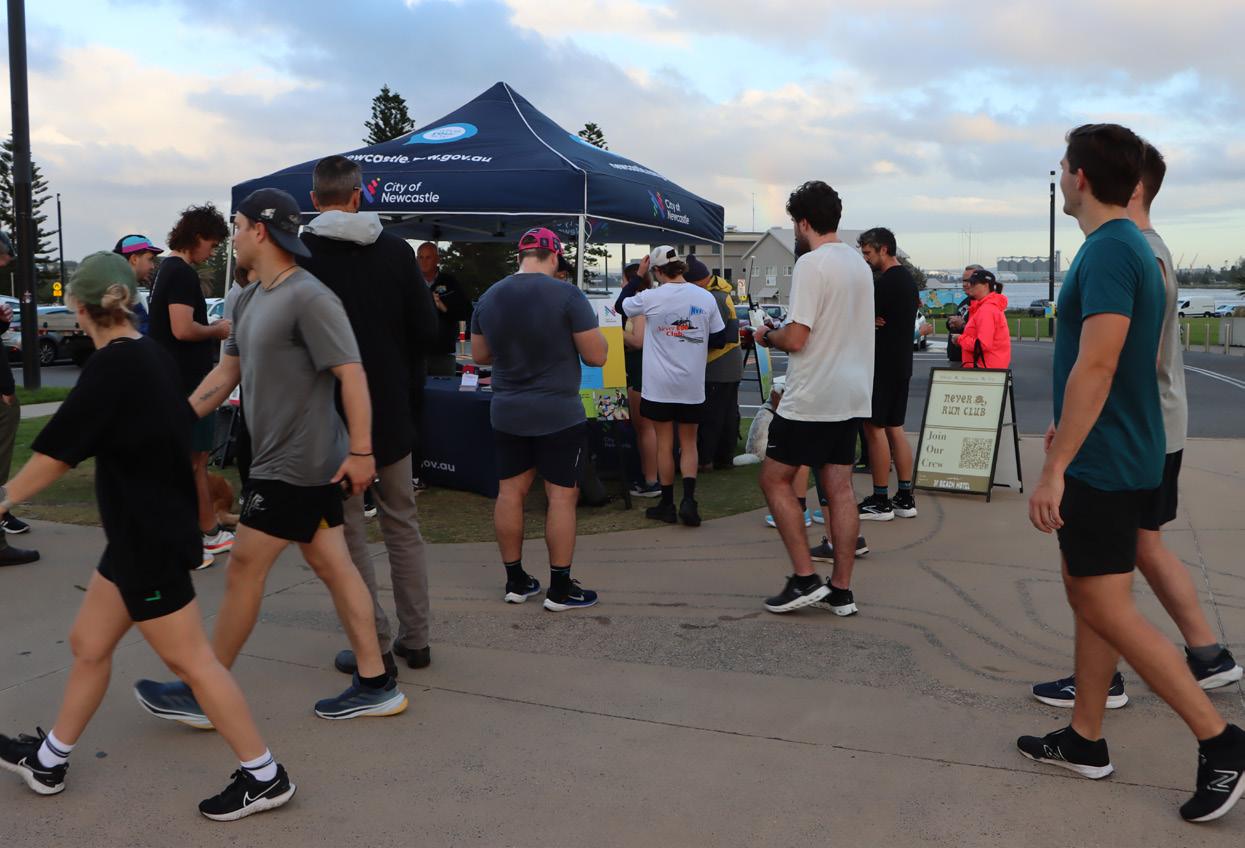
The Community Satisfaction Survey is conducted annually to help inform CN’s decision-making and service provision. The telephone survey was conducted in June 2025 with a randomly selected sample of 401 residents. The sample was designed to be representative of the Newcastle LGA by age, gender and ward.
The overall community satisfaction rating for 2025 is summarised below as compared to the research provider’s LGA benchmarks, with a mean score out of 5. A mean score higher than 3.0 indicates a higher level of satisfaction than dissatisfaction.
The survey showed that CN enjoys a higher mean level of community satisfaction than other coastal and regional councils.
*Micromex Research is an external market research company that provides comparative performance benchmarks to other similar local councils in NSW.
Below is a summary of the community’s overall satisfaction with services and facilities by category and strategic theme. The full report with detailed results is available on our website
Overall satisfaction with services and facilities by category (where 1 = very dissatisfied and 5 = very satisfied):
Ensuring a trusted customer experience is a top priority for CN. Our dedicated Customer Service Centre (CSC) team is committed to providing high-quality service through various channels, including phone, in-person and digital interactions. In the past year, we have had over 114,000 customer interactions (compared to 121,000 in 2023/2024).
Our CSC has achieved an average quality result of 86% (+6%) for our phone and application processing customer service provision, as assessed through our comprehensive internal quality assurance program. We also value feedback from our customers, received through a variety of channels, and in particular via our post-interaction survey, which has been in place since March 2022 with close to 6,500 customers providing feedback. This survey assesses overall satisfaction, interaction ease and the experience with our Customer Service Officers.
In the past year of surveying, we received a customer satisfaction rating of 65% (-6%), with an ease rating of 71% (-4%). Due to a change in CN’s customer request management system, results have slightly declined this year as we make adjustments to the experience based on customer feedback. As a result of actioning this feedback, results are returning to those we have experienced in previous years.
Additionally, our customers have rated our team as understanding their needs at 79% (-4%), making them feel heard at 79% (-2%), and engaging in professional and respectful behaviours at 87% (-2%). Despite minor decreases, these results still affirm that we provide a high standard of service to our community through dedicated and consistent effort.
The implementation and continued development of CN’s chat bot represents a meaningful advancement in both innovation and service delivery. Originally introduced to augment customer service support during business hours, the chat bot has since evolved into a 24/7 digital assistant providing uninterrupted access to key information and services. This expansion has ensured that our customers can continue to engage with CN on their own terms, even when traditional service channels are unavailable.
The impact of this work is clearly reflected in the chat bot’s growth. In May 2024, there were just 12 self-service chat bot interactions; by May 2025, this number had grown to 150 per month, an increase of over 1,000% in just 12 months. Across March, April and May 2025, over 40% of customers chose to self-serve via the chat bot where the option was available. This significant uptake highlights a shift in customer expectations and preferences, with more embracing the convenience and accessibility of around-the-clock digital service (even at 1am!). By meeting this demand, the chat bot is delivering a more responsive, inclusive and customer-centric experience for our community.
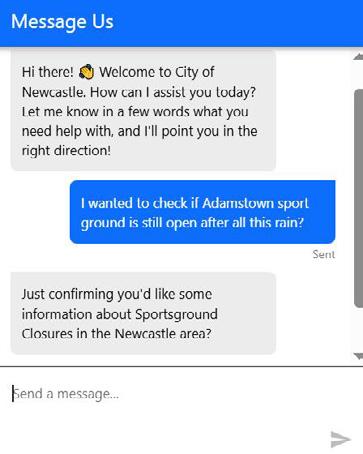
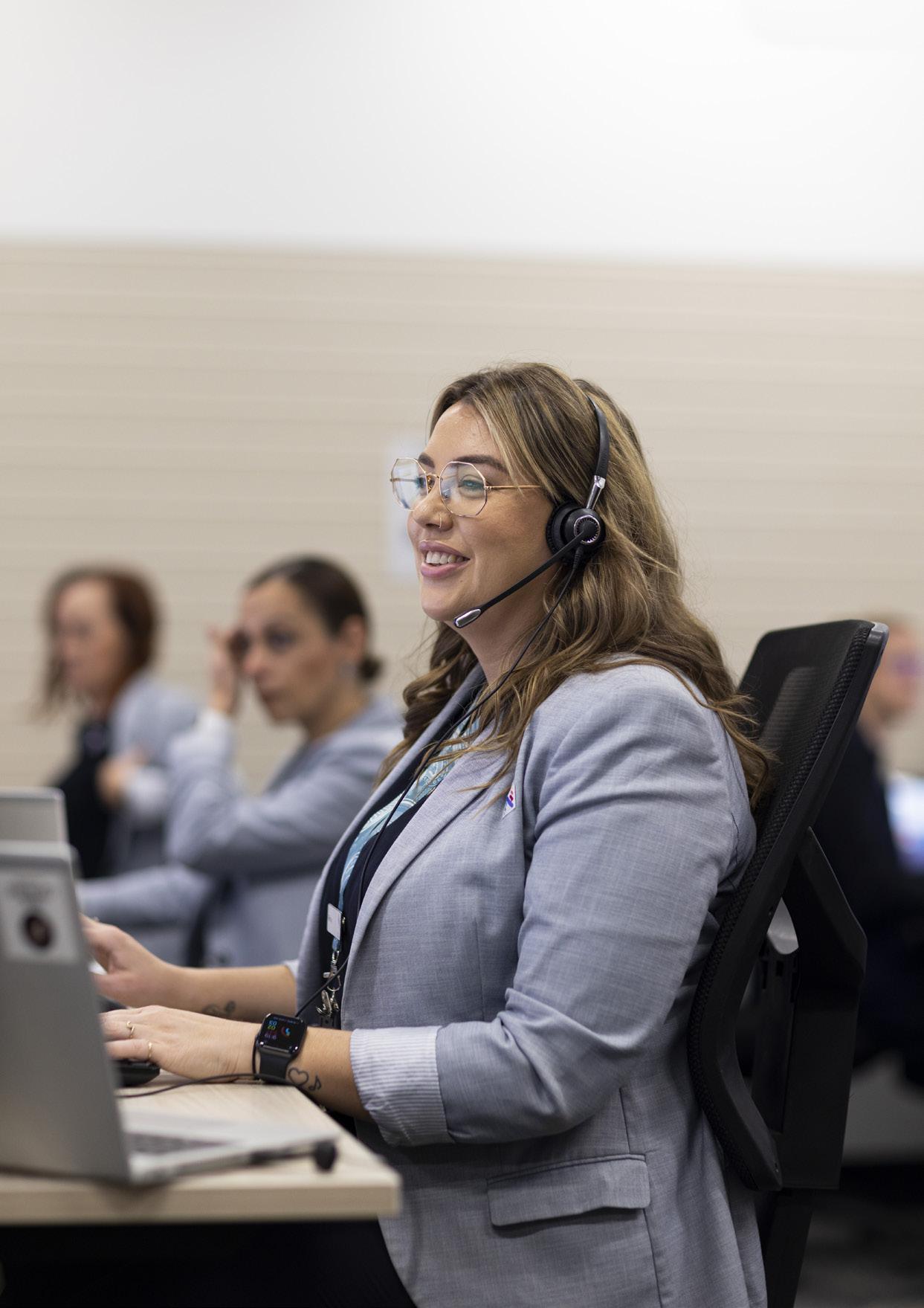


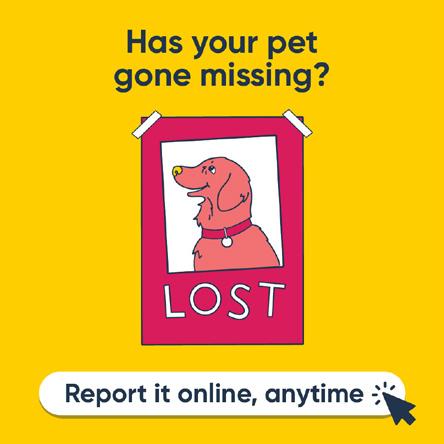


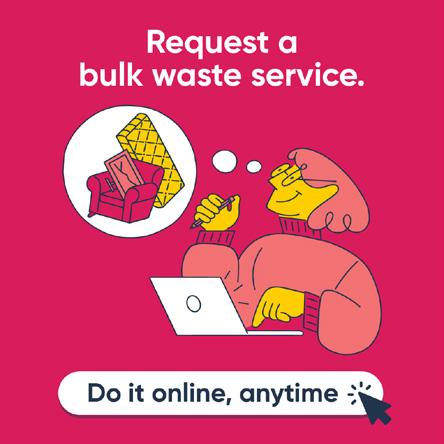
CN’s CX Transformation Program is a multi-year initiative designed to enhance organisation-wide service delivery and capabilities to meet our customers’ needs, ultimately ensuring a consistent and trusted customer experience.
In year four of the program, our key strategic priority was to design customer-centred experiences and digitise services and ways of working to empower our customers and employees.
Our award-winning organisation-wide CX training of new CN employees continued this year, embedding our customer TRuST Principles (Transparent, Respectful, You, Simple, Timely). To recognise employees who consistently exhibit trust-building behaviours, employees across the breadth of CN (including aquatics, compliance, building trades, rates, roads, waste, planning, assets and accounting) have been awarded our monthly TRuST Awards.
However, the greatest focus this year has been continuing to deliver enhancements to provide a better digital customer experience.
In 2024/2025, a new Customer Request Management (CRM) system was implemented. The system digitised 75 request forms across CN’s service catalogue, making it easier for customers to report issues and make requests for service online – anytime, anywhere.
Digital uptake from the community has been strong. Of the 71,266 customer requests received in total (up from 48,766 in 2023/2024), 57% were submitted self-serve via the new digital webforms (up from 38%) and 31% via phone (down from 47%).
By the last quarter of the year, 60% of customer requests were being received via webforms, compared to only 28% via phone. This represents a year-on-year increase of 46% for webform and decrease of 35% for phone. This high level of adoption indicates that customers are finding the new webforms easy to locate and use, and that self-serve options offer the convenience they desire, freeing up more time for our Customer Service Officers to help customers who need support via other channels.
Work on CN’s digital transformation continues next year with the planned delivery of further online services and experiences for customers, including a personalised customer portal with property and rates account information, seamless online payments, online application submission, and the ability to view transaction history and track progress of current requests and applications.

In 2022, continuous improvement was introduced as a requirement in the revised IP&R framework, focusing on better meeting the community’s expectations around priorities and service levels.
The key benefits of continuous improvement and service optimisation include:
• Alignment of services with community needs
• Higher-quality service provision
• Cost savings and income generation
• Increased efficient use of resources
• Partnerships and networks with other local governments and service providers
• Increased capacity of staff to respond to the changing needs of the community
• Staff working collaboratively across departments
A more systematic approach to understanding future community needs.
This framework is designed to guide CN in implementing Service Reviews in alignment with the IP&R Guidelines for Local Government. Service Optimisation Reviews evaluate the activities and functions within a council service area to ensure alignment with community needs and to identify opportunities for resource efficiency. This framework is integral to our commitment to ongoing improvement in service delivery.
1 2 3 4
5
Project Plan
• Define the service to be reviewed
• Agree on objectives, scope and resources
Analyse Service
• Gather service data and benchmarking information Select service optimisation model and priorities
• Examine service activity levels
Engage Stakeholders
• Undertake stakeholder engagement
• Final risk assessment
Implement Change
• Develop an Implementation Plan
Evaluate Review
• Gather feedback and measure change
• Identify stakeholders
• Draft the Project Plan
• Conduct financial and other relevant analysis Initial risk assessment Summarise change options
• Produce final change recommendations
• Implement and monitor changes
Report outcomes and share learnings
• Drive continuous improvement
• Draft Project Plan
• ELT approval to begin review
Final Service Review Plan
Service Optimisation Report ELT endorsement
Implementation Plan
• Evaluation Report
In 2024/2025, CN has initiated various programs designed to promote continuous improvement throughout the organisation. As part of this commitment, we commenced our first review of parks and open spaces under the IP&R framework. Through this review, we were able to trial our Service Optimisation Framework and identify areas for improvement, which will inform future refinements to the framework and its application.
The review of parks and open spaces has led to positive changes in service delivery for our community. A range of actions have been recommended for implementation, including streamlined processes, enhanced collaboration across teams, better resource allocation and clearer roles and responsibilities. These outcomes reflect our commitment to continuous improvement and ensuring our services are responsive to community needs.
In 2024/2025, we commenced a review of Newcastle’s coastal buildings, supported by extensive community engagement to inform Stage One: User Needs Analysis. Future stages will focus on assessing and prioritising upgrades across coastal assets, ensuring alignment with CN’s broader Coastal Management Programs. To guide the long-term maintenance and renewal of Newcastle’s coastal infrastructure, a Coastal Buildings Revitalisation Plan will be developed.
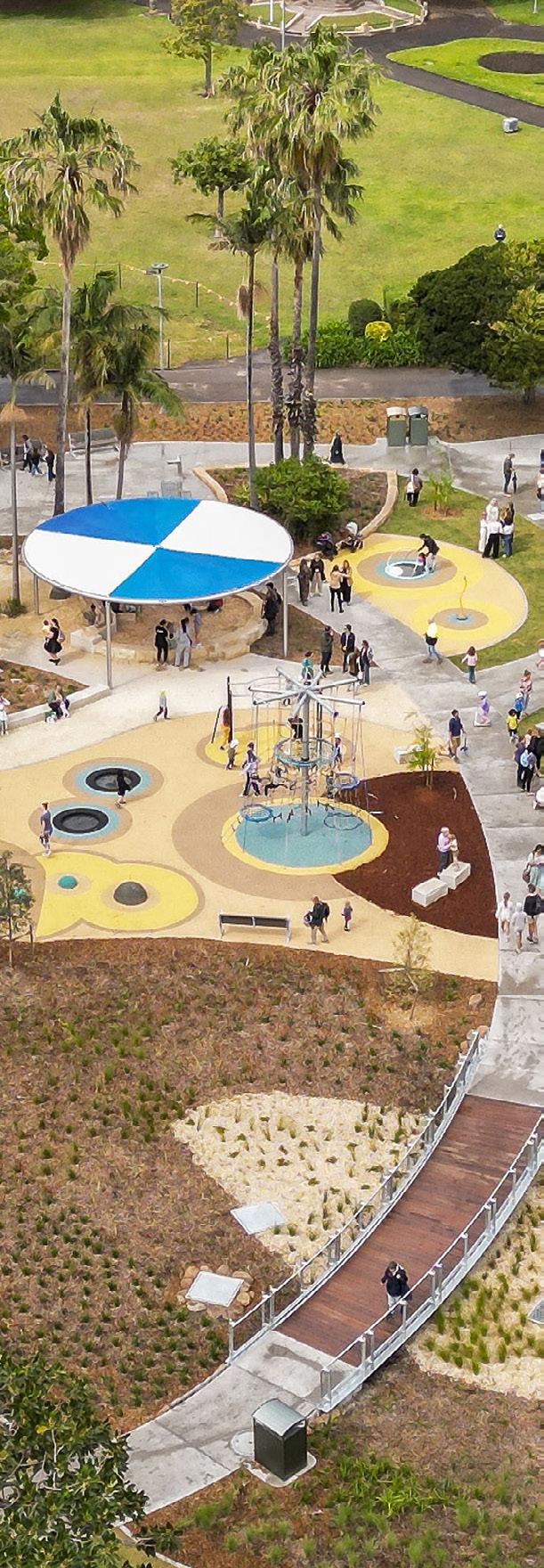
While this Annual Report is dedicated to wrapping up the 2024/2025 financial year, it also provides an opportunity to briefly look forward to the initiatives included for 2025/2026 and beyond.
As we enter the first year of the 2025–2029 Delivery Program, CN is focused on delivering tangible outcomes that reflect our community’s aspirations for a liveable, sustainable and inclusive global city.
Guided by the revised Newcastle 2040 vision, our work continues to be structured around our four strategic themes, Liveable Newcastle, Sustainable Newcastle, Creative Newcastle and Achieving Together, each representing the values and priorities of our diverse community.
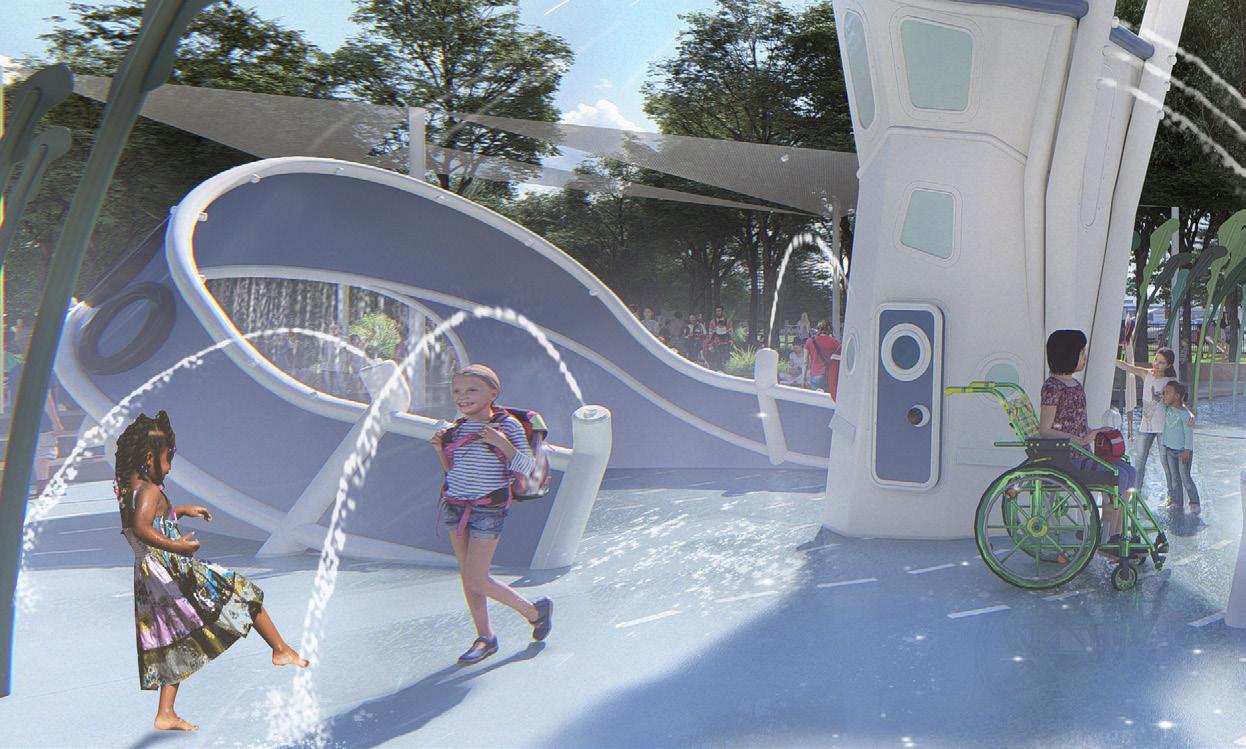
In 2025/2026, we are investing a record $431.8 million to support Newcastle’s growth and resilience. This includes a $154.5 million capital works program, delivering infrastructure upgrades, environmental initiatives and community facilities that will shape the future of our city.
Key highlights include:
• $42.2 million for road renewal and upgrades, including the Western Corridor Road Widening at Minmi Road and Longworth Avenue
• $20.6 million for recreation, aquatics and sports, including the Foreshore Park Playspace
• $11.9 million for revitalising urban centres such as Hunter Street Mall and Georgetown
• $5.1 million for coastal management, including Stockton coastline protection
• $5.4 million for cultural facilities including the Art Gallery, Libraries, Museum and Civic venues
• $4.4 million for affordable housing initiatives
• $1.5 million for climate action and sustainability programs.
These investments are underpinned by a commitment to financial sustainability, with a modest surplus of $258,000, ensuring we can continue to deliver the services that matter most.
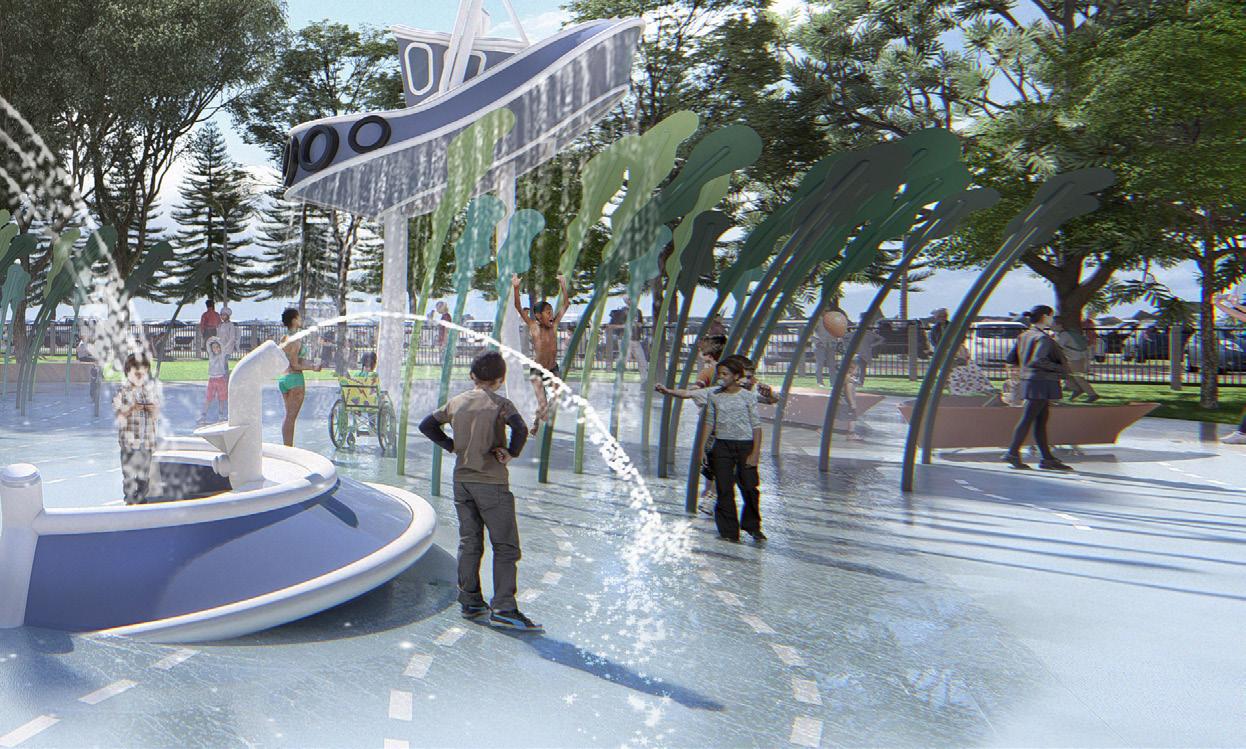


The priorities and objectives in this theme include:
Priority 1.1
Enriched neighbourhoods and places
1.1.1 Great spaces
1.1.2 Well-designed places
1.1.3 Protected heritage places
Priority 1.2
Connected and fair communities
1.2.1 Connected communities
1.2.2 Inclusive communities
1.2.3 Equitable communities
1.2.4 Healthy communities
Priority 1.3
Safe, active and linked movement across the city
1.3.1 Connected cycleways and pedestrian networks
1.3.2 Road networks
1.3.3 Managed parking
1.3.4 Effective public transport
Priority 1.4
Innovative and connected city
1.4.1 Emerging technologies
1.4.2 Digital inclusion and social innovation
The services we provide in this theme include:
• Library services
• Digital services and innovation projects
Open spaces and playgrounds
• Sporting facilities
• Regulatory and compliance services
• Aquatic services
• Facility management and city presentation
• Parking services
Development assessment
• Community facilities, programs and partnerships
• Transport, traffic and local roads
• Civil construction
• Building trades
• Fleet and plant maintenance
Stormwater services
The assets we manage in this theme include:
• 1 holiday park
2 ocean baths
• 5 inland swimming pools
• 10 beaches (6 patrolled)
• 8 lifeguard facilities
• 250 recreational parks
• 147 sporting grounds
127 transport shelters
• 17 off-leash dog areas
• 15 community halls and centres
• 134 playgrounds
• 14 libraries (11 CN-owned)
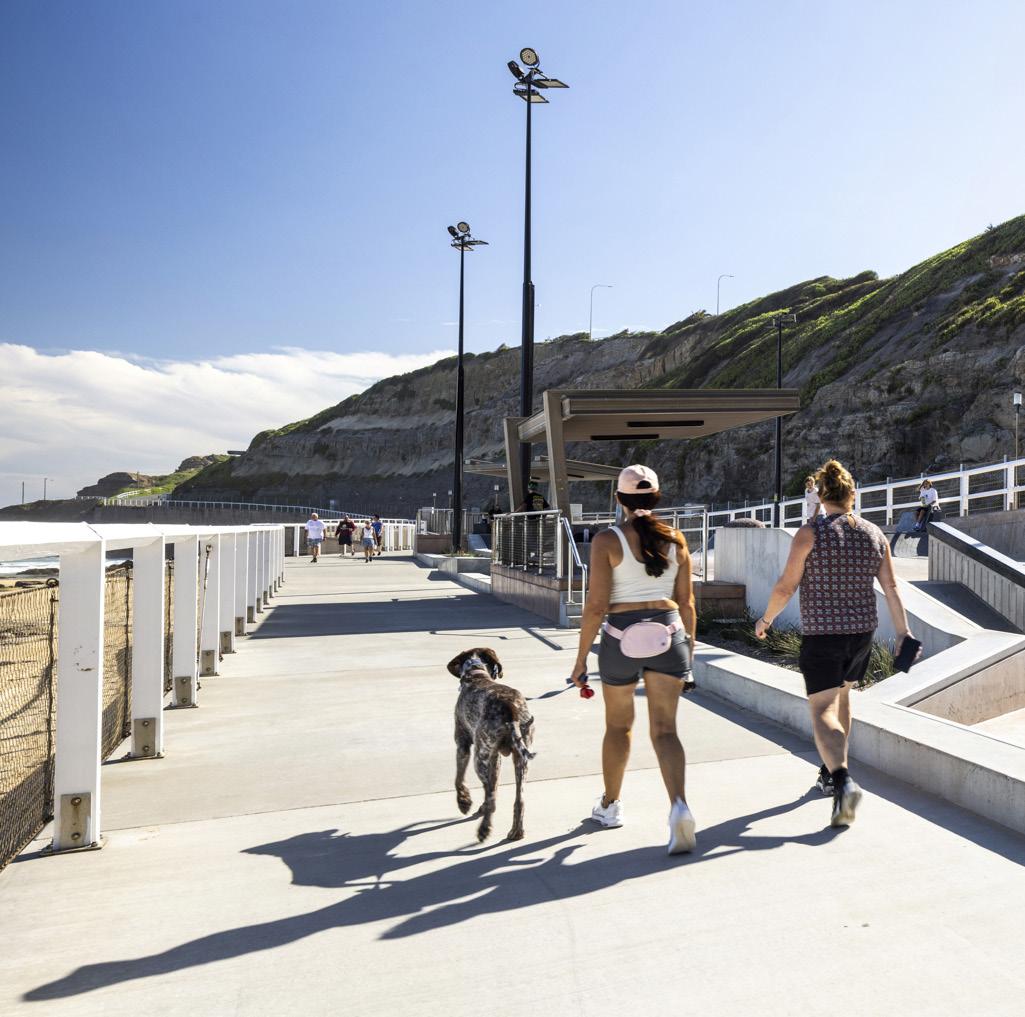
The informing strategies include:
Social Strategy 2023–2027
• Local Strategic Planning Statement 2020–2040
• Inland Pools Strategy 2043
The supporting strategies and plans include:
Disability Inclusion Action Plan 2022–2026
• Cycling Plan 2021–2030
• Parking Plan 2021–2030
• Local Housing Strategy 2020–2040
• Heritage Strategy 2020–2030
Strategic Sports Plan 2020–2030
• Plans of Management and Masterplans
• Dogs in Open Space Plan
Overall action and measure performance
Total actions 100%
Actions completed or on track 65
1.1 Enriched neighbourhoods and places
Total measures 50% Measures on track 10
* Measure changed from sportsgrounds to sporting facilities in 2021/2022.
** Beach numbers are numbers on the beach and in the water. It excludes the promenade and grass areas. Includes Stockton, Nobbys, Newcastle, Bar, Dixon Park and Merewether Beaches and Newcastle and Merewether Ocean Baths. Action Performance
1.2 Connected and fair communities
of community satisfaction with libraries
Number of library loans
Number of Home Library Service items and members
Attendance numbers at programs (libraries)
Visits to physical service points (libraries)
1.3 Safe, active and linked movement across the city
(2023/2024)
members
items (2023/2024)
(2023/2024)
(2023/2024)
Distance of roads renewed (Resurfaced local roads)
Number of bike parking spaces within Local Centres*
* Measure removed. Data collection not commenced.
1.4 Innovative and connected city
of community satisfaction with the city’s innovation
Number of heritage collection items digitised
Number of Pay by Phone parking transactions
per annum
(2023/2024) 1,094,683
Number of webchat conversations 2,692 (2023/2024) 3,266
Number of e-Library loans 544,389 (2023/2024) 858,945
* This question has been removed from the Community Satisfaction Survey.
Note: Community satisfaction measures relate to overall satisfaction with services and facilities by category (where 1 = very dissatisfied and 5 = very satisfied).
Expanding Newcastle’s cycling and pedestrian network
CN delivered significant progress towards a safer, more connected cycling and pedestrian network, with key infrastructure projects completed and new links established across the city. Highlights include:
• Maud Street upgrade: A $2.3 million safety upgrade at Waratah West, providing improved pedestrian and cyclist access across busy Maud Street on the popular R6 cycleway. Supported by $300,000 in NSW Government funding, the project included replacing the existing pedestrian refuge with a new signalised crossing, shared paths and kerb extensions.
• Islington cycleway link: A $1.5m section of the R6 cycleway connecting TAFE Newcastle to Islington Park via Islington Public School. The 600m cycleway included a combination of onroad bidirectional separated cycleway, shared path and a new shared path raised crossing, along with landscaped kerb extensions at the TAFE entrance. This project was endorsed and funded with $950,000 in NSW Government election commitment funding, secured by Tim Crakanthorp MP, Member for Newcastle.
• Jesmond Cycleway: CN secured a $2 million grant to deliver a 950m shared path along Blue Gum Road, through Heaton Park and Maclure Reserve. This project includes two new bridges over Dark Creek, as well as an upgraded shared path raised crossing on Blue Gum Road. The route improves access through Heaton Park and Maclure Reserve and connects the Cameron Street shared path to the William Street shared path bridge over the Newcastle Inner City Bypass at Jesmond.
• Reserve Road shared path: CN secured a $500,000 grant to construct a 300m shared path along Reserve Road, The Hill, from The Terrace to York Drive. This will replace the existing footpath across the King Edward Park frontage and connect to the future Bathers Way project.
• Glebe Road safety improvements, Adamstown: CN began work on a $3.3 million upgrade to improve safety at the busy intersection of Glebe Road, St James Road, Park Avenue and Court Street. The project includes new traffic lights, intersection realignment, shared paths, cycle ramps and on-road cycle lanes, enhancing access to schools, public transport and the Fernleigh Track. Supported by $971,000 from the Federal Government’s Black Spot Program, the upgrade addresses a long-standing community concern and improves safety for all road users.
• Walking and Mobility Plan: CN adopted a 10-year strategy to improve pedestrian infrastructure, with nearly $2 million invested in new footpath projects across the city. The plan prioritises accessibility, safety and connectivity, with 24 key actions guiding delivery.
CN is delivering a record $6.3 million investment in cycleway and pedestrian infrastructure in the 2025/2026 Budget, marking its most ambitious active transport program to date. Planned projects include:
• A new shared path raised crossing on Morehead Street, Lambton, as the first stage of a new cycleway from Lambton Park to Croudace Street, Lambton
• An upgrade of the existing raised pedestrian crossing on Blue Gum Road to a raised shared path crossing, as the first stage of the Jesmond Cycleway from William Street to Cameron Street through Heaton Park and Maclure Reserve
• Roundabout cycling and pedestrian safety improvements in Parkway Avenue, Hamilton South, including two shared path raised crossings at Newcastle High School
• Shared path upgrades on Reserve Road, The Hill
$2.3 million in new footpath construction.
In addition to infrastructure, CN is supporting community engagement through cycling education and bike maintenance workshops, helping residents build confidence and skills to embrace active transport.
Through strategic investment, regional partnerships and community-led planning, CN continues to lead the way in creating a liveable, walkable and cycle-friendly city.
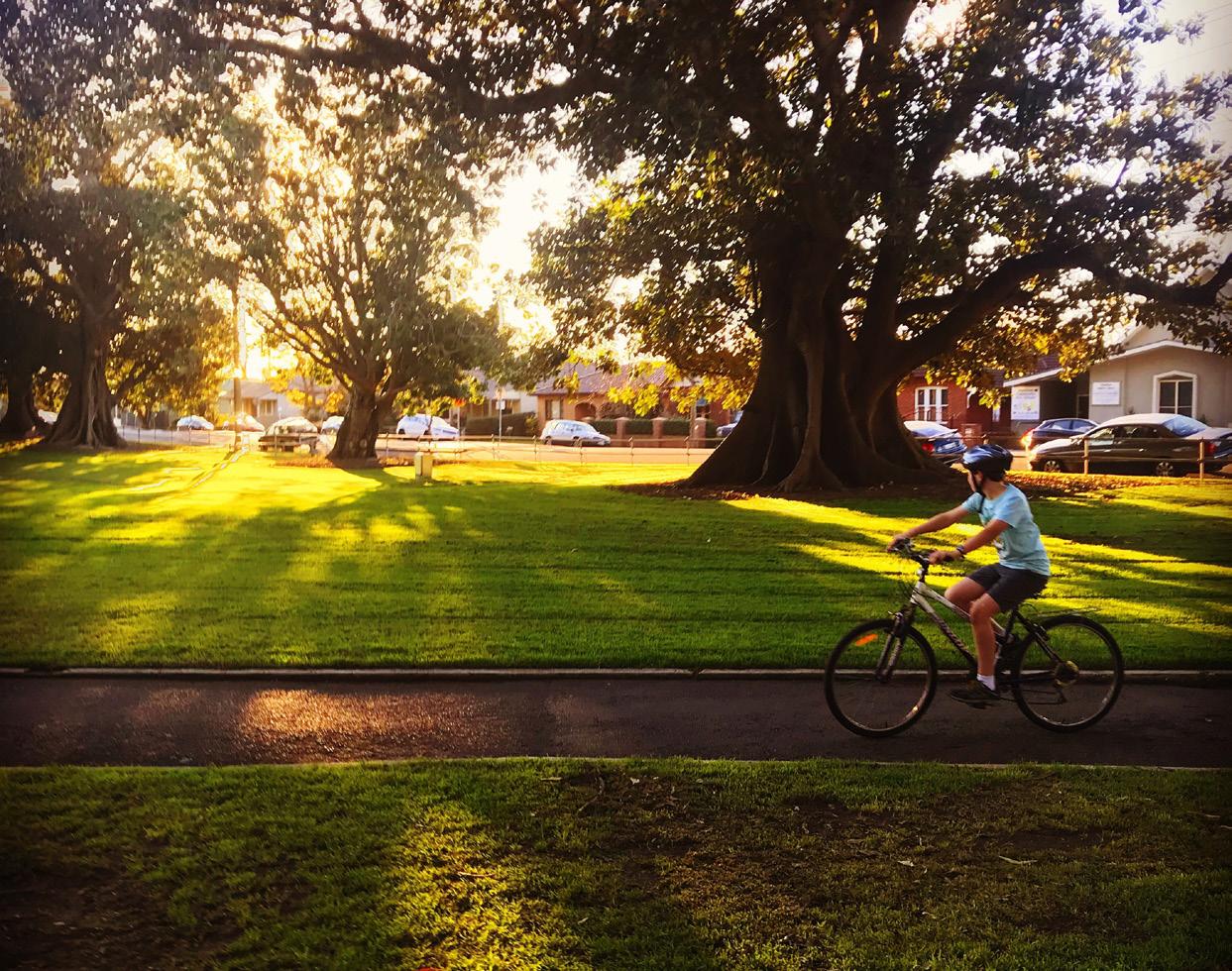
CN commenced development of the Coastal Buildings Revitalisation Plan, a first-of-its-kind initiative in NSW aimed at guiding the future of Newcastle’s iconic coastal infrastructure. The plan will provide a strategic framework for the maintenance, renewal and upgrade of buildings and assets along the coastline, from Stockton to Merewether Ocean Baths Pavilion.
The year was defined by extensive community engagement, with CN hosting focus groups and opening public consultation to gather input from residents, surf lifesaving clubs, beachgoers and other stakeholders. These conversations explored how the community uses and values key coastal facilities, such as surf club pavilions, lifeguard stations, beach kiosks, shade shelters, amenities and sea walls, which play a vital role in recreation, safety and social connection.
This feedback will form the foundation of the revitalisation plan, ensuring it reflects local priorities and balances social, environmental and technical considerations.
With community consultation now complete, CN is finalising Stage One of the project, the User Needs Analysis. Stage 2 will commence once the Coastal Management Programs (CMP's) outcomes are understood and will involve considering upgrades, maintenance and renewal requirements of each asset, along with prioritisation.
The review will be guided by CN’s broader CMPs, ensuring that future upgrades and investments align with long-term goals for resilience, accessibility and environmental sustainability.
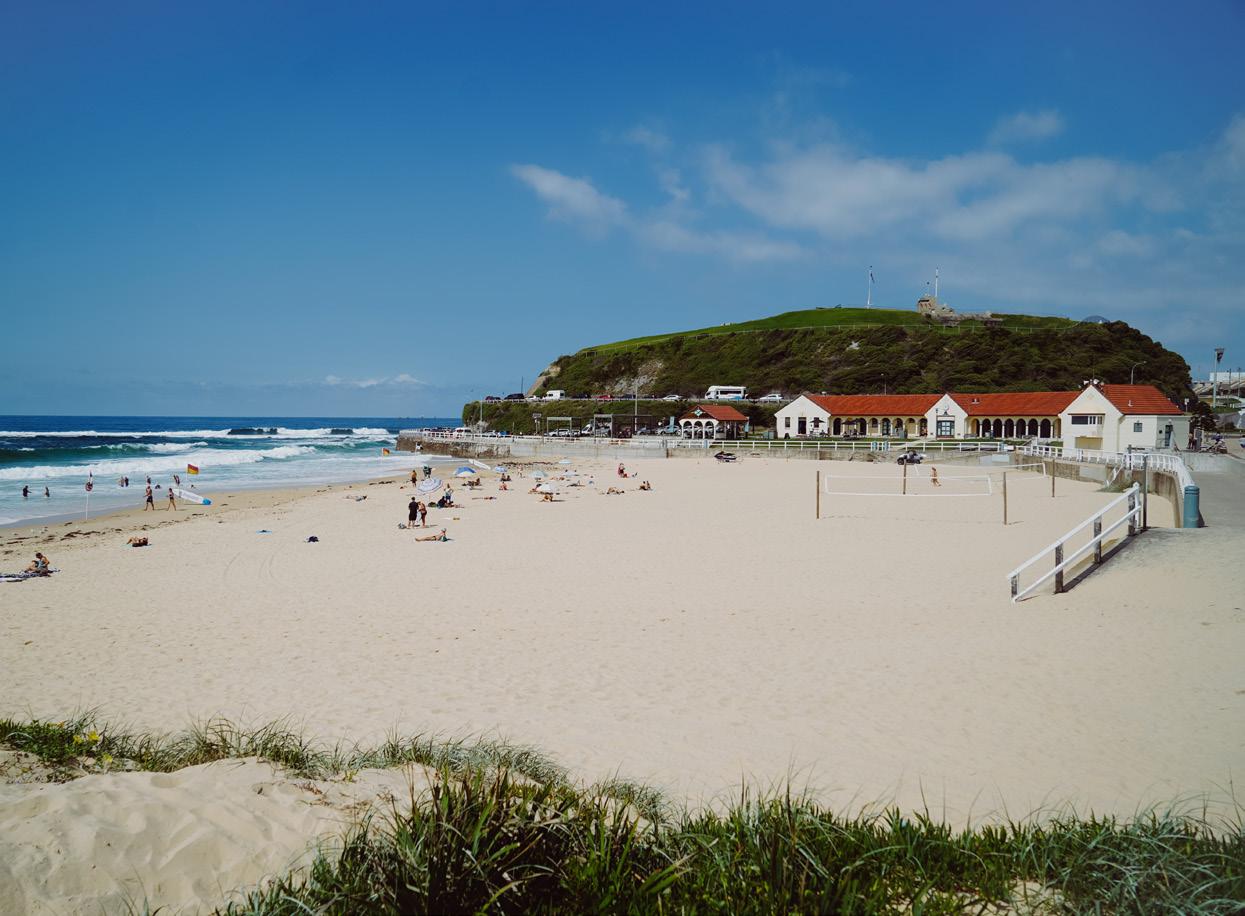
CN achieved a major milestone with the adoption of the Broadmeadow Place Strategy in March 2025. This long-term vision sets the foundation for one of Newcastle’s most significant growth areas and reflects more than two years of investigative studies, planning, placemaking, and engagement with the community and stakeholders.
The draft strategy was publicly exhibited in June and July 2024, during which CN invited feedback from residents, government authorities and industry representatives. Informed by this input, the final strategy includes several key refinements, such as updates to the infrastructure framework, enhancements to Cameron’s Hill Heritage Conservation Area, improvements to the Aboriginal engagement process and a strengthened implementation plan.
With the strategy now adopted, CN is focused on delivering its outcomes and beginning to realise the vision for Broadmeadow. This includes preparing an Infrastructure Contributions Plan to support the delivery of local public infrastructure, alongside technical investigations to inform future planning controls.
CN is also actively sharing the strategy with industry, having presented it at key forums including the Planning Institute of Australia’s Planning Congress, the Housing Institute of Australia’s Trade Breakfast and the Property Council of Australia’s NSW Housing Summit.
What
Council endorsed the Affordable Housing Contributions Scheme in March 2025, representing a significant advancement in CN’s efforts to address housing affordability across the region. The scheme introduces a structured mechanism for collecting contributions from new residential developments, which will be directed towards the delivery of affordable housing for very low to moderate-income households experiencing housing stress.
Developed through extensive stakeholder consultation and detailed feasibility analysis, the scheme is designed to balance the need for increased affordable housing supply with the practical considerations of development viability. Contributions may be made in the form of monetary payments, land or dwellings, providing flexibility in how affordable housing outcomes are delivered.
The scheme has been submitted to the Department of Planning, Housing and Infrastructure for finalisation and approval.
What’s
Finalisation occured in early 2025/2026, meaning the Affordable Housing Contributions Scheme will be phased in over time, allowing developers to incorporate contribution requirements into their planning processes. This staged implementation will support a smooth transition and ensure alignment with broader planning and development frameworks.
CN progressed the revitalisation of the iconic Lambton Park building, securing development approval in March 2025 and receiving a $1 million funding boost through the NSW Government’s Crown Reserves Improvement Fund. Originally constructed in the 1940s as a baby health centre and later used as a café, the building is about to undergo its first major adaptive reuse in over 80 years.
The upgrade will transform the unused site into a modern, accessible café designed to foster social connection and inclusion. Works will include a new commercial kitchen, accessible bathroom facilities, and an open-plan layout with bi-fold doors opening onto a rear deck overlooking the children’s playground. The design includes ramp access to support parents with prams and people with mobility challenges.
The project builds on CN’s commitment to enhancing community spaces and follows recent improvements to the Lambton Park precinct, including upgraded playground equipment. The revitalised café is expected to become a vibrant addition to the Elder Street commercial area and a welcoming destination for park visitors.
The construction of the Lambton Park café upgrade commenced in October. Once complete, the revitalised building will offer a welcoming, accessible space that enhances the park’s role as a community hub. The café is anticipated to open by the end of 2025.
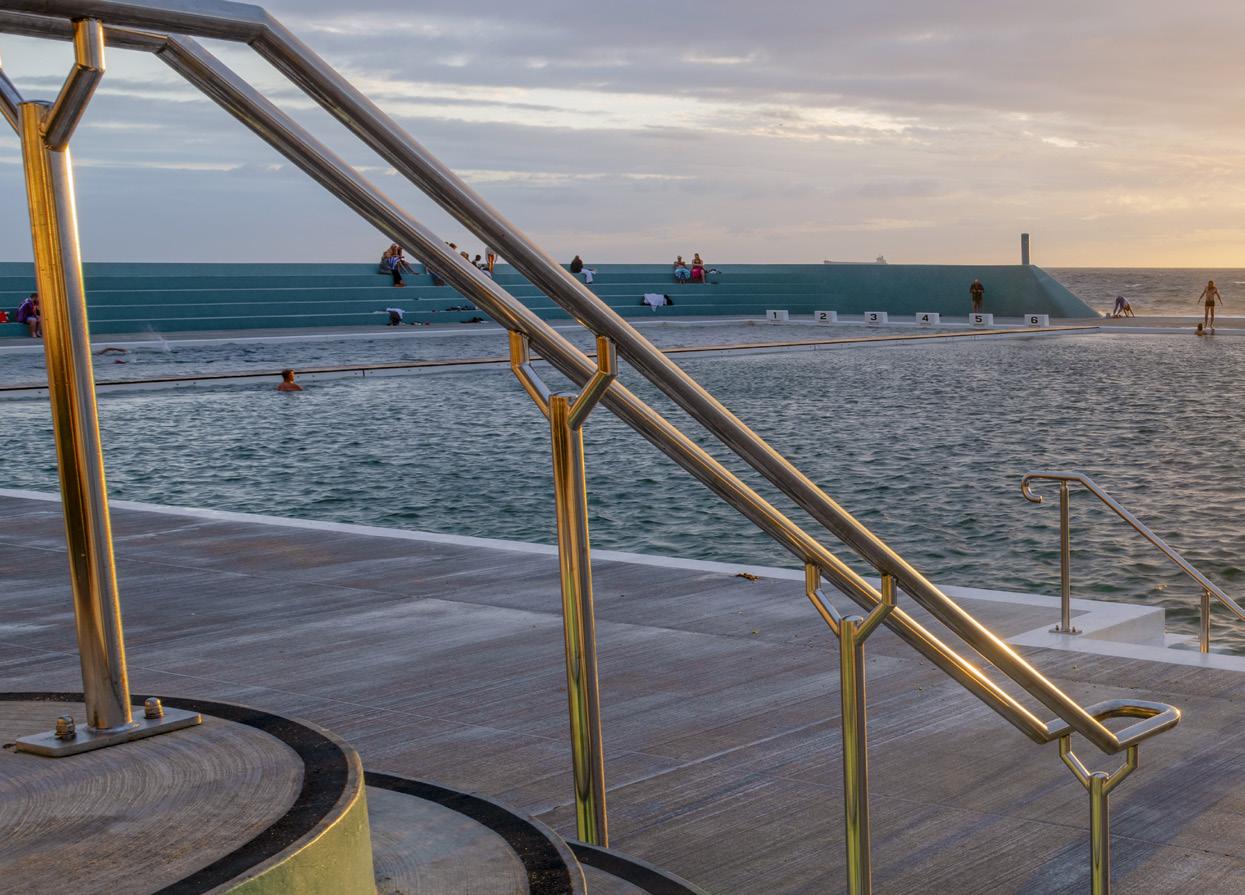
CN supported the successful nomination of the Newcastle Ocean Baths for inclusion on the NSW State Heritage Register, reinforcing our commitment to protecting places of cultural and community value.
The nomination was initiated by the Friends of Newcastle Ocean Baths, with support from the National Trust Newcastle–Hunter Branch. Recognising the site’s historical and architectural significance, CN provided technical and strategic support throughout the process. This included the preparation of heritage documentation and a formal presentation to the State Heritage Register Committee, delivered by CN staff and a consultant heritage architect.
Opened in 1922, the Ocean Baths are a landmark of Newcastle’s coastal identity, known for their distinctive Art Deco design and enduring role in beach culture and recreation. The heritage listing, confirmed in March 2025, acknowledges the site’s historical, aesthetic and representative value, particularly in demonstrating early government investment in public amenities and shifting social norms around mixed bathing.
The heritage listing provides enhanced protections and supports CN’s long-term vision for the conservation and renewal of the Ocean Baths precinct. As part of the next phase, CN will seek planning approval and State Heritage approval for Stage 2 of the project through a development application and heritage works application process, which includes assessment by CN and Heritage NSW. This will be followed by detailed design, with the aim of having the project tendered and construction commenced within the current Council term.


CN strengthened its commitment to beach and aquatic safety through a series of targeted initiatives aimed at improving emergency response, public awareness and inclusivity.
A key achievement was the introduction of scenario-based training for lifeguards, enhancing real-time decision-making and emergency preparedness. This advanced training supports CN’s goal of maintaining a high standard of safety across Newcastle’s beaches and aquatic facilities.
To address language barriers and improve communication with culturally and linguistically diverse communities, CN introduced QR-coded water safety signage at beach entrances and ocean baths. These signs link to a multilingual safety guide, now available in nine languages – Japanese, traditional and simplified Chinese, Arabic, Vietnamese, Spanish, Punjabi, Dari and Swahili – helping ensure all beachgoers understand key safety messages such as swimming between the flags and recognising hazardous conditions.
CN improved first aid training by offering tailored sessions for work groups, resulting in cost savings and more relevant skill development. The number of Trainee Beach Lifeguards increased from two to three, with the program recognised as a finalist in the 2025 NSW Local Government Excellence Awards.
CN’s Water Safety Education Program reached over 13,000 students across the region, combining practical safety education with a creative poster competition at inland pools to reinforce life-saving messages in engaging ways.
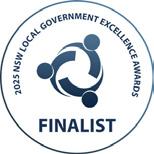
Aquatic Services will build on the momentum of recent achievements to further enhance beach and aquatic safety across Newcastle. We’ll continue to embed best practices, support continuous improvement and strengthen community engagement.
Key initiatives include:
• Celebrating 60 years of our Water Safety Education Program, which continues to reach around 13,000 primary school students annually through lifeguard-led sessions that promote key water safety messages
• Expanding scenario-based training to improve emergency response and interagency coordination
• Enhancing accessibility and inclusion
• Continuing the Trainee Lifeguard Program to support future workforce development.
These efforts reflect CN’s ongoing commitment to creating safer, more inclusive aquatic environments for all.
CN successfully delivered Youth Week 2025, supporting seven youth-led events that engaged 1,479 young participants and involved 115 youth organisers, with 21 paid roles. The program showcased CN’s commitment to youth empowerment, inclusion and creativity, while leveraging key community assets.
Key highlights:
• Hosting flagship events at CN venues including Newcastle Museum and Newcastle City Library
• Engaging 1,479 young people, with 115 involved in planning and delivery
• Providing paid roles and mentorship to 21 youth organisers and artists
• Partnering with headspace, MusicNSW, Youth Rising, CALD Connect and local schools
Delivering high-impact events such as the NM:PM Future Street Party, Multicultural Youth Conference and NovoExpo Eco Footprint Showcase.
Youth Week 2025 was co-designed with the Newcastle Youth Council. Events promoted youth voice, sustainability and cultural inclusion. CN invested over 300 staff hours in planning and delivery, and provided in-kind support to additional programs such as the Polyphonic music disability initiative at Newcastle Library and MusicNSW mentoring sessions at Newcastle Museum.
What’s next
In 2025/2026, CN will refine the Youth Week grant process to improve the efficiency of artist payments and allow earlier promotion of events. We will also focus on broadening event diversity, including online formats and more active recreation opportunities.
CN continued to lead the state in library performance, with Newcastle Libraries ranked first in NSW for total items borrowed, home library services and overall membership. According to the State Library of NSW’s 2024 statistics, Newcastle residents borrowed nearly four times the state average at more than 1.7 million items.
Newcastle Libraries also delivered more than 47,000 items through its home library service, seven times the state average, ensuring access for residents unable to visit in person due to age, mobility or health.
Key statewide rankings:
• First in NSW for total items borrowed
• First in NSW for home library service
• Second in NSW for e-audio loans
• Third in NSW for toy and game collection loans
Fast facts:
• Total members: 158,856
• Total visits: 691,715
• Number of branches: 13
• Items in collection: 1,063,343
• Events and programs delivered: 2,255
Total attendees: 49,136
These results reflect CN’s continued investment in library infrastructure and programming, with nearly $7 million invested over five years, including $1 million in 2023/2024 to upgrade facilities and maintain the collection.
Newcastle Libraries continued to support creative development and community storytelling through initiatives such as:
• The fifth annual Your Summer Stories campaign, featuring a curated reading list, a Summer Reading Challenge for children and author talks with leading Australian writers
• The launch of a new zine collection at Newcastle City Library, preserving local voices and creative expression
• Linguistically diverse storytime sessions, dementia-friendly activities, sustainability initiatives like the Repair Café, and events for Youth Week and the NSW Seniors Festival.
In May, CN introduced new access arrangements at Wallsend Library in response to ongoing antisocial behaviour. OPEN+ technology was installed to manage entry after 3pm on weekdays, ensuring a safer environment for staff and visitors. While the vast majority of library users engage respectfully, CN remains committed to maintaining libraries as safe, inclusive and welcoming spaces.
CN will continue to expand its library programming with a focus on inclusion, innovation and community engagement. Future initiatives will build on the success of the zine collection, reading campaigns and infrastructure upgrades, offering more opportunities for residents to connect, create and learn.
Work towards the launch of a world-class building expansion and renewed operations as a two-and-a-half times larger art gallery
Provide aquatic facilities to meet community needs and industry requirements
Support safe use of beaches and baths through professional lifeguard services
Facilitate the operation of community centres, halls and seniors centres for use by the community
Provide and maintain active and passive open spaces to promote the wellbeing of the community
Plan parks and recreation facilities that support inclusivity, health and wellbeing, safety and liveability
Provide and maintain sportsgrounds and supporting services to appropriate standards that meet community needs
Provide venues and spaces for hire by the community
Build on relationships with Local Aboriginal Land Councils
Action completed
Art Gallery
Community & Recreation
Community & Recreation
Community & Recreation
Community & Recreation
Community & Recreation
Community & Recreation
Museum Archive Libraries & Learning
Planning Transport & Regulation
Deliver maintenance, renewal and upgrade of retaining wall and like structures, to meet service level standards
Develop and implement asset management processes to guide the delivery of services for built and civil infrastructure
Deliver routine inspection and condition assessment programs for built assets, informing maintenance and renewal requirements
Deliver building trade services to maintain high-quality facilities and assets that meet service level standards
Deliver parks and recreation facilities that support inclusivity, health and wellbeing, safety and liveability with the construction of new assets and renewal of existing assets
Undertake Service Review of land transactions and other dealings to implement innovation and continuous improvement
Carry out renewal and maintenance of assets and facilities to ensure they are fit for purpose
Deliver improvements that are focused on inclusion
Deliver a high standard of development outcomes for the built environment, including efficient determination of applications
Prepare and facilitate delivery of Broadmeadow Place Strategy
Participate in government planning reform and implement required changes to internal processes
Implement Housing Strategy and continue to evolve the Affordable Housing Contribution Scheme
Implement initiatives through the Local Strategic Planning Statement and facilitate the delivery of actions
Apply appropriate design principle considerations and standards to public domain infrastructure project design
Continue to deliver Local Centres Public Domain Program
Plan, design and implement the remaining sections of Bathers Way
Assets & Facilities
Assets & Facilities
Assets & Facilities
Assets & Facilities
Community & Recreation
Finance Property & Performance
Museum Archive Libraries & Learning
Museum Archive Libraries & Learning
Planning Transport & Regulation
Planning Transport & Regulation
Planning Transport & Regulation
Planning Transport & Regulation
Planning Transport & Regulation
Project Management Office
Project Management Office
Project Management Office
Ensure operation of heritage assets (City Hall and Civic Theatre) meets conservation goals and is legislatively compliant
Plan and manage community land as per Local Government Act 1993 and Crown Land Management Act 2016
Increase local community understanding and participation to conserve, enhance and celebrate Newcastle’s heritage places
Maintain and deliver community information and data sources to support community development within the city
Implement identified actions within the Disability Inclusion Action Plan (2022–2026)
Facilitate and support projects and programs where the strength, resilience and diversity of our communities are respected, recognised and celebrated. Equality of opportunity for employment, skills development and digital inclusion is prioritised for all
Facilitate and support projects and programs to enhance access to affordable, sustainable and inclusive services, housing, spaces and facilities that improve the quality of life and the strength of our community
Facilitate and advocate the incorporation and support of the United Nations Sustainable Development Goals throughout CN’s IP&R suite of documents
Coordinate fair and equitable licensing of public spaces with positive customer experience
Govern and support Grants and Sponsorship Program and support grant governance across the organisation
Civic Services
Community & Recreation
Planning Transport & Regulation
Community & Recreation
Community & Recreation
Community & Recreation
Finance Property & Performance
Media Engagement
Economy & Corporate Affairs
Media Engagement
Economy & Corporate Affairs
ACTION
Deliver graffiti and vandalism rectification services, contributing to high-quality asset presentation to meet service level standards
Deliver services to maintain high-quality public amenities that meet service level standards
Deliver services to maintain high-quality coastline assets that meet service level standards
Deliver cleaning services to maintain high-quality facilities and assets that meet service level standards
Deliver maintenance, renewal and upgrade of stormwater infrastructure to meet service level standards
Promote water safety awareness that supports community wellbeing and continue to develop and deliver initiatives to increase awareness
Facilitate cemetery operations and management in Minmi, Stockton and Beresfield
Facilitate and support active and health-related projects and programs delivering communities a stronger physical, mental and spiritual health outcome, and enhancing a sense of safety and security while assisting communities to become more resilient to environmental and other disasters/emergencies
Promote and encourage the use of parks and facilities for community health and wellbeing through a variety of channels
Deliver high-quality childcare and early childhood education services to families in Beresfield and surrounds that are responsive, fit for purpose, and meet legislative and statutory requirements
Provide animal management services, including education of the community and enforcement of regulations
Carry out a broad range of compliance activities, including patrols, inspections, investigations and education, to protect public safety, the environment and public amenities
Assets & Facilities
Assets & Facilities
Assets & Facilities
Assets & Facilities
Assets & Facilities
Community & Recreation
Community & Recreation
Community & Recreation
Community & Recreation
Museum Archive Libraries & Learning
Planning Transport & Regulation
Planning Transport & Regulation
Ensure projects incorporate objectives in the Disability Inclusion Action Plan (2022–2026) to enable safe and active movement across the city
Deliver improvements to existing infrastructure to accommodate better pedestrian connectivity and accessibility across the LGA’s network of footpaths, shared paths and cycleways
Upgrade, expand and connect cycling facilities (in accordance with the Safe System approach), including shared paths, dedicated cycleways, bike parking and on-road provision
Undertake planning based on data-driven projections and manage effective delivery of investment in transport infrastructure in alignment with strategic goals under the Transport Program (Parking, Pedestrian, Cycling, Traffic Management)
Deliver inspection, maintenance, renewal and upgrade of bridges to meet service level standards
Develop and implement road rehabilitation and resurfacing programs to meet identified levels of service
Deliver routine inspection and condition assessment programs for civil infrastructure, informing maintenance and renewal requirements
Deliver Capital Works Program for civil infrastructure renewal and replacement in line with community needs and nominated targets for roads and drainage assets, and proactively manage the maintenance of existing road infrastructure
Assist Transport for NSW in the maintenance and asset renewal of regional and state roads to create and enhance welcoming entrances to the city
Enforce legislation related to parked vehicles, as delegated to CN under the Roads Act 1993 and Local Government Act 1993
Manage all areas with on-street parking restrictions, including paid parking areas, assets, services and signage, and undertake a strategic approach to paid parking elements, rates and innovation in smart parking
Assets & Facilities
Civil Construction & Maintenance
Planning Transport & Regulation
Planning Transport & Regulation
Assets & Facilities
Assets & Facilities
Assets & Facilities
Civil Construction & Maintenance
Civil Construction & Maintenance
Planning Transport & Regulation
Planning Transport & Regulation
Develop and implement transport stop renewal and upgrade program
Develop and promote effective traffic and transport management, information and strategy, including coordination with transport stakeholders on strategic transport outcomes and promotion of modal shift and active transport
Optimise and extend data platforms including the development of spatial digital twin, city analytics, open and shared data, IoT sensor, AI and big data capabilities
Provide access to technology and Wi-Fi for research and recreation to increase participation in a digital society and reduce social isolation
Establish a fully resourced virtual library and seamless online membership experience
Create and improve digital experiences and focus on Science, Technology, Engineering and Maths (STEM), and Robotics to provide inclusive access and exposure to current and future technologies
Assets & Facilities
Planning Transport & Regulation
Information Technology
Museum Archive Libraries & Learning
Museum Archive Libraries & Learning
Museum Archive Libraries & Learning
Contents:
• Capital works program
• Companion animals
• Disability inclusion
• Developer contributions
• Planning agreements
• Rates and charges
• Swimming pools inspections
• Works on private land
Below is an overview of the responsibilities and activities of CN’s Ranger team under the Companion Animals Act 1998.
CN’s Ranger team plays a vital role in promoting community safety and responsible pet ownership. The team includes four Rangers, a Trainee Ranger, a Senior Ranger, a Ranger Coordinator, a Companion Animal Officer and their canine colleague, Bella the Ranger dog. Together, they work year-round to protect the wellbeing of both residents and animals, operating under the Companion Animals Act 1998 as well as balancing multiple other responsibilities under other legislations.
Their work balances enforcement with education, helping pet owners understand their responsibilities, encouraging safe pet practices, and fostering positive relationships between people and animals in our community.
The team also manages the CN Animal Management Facility (AMF), where lost or stray animals are cared for. Throughout the year, 152 pets were transported to the CN AMF. New kennels and exercise yards were also completed.
Collaboration is at the heart of the Ranger team’s approach. Over the past year, they’ve worked closely with rescue organisations (local and interstate), veterinary clinics, charities and community members to achieve the best outcomes for animals in their care and pets in the community. These partnerships have helped reunite lost pets with their families, promote responsible ownership and give second chances to unclaimed animals.
In 2024/2025, the team collected 268 animals. Of these:
• 163 pets were reunited with their owners
- 116 were returned directly in the field
- 47 were reclaimed after being impounded
• 105 unclaimed pets were successfully rehomed through 23 different rescue organisations.
This represents a 100% rehoming success rate for unclaimed animals, a proud achievement for the team and a testament to their dedication.
The ongoing support from Dog Rescue Newcastle has been instrumental in achieving positive outcomes, especially for the more vulnerable sick, injured or very young animals that come into care. Their dedicated foster network has provided vital care and second chances. This collaboration reflects the strength of our community partnerships and our shared dedication to responsible and humane animal management.
Rangers responded to a total of 2,253 enquiries and investigations related to the Companion Animal Act 1998. These included addressing complaints related to dog attacks, dog- and cat-related enquiries, patrols of public spaces, and the regulation of dangerous, menacing and restricted dogs to ensure compliance with control requirements under the Act.
The Ranger team actively engages with the community through free education and microchipping events. Highlights this year included:
• Pups in the Park at Federal Park, Wallsend
• Five targeted microchipping events in partnership with Homes NSW and the Stay Foundation
• A joint education and welfare day with the RSPCA Community Outreach Program in Hamilton South
At the RSPCA event:
• 92 animals were microchipped (19 cats and 73 dogs)
• 31 cats and 61 dogs were seen by the RSPCA team
• 50 animals were signed up for post-event desexing by the RSPCA.
These initiatives help remove barriers to pet care and support responsible ownership across all parts of our community.
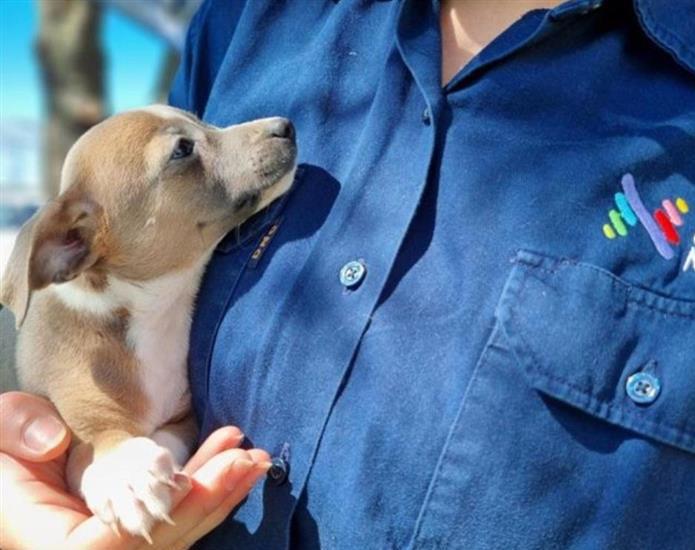
CN’s website continues to play an important role in supporting the community with practical tools and information for managing lost and found pets. Dedicated webpages help residents report lost animals, reunite with found pets and access guidance on responsible pet ownership. These resources reflect CN’s ongoing commitment to animal welfare and compliance with the Companion Animals Act 1998, while making it easier for residents to navigate pet-related services. By improving accessibility and streamlining processes, CN is helping to create a safer and more informed community for pets and their owners.
• Lost and Found pages: These pages provide a dedicated platform for the community to search for lost animals that are currently in the care of the CN AMF.
• Lost Pets in Ranger Care: This page offers information about animals currently under the care of CN’s Rangers. It serves as another reference for owners who are looking for their missing pets.
• Report a Stray Dog: This page is designed to facilitate the reporting of stray dogs in the community. It includes guidelines and a reporting form to inform CN about stray dog sightings.
• Report Your Lost Pet: This page enables pet owners to formally register their pets as missing or lost. The information provided is forwarded to the Ranger team, who can then take appropriate action to locate the missing pet and update its status in accordance with relevant regulations.
• Deceased Pet Online Form: This page assists in updating the online Pet Registry or notifying CN to update the pet’s microchip. If your cat or dog has passed away, you must notify the relevant authorities within 28 days.
• Update Pet’s Desexed Status: This page is designed to assist in updating your pet’s desexed status as well as providing information on how registration fees are impacted by late desexing.
• Registration Assistance: This page assists with registration if you are having trouble with the online Pet Registry (OLG site).
CN delivered major upgrades to its Animal Facility at Tighes Hill, improving comfort and care for lost and stray dogs while they await reunion with their owners or rehoming.
Twelve new kennels were constructed, featuring improved ventilation, raised bedding, climate control, lighting and access ramps, along with a fenced outdoor exercise area to support animal wellbeing. These upgrades set a new standard for animal care and ensure CN continues to meet best practice guidelines. The facility’s modular design also allows for future expansion or relocation, supporting long-term planning for animal services.
CN will continue to support responsible pet ownership through education and outreach, including free microchipping and pet registry advice at community events like ‘Pups in the Park’ and joint events. By investing in quality facilities and proactive community engagement, CN is ensuring Newcastle remains a safe, caring and inclusive city for pets and their people.
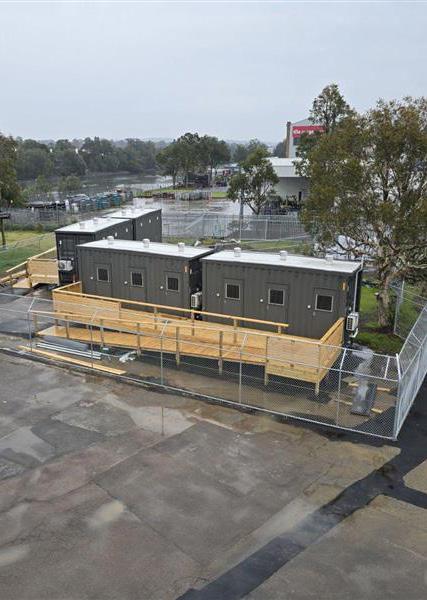

Juno arrived at the CN AMF and spent 93 days in care – longer than most! During that time, she became a staff favourite, known for her sweet nature and gentle spirit. Her presence brightened the facility, and when the time came for her adoption through one of our trusted rescue partners, the team gave her a heartfelt farewell party.
Juno is now thriving in her forever home, surrounded by love and laughter with her new family, including two young children who adore her. Her story is a beautiful reminder of the impact of patience, care and community support in giving animals a second chance.
Update from her new family that the team received:
“I just wanted to let you all know that Miss Juno is absolutely settled in and living her best life, she was definitely the missing piece to our family. She’s been loving running around the yard playing fetch and tug, then laying around in the sun. Car rides and walks are her favourite as well as stealing mine and my partner’s spot in bed when we get up through the night. She’s got a thing with nibbling on my feet and hands, and when she’s not up and about she’s laying down with me with her head on my shoulder. She definitely has the best personality and everyone that has met her so far has said how gentle she is. She is so beautiful, cannot imagine life without her anymore. She likes the kids and they love her!”
Under the NSW Disability Inclusion Act, it is mandatory for councils to have a Disability Inclusion Action Plan (DIAP) and provide an annual progress report. CN meets this requirement by submitting our progress report to the NSW Department of Communities and Justice each December, alongside highlighting actions in our Annual Report. CN’s DIAP includes 35 actions for the period 2022–2026.
Highlights for 2024/2025 include:
• Continuation of CN’s Accessibility Network to promote workplace inclusivity through staff with lived experience of disability
• Facilitation of the Access Inclusion Advisory Committee, which provided input on various accessibility initiatives
• Social Inclusion Grant funded through our community grant scheme
• Local Centres upgrade program enhancing accessibility in Shortland, Orchardtown Road (New Lambton) and Georgetown
• Improved park and playground access, including the development of Livvi’s Place inclusive playground at Foreshore Park
• Count Us In Sport program championing disability inclusion in sport and recreation, engaging over 1,000 participants and 90 local sporting groups
• New Year’s Eve celebration setting a new benchmark for accessibility in regional Australia, with inclusive features like live audio-described fireworks, a Sensory Story guide and a welcoming Sensory Zone
• Inclusive programming in cultural facilities, library services and museums for diverse communities
• Civic Theatre programmed AUSLAN performances and upgraded the hearing loop for the hearing impaired.
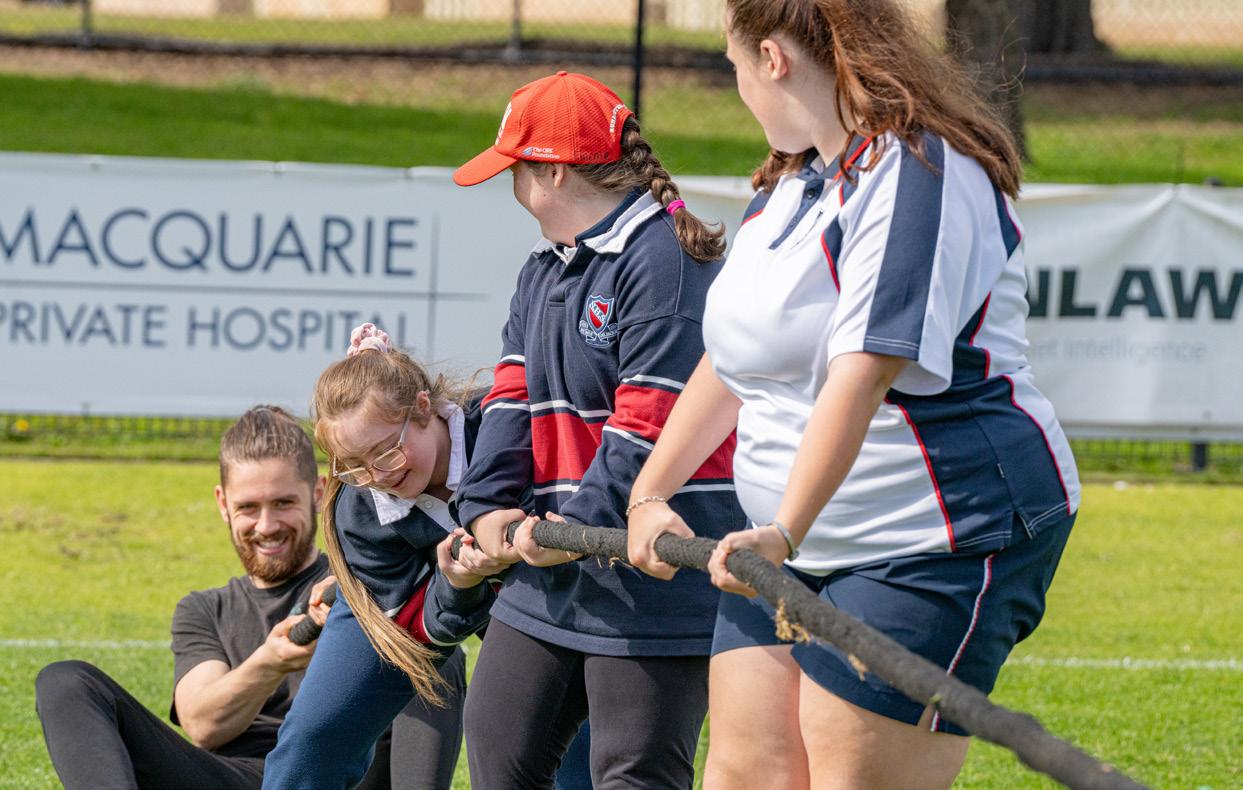
Environmental, Planning and Assessment Regulation 2021 Part 9, Division 4, Section 218 (3)
The Regulation includes the following matters to be included in annual reports of councils for development contributions and levies:
DEVELOPMENT CONTRIBUTIONS AND LEVIES
Acronyms:
CP – Contributions Plan
HSR – Hunter Street Revitalisation
LATM – Local Area Traffic Management
PDP – Public Domain Plan
PPN – Principal Pedestrian Network
S7.12 Plan
Throsby Creek Shared Pathway Renewal Wickham to Maryville
Wickham - Footpath Upgrade Wickham
MInmi Rd Wallsend - Road Upgrade
Longworth Ave Wallsend - Road Renewal
S7.11
* % of costs funded by contributions is interpreted as the % of the annual spend being from contributions rather than over the entire life of the project. Project status is classed as either underway or completed.
Environmental, Planning and Assessment Act 1979, Part 7, Division 7.1, Subdivision 2, Section 7.5
The Planning Agreements (PA) in force 1 July 2024–30 June 2025 include:
1. 73–79 Railway Lane, Wickham Planning Agreement
Parties
Date of Execution
Land to which the PA relates
CN and 22 Park Avenue Pty Ltd
23/04/2021
Lot 110 DP 1018454 and Lot 11 DP 1106378, known as 73–79 Railway Lane, Wickham NSW
Description Monetary contribution of $955,000.00 with development
2. 10 Dangar Street, Wickham Planning Agreement
Parties
Date of Execution
Land to which the PA relates
CN and Dangar St Wickham Pty Ltd
Amended on 24/07/2024
Lot 1 DP 1197377, known as 10 Dangar Street, Wickham NSW
Description Monetary contribution of $1,587,976.50 for the provision of public amenities or infrastructure to support implementation of the Wickham Masterplan 2021
3. 30 Vista Parade, Kotara Planning Agreement
Parties
Date of Execution
Land to which the PA relates
CN and Trustees of the Roman Catholic Church for the Diocese of Maitland–Newcastle
10/03/2023
Lot 12 and 131, DP 560852 and 262057, known as 30 and 31 Vista Parade, Kotara
Description Works with redevelopment and expansion of St James’ Primary School, Kotara:
• Road widening of Vista Parade and associated roadworks, including the relocation and reinstatement of existing bus stops
• Construction of a roundabout and intersection upgrade work on the intersection of Princeton Avenue and Vista Parade
• Dedication of approximately 88.5m2 of land to Council to widen Vista Parade
4. 23 Merewether Street, Merewether Planning Agreement
Parties
Date of Execution
Land to which the PA relates
CN, Healthe Care Lingard Pty Ltd and Northwest Healthcare Australian Property Limited
9/05/2023
Lot 100 DP 1168197 & Lot 100 DP 1251777, known as Lingard Private Hospital
Description Requires the following in association with the planning proposal for Lingard Private Hospital:
• A monetary contribution of $1 million for upgrade of the Merewether Street and Lingard Street intersection
• Upgrade Tye Road, Merewether Street
• New footpaths and streetscape elements along western side of Lingard Street
• Embellish Townson Oval
5. 1-21 Railway Street and 29 Bishopsgate Street, Wickham Planning Agreement
Parties
Date of Execution
Land to which the PA relates
Description
Newcastle City Council and Gemini Interchange Pty Ltd
03/09/2025
Lot 1 DP 801618, known as 1-21 Railway Street and 29 Bishopsgate Street, Wickham Requires the following in association with the development: Works and dedication of land to create Wickham Green Affordable housing.
Note: When all obligations of the planning agreement have been met by the developer, the planning agreement is considered ‘concluded’.
CN has developed an online planning agreements register that is updated every 24 hours and captures relevant information.
(General) Regulation 2005 (Reg), cl 132
The total rates and charges written off for 2024/2025 was $1,106,262.
Additionally, CN supports community housing providers, charities, religious bodies, schools and more by providing rates exemptions in the amount of approximately $9.9 million annually.
Swimming Pools Act 1992 (SP Act), s 22F(2)
Swimming Pools Regulation 2018
(SP Reg) cl 23
Section 22F – Inspections carried out by local authority
(1) A local authority may charge the owner of premises a fee for carrying out an inspection under this Division being a fee that is no greater than the maximum fee (if any) prescribed by the regulations, but it may not charge a separate fee for issuing a certificate of compliance.
(2) A local authority that is a council must include in its annual report under Section 428 of the Local Government Act 1993 such information (if any) in relation to inspections under this Division as is prescribed by the regulations.
(3) An inspection by a local authority is to be conducted by an authorised officer and entry on to premises to carry out such an inspection is to be in accordance with Part 3.
Swimming Pools Regulation 1998
Clause 18BC – Council reporting requirements for inspections
For the purposes of Section 22F (2) of the Act, a local authority that is a council must include in its annual report under Section 428 of the Local Government Act 1993 the number of inspections under Division 5 of Part 2 of the Act that:
(a) were inspections of tourist and visitor accommodation; or
(b) were inspections of premises on which there are more than 2 dwellings; or
(c) resulted in the council issuing:
(i) a certificate of compliance under Section 22D of the Act; or
(ii) a certificate of non-compliance under clause 18BA of this Regulation.
During 2024/2025 the following inspections were made:
Total inspections for (a) and (b) = 15
Total inspections for (c) (i) and (ii) = 131
Total inspections overall = 146
Reg cl 217(1)(a4) & Act s 67, 67(2)(b)
No resolutions were made concerning work carried out on private land during 2024/2025.
The priorities and objectives in this theme include:
2.1.1 Towards net zero emissions
2.1.2 Know and share our climate risk
2.1.3 Resilient urban and natural areas
2.2 Nature-based solutions
2.2.1 Regenerate natural systems
2.2.2 Expand the urban forest
2.2.3 Achieve a water-sensitive city
2.3.1 Design out waste
2.3.2 Localised supply chain and sustainable procurement
The services we provide in this theme include:
• Sustainability and climate change programs
• Natural area / bushland services
Environmental asset management
• Environmental education programs
• Waste collections
• Waste disposal and landfill (landfill operations)
• Resource recovery and recycling
• Waste education programs
• Strategic planning
• City greening
The assets we manage in this theme include:
• 81km waterways
119,730 street & park trees
• 92 bushland parcels
• 65 wetlands
• 5.7km tracks & trails
• 2 ocean baths
• 3.5km coastal cliff line
10 beaches
• 8.7km river walls
• 3.7km sea walls
• 14km coastline
• 1 waste & resource recovery centre
• 1.5 MW solar farm (with 14,500 solar panels)

The informing strategies include:
• Newcastle Environment Strategy
• Sustainable Waste Strategy
The supporting strategies and plans include:
• Cycling Plan 2021–2030
• Climate Action Plan 2021–2025
• Local Strategic Planning Statement 2020–2040
• Newcastle Transport Strategy
• Climate Change Risk and Resilience Plan (future draft)
• On Our Bikes Cycling Plan
• Urban Forest Action Plan (future draft)
• Water-Sensitive City Action Plan (future draft)
• Blue Green Grid Action Plan (future draft)
• Extended Stockton Coastal Management Program 2025
• Newcastle Southern Beaches Coastal Management Program (future draft)
• Hunter Estuary Coastal Management Program (future draft)
Total actions
100%
Total measures 75%
Measures on track 9
Actions completed or on track 22 Measure Performance
Action Performance
On Track 22 | 100%
Monitor 0 | 0%
Off Track 0 | 0%
No Targets Set 0 | 0%
2.1 Action on climate change MEASURE
Level of community satisfaction with climate action
Installed lighting to be LED (Ausgrid LED streetlight rollout in Newcastle LGA)
CN reduction in electricity use
Number of EV chargers available to the community (owned and operated by CN)
On Track 9 | 75% Monitor 2 | 17% Off Track 0 | 0% No Targets Set 1 | 8%
5,000 (2020/2021)
100% of all installed lighting to be LED by end of 2025 95% 13,662 out of 14,348 lights
20.8% progress to date
Target: 30% reduction by 2025
4 public EV charging sites (7 chargers, 11 charging bays)
All key sites throughout the city
11.4 GWh (-16.8% on baseline). (Increased electricity consumption due to electrification programs)
50 public EV charging bays across 15 sites
Level of community satisfaction with wetlands and estuary
Level of community satisfaction with bushland and waterways
Tree vacancies identified in the Tree Asset Management System (TAMS)*
Reducing by 500 p.a.
85% of vacancies to be planted by 2045
100% of vacancies to be planted by 2060 (TAMS)
Number of plants used in urban forest planting (Number of plants used in CN’s natural asset regeneration projects)
Level of community satisfaction with greening and tree preservation
* Data will be confirmed when the new CN tree asset management system OneTree is fully implemented in 2025.
Tonnes of recyclables recovered (Recyclables recovered include general household recyclables and green waste)
Tonnes of kerbside waste (red bins) landfilled
(2023/2024)
Note: Community satisfaction measures relate to overall satisfaction with services and facilities by category (where 1 = very dissatisfied and 5 = very satisfied).

This year we progressed the development of five integrated action plans aligned to the strategic priorities of the Newcastle Environment Strategy, namely a revised Climate Action Plan; Climate Risk and Resilience Action Plan; Blue Green Grid Action Plan; Urban Forest Action Plan; and Water-Sensitive City Action Plan. These plans are being designed as a cohesive framework to drive transformative change and to embed sustainability, biodiversity protection, climate action and resilience, and liveability into council operations, service delivery and decision-making.
The focus over the past 12 months has been on understanding current challenges and opportunities through technical investigations, benchmarking and extensive internal engagement. Cross-directorate collaboration has been central to shaping the plans to ensure they are fit-for-purpose and support coordinated implementation.
Over the coming year the action plans will be finalised, and implementation pathways determined, to deliver on the community’s priorities of Newcastle 2040 and the strategic priorities of the Newcastle Environment Strategy.
CN manages an impressive array of natural assets that form the local environment enjoyed by residents of, and visitors to, the Newcastle LGA. The annual natural asset management program is informed by service asset plans for our bushland, wetlands, creeks, public trees, and coast and estuaries, defining where and what maintenance and renewal works are required to ensure a vibrant and resilient natural environment that can support the community’s health and wellbeing.
On-ground works included the creation of dunes to protect the Stockton foreshore, and the removal of weeds, vandalism impacts and invasive species from priority bushland areas like Jesmond, Dangerfield Drive, George McGregor Reserve, the Wentworth Creek corridor, inner-city gems such as Acacia Reserve, and our coastal headlands. Creek restoration works in Claremont Reserve and various sites within the Blue Gum Hills area have improved the condition, function and resilience of our wild places.
The future natural asset management program will target those creek reaches and bushland riparian zones impacted by the upstream works for the Jesmond Bypass and ensure that the squirrel glider populations within this wide arc of remaining bushland remain viable, through a fauna monitoring partnership with the UON. The program will progress creek rehabilitation works in Maryland Creek and Dark Creek catchments, wetland rehabilitation works in Sandgate, Shortland and Wallsend, and deliver priority coastal protection and estuary riverbank works. Fostering community stewardship to secure the future of our natural assets, using citizen science and meaningful engagement initiatives through the Natural Connection program, will also be a focal point.
In July 2024, we launched the Empowering Newcastle program to support residents, businesses, schools and community groups to switch to renewable energy, electrify and create a net zero future.
More than 1,500 residents participated in a three-part event series that brought together experts, decision-makers and community members to explore practical solutions for electrification, renewable energy and climate resilience.
• The series opened with a sold-out event at City Hall featuring inventor and electrification advocate Dr Saul Griffith, inspiring around 800 attendees to take action by electrifying their homes, vehicles and businesses.
• A stakeholder roundtable followed, focused on electric vehicles (EV) and low-emissions transport, with representatives from Transport for NSW, the Australian Electric Vehicle Association, UON, Business Hunter and Port of Newcastle.
• The final event featured NSW Minister for Climate Change, Energy, Environment and Heritage Penny Sharpe, who joined CN and community members to discuss the Hunter’s renewable energy transformation and the role of local leadership in achieving net zero.
Following the event series, CN launched a set of Go Electric Action Plans and suite of Home Energy Kits to support households to reduce energy costs and create healthier, more comfortable homes.
The event series culminated in the launch of CN’s first community net zero training program, Empowering Climate Champions.
Empowering Climate Champions equipped more than 50 residents with the skills, knowledge and confidence to lead local climate action projects that support the shift to renewable energy, electrification and energy efficiency in Newcastle. Supported by Rewiring Australia, the free, six-week program, held over March and April 2025, was United Nations CIFAL/UNITAR-certified and featured expert facilitators from leading Australian climate organisations.
Participants gained practical knowledge on how to influence behaviours in their neighbourhoods through everyday conversations, behavioural science interventions and effective campaigns led by locals. Over 30 project ideas were developed, from shared batteries in strata buildings to community solar campaigns and energy-saving tools for renters. More than education, the program created a passionate network of changemakers empowered to take action and help create a net zero Newcastle by 2040.
CN will continue to expand the Empowering Newcastle program with a suite of initiatives, including:
• Solar Neighbourhoods, our community solar and battery program – we’re working to remove the barriers to household solar and battery uptake and help the community access trusted, affordable and quality systems, creating long-term savings for households
• Future rounds of the Empowering Climate Champions community net zero training program
• Events, programs and resources to help residents electrify, become more energy-efficient and switch to renewables.
In May 2025, an extraordinary natural event unfolded when thousands of sea hares aggregated to spawn in Merewether Ocean Baths. With no known precedent for such an event, our staff took immediate and coordinated action to first protect and then relocate thousands of sea hares and their eggs to nearby ocean waters, while also sharing the story with the community in real time. A drop-in education session at the baths and a widely viewed social media campaign turned this event into a powerful learning moment, celebrated locally and beyond.
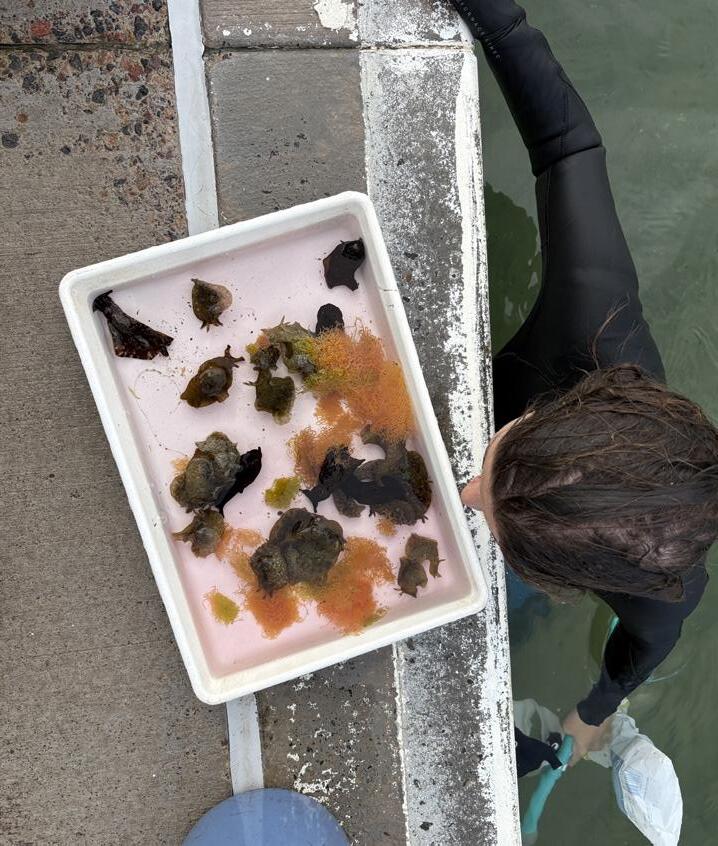
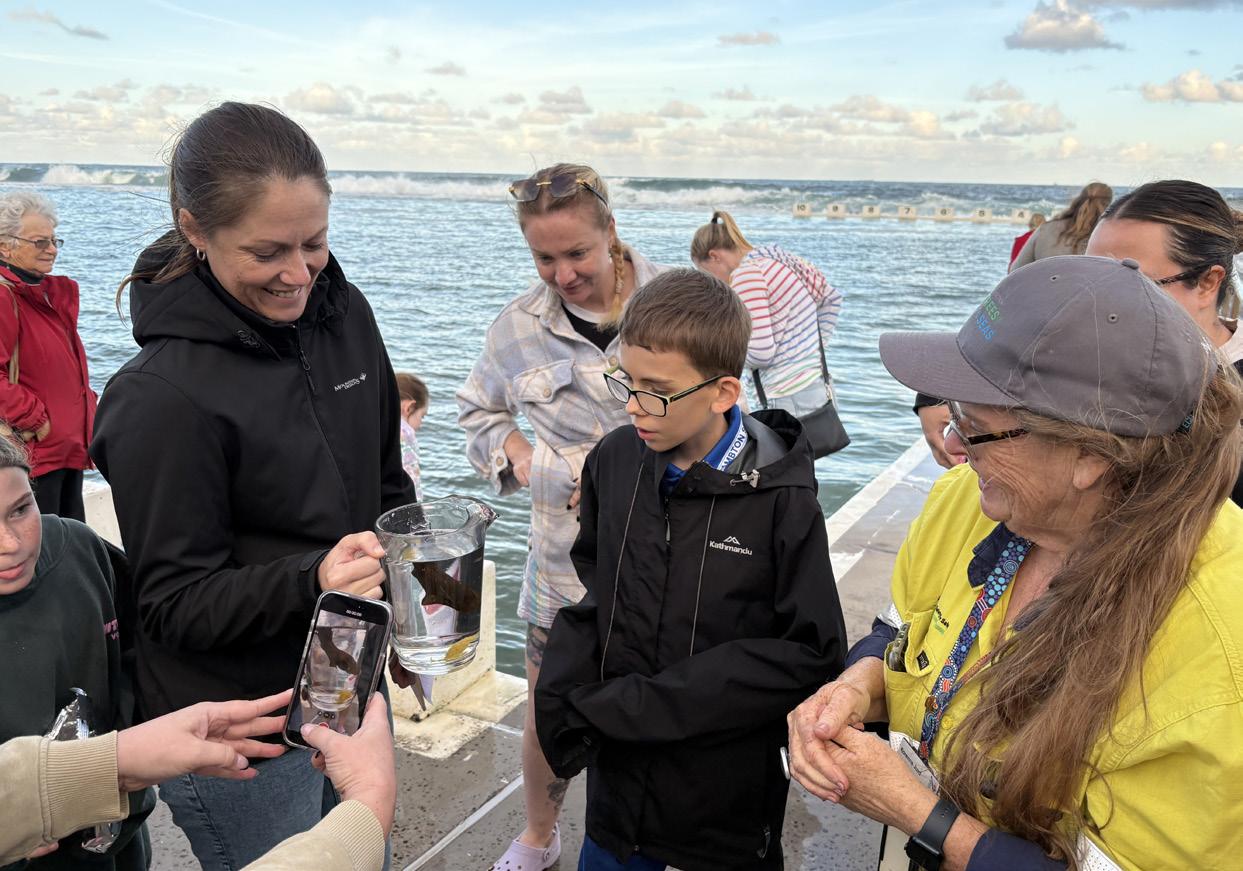
CN awarded $207,500 in funding to support 30 youth-led climate action projects, amplifying the voices and ideas of young people across Newcastle. Delivered through Bloomberg Philanthropies’ global Youth Climate Action Fund, CN was one of only three Australian local councils selected to lead this initiative.
The funded projects spanned leadership training, community clean-ups, sustainable fashion events, multimedia campaigns and renewable energy education. Each initiative is designed to foster climate resilience, reduce emissions and build a more environmentally conscious community.
Funded projects included:
• Hunter Intrepid Landcare’s nature-based workshops and coastal clean-up events to address climate anxiety and build resilience
Lambton High School’s engagement with solar and EV technologies at a student-led Mini EV Festival
• Surfers for Climate’s Youth Climate Leaders’ Summit to empower young advocates
• The Purple Card Project’s youth-led clothes swap and repair event promoting sustainable fashion
• Upcycle Newcastle’s mentoring program in sustainable design
• Music Therapy Australia’s climate-themed music video production
• A digital artwork displaying a future sustainable Newcastle that our youth want to see ReGen Alliance creating a ‘living classroom’ that developed student-led biodiversity projects.
Youth-led climate action will continue to be a key focus of CN’s Empowering Newcastle program. Watching these projects grow and become real points for change is how we can support young people to lead local solutions and contribute to CN’s goal of net zero emissions by 2040.
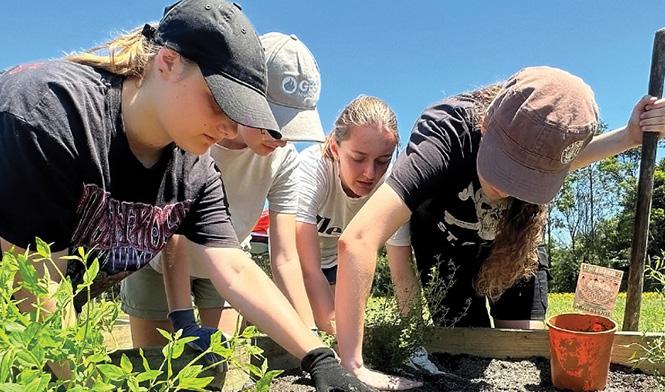
CN significantly expanded its public EV charging network, installing 34 new charging ports across 11 locations, tripling the city’s existing EV charging infrastructure and supporting the transition to low-emissions transport.
New chargers are now operational in Lambton, Wallsend, Hamilton, Stockton, Adamstown, Mayfield, Newcastle, Newcastle East, Wickham, Beresfield and Georgetown. This expansion brings the total number of public EV charging ports to 50 across 15 locations city-wide.
The project was co-funded by a $270,000 grant from the NSW Government’s EV Kerbside Charging Program.
Key features include:
Strategic placement of chargers in local centres to support accessibility and economic activity
• All charging ports powered by 100% renewable energy via CN’s Summerhill Solar Farm and Sapphire Wind Farm Power Purchase Agreement (PPA)
• Support for residents without off-street parking to access reliable charging infrastructure.
Newcastle has seen a tenfold increase in registered EVs over the last four years. The expansion of CN’s EV charging network addresses this growing demand and removes barriers to EV uptake.
CN will continue to invest in electric and low-emissions transport as we move towards a net zero Newcastle by 2040, including continuing to expand our EV public charging network, or partnering with private EV charging infrastructure suppliers to increase EV charging infrastructure across the city.

July 2025 saw one of our largest community planting events delivered, when more than 400 people gathered in Tarro Reserve to participate in National Tree Day activities. Across multiple events community members and primary school students planted over 7,500 natives to create habitat, improve wetland water quality, connect with neighbours, and learn about waterbugs and the value of wetland ecosystems. Local residents were inspired to volunteer their time in future Landcare greening efforts on the site.
The students from Tarro Public School, Beresfield Public School and Our Lady of Lourdes Primary School also created bush craft, learned about wetland waterbugs and traditional Aboriginal weapons, and created art with National Park rangers.
Throughout the year, the community added another 25,000 native plants to our urban forest in places like Hugo Reserve, Wallsend and Birchgrove Drive, Wallsend, where residents have responded to the impacts of vegetation and habitat losses in the nearby Jesmond bushland.
What’s next
National Tree Day is one of many environmental engagement initiatives under the Natural Connection program, designed to connect residents to our natural assets, expand Newcastle’s urban forest, mitigate urban heat, and connect habitat for native fauna with a focus on pollinators and threatened species. In 2025, National Tree Day was centred around a wetland located in the heart of Wallsend, beside Ironbark Creek and the Wallsend pool.
Next year, CN will partner with The Groundswell Collective to deliver a ‘Community Tiny Forest’ in Pilkington Reserve, North Lambton, providing greater opportunities for urban forest expansion at a neighbourhood scale across the city.
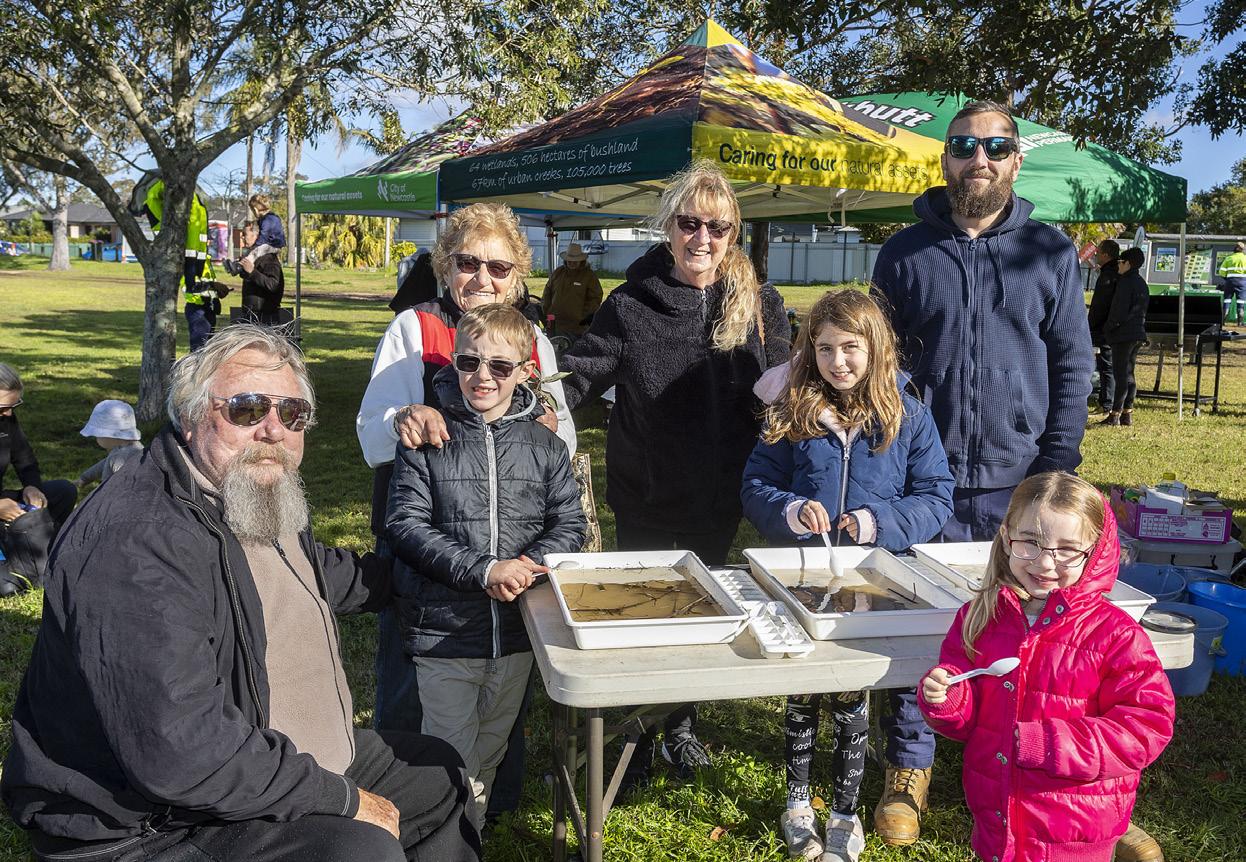
Connection program
CN delivered a vibrant Natural Connection program of nature-based learning and creative discovery throughout the year, focusing on the seasonal changes in our environment, and enjoyed by over 750 participants. Highlights included the January 2025 school holidays summer program where families and participants of all ages explored Newcastle’s coastal ecosystems alongside marine biologists, uncovering the hidden life of rock pools and sandy shores. These immersive experiences offered a unique opportunity to learn about local biodiversity and the importance of protecting fragile marine environments.
The inclusion of native bee workshops, as well as citizen science efforts in recording our backyard birds or documenting waterbugs in our wetlands or creek lines, fostered environmental awareness and a connection to place that shines a light on the natural spaces in the city that contribute to our wellbeing and are home to a diversity of local wildlife. Across CN’s cultural venues, nature and science came to life through interactive exhibitions, performances and workshops:
• At the Civic Theatre, British naturalist Steve Backshall captivated audiences with a high-energy exploration of ocean life, while Dr Chris and Dr Xand brought prehistoric science to the stage in ‘Operation Ouch –Jurassic Fart’.
• Newcastle Museum hosted Brick-a-saurus LEGO challenges, dino-themed silent discos and creative workshops, blending fun with learning about the natural world.
• Newcastle Libraries invited children to design cactus rock gardens and bring extinct animals to life through chalk art, inspired by Jeannie Baker’s Desert Jungle exhibition.
• Blackbutt Reserve offered daily animal encounters and feeding sessions, deepening understanding of native species and their habitats.
• Summerhill Waste Management Centre opened its gates for behind-the-scenes tours, educating families on the natural cycle of sustainability and the role of waste recovery in protecting the environment.
CN will continue to expand its Natural Connection program, embedding environmental education and broadening the reach of meaningful stewardship opportunities for the community in the creation and nurturing of resilient natural landscapes in local neighbourhoods. Future initiatives will focus on strengthening partnerships with our Traditional Custodians to deepen understanding of Country and support lifelong environmental stewardship.
The Street and Park Tree Replacement Program (SAPTRP) successfully planted 1,119 new trees across the city, including 138 trees in response to residents' requests for plantings in front of their properties. These new additions will be added to our four-year establishment and maintenance program, which currently covers 7,516 trees planted over the last four years now receiving scheduled mulching, formative pruning and weeding maintenance.
CN responded to over 4,000 tree-related requests for both public and private trees. Notably, 800 of these were received during the extreme weather event in January 2025, which generated a significant volume of high-priority tree work. This triggered an emergency response from our crews, who worked tirelessly to clear debris and ensure the safety of our roads and public reserves.
Investment in our mature tree stands through mulching and understorey plantings, to improve the micro-climate and insect pollinator life under these impressive canopies, will improve the condition and extend the life expectancy of these valuable environmental assets. The heritage figs around Gregson Park, Hamilton, are a glowing example of the impressive results in tree health that this additional care for our much-loved and oldest urban forest population can produce.
What’s
CN will continue to deliver our flagship SAPTRP program, with an estimated 2,000 trees to be planted a year to meet our urban forest canopy targets. The program will focus on areas where vulnerable communities are exposed to urban heat impacts and on our biodiversity corridor gaps, using climateresilient tree species and optimising cost-efficient delivery in locations of high tree vacancies.
Between July 2024 and June 2025, we conducted 424 urban property inspections, 345 inspections at high-risk sites, 221km of inspections of high-risk pathways (waterways), 862km of inspections of high-risk pathways (roads), 178km of high-risk pathways (rail corridors) and 19 peri urban/rural property inspections. In addition, we conducted 247 weed treatment activities at high-priority sites. Several weed education/engagement events were also delivered, including at the Newcastle Show, Tocal Field Days, National Tree Day and the Living Smart Festival, and with Landcare groups.
What’s next
Over the next year, a key focus area will be the identification, management and ongoing monitoring of sites impacted by the notifiable weed Chinese Violet (Asystasia gangetica), which remains under a Control Order under the NSW Biosecurity Act 2015.
In parallel, we will continue proactive inspections of all high-risk pathways and sites to detect any new incursions of priority weeds within the Local Control Area. Early identification and rapid response to emerging weed threats are critical to minimising environmental impacts, particularly in areas adjacent to high-value ecological assets, such as the nationally significant Ramsar-listed wetlands.
What we achieved
CN maintained 75 Asset Protection Zones (APZ) across the Newcastle LGA in September 2024 and March 2025. APZ maintenance is undertaken to provide a defendable space between property and bushland for firefighting crews in case of bushfire.
What’s next
CN will continue to deliver its APZ maintenance program and liaise with the NSW Rural Fire Service and Fire & Rescue Newcastle to identify ways to enhance bushfire preparedness for the community.
CN partnered with Australian clean technology company BlockTexx to deliver Newcastle’s first textile recycling event, ‘Give a Sheet for the Planet’, as part of National Recycling Week 2024.
Held at the Newcastle TAFE carpark, the event invited residents to recycle old household linens such as towels, sheets and tablecloths. The initiative supported CN’s commitment to reducing landfill and advancing circular economy solutions through innovative partnerships and community engagement. Approximately 395 cars delivered 4,471kg of unwanted manchester items.
BlockTexx’s world-first technology breaks down textiles into raw materials that can be reused across industries including textiles, construction, agriculture and manufacturing. Each truckload of recycled linen diverts approximately three tonnes of waste from landfill and reduces carbon emissions equivalent to removing 20 cars from the road for a year.
The event builds on CN’s Sustainable Waste Strategy, which sets a 20-year vision to reduce waste, increase recycling and support a circular economy. Currently, CN diverts 47% of household waste from landfill, with this figure expected to grow through continued investment in education, infrastructure and community-led programs.
What’s next
CN will continue to explore and deliver innovative waste recovery initiatives that empower the community to reduce their environmental footprint. Future events and partnerships will expand access to textile recycling and other hard-to-recycle materials, supporting CN’s goal of becoming a zerowaste city.
CN is working with BlockTexx to trial cellulose extracted from cotton textiles to be used as a medium for grass seeds in stabilising landfill batters at the Summerhill Waste Management Centre.
Waste Services will conduct another ‘Give a Sheet’ fabric collection event during this financial year.
CN welcomed a new generation of environmental advocates to Summerhill Waste Management Centre through a dedicated children’s tour program designed to inspire curiosity and action around waste minimisation and recycling.
Each year, CN hosts a series of engaging and educational kids’ tours at Summerhill. These tours offer local families a unique opportunity to go behind the scenes and learn how waste is managed in our city. Through fun and interactive waste education activities, children discover the importance of reducing, reusing and recycling, and learn how their everyday choices can help protect the environment. A favourite part of the tour is the chance to sit inside a real garbage truck, meet the driver and see some of the machinery used to manage household waste.
The experience also includes a guided tour of the site and landfill, helping children understand what happens to their rubbish after it leaves the kerb. By building awareness of waste minimisation and environmental responsibility from a young age, these tours aim to inspire lasting behaviour change. They also help families connect with the work we do at Summerhill and highlight the valuable role every household can play in caring for our environment.

2.1.1 Towards net zero emissions
Deliver priority actions from Climate Action Plan (2021–2025)
Develop a Climate Risk & Resilience Action Plan
Develop Electric Vehicle & Low Emissions Transport Plan
Undertake research and development on lower emissions waste collection vehicles
2.1.2 Know and share our climate risk
Improve our knowledge of the risks of climate change on our urban and natural environments and our community
2.1.3 Resilient urban and natural areas
& Sustainability
Environment & Sustainability
Environment & Sustainability
Waste Strategy
& Sustainability
Complete blue green grid mapping for the Newcastle LGA Environment & Sustainability
Develop a Blue Green Grid Action Plan
2.2 Nature-based solutions
2.2.1 Regenerate natural systems
Deliver coastal management program for Newcastle LGA
Environment & Sustainability
& Sustainability
Deliver engagement and volunteering programs to enhance community stewardship of our natural environment Environment & Sustainability
Deliver projects that improve the health and condition of our natural assets and protect and enhance the natural environment
Implement priority actions from the Hunter Regional Strategic Weed Management Plan
Review and update natural asset registers to support improved strategic and operational planning
Environment & Sustainability
Environment & Sustainability
Environment & Sustainability
2.2.2 Expand the urban forest
Deliver recreational and educational opportunities and expand community learning at Blackbutt Reserve Environment & Sustainability
Deliver street and park tree replacement program to expand the city’s urban forest, including the integration of climate-resilient species Environment & Sustainability
Develop an Urban Forest Action Plan Environment & Sustainability
2.2.3 Achieve a water-sensitive city
Deliver flood risk management program for Newcastle LGA
Develop a Water-Sensitive Cities Action Plan
Partner with external stakeholders to implement stormwater management and water quality improvements across the city
2.3.1 Design out waste
Deliver trial for drop-off and bulk waste recovery operations
Deliver the food organics diversion of waste from landfill program
2.3.2 Localised supply chain and sustainable procurement
Showcase local suppliers and support the circular economy with 85% of menu items from within the catchment of the Hunter Joint Organisation
Ensure the works program will incorporate local suppliers and sustainable procurement where financially responsible
& Sustainability
& Sustainability
& Sustainability
Property &
Contents:
• Environmental upgrade agreements
• Stormwater levies and charges Environmental upgrade agreements
Act s 54P(1)
There were no environmental upgrade agreements entered into by CN during 2024/2025.
Regulation cl217(1)(e)
In 2024/2025, CN received $2.42 million in Stormwater Management Service Charge (SMSC) funds. CN also dedicated the annual baseline amount of $640,000. These two funding sources explicitly allocated $3.06 million to eligible stormwater projects.
The Stormwater System Program commenced with 30 projects, 26 of which were eligible to have the SMSC applied. The program was adjusted throughout the year to accommodate construction projects carrying over from the previous financial year and to include priority projects, resulting in nine original projects being removed from the program and four new projects added.
CN’s final investment in the Stormwater Portfolio amounted to $5 million, funding 22 eligible Stormwater Management Strategy and Control projects. The Stormwater System Program successfully executed 14 construction projects, with 11 completed, while six projects advanced through their planning and design phases. In addition, four projects focused on specialised investigation and maintenance services, one project delivered city-wide environmental protection initiatives, and one delivered the management of a declared dam.
CN’s total stormwater asset renewal, upgrade or creation across the capital works program totalled 3,009m of pipes (1,293m relined), 195 pits, 35m of channel, three headwalls, six tide gates and three stormwater quality improvement devices.
City-wide Trenchless Pipe Relining Program
George Street Mayfield East drainage improvements
Albert Street Wickham drainage improvements
Tooke Street Cooks Hill drainage improvements
Lewis Street Maryville drainage improvements
Roe Street Mayfield drainage improvements
Grate replacement program
Drainage inspections
Drainage management
Creeks and waterways –erosion inspection and sediment control
1,293m of pipelines were relined around the city, extending the remaining life of deteriorated assets and improving flow efficiencies of the assets.
Stage 2 of George St has progressed (from Smith Street to Kitchener Parade), delivering 153m of new pipeline and helping to improve drainage in the upper Mayfield East catchment. The project will be completed in the early 2025/2026 financial year.
Construction works were completed for 352m of stormwater drainage, improving the drainage cap. This has improved drainage capacity in the street while safeguarding tree assets.
Construction works were completed for 169m of stormwater drainage, 90m of kerb and gutter, and a rain garden. This has renewed ageing infrastructure and improved drainage, water quality and pedestrian safety.
Construction works were completed for 94m of stormwater drainage. This has improved drainage capacity in the street.
Construction works were completed for 42m of stormwater drainage. This has improved drainage capacity in the street and adjoining laneway.
This project successfully upgraded 71 kerb inlet pits across the LGA with steel bike-safe grates, improving maintenance access, drainage and safety.
Robotic CCTV inspections were completed for 258 pipelines across the LGA to determine asset conditions and ensure stormwater infrastructure is operating as intended.
Approximately 608 pipelines and their pits across the LGA were jet- and vacuum-cleaned to clear obstructions and improve flows.
395 inspections were completed:
231 construction sites were proactively inspected for erosion and sediment control compliance.
43 sites were proactively audited by the Business Pollution Prevention Program.
• 121 reactive requests relating to pollution matters were resolved.
The priorities and objectives in this theme include:
3.1 Vibrant and creative city
3.1.1 Vibrant events
3.1.2 Bold and challenging programs
3.1.3 Tourism and visitor economy
3.1.4 Vibrant night-time economy
3.2 Opportunities in jobs, learning and innovation
3.2.1 Inclusive opportunities
3.2.2 Skilled people and businesses
3.2.3 Innovative people and businesses
3.3 Celebrating culture
3.3.1 Nurture cultural and creative practitioners
3.3.2 Promote Newcastle as a major art and cultural destination
3.3.3 Culture in everyday life
3.4 City-shaping partnerships
3.4.1 Optimise city opportunities
3.4.2 Advocacy and partnerships
The services we provide in this theme include:
• Art Gallery
• Newcastle Museum
• Civic Theatre and Playhouse
Visitor Information Centre
• City Hall
• Fort Scratchley Function Centre
• Fort Scratchley Historic Site
• Newcastle Libraries
• Marketing Beresfield Community Childcare Centre
• City events
• Tourism
• Economic development
• Business development
The assets we manage in this theme include:
• 176 public art, fountains and monuments
• 1 airport
• 1 Art Gallery
• 1 Civic Theatre and Playhouse
• 1 City Hall 1 Fort Scratchley Function Centre
• 1 Fort Scratchley Historic Site
• 10 Libraries
• 1 Childcare Centre
• 1 Museum
• 1 Local Studies Archive
Wayfinder, New Annual

The informing strategies include:
• Economic Development Strategy 2021–2030
The supporting plans include:
• Destination Management Plan 2021–2025
• Cultural Precinct Masterplan 2022
actions
measures
Measures on track 11
3.2 Opportunities in jobs, learning and innovation
Gallery outreach program
(onsite and offsite engagement)
Number of artists celebrated in Art Gallery programming* (includes all artists in all aspects of programming, from in-gallery exhibitions to offsite events and projects)
* New measure due to closure of Art Gallery for expansion works.
The fourth edition of the New Annual Festival (September 27 - October 6, 2024) transformed Newcastle's cultural landscape through an ambitious artistic program that balanced intimate storytelling with large-scale community celebrations. Signature projects like Distil Immersive's 'Belongings' and Megan Cope's 'Ngumpi Kinyingarra Oyster House' exemplified this range, creating powerful meditations on home and displacement while turning Honeysuckle Marina into a living laboratory for cultural and environmental engagement.
New Annual brought vibrant cultural experiences to the city in 2024. First Night Street Party, supported by Transport for NSW Open Streets Program, activated our streets with a free community program headlined by Gamilaraay performer Mitch Tambo. Tower Divas and Chain Daisy performed alongside DJs, while food trucks and mesmerising projections transformed Newcastle's iconic City Hall.
The second annual Global Gathering, supported by Multicultural NSW's Stronger Together grant, flourished in Museum Park. This multicultural celebration showcased culturally diverse traditions through food, art and performances, with standout headline acts including The Ghana Roadshow and Worlds Collide.
The festival's impact extended beyond artistic merit, generating significant economic and community outcomes.
The total estimated attendance at all New Annual events across the 10-day festival period is 26,350, with unique attendees estimated at 10,324 taking part in an average of 2.55 events. The 2024 Culture Counts report revealed that 61% of attendees were first-time participants engaging with free, non-registration events, highlighting the festival's accessibility and ability to attract new audiences. Social media proved a powerful promotional tool, ranking as the second most crucial referrer after direct traffic.
Economically, New Annual 2024 contributed an estimated $2,252,246 to the region over the 10 days. The event was a major draw for travellers, with 60% of intrastate respondents citing the festival as their primary reason for visiting and 23% indicating it as a contributing factor. Interstate visitors showed similar engagement, with 25% identifying the festival as their primary travel motivation and another 25% reporting the event either changed or extended their original plans.
In January 2025, CN appointed a new Festival Director and launched the 2025 Made New program, offering up to $40,000 in funding for Newcastle-based or affiliated artists to present new work at New Annual 2025. CN also secured a second $20,000 Regional Event Fund grant, with the aim of progressing up the funding ladder to secure increased support in future years.
CN celebrated a landmark year for Newcastle Museum, welcoming its two millionth visitor to the Honeysuckle site and delivering a dynamic program of exhibitions and events that explored local history, scientific innovation, youth culture and global storytelling.
Since reopening in 2011, the Museum has become a cornerstone of CN’s cultural precinct, attracting more than two million visitors through its innovative exhibitions and public programs. This milestone reflects the Museum’s growing role as a cultural and tourism destination, contributing to Newcastle’s creative identity.
Key achievements during the year included:
• The world premiere of Dinosaurs: Surviving Extinction, a major touring exhibition from Gondwana Studios featuring over 100 items, including full-scale skeletons, fossil dig pits, replica nests and touchable bones, which trace the evolutionary journey from raptor to rosella
• A Place Called Hollywood, developed with support from Transport for NSW and Create NSW, preserving the story of a Depression-era community through more than 2,000 artefacts, photographs and video recollections
• NM:PM Future Street Party during Youth Week, shaped by CN’s Youth Council Standing Committee, featuring live music, creative workshops, climate activism and storytelling
• Hosting the National Archives of Australia’s Disrupt, Persist, Invent exhibition, providing a platform for young people to explore the history of activism and social change
• The Hunter Science Festival in August, delivered in partnership with Hunter Innovation and Science Hub as part of National Science Week. Thousands of visitors engaged with interactive exhibits and science shows, including:
- The HMRI ‘Poo Palace’ inflatable digestive system
- EV building and racing
- Bushfire science demonstrations
- Displays from Hunter Wetlands Centre, Hunter Landcare and Irukanji Shark and Ray Centre.
Planning is underway for commemorating the Newcastle Knights’ 40th anniversary and 120 years of rugby league in the Hunter. CN launched a public call to rugby league fans, players and officials to contribute to the collection. Knights’ captains Kalyn Ponga and Hannah Southwell donated signed jerseys to kick off the campaign, which aims to build a permanent collection celebrating the club’s impact on local identity and civic pride.
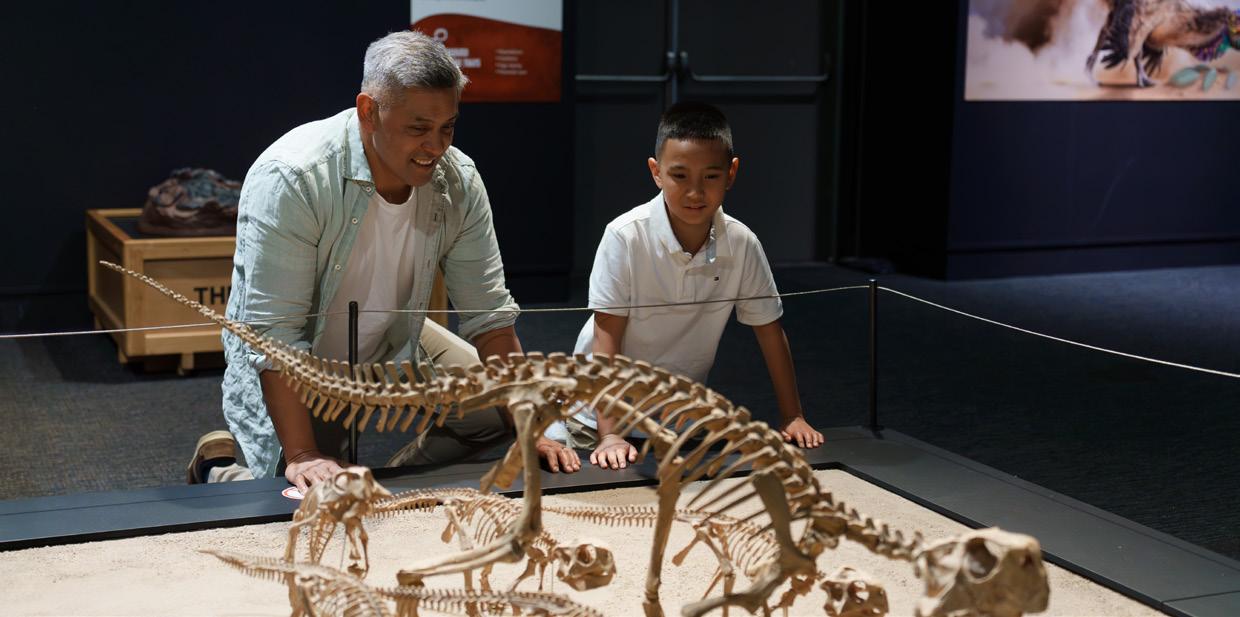
What we achieved
Civic Theatre cemented its reputation as a cultural destination by hosting the internationally acclaimed SIX The Musical and continuing its support for emerging creatives through the UpStage at the Playhouse program.
In a major milestone, SIX The Musical made its debut in Newcastle in April 2025, marking the first time the global phenomenon was staged outside a capital city in Australia. The three-week season attracted nearly 23,000 attendees, with over 37% of tickets purchased by first-time visitors to Civic Theatre. The production, which reimagines the six wives of Henry VIII as pop icons, received enthusiastic reviews and placed Civic Theatre alongside major venues in Melbourne, Brisbane and Sydney.
The success of SIX follows Civic Theatre’s recent hosting of other blockbuster productions including Come From Away and The Rocky Horror Show, reinforcing strong demand for international-quality touring shows and delivering a significant cultural and economic boost to the city.
Alongside major productions, CN continued to champion local talent through UpStage at the Playhouse, a program that supported four locally produced works in 2024. The season sold over 3,000 tickets, earned nine award nominations, and featured sold-out opening nights for each production, showcasing the depth of creative talent in the region.
Key highlights include:
• 55.8% increase in Live Performances over the last four years
• Hosting SIX The Musical, attracting nearly 23,000 attendees and national attention, with 37% of ticket holders being first-time visitors to the Civic Theatre
• Strong audience engagement and word-ofmouth driving ticket sales
• Four local productions staged through UpStage at the Playhouse, with over 3,000 tickets sold and nine dramatic award nominations
• The Visitor Survey revealed that 90% or more of respondents rated the Civic Theatre’s Front of House and ticketing services very highly
• Continued investment in inclusive, high-quality performing arts experiences.
CN worked closely with national producers and local creatives to deliver inclusive programming that reflects Newcastle’s cultural diversity. Promotional campaigns, Auslan-interpreted performances and ticketing initiatives ensured broad community access. Feedback from artists and audiences highlighted the value of CN’s support in building sustainable careers and attracting new audiences.
One example of this commitment is Accelerate Ensemble, a partnership between Civic Theatre and Tantrum. Civic Theatre provides an accessible workshop space for the Ensemble to meet weekly.
Since its inception in 2021, Accelerate Ensemble has been supported by the internationally acclaimed Geelong-based company Back to Back Theatre, who have worked with us to establish the ensemble, offering training and support to our participants and staff, and aiding in the production of new works.
The Civic Theatre will continue to present high-calibre touring productions while nurturing local talent and supporting our vibrant artistic community. These efforts align with CN’s broader goals to cultivate a dynamic, inclusive and economically resilient creative sector, with future programming set to build on the momentum of SIX and other recent successes.
In August 2024, more than 7,500 people came together to celebrate the 150th anniversary of Wallsend’s declaration as a municipality. The milestone event transformed Nelson Street into a vibrant festival space, showcasing the area’s rich history and cultural diversity.
The celebration featured entertainment across two stages, multicultural food offerings, market stalls, historical displays and interactive activities for children. Thirty-five local businesses participated, contributing to a lively street atmosphere reminiscent of past community fairs. Highlights included guided heritage walks, historical costumes, a penny farthing demonstration and evening projections of archival photographs onto local buildings.
To support the event, extensive public domain improvements were undertaken, including road resurfacing and footpath cleaning around key heritage features. The event was delivered with support from the NSW Government’s Vibrant Streets Program, which aims to activate public spaces and strengthen community connection.
What’s next
Insights from the Wallsend celebration will inform future street-based activations across the city. The event demonstrated the value of coordinated infrastructure upgrades, local business engagement and inclusive programming in delivering successful large-scale community events.
CN partnered with University of Newcastle (UON) to deliver the International Student Ambassador Program, an initiative that supports international students as they settle into life in our city. Through the annual signing of a Memorandum of Understanding, CN and UON work together to appoint youth and senior ambassadors with lived experience of the student journey. These volunteer leaders help create a sense of belonging, offer peer support, and connect students and their families to local events, services and networks. The three chosen leaders are supported by a close-knit group of 10 support students who represent the total cohort of 7,399 international students (2024/2025). Their work strengthens cultural understanding and contributes to a more inclusive, globally minded Newcastle.
To ensure the success of the program, CN provides ambassadors with dedicated office space, informal mentoring, communication support and help identifying key stakeholder groups. The program is guided by a governance board made up of CN, UON, TAFE NSW and Study NSW. Over the past year, ambassadors have delivered valuable activities such as campus information sessions on topics like housing, transport and safety, as well as city-wide events including the annual International Student Welcome Morning Tea, which fosters genuine connection and community for new students.
The program also supported broader engagement through events like the Jobs Connect Breakfast, delivered in partnership with Study NSW. This event connected international graduates with local employers in priority sectors including net zero, manufacturing and housing, offering practical insights into workforce pathways and showcasing the value of global talent in supporting the Hunter’s economic growth. Ambassadors also participated in a Strategy Day to plan future initiatives, ensuring the program continues to grow in impact.
With international student numbers continuing to rise (an increase from 17.17% in 2023/2024 to 19.49% in 2024/2025), the Ambassador Program is a key part of our commitment to diversity, inclusion and making Newcastle a welcoming city where everyone can thrive. By empowering international student leaders and strengthening local connections, we are helping position Newcastle as a student-friendly, globally connected city where international students are not only welcomed, but empowered to thrive and contribute meaningfully to our region’s future
Plan and develop a bold new program of temporary exhibitions celebrating local, national and global artists
Deliver New Annual, CN’s flagship arts and cultural event
Develop and deliver an updated Events Plan aligned with the Destination Management Plan (2021–2025)
Deliver Event Sponsorship Program and Strategic Events Partnership Program to create vibrant spaces for community and visitors and support Newcastle’s visitor economy
Increase the proportion of events in City Hall that are multi-day conferences/events originating from outside of the LGA
Present the best of international, national and local live performances across a broad arts spectrum
Develop and deliver a program of permanent, travelling, temporary and community exhibitions for and about Newcastle
Deliver engaging, diverse and inclusive programs that support, connect and reflect our community
Develop a Masterplan for Stockton Beach Holiday Park that promotes Newcastle’s tourism and visitor economy and ensures financial sustainability
Increase awareness of Newcastle as a premier regional business events destination and secure high-yielding business events that support Newcastle’s visitor economy
Media
Economy & Corporate Affairs
Media Engagement Economy & Corporate Affairs
Media Engagement Economy & Corporate Affairs
Learning
Learning
Engagement Economy & Corporate Affairs
* Delay in the development of the Masterplan as other property-related transactions throughout the year have taken priority. Work is continuing towards the delivery of this action.
3.1.4 Vibrant night-time economy
Deliver major events programs including New Year’s Eve and Anzac Day
3.2.1 Inclusive opportunities
Design and deliver member-responsive, diverse, entertaining, innovative and educational library collections
3.2.2 Skilled people and businesses
Deliver economic and workforce development programs and resources at our Libraries to improve employment and productivity outcomes
3.2.3 Innovative people and businesses
Support the operation of Newcastle’s four Business Improvement Associations
Celebrating culture
3.3.1 Nurture cultural and creative practitioners
Present an accessible and inclusive range of low-cost activities to build new audiences
Manage, conserve and digitise cultural collections, ensuring adherence to relevant policies and procedures
Provide sector development support for Newcastle and the Hunter Region’s network of volunteer and community-initiated museums, historical societies and Keeping Places
Media Engagement Economy & Corporate Affairs
Museum Archive Libraries & Learning
Museum Archive Libraries & Learning
Media Engagement Economy & Corporate Affairs
Civic Services
Museum Archive Libraries & Learning
Museum Archive Libraries & Learning
3.3.2 Promote Newcastle as a major art and cultural destination
Attract new and existing audiences from across the state and nation. Plan and develop public and educational programming that will deepen audience engagement with art and artists
3.3.3 Culture in everyday life
Plan and develop public displays of the permanent collection within the expanded Art Gallery. Undertake major collection and preparation of conservation works
Collaborate with internal CN partners to deliver cultural activities of community benefit
Maintain community access to physical and digital cultural collections for research, entertainment and education
Enhance and expand cultural collections through the acceptance of relevant heritage material, ensuring adherence to relevant policies and procedures
3.4.1 Optimise city opportunities
Develop and maintain a digital platform aimed at raising the profile of Newcastle’s economic development opportunities
3.4.2 Advocacy and partnerships
Develop and maintain local and national stakeholder relationships that share knowledge, generate opportunities and encourage exchange
Develop and implement a rolling 12-month Government Relations Roadmap that articulates forthcoming advocacy actions
Archive Libraries & Learning
Archive Libraries & Learning

The priorities and objectives in this theme include:
4.1 Inclusive and integrated planning
4.1.1 Financial sustainability
4.1.2 Integrated planning and reporting
4.1.3 Aligned and engaged workforce
4.2 Trust and transparency
4.2.1 Genuine engagement
4.2.2 Shared information and celebration of success
4.2.3 Trusted customer experience
4.3 Collaborative and innovative approach
4.3.1 Collaborative organisation
4.3.2 Innovation and continuous improvement
4.3.3 Data-driven decision-making and insights
The services we provide in this theme include:
• Procurement and contracts
Corporate planning and performance
• Corporate finance
• Rates and debt management
• Legal services
• Governance
• Records and information
• Audit and risk
• Information technology
• Media and stakeholder relations
The assets in this theme include:
1,500 CN staff
• 7 informing strategies within Newcastle 2040
• $3.9 billion total value of assets
• Four Strategic Advisory Committees
• 1 Customer Service Centre
• Customer experience
• Payroll
• Workforce development
• Talent diversity and inclusion
• Work health and safety support and recovery
• Safety and wellbeing Emergency management
• Leadership
• Property services
• 1 Have Your Say engagement site 12 councillors and 1 Lord Mayor
• 1 Guraki Aboriginal Advisory Committee
• 1 Newcastle Youth Council
• 1 Audit and Risk Committee
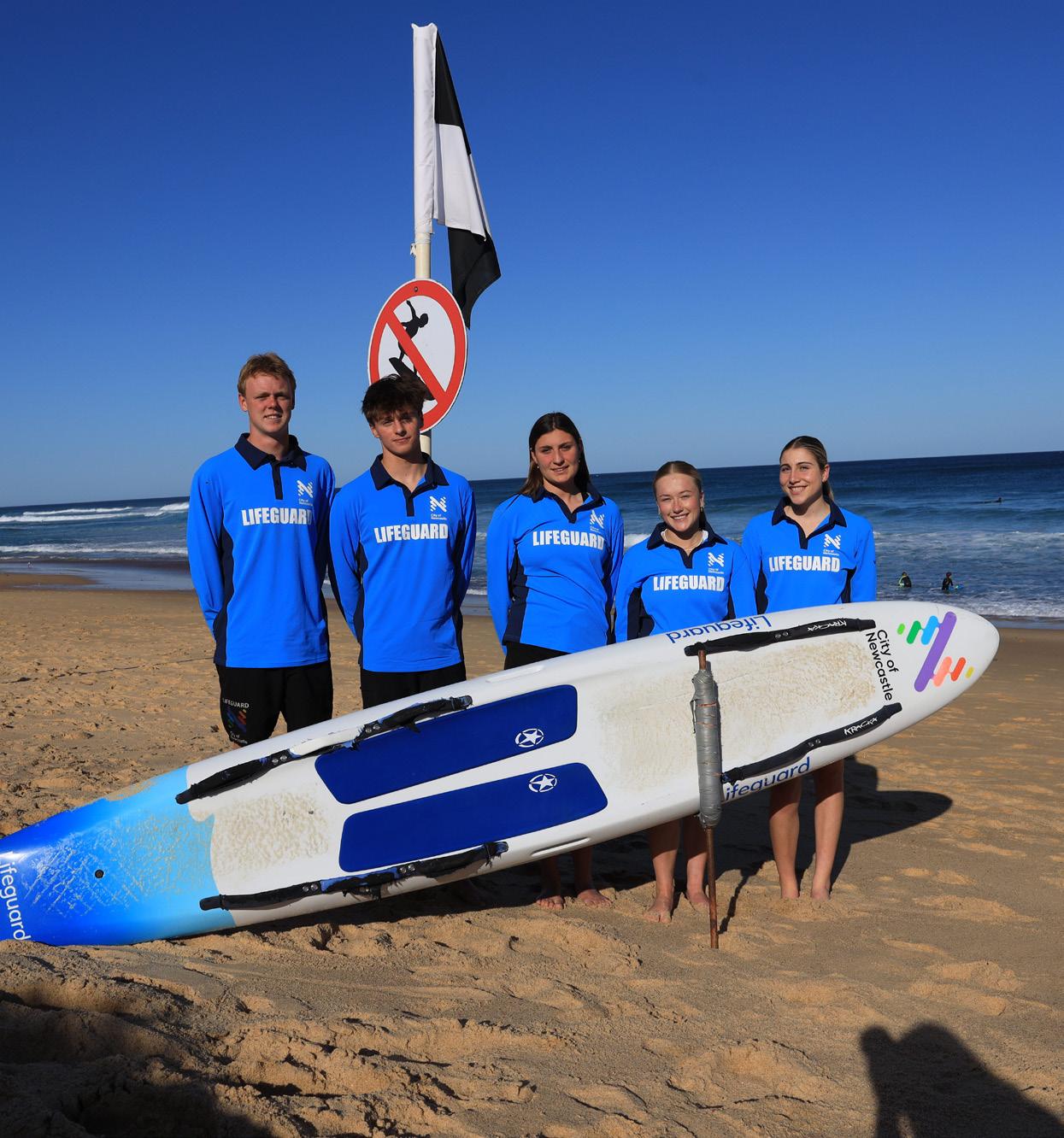
The informing strategies include:
• Customer Experience Strategy 2020–2025 (internal)
• Resourcing Newcastle 2040
• Long-Term Financial Plan 2025-2035
• Workforce Development Strategic Plan 2025–2029
• Asset Management Strategy 2025–2035
The supporting strategies and plans include:
• Inclusion, Diversity & Equity Strategy 2023–2027
• Disability Inclusion Action Plan 2022–2026
• Aboriginal Employment Strategy 2022–2025
Reconciliation Action Plan 2021–2024
actions 98%
completed or on track 54
4.1 Inclusive and integrated planning
Total measures 54% Measures on track 6
Data collected biennially
Level of community satisfaction with CN’s response to community needs 3.4
CN website sessions per month 365,935 (2023/2024) 392,786
Number of council resolutions resolved 185 (2023/2024) 237
Number of compliments and complaints determined at CN 162 compliments 18 complaints (2023/2024) 83 compliments 14 complaints
Level of community satisfaction with involvement in council decision-making
Number and value of approved community grants* $401,741 58 projects (2023/2024) $585,553.00 84 projects
* This includes core Community Support Grant funding only.
Regional collaboration strengthens Newcastle’s leadership role
CN formalised strategic partnerships with Upper Hunter, Muswellbrook and Coffs Harbour councils through Memorandums of Understanding (MoUs). These agreements position CN as a regional leader, fostering collaboration in planning, advocacy and service delivery.
Key highlights include:
• Establishing formal accords with three neighbouring councils
• Sharing expertise through staff exchanges and joint planning initiatives
• Extending CN’s award-winning Accelerated Development Assessment program
• Strengthening regional advocacy and grant application efforts.
CN’s Planning team has met with their Muswellbrook and Upper Hunter counterparts to share best practices. The MoUs also support joint submissions to the NSW and Federal governments and open pathways for collaborative projects that benefit communities across the region.
Over the next 12 months, CN will support its MoU partners in adopting the Accelerated Development Assessment tool. Continued collaboration will focus on shared learning, regional growth and improved service delivery.
The Brand Development Plan 2025–2028, an internal document, is a framework for strengthening CN’s reputation and relationships through strategic brand management and expanded engagement and promotion.
One of the first actions of the plan was the brand campaign
We’ve Got This, which connects the community with the places and services (and the people behind them) that make our city work. Through authentic, behind-the-scenes storytelling, CN staff shared their passion and expertise for the work they deliver day in and day out.

The initial creative assets focused on core operations such as maintenance, road repair, lifeguards and open space management in parks, playgrounds and sportsgrounds. Pat introduced the detailed planning that goes into our vibrant floral displays. Mel demonstrated what it takes to be a lifeguard through rescue scenario training. Rod and Dave showed how they keep our roads safe and smooth with essential pothole repairs. Jorja highlighted the precision involved in line marking our sporting fields.
We’ve Got This is building awareness and understanding of the many services, places, cultural institutions and initiatives CN delivers to help our community live their best lives.
CN endorsed the updated Newcastle 2040 CSP, a long-term framework guiding the city’s development over the next decade. The plan reflects community aspirations and supports CN’s goal of becoming a liveable, sustainable, inclusive global city.
Key highlights include:
• Endorsement of the Newcastle 2040 vision following public consultation
• Integration of nearly 6,000 pieces of community feedback
• Delivery of projects aligned with the plan, including Local Centre upgrades and infrastructure improvements
• Continued commitment to inclusive and future-focused planning.
CN engaged the community through workshops, surveys, strategic advisory committees and direct conversations. The strong support for Newcastle 2040 demonstrates shared ownership of the city’s future direction.

This year, CN continued to strengthen its digital foundations across cybersecurity, data and geospatial intelligence, and enterprise architecture. These efforts are driving smarter decision-making, improving service delivery and ensuring our technology environment remains secure, strategic and future-ready. The following initiatives reflect CN’s commitment to sector leadership and internal capability uplift across key IT domains.
CN advanced its enterprise data platforms, improving integration between Esri, TechnologyOne and Power BI to support data-driven decision-making. Governance practices were embedded, data quality uplifted for key asset and property datasets, and ETL (extract, transform, load) pipelines streamlined for improved accuracy and timeliness. Geospatial infrastructure was consolidated, with new self-service layers and dashboards published to support planning, reporting and compliance.
Significant progress was made on CN’s Spatial Digital Twin, integrating 3D models, terrain, flood data and real-time sensors. These capabilities are already being leveraged to support land use planning, infrastructure coordination and community engagement, with new data services and visualisation tools improving transparency and cross-team collaboration. As part of this uplift, we contributed to statewide knowledge sharing by presenting our digital twin approach to councils and government forums, reinforcing CN’s position as a sector leader in spatial intelligence and digital transformation.
CN significantly matured its enterprise architecture practice, establishing a central repository that maps applications to business processes and links across technology and data architecture. This has improved visibility, reduced duplication and strengthened decision-making around technology investments and service delivery.
An enterprise-wide IT roadmap was developed, aligning current and future initiatives with CN’s strategic goals. The roadmap provides a coordinated view of projects across architecture domains, enabling better prioritisation and positioning the EA practice as a key enabler of transformation.
CN continued to prioritise cyber security as a core element of corporate governance, reinforcing digital trust and assurance. In response to the growing sophistication and frequency of cyber threats, we implemented robust measures to protect digital assets and sensitive information.
Our cyber security policies and procedures align with the NSW Cyber Security Policy, as well as regulatory and leading industry standards. These frameworks guide our efforts in governing, identifying, protecting, detecting, responding to and recovering from cyber incidents.
Some of the key initiatives undertaken in the last 12 months include:
• Cyber resilience and incident response: CN has updated its Cyber Incident Response Plan to ensure swift, coordinated action during cyber events. Regular crisis and disaster recovery exercises across the organisation have strengthened readiness and capability. This collaborative approach supports our Disaster Recovery and Business Continuity Plan, ensuring resilient service delivery in a digital environment.
• Digital risk and assurance: CN has centralised its digital trust and assurance processes through a single platform, streamlining risk management and enhancing maturity across key frameworks, including the Australian Cyber Security Centre Essential 8, Payment Card Industry Data Security Standard, and the National Institute of Standards and Technology Cyber Security Framework.
• Cyber skills development: CN hosted a Capture the Flag event, offering local cyber professionals and students hands-on experience in ethical hacking and threat response. Delivered in collaboration with NSW government agencies, the simulated challenges helped participants build practical skills in detecting and responding to real-world cyber threats.
• Security service offerings: We have developed a local government-aimed training package to help uplift and promote cyber security maturity and development to other local government agencies. This strategic initiative is designed for collaboration across the sector and to help smaller agencies with tailored, bespoke cyber security awareness training content.
These efforts reflect our ongoing commitment to building trust, protecting essential services and enabling innovation.
Our Corporate Services directorate hosted its first-ever Shark Tank-style event, designed to inspire new ways of thinking, encourage practical problem-solving and enhance service delivery. The initiative responded directly to feedback from the Employee Engagement Survey by inviting team members to help shape meaningful improvements.
The event brought together over 120 team members from across the directorate, with 15 teams submitting creative pitches focused on improving efficiency and effectiveness in our everyday work. The winning pitch, Time to Focus on What Matters, came from within the Legal & Governance team and centred on simple, time-saving strategies, which were well received by both the ‘sharks’ and their colleagues.
The event not only sparked forward-thinking ideas to generate impactful efficiency improvements, but also strengthened team connections by promoting a culture of collaboration in a fun, semi-competitive setting.
Following the success of the winning pitch, the Corporate Services team took part in a Smart Work Masterclass led by renowned productivity expert Dermot Crowley. The session was positively received across the board, offering a valuable moment to reflect on how we can work smarter, not harder. Team members walked away with practical tools and fresh insights to help drive personal productivity and deliver even better outcomes for our organisation and community.

CN proudly recognised outstanding community contributions through its 2025 Citizen of the Year Awards, honouring individuals and groups who exemplify leadership, compassion and civic pride.
Bailey Myers, a 23-year-old Worimi man, was named Citizen of the Year for his extraordinary 4,500km solo walk from Perth to Newcastle, raising nearly $16,000 for the Indigenous Literacy Foundation. His six-month journey, inspired by his parents and driven by a passion for education, highlighted the importance of literacy in remote First Nations communities. Along the way, Bailey carried a handmade cart decorated with student handprints and connected deeply with Country, community and culture.
Young Citizen of the Year was awarded to Khuslen Batmandakh, 16, for her grassroots literacy initiatives in Jesmond and her leadership through the Leos Club at Merewether High School. Her projects include a community book nook, aged care outreach and support for local bus drivers.
Evelyn Collins received Senior Citizen of the Year for her tireless volunteer work supporting patients with Parkinson’s disease, including coordinating the Hunter Deep Brain Stimulation service and travelling to Sydney to assist patients through surgery.
The Unforgettables Dementia Choir was named Community Group of the Year for using music to support people living with dementia and their carers. Meeting weekly at the Newcastle Conservatorium of Music, the group fosters connection, memory and joy through song and shared experience.
These awards reflect CN’s commitment to recognising the everyday heroes who enrich our community and inspire positive change.
CN awarded its highest civic honour, Freeman of the City, to Distinguished Laureate Professor Roger Smith AM, recognising his global impact in medical research and public health. With a career spanning over 35 years, Professor Smith has advanced understanding of pregnancy, premature birth and stillbirth, and led initiatives that have improved maternal health outcomes in Australia and abroad.
He played a key role in founding HMRI and launched the Gomeroi Gaaynggal project to support Indigenous women’s health through art. His work in Nepal helped reduce maternal mortality by 40%, and his team’s discoveries around placental ageing and targeted treatments for premature birth have shaped international medical practice.
Professor Smith is the first scientist to receive the Freeman honour, joining a distinguished group of Novocastrians celebrated for their contributions to the city’s identity and future.
CN’s Annual Report continues to set a high standard for communicating achievements against the Operational Plan to the community. For the fifth year running, the Annual Report won a Gold Award in the 2025 Australasian Reporting Awards (ARA) for demonstrating overall excellence in annual reporting. The Awards provide all organisations that produce an Annual Report an opportunity to benchmark their reports against the ARA criteria, which is based on world best practice.
Increase ticket sales and optimise financial returns, including through the use of a range of commercial models for venue hires and partnerships
Provide effective management of investment portfolio to maximise return within our policy and risk framework
Lead prudent and proactive financial management across the organisation that ensures a positive financial legacy
Operate commercial function and event venues to full capacity and maximise profit
Ensure timely and accurate management of accounts payable, stores and logistics, purchasing procedures and financial authorisations to provide both internal and external customers with a high level of service
Ensure rates and charges for the financial year are levied and collected in accordance with relevant legislation, while also incorporating rates assistance provisions
Manage the Integrated Planning and Reporting Framework through inclusive, integrated planning and reporting and collaboration across the organisation
Maintain operational fleet and plant to provide cost-effective, safe, fit-for-purpose, legislatively compliant assets that support the needs of internal customers in delivering services to the community
Manage CN’s privacy management obligations
Coordinate and report on the Capital Works Program
Embed a resource-to-risk approach to Safe Work Procedure service delivery
Review and assess the Work Health and Safety Management System to ensure it remains fit for purpose
Implement Inclusion, Diversity and Equity Strategy (2023–2027)
Civic Services
Finance Property & Performance
Finance Property & Performance
Civic Services
Finance Property & Performance
Finance Property & Performance
Finance Property & Performance
Civil Construction & Maintenance
Legal & Governance
Project Management Office
People & Culture
People & Culture
People & Culture
Provide important and relevant updates to stakeholders regarding development, planning and regulations
Deliver information to the community to enable active participation in CN’s decision-making process
Deliver best practice community engagement services that build trust in the process
Deliver best practice engagement that is inclusive and accessible and builds trust in the process
Ensure delivery of engaging communications and promotional campaigns to promote services and offerings
Develop and implement a Culture Strategy
Deliver ongoing best practice improvements and embed the Enterprise Risk Management Framework
Maintain and deliver best practice information management including access, storage and release of information
Foster a positive reputation, improved trust and community goodwill through effective management of the CN brand
Develop and implement communication campaigns using a range of channels and media to support the achievement of strategic priorities
Identify high-risk projects and ensure strategic communication and stakeholder management plans are in place to manage risks to reputation
Implement Leadership Capability Framework and facilitate Leadership Development Program
Planning Transport & Regulation
Media Engagement Economy & Corporate Affairs
Media Engagement Economy & Corporate Affairs
Media Engagement Economy & Corporate Affairs
Museum Archive Libraries & Learning
People & Culture
Legal & Governance
Legal & Governance
Media Engagement Economy & Corporate Affairs
Media Engagement Economy & Corporate Affairs
Media Engagement Economy & Corporate Affairs
People & Culture
ACTION
Provide an exceptional visitor experience for all customers and stakeholders
Continue to provide high-quality, responsive customer service delivery to the community via phone, digital and counter channels
Provide regular and meaningful communications to both internal and external customers around customer experience improvement initiatives and customer satisfaction/success indicators
Manage and expand the Voice of the Customer Program to ensure the effective operation of closed-loop feedback
Deliver complaints-handling management and reporting
Design customer-centred experiences, digitised services and ways of working to empower customers and employees
Deliver ongoing best practice improvements and embed the Corporate Governance Framework
Develop and implement information security operations to manage and audit IT governance and meet legislation and regulatory compliance requirements
Deliver business partnering excellence and consistent project management by building on a foundation of trust and recommending solutions that sustainably enable CN’s strategic priorities
Provide timely advice and representation in high-risk legal matters supporting the delivery of strategic objectives
Develop and deliver a digital marketing strategy that improves the promotion and measurement of marketing campaigns, corporate website content and CN social media channels
Develop and maintain high-quality customer experiences and satisfaction
Develop a Property Investment Strategy that is underpinned by data-driven decision-making and financial sustainability
Civic Services
Customer Experience
Customer Experience
Customer Experience
Customer Experience
Customer Experience
Legal & Governance
Information Technology
Information Technology
Legal & Governance
Media Engagement Economy & Corporate Affairs
Museum Archive Libraries & Learning
Finance Property & Performance
Manage, improve and refine fleet assets through strategic planning, data-driven decision-making, alignment with CN’s sustainability goals and legislation, to meet service requirements
Strengthen CN’s crisis and emergency management capabilities
Maintain a best practice internal audit function in compliance with legislative requirements and Office of Local Government guidelines
Deliver centralised marketing services to assist internal clients in achieving their commercial and community objectives
Support delivery of capital works program through the provision of survey, design, planning, project and program management
Deliver digital transformation of CN services by leading the development of platforms and processes to maximise the benefit of digital investments
Identify process improvements to optimise processing timeframes and continue to improve the customer experience for the community
Implement a transformation strategy to harness our investments in improvement initiatives delivering customer, organisational and employee efficiency and effectiveness benefits
Assets & Facilities
Legal & Governance
Legal & Governance
Media Engagement Economy & Corporate Affairs
Project Management Office
Information Technology
Planning Transport & Regulation
Customer Experience
Continue optimisation of the Human Resource Information System (TechOne) People & Culture
Pursue best practice service delivery through a process of continuous improvement and investments in technology Civic Services
Further develop in-house agency providing marketing, digital and creative costed services to enhance effectiveness, improve strategic outcomes and deliver creative solutions
Drive cost savings and improve customer service levels through growth in the use of electronic rates emailing platform
Media Engagement Economy & Corporate Affairs
Finance Property & Performance
Expand Employee Listening Strategy and engagement with staff People & Culture
ACTION BAU
Deliver digital transformation of CN services by leading the development of platforms and processes to maximise the benefit of digital investments
Create a data-led organisation where data insights actively inform decision-making and future strategy for better planning, service delivery and outcomes for the city
Deliver needs-based solution architecture that directly links to CN’s priorities, objectives and governance requirements
Put the customer at the heart of CN marketing with insight and data-driven decision-making
Develop an organisation position matrix and critical skills inventory
Information Technology
Information Technology
Information Technology
Media Engagement
Economy & Corporate Affairs
People & Culture Off Track*
* Existing work in this space continues; however, due to other ongoing commitments, this new action has not significantly progressed at this time. CN has a planned resource allocated to support the delivery of this action within the next six months.
Contents:
• ARIC – Annual attestation
• Partnerships
• Contracts awarded
• Anti-slavery
• Modern slavery
• Remuneration
I am of the opinion that CN has an Audit, Risk and Improvement Committee, risk management framework and internal audit function that operate in compliance with the following requirements except as may be otherwise provided below:
1. CN has appointed an Audit, Risk and Improvement Committee that comprises an independent chairperson and at least two independent members (section 428A of the Local Government Act 1993, section 216C of the Local Government (General) Regulation 2021)
2. The chairperson and all members of CN’s Audit, Risk and Improvement Committee meet the relevant independence and eligibility criteria prescribed under the Local Government (General) Regulation 2021 and have not exceeded the membership term limits prescribed under the Regulation (sections 216D, 216E, 216F, 216G of the Local Government (General) Regulation 2021)
3. CN has adopted terms of reference for its Audit, Risk and Improvement Committee that are informed by the model terms of reference approved by the Departmental Chief Executive of the Office of Local Government and the committee operates in accordance with the terms of reference (section 216K of the Local Government (General) Regulation 2021).
4. CN provides the Audit, Risk and Improvement Committee with direct and unrestricted access to the Chief Executive Officer and other senior management and the information and resources necessary to exercise its functions (section 216L of the Local Government (General) Regulation 2021).
5. CN’s Audit, Risk and Improvement Committee exercises its functions in accordance with a four-year strategic work plan that has been endorsed by the elected Council and an annual work plan that has been developed in consultation with the elected Council and senior management (Core Requirement 1 of the Office of Local Government’s Guidelines for Risk Management and Internal Audit for Local Government in NSW)
6. CN’s Audit, Risk and Improvement Committee provides the elected Council with an annual assessment each year, and a strategic assessment each Council term of the matters listed in section 428A of the Local Government Act 1993 reviewed during that term (Core Requirement 1 of the Office of Local Government’s Guidelines for Risk Management and Internal Audit for Local Government in NSW)
7. The elected Council of CN reviews the effectiveness of the Audit, Risk and Improvement Committee at least once each Council term (Core Requirement 1 of the Office of Local Government’s Guidelines for Risk Management and Internal Audit for Local Government in NSW)
Membership
The chairperson and membership of the Audit, Risk and Improvement Committee
Assessment - Compliant Strategic Assessment - Not Yet Due - Due 2028/29
Not Yet Due - Due 2028/29
8. CN has adopted a risk management framework that is consistent with current Australian risk management standard and that is appropriate for CN's risk profile (section 216S of the Local Government (General) Regulation 2021)
9. CN’s Audit, Risk and Improvement Committee reviews the implementation of its risk management framework and provides a strategic assessment of its effectiveness to the elected Council each Council term (section 216S of the Local Government (General) Regulation 2021)
10. CN has an internal audit function that reviews the Council’s operations and risk management and control activities (section 216O of the Local Government (General) Regulation 2021)
11. CN’s internal audit function reports to the Audit, Risk and Improvement Committee on internal audit matters (sections 216M, 216P and 216R of the Local Government (General) Regulation 2021)
12. CN’s internal audit function is independent and internal audit activities are not subject to direction by the CN (section 216P of the Local Government (General) Regulation 2021)
13. CN has adopted an internal audit charter that is informed by the model internal audit charter approved by the Departmental Chief Executive of the Office of Local Government and the internal audit function operates in accordance with the charter (section 216O of the Local Government (General) Regulation 2021)
14. CN has appointed a member of staff to direct and coordinate internal audit activities for CN Council (section 216P of the Local Government (General) Regulation 2021)
15. Internal audit activities are conducted in accordance with the International Professional Practices Framework (Core requirement 3 of the Office of Local Government’s Guidelines for Risk Management and Internal Audit for Local Government in NSW)
16. CN provides the internal audit function with direct and unrestricted access to staff, the Audit, Risk and Improvement Committee, and the information and resources necessary to undertake internal audit activities (section 216P of the Local Government (General) Regulation 2021)
17. CN’s internal audit function undertakes internal audit activities in accordance with a four-year strategic work plan that has been endorsed by the elected Council and an annual work plan that has been developed in consultation with the elected Council and senior management (Core Requirement 3 of the Office of Local Government’s Guidelines for Risk Management and Internal Audit for Local Government in NSW)
18. CN’s Audit, Risk and Improvement Committee reviews the effectiveness of the internal audit function and reports the outcome of the review to the elected Council each Council term (section 216R of the Local Government (General) Regulation 2021)

Not Yet Due - Due 2028/29
Not Yet Due –Scheduled for 2026/27
Regulation cl 217(1)(a6)(a7)(a8)
CN jointly owns Newcastle Airport Pty Ltd (a company limited by shares) with Port Stephens Council (PSC), making it the largest Australian airport remaining in public ownership.
The airport is serviced by all the major domestic airlines that provide services to the major destinations along the east coast of Australia. It significantly contributes to the domestic and international growth of business and tourism to our region and surrounds.
In May 2021, the Federal Government announced $66 million in funding for upgrading the airport’s runway to international standards. Further to this, in April 2022, the Federal Government announced that Newcastle Airport would receive $55 million in funding to significantly expand and upgrade its international passenger terminal.
The airport is governed by a Board of Directors comprising both independent and shareholdernominated directors, including Cr Callum Pull and CEO Jeremy Bath.
CN and PSC hold a Head Lease agreement with the Department of Defence for 28 hectares of land to the south of Williamtown RAAF Base. An agreement also exists with RAAF to provide landing and take-off rights, services and use of airport infrastructure.
CN is a member of Statewide Mutual (the Mutual).
The Mutual started in 1993 as a joint venture with members forming a ‘self-insurance mutual’ covering public liability and professional indemnity insurance. Membership has expanded to 113 member councils.
The Mutual is a discretionary mutual providing cover for its member councils’ major insurable risks. The Mutual is backed by reinsurance placed through local and international underwriters. Members own each scheme and benefit from building equity resulting from surplus contributions. The Mutual applies innovative practices to the management of Local Government insurance to ensure the protection of member councils through stable premiums, cost containment and spread of risk.
For over 70 years, local government in the Hunter has found significant benefit in working together through positive cooperation and resource sharing.
The ten Hunter councils include: Cessnock City Council, Dungog Shire Council, Lake Macquarie City Council, Maitland City Council, MidCoast Council, Muswellbrook Shire Council, City of Newcastle, Port Stephens Council, Singleton Council, and Upper Hunter Shire Council.
Arising from this collaboration, the ten Hunter councils collectively own and manage the following corporate entities:
• Hunter Joint Organisation (JO): A statutory body under the Local Government Act 1993, established in 2018 to identify, advocate for and collaborate on regional strategic priorities for the Hunter. The Hunter JO’s statutory mandate includes identifying key regional strategic priorities, advocating for these priorities, and building collaborations around these priorities with other levels of government, industry and the community.
• Arrow Collaborative Services Limited (and its wholly owned subsidiary Hunter Councils Legal Services Limited): Companies limited by guarantee under the Corporations Act 2001 and established to improve the quality and efficiency of services provided by Hunter councils and local government more broadly across NSW. The services provided focus on specialised planning and environmental law, and regional purchasing and procurement. Arrow also provides direct administration and corporate support to the operations of the Hunter JO.
• Hunter Councils Incorporated: An incorporated association under the Associations Incorporation Act 2009 that holds property assets for the Hunter JO and Arrow Collaborative Services.
CN has representation on each entity’s board, and shares ownership and governance of the entities with the other nine councils of the Hunter Region.
CN continues to strengthen its emergency preparedness and response capabilities through a dedicated Emergency Management function. This position supports CN in meeting its obligations under the NSW Emergency Management Framework, including providing executive support facilities to both the Local Emergency Operations Controller and the Local Emergency Management Committee (LEMC).
CN and Lake Macquarie City Council operate a combined LEMC, which met four times during the reporting year to plan for and review emergency management strategies. Although the committee’s annual exercise was scheduled for June 2025, a natural disaster led to its postponement to August 2025.
The city was impacted by declared natural disasters in both January and May 2025, involving severe weather and storms that caused flash flooding and damage to CN infrastructure. The May 2025 event included a significant landslide in New Lambton, affecting 16 homes and leading to the evacuation of 39 residents. CN supported the establishment of an Emergency Operations Centre to coordinate the response and support affected community members. To date, the NSW Government’s Reconstruction Authority has offered little to no assistance to CN or the affected property owners.
CN also prioritised community resilience through education and engagement. In March 2025, we partnered with Disaster Relief Australia to deliver the ‘Big Map’ exercise, a hands-on workshop that brought together emergency management experts and community members to identify local risks, share experiences and explore ways to better prepare for future events.

During the 2024/2025 financial year, we awarded the following contracts/work valued over $150,000, as detailed in the table below:
Act
s 428(4)(c)
CN has not had any issues raised by the Anti-slavery Commissioner during 2024/2025 concerning its operations.
s 428(4)(d)
CN has included the following statement in its Procurement Policy:
CN will ensure it complies with its obligations under the Commonwealth Modern Slavery Act 2018 and any other modern slavery legislation that may come into effect. CN will undertake ongoing due diligence to minimise or eliminate the risk of modern slavery occurring in its supply chain. As part of its due diligence, CN will undertake an annual risk assessment of all CN suppliers. CN will not participate in any procurement with a supplier that is found to be engaging in modern slavery.
In addition, CN’s Statement of Business Ethics includes the following:
Suppliers and contractors must comply with the requirements under the Modern Slavery Amendment Act 2021 (Cth) and all related legislation including the Modern Slavery Act 2018 (NSW). Council will not participate in any procurement with a supplier or contractor that is found to be engaging in modern slavery.
The completed GRS Modern Slavery Annual Reporting Template, as set out in the NSW Anti-slavery Commissioner’s Guidance on Reasonable Steps (December 2023), is included in the Appendix on page 252.
Chief Executive Officer (CEO) and senior staff members
Reg cl 217(1)(b)(i), (ii), (iii), (iv), (v)
Reg cl 217(1)(c)(i), (ii), (iii), (iv), (v)
During the 2024/2025 financial year, CN’s senior staff members comprised:
Chief Executive Officer
Executive Director City Infrastructure
Executive Manager Assets & Facilities
Executive Manager Project Management Office
Executive Director Corporate Services and Chief Financial Officer
Executive Manager Customer & Transformation
Executive Manager Legal & Governance
Executive Manager Finance Property & Performance and Deputy CFO
Executive Manager People & Culture
Chief Information Officer
Executive Director Creative & Community Services
Executive Manager Community & Recreation
Executive Manager Media Engagement Economy & Corporate Affairs
Executive Director Planning & Environment
Executive Manager Environment & Sustainability
Managing Director Waste Services
Executive Manager Commercial (Waste) – until March 2025
Executive Manager Operations (Waste)
Following the Local Government Amendment (Employment Arrangements) Act 2024, employees in the below Executive Manager positions are no longer defined as senior staff members and are therefore not included in the remuneration calculations required under Regulation 217. Executive employees (other than the CEO) will continue to transition out of senior staff member arrangements over the next four years.
Executive Manager Civil Construction & Maintenance
Director Museum Archive Libraries & Learning
Director Art Gallery
CEO
Senior Officers x 17
TOTAL
FBT for non-cash benefits
$528,336 (including superannuation and non-cash benefits)
$4,447,291 (including superannuation and non-cash benefits)
$4,975,627
$24,004
All figures stated are in line with relevant legislation that requires the following components to be reported:
(i) The total of the values of the salary components of their packages
(ii) Total amount of any bonus payments, performance payments or other payments made to the CEO that do not form part of the salary component of the CEO
(iii) Total amount payable by Council by way of the employer’s contribution or salary sacrifice to any superannuation scheme to which the CEO may be a contributor
(iv) Total value of any non-cash benefits for which the CEO may elect under the package
(v) Total amount payable by Council by way of fringe benefits tax for any such non-cash benefits.


CN employs a diverse group of over 1,400 talented people with varying skills and expertise who are responsible for providing services and facilities to more than 174,000 people living in the Newcastle LGA.

Chief Executive Officer
Jeremy Bath
Managing Director Waste Services

Executive Director Planning & Environment

Environment & Sustainability Michelle
Planning & Development
Transport & Regulation Business Operations & Customer Excellence

Robert Dudgeon (interim)
Assets & Facilities
Executive Director City Infrastructure Civil Construction & Maintenance
Project Management Office
Executive Director Corporate Services

David Clarke
Finance, Property & Performance
Information Technology
Legal & Governance
Customer Experience
People & Culture
Executive Director Creative & Community

Media, Engagement, Economy & Corporate Affairs
Museum Archive Libraries & Learning
Community & Recreation
Civic Services
Art Gallery
The Chief Executive Officer (CEO) and the Executive Directors of the four Directorates make up our Executive Leadership Team (ELT). The CEO is responsible for the day-to-day management of the departments, overall operation of the organisation and ensuring the implementation of Council decisions. The Executive Directors assist the CEO in the development of long-term strategic plans and their delivery, while ensuring the organisation is meeting its obligations.
Communication, Journalism and Media Studies, UON; Principles of Economics, Stanford University; Energy Storage Integration, Stanford University; City Leadership Initiative, Bloomberg Harvard.
Jeremy joined CN as CEO in 2017. Born in Newcastle, but having spent most of his career in Sydney, Jeremy returned home in 2013 to work with Hunter Water. During his four years with the State-Owned Corporation, Jeremy was promoted to the ELT and ultimately appointed as the interim CEO for 12 months by the NSW Government. In 2017 he accepted the role of CEO of CN, where he has overseen a significant reshaping of the organisation into one focused on partnering with other levels of government as well as the private sector and community.
Jeremy led the move to CN’s Administration Centre at 12 Stewart Avenue, which is home to NSW’s first Digital Library, as well as its award-winning mobile Council Chamber and best-in-state Emergency Operations Centre.
Jeremy has brought a strong financial discipline to the organisation, delivering operational surpluses in all years unaffected by the pandemic. Our capital works program has increased from $80 million to $164 million under his leadership, while growing our total assets to $3.9 billion.
Jeremy also sits on the Board of Newcastle Airport and its property arm, Greater Newcastle Aerotropolis Pty Ltd.
Bachelor of Science (Architecture), Bachelor of Architecture (Honours), UON; formal qualifications in project management and leadership; registered architect.
Robert has served CN for 13 years, where he has led the Project Management Office to deliver consecutive record-breaking capital works programs.
Robert’s portfolio includes landmark community projects such as the Newcastle Art Gallery expansion, Bathers Way South Newcastle Beach, East End Public Domain upgrades and the commencement of the western corridor upgrades.
As CN’s Interim Executive Director City Infrastructure, Robert is shaping resilient infrastructure and enhancing community assets. He is a values-driven and trusted leader known for his strategic thinking, inclusive leadership style and ability to build high-performing, engaged teams that deliver meaningful outcomes for the people of Newcastle.
Areas of responsibility include Assets & Facilities, Project Management Office and Civil Construction & Maintenance.
David Clarke
Executive Director Corporate Services and Chief Financial Officer (CFO)
Environmental qualifications from UON; Graduate of the Australian Institute of Company Directors.
David joined CN in August 2018 and has 25 years’ experience working with communities, stakeholders and governments, including 17 years as CEO and Director in local and state government.
As Executive Director and CFO, David is leading the transformation of CN’s corporate services to support the organisation and city to succeed, focusing on strengthening organisational capability and financial sustainability.
Areas of responsibility include Finance, Property & Performance, Legal & Governance, Information Technology, Customer Experience and People & Culture.
Bachelor of Commerce with a double major in Finance and Financial Accounting from UON; Certificate IV in Frontline Management; Emerging Leadership Program, Work Smart Australia; Local Government Leadership short course, University of Technology Sydney; Project Management qualifications from the Australian Institute of Management; Certified Practising Accountant; member of CPA Australia; member of the Institute of Company Directors.
Alissa joined CN in 2018 as CFO, becoming CN’s first female CFO. She was a finalist in the 2019 Ministers’ Awards for Women in NSW Local Government and received a Highly Commended Award for Women in a Non-Traditional Role.
In her role as Executive Director Creative & Community Services, Alissa leads a diverse team focused on driving community engagement and creative initiatives across the city.
Areas of responsibility include Media, Engagement, Economy & Corporate Affairs, Museum Archive Libraries & Learning, Community & Recreation, Civic Services and Newcastle Art Gallery.
Graduate Diploma in Urban and Regional Planning, University of Sydney; Diploma of Government (Management) 2018; member of Planning Institute of Australia; graduate of the Australian Institute of Company Directors 2022.
Michelle joined CN in 2018, bringing a wealth of local and state government experience in the field of town planning spanning over 30 years. In 2021, Michelle was awarded the Planning Institute of Australia Inaugural Dr Helen Proudfoot Women in Planning Award and has led the delivery of CN’s award-winning Accelerated Development Application System.
As CN’s Executive Director Planning & Environment, Michelle is leading the transformation of CN’s environmental and planning portfolio, guiding the future development of the city and enhancing our environment.
Areas of responsibility include Planning, Transport & Regulation and Environment & Sustainability.
Bachelor degree in Civil Engineering, UON.
David joined CN in 2024, following more than 10 years with the state government leading agencies undertaking work in the environmental, agricultural and infrastructure sectors. Following the devastating floods on the NSW North Coast in February and March 2022, David was responsible for establishing the Northern Rivers Reconstruction Corporation and the program of works to improve the future flood resilience of the community and key infrastructure.
As CN’s Managing Director Waste Services, David leads the operation and development of the Summerhill Waste Management Centre, which is the largest local government-operated landfill in NSW and a critical regional asset.
Areas of responsibility include Waste Education, Service Delivery and Landfill Operations.
CN delivers a wide range of services to meet our vision for a liveable, sustainable and inclusive global city.
Planning & Environment
Environmental Strategy
Climate Change and Sustainability
Environmental Assets
City Greening
Blackbutt, Natural Areas and Invasive Species
City-Wide Development Assessment
City Significant Strategic Planning
Compliance Operations
Environmental Health
Traffic Engineering and Transport Planning
City Infrastructure
Asset Management
Building Trade Services
Facilities Management and City Presentation
Fleet and Plant Management
Project Management
Civil Construction
Road Maintenance
Depot Management
Corporate Services
Corporate Finance
Contracts and Procurement
Property Services
Rates and Debt Management
Corporate Planning and Performance
Information Technology
Governance and Councillor
Services
Legal Services
Records and Information Management
Enterprise Risk and Audit
Customer Service Centre
Business and Customer Improvement
Workforce Development
Safety and Wellbeing
Talent Diversity and Inclusion
City Events
Creative & Community
Marketing and Tourism
Economic Development and Capacity-Building
Visitor Information Centre
Media and Stakeholder Relations
Museum and Libraries
Children’s Education Services
Fort Scratchley Historic Site
Art Gallery
Civic Theatre including Civic Playhouse
Civic Venues including City Hall and Fort Scratchley Function Centre
Community Planning and Development
Social Planning
Community Halls and Cemeteries
Aquatic Services - Inland Pools and Professional Lifeguards
Waste Management
Landfill Management and Resource Recovery
Waste Collection and Service Delivery
Community Education Programs
Waste Infrastructure and Assets
Sport and Recreation - Planning, Projects and Maintenance
Parks, Playgrounds, Sporting Fields and Dog Parks
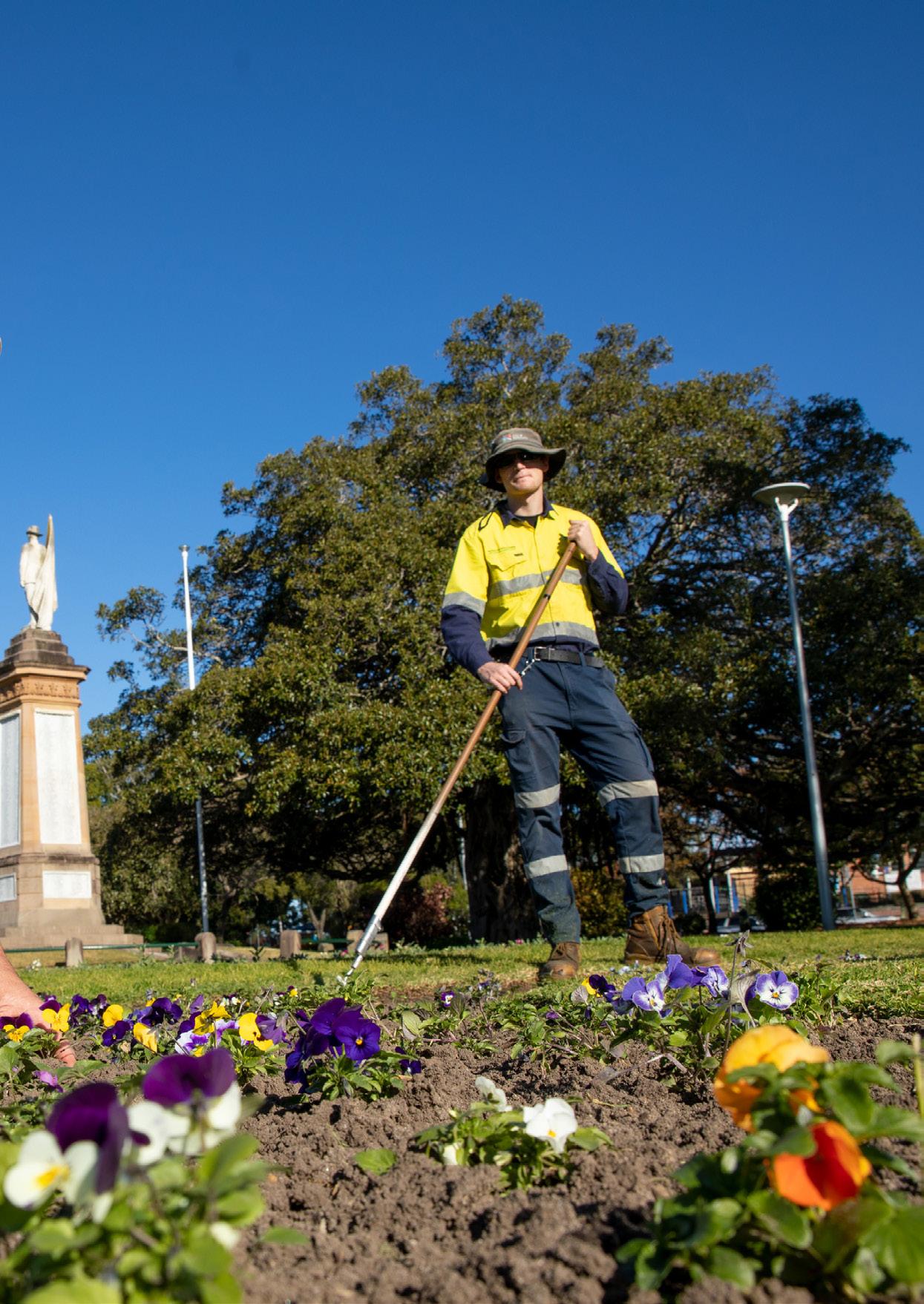
CN employs over 1,500 staff and is responsible for providing services and facilities to more than 174,000 people living in Newcastle.
We have a workforce of over 1,400 employees, made up of permanent, casual, fixed-term and temporary positions. To meet short-term demand and respond to peak workloads, we also supplement our team with external labour hire when needed. This flexible approach enables us to maintain operational agility while ensuring job security for our permanent employees.
16% of our employees have over 20 years’ service
temporary/term contract 53% of our managers are women 50% of our Executive Directors are women 23% of our employees are over the age of 55
Based on the Inclusive Employer Index (IEI) in September 2023, which had a response rate of ~45% (528 staff):
4% of our overall workforce identified as Aboriginal and/or Torres Strait Islander
8% identified as a person with a disability 11% identified as multilingual
12% identified as LGBTIQ+
CN staff identified with 59 different cultural backgrounds.
The IEI was conducted again in September 2025 to compare current data with our baseline from 2023 and to measure progress towards the goals of our Inclusion, Diversity & Equity Strategy 2023–2027.
During 2025, we undertook a comprehensive review of our workforce needs, which involved external research, environmental scanning, and assessment of future workforce needs through consultation with our leaders, the CN Consultative Committee and subject matter experts. This collaborative process helped us identify the key priorities that will shape our workforce over the next four years.
Our goal through to 2029 is to build an inclusive, highly skilled and future-ready workforce that is responsive to the evolving needs of our community and the shifting nature of work. We are committed to fostering a culture of innovation, adaptability and wellbeing, ensuring our people are empowered to deliver on the vision of Newcastle 2040
The WDSP 2025–2029 focuses on three core priorities:
• Cultivating organisational health: Strengthening wellbeing, inclusion, leadership, capability and engagement to build a resilient and high-performing workforce.
• Accelerating workforce optimisation: Amplifying our employee value proposition and enhancing agility, productivity and efficiency through smarter systems, data-driven planning and streamlined processes.
• Shaping tomorrow’s workforce: Investing in digital capability, innovation, attracting the next generation, and career pathways to ensure long-term sustainability and workforce readiness.
To deliver on the commitments outlined in this plan, we will integrate these priorities into our Operational Plan and Delivery Program. Progress will be tracked through regular reporting, performance metrics and employee listening data, with regular reviews to adapt to emerging trends and challenges. By measuring success and maintaining accountability, we will ensure the plan remains responsive, effective and focused on building a strong workforce for Newcastle’s future.
Building workforce capability has remained a key priority for CN throughout the year. We focused on attracting, retaining and developing skilled staff through targeted upskilling, reskilling and leadership initiatives to address skill gaps and meet evolving organisational and community needs.
Enterprise capability mapping was conducted to align leadership competencies with strategic priorities outlined in Newcastle 2040. This work informed the development of our Leading the CN Way leadership framework, which defines the skills, behaviours and mindset required for effective leadership at CN. The framework was a finalist in the NSW Local Government Excellence Awards.
Centred on three core pillars – Energise People, Elevate Performance and Create our Future – the framework equips our leaders to build high-performing teams, lead through change, drive continuous improvement, foster engagement and deliver results.
To build and embed these capabilities, we commenced the design and delivery of programs including:
• Sponsoring and Activating Change
• Accelerated Coaching
Inclusion, Diversity and Equity (IDE) programs
• Smart Work
• Biannual leadership events to bring leaders together to share insights, strengthen strategic alignment and build a connected leadership community.
Together, these initiatives ensure our leaders are confident, capable and aligned with the delivery of our strategic goals, while fostering a culture of care, innovation and continuous improvement.
We enhanced our systems to support capability development at scale. This included an accreditation management system, digital personal development planning platform, EDTV digital learning hub, e-learning authoring tool, AI-powered animator and improved reporting with live system dashboards. These tools help streamline development planning, enable efficient learning, and provide real-time insights to help build a more agile and skilled workforce.
As part of our commitment to safety, we reviewed and streamlined our safety training requirements to ensure every employee is equipped to make the safest choice at work. We clearly identified the training needed across high-risk activities, licences and legislative obligations, and made it easily accessible through our updated systems. Training completion can now be monitored in real time, helping us maintain compliance and ensure our workforce remains safe, informed and protected.
Over 14,000 learning activities were undertaken by our workforce across a variety of formats, including e-learning, traditional classroom sessions and blended learning. Thirteen employees successfully completed formal qualifications, further strengthening our organisational capability. To foster knowledge sharing and enhance social learning, Communities of Practice were established in key areas such as Change, Coaching, Artificial Intelligence and our TechnologyOne platform.
The Future Fit Program represents CN’s commitment to building a skilled and future-ready workforce by actively engaging apprentices, trainees, cadets, undergraduates and graduates in meaningful career pathways. For apprentices especially, it provides hands-on experience, structured development and a clear pathway to long-term careers in local government.
Participants in the program span over 25 different professions, showcasing the wide range of career opportunities available in local government and the diverse expertise needed to support our community. This breadth is a hallmark of the program as a whole, not just its recent expansion.
This year, CN secured $1,005,439 in funding through the NSW Government's Fresh Start Program, welcoming 23 new Future Fit participants and taking our total program participants to 68.
In 2024/2025, we recruited three trainees, three apprentices and one cadet under the Fresh Start grant.
Apprentice Civil Construction x 2
• Apprentice Horticulture
• Trainee Business Services – Waste
Trainee Natural Areas
• Trainee Ranger
• Undergraduate Engineer
Furthermore, this year we expanded the program to introduce the Career Ready Framework, which will support students through tailored placements and practical work experience within CN. This initiative aims to help the next generation joining the workforce build confidence, capability and career direction while strengthening ties to our community. Our first intern cohort under this new framework commenced in August 2025.
Together, these programs reinforce CN’s workforce pipeline, boost local employment and ensure we continue to grow with capable, community-connected talent.
At CN, we continue to invest in strengthening our organisational culture and enhancing employee engagement. In November 2024, we launched our Culture Strategy Blueprint, Living the CN Way, which brings our values and behaviours to life, accentuating that we are Constructive, Caring and Courageous.
A finalist in the NSW Local Government Excellence Awards, the blueprint helps bridge the gap between intention and action, making it easier for our people to understand what’s expected and where to focus their energy, effort and time. This shared understanding is key to building a strong, values-led culture that supports the successful delivery of Newcastle 2040
Together with our refreshed CREW Values and other underpinning strategies, these principles guide how we work, collaborate and support one another. Our values are, in essence, how we show up and perform our work every day.
Employee engagement remains a central focus, with our sixth annual survey showing a continued upward trend: our engagement score rose to 7.7 in 2025, up from 7.4 the previous year. Leaders across the organisation are actively driving engagement action planning informed by team-level feedback. These locally led plans are helping teams focus on what matters most to their people, fostering a more connected, inclusive and responsive work environment. In the year ahead, we will broaden our employee listening plan by introducing additional feedback channels.
Reg cl 217(1)(a9)
The supporting strategies and plans include:
• Aboriginal Employment Strategy 2022–2025
• Reconciliation Action Plan 2021–2024
• Disability Inclusion Action Plan 2022–2026
• Inclusion, Diversity & Equity Strategy 2023–2027
We are here to serve our community, which is made up of people with diverse experiences and perspectives. CN is committed to making inclusion, diversity and equity in the workplace a priority, and to providing workplace flexibility and equal employment opportunities to all our employees.
We want to create an inclusive workplace culture where everyone feels respected, safe and valued, so they can be themselves and fully contribute their opinions and perspectives to the success of the organisation. We value diversity of thought, and we focus on equity in the workplace. We want CN to be an employer of choice and a great place to work for everyone, as well as being representative of the rich and diverse needs of the Newcastle community.
Our first Inclusion, Diversity & Equity Strategy 2023–2027 (IDE) was launched in 2023. We are now at the halfway point of the strategy, and have spent the first two years building strong foundations and awareness around IDE. We are now shifting our focus towards integrating inclusion and everyday respect into business-as-usual and further embedding it into our workplace culture.
Our strategic pillars under the IDE Strategy are:
• Inclusive and welcoming workplace culture
• Inclusive leadership
Our focus areas under the IDE Strategy are:
• Aboriginal and Torres Strait Islander engagement
• Accessibility
• Cultural and linguistic diversity
• Diverse and representative workforce.
• Gender equity
• LGBTIQ+ inclusion.
The following IDE initiatives were implemented or initiated across CN throughout 2024/2025:
• Biannual meetings of IDE Steering Committee, chaired by the CEO and including representatives from all five IDE Networks/Working Groups as well as the five Executive Champions
• Organised events on Days of Significance, featuring personal stories of people with diverse lived experiences, including International Women’s Day, Harmony Day, IDAHOBIT, International Day of People with Disability, National Carers Week, Wear it Purple Day, International Day for the Elimination of Violence Against Women and Girls, NAIDOC Week, National Reconciliation Week
• Developed customised IDE e-learning to form part of the mandatory corporate induction and onboarding process
• Developed new Workplace Adjustments Framework to support employees and candidates with disability and carers, and enable them to fulfil the inherent requirements of their role
• Developed Sexual Harassment Prevention & Response Plan to address legislative updates to the Sex Discrimination Act 1984 (Cth) and the introduction of positive duty for organisations
• Developed an Inclusive Recruitment Toolkit and integrated IDE into our Talent Acquisition Policy and procedures, as well as our new Employee Value Proposition
• Conducted tailored IDE training sessions with various teams on topics such as inclusive behaviour, inclusive language and bystander action
• Continued an ongoing communication campaign to raise awareness about IDE across the organisation, including regular NovoNews items around Days of Significance and monthly rotation of screensavers/ digital screens/posters to promote different IDE topics
• Conducted ongoing information and engagement sessions to increase awareness and encourage involvement in IDE across the organisation.
The past 12 months have seen several key initiatives rolled out across CN, focused on building capability of all staff and volunteers to make the safest choices as we continue our journey to WHS best practice.
We focused on the following initiatives:
• Completed review and update of the WHS Management System to better reflect organisational safety maturity
• Continued implementation of the Safety and Wellbeing Partnering model to build organisational capability and to identify, manage and control key (critical) safety risks specific to work functions
Delivery of an online contractor management system, replacing the manual paper-based system
• Delivery of Phase One of the accreditation project to automate and manage compliance for mandatory training
• Development of a Psychosocial Risk Management Framework
Delivery of the Focus Topic Program to manage critical risks
• Delivery of the Safety Raffle to cascade desirable safety behaviour through immediate recognition of positive safety contributions
• Provision of additional funding to the Safety Initiative and Wellbeing awards to encourage a solutionfocused, value-add mindset
• Implementation of a suite of health and wellbeing initiatives that are evidence-based, accessible and person-centred, and reduce risk of injury or illness
Establishment of a proactive, sustainable approach to communicating information on emerging risks and controls
• Delivery of Phase One of the Fitness for Work program to support health and wellbeing through the entire employee life cycle.
Our WHS performance in 2024/2025 is reflected as follows:
• Continued top-tier exemplar performance for workers compensation, as assessed by an external agency
• Recognised by the State Insurer Regulatory Authority as one of the Top 10 performing self-insured organisations in NSW
• Workers Compensation Claims Managers having capacity to make strategic decisions has resulted in significant outcomes on legal claims for CN
Finalist in the 2025 Hunter Safety Awards
• One SafeWork NSW improvement notice issued
• Lost Time Injury Rate decreased from 5.64 (2023/2024) to 4.73 (2024/2025)
• Lost Time Injury Frequency Rate decreased from 23.50 (2023/2024) to 20.37 (2024/2025)
• Lost Time Injuries decreased from 62 (2023/2024) to 55 (2024/2025)
• Total Injuries increased from 161 (2023/2024) to 196 (2024/2025).
The following initiatives were undertaken throughout 2024/2025 as part of improving staff wellbeing and reducing the risk of injury:
• Implementation of the Health and Wellbeing Strategy 2024–2028
• Delivery of targeted, evidence-based health and wellbeing activities
Continuation of the Mental Health Ambassador Program to facilitate early intervention, focused on improving psychological wellbeing
• Developing leader capability in workplace mental health through delivery of mental health and critical incident training
• Focus on mental health training for employees to support peers and improve mental health outcomes for all
• Focus on improving mental health literacy across the organisation through education, communication, and participation in key events such as R U OK Day, push-up challenge, Movember and Everyone Has a Story (a Hunter Industries health initiative aimed at breaking down mental health barriers)
• Delivery of key initiatives designed to promote physical and mental wellbeing, such as early intervention physiotherapy service, early intervention psychology service, Steptember, yoga and group fitness classes
• Expansion of the Employee Assistance Program, promoting the service as a preventative program
• Flu vaccination program, resulting in over 300 flu vaccinations for staff
• Expansion of the corporate fitness program
NovoNews education pieces aimed at rest and recovery to avoid burnout.
The below table provides a breakdown of the number of persons who performed paid work for CN on Wednesday, 4 December 2024.
by the Council:
Number of persons employed by the council who are ‘senior staff’ for the purposes of the Local Government Act 1993
Number of persons engaged by the council under a contract, or other arrangement with the person’s employer, that is wholly or principally for the labour of the person
Number of persons supplied to the council, under a contract or other arrangement with the person’s employer, as an apprentice or trainee
CN volunteers continue to be an invaluable asset to our community, enriching our natural spaces and strengthening cultural and social connections that make Newcastle a vibrant place to live and play.
During 2024/2025, CN formally recognised 6,707 volunteer hours in our financial statements across a wide range of programs.
These hours represent services that would otherwise have required financial investment, highlighting the tangible value of volunteer contributions. However, the true impact of our volunteers extends well beyond what is captured in financial reporting. Every day, Newcastle volunteers are out in the community, caring for bushland and coastal reserves, supporting local events, and assisting visitors at our Libraries, Museum, Playhouse, Art Gallery, and Blackbutt Reserve.
6,707 volunteer hours valued at $229,000
We recognise our staff achievements through a variety of mechanisms, including Blue Bus Shout Outs, team meetings and messages, and our employee recognition and reward program, which awards small gift vouchers to employees for outstanding performance and contributions to CN's success.
Over 1,200 vouchers were distributed to managers to recognise team members for their achievements, along with the CEO CREW Awards, selected by the CEO from employee nominations to celebrate and recognise employees for demonstrating one or more of CN’s CREW values.
Building on this culture of recognition, our monthly TRuST Awards honour employees who consistently demonstrate CN’s customer TRuST Principles: Transparent, Respectful, You, Simple, Timely. These awards span the breadth of CN, with recipients from diverse service areas including aquatics, compliance, building trades, rates, roads, waste, planning, assets, and accounting, highlighting the everyday excellence that drives our organisation forward.
CN was a winner or finalist in the following awards during 2024/2025:
• New Annual – Leo Kelly OAM Arts and Culture Award at the Local Government Week Awards
• South Newcastle Beach upgrade – Asset & Infrastructure Excellence Award at the 2025 NSW Local Government Excellence Awards, for its contribution to community wellbeing and placemaking
• Beach Lifeguard Traineeship Program – finalist for the Community Partnerships Excellence Award at the 2025 NSW Local Government Excellence Awards
• Blackbutt community multipurpose facility and café – recognised at the 2025 Master Builders Association Awards, with CN contractors Kingston Building awarded Best Public Building ($1M–$5M) and Best Commercial Project ($2M–$4M)
• ‘Your City, Your Way’ digital transformation of customer request management – received Highly Commended in the Customer Experience category at the 2025 NSW Local Government Awards
• Newcastle Environment Strategy – received a Highly Commended award at the Local Government NSW Excellence in the Environment Awards
• Nine award nominations at the City of Newcastle Drama Association (CONDA) and a finalist in the Supporting Local Enterprise category at the Local Government awards.
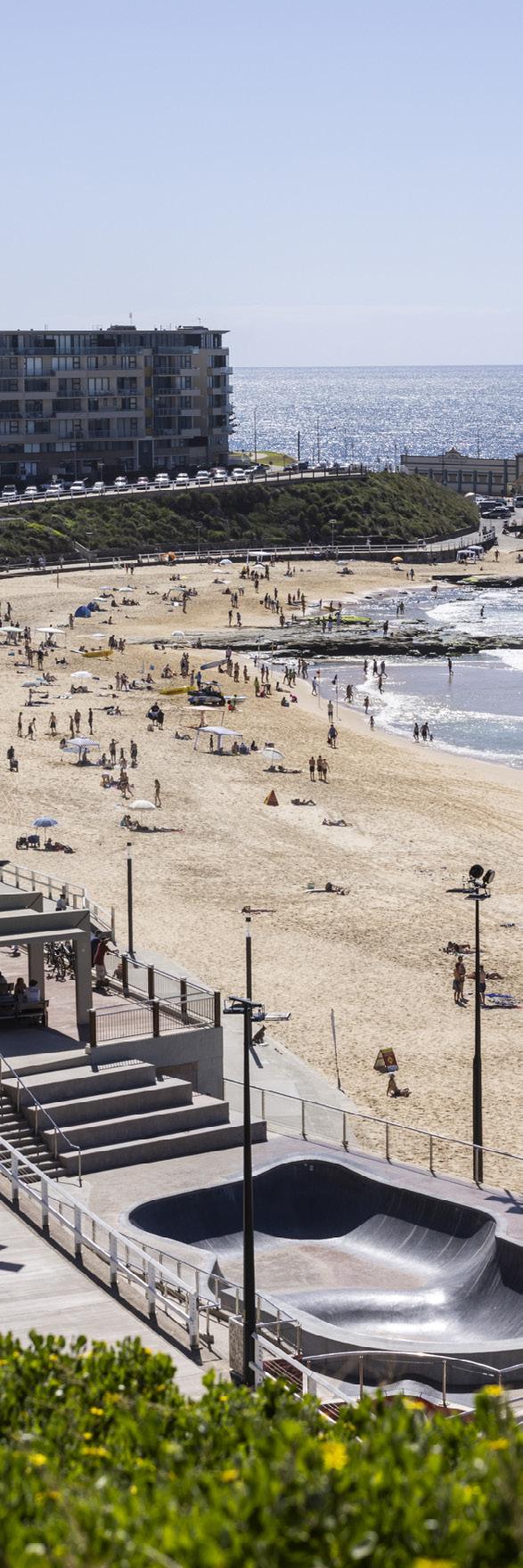
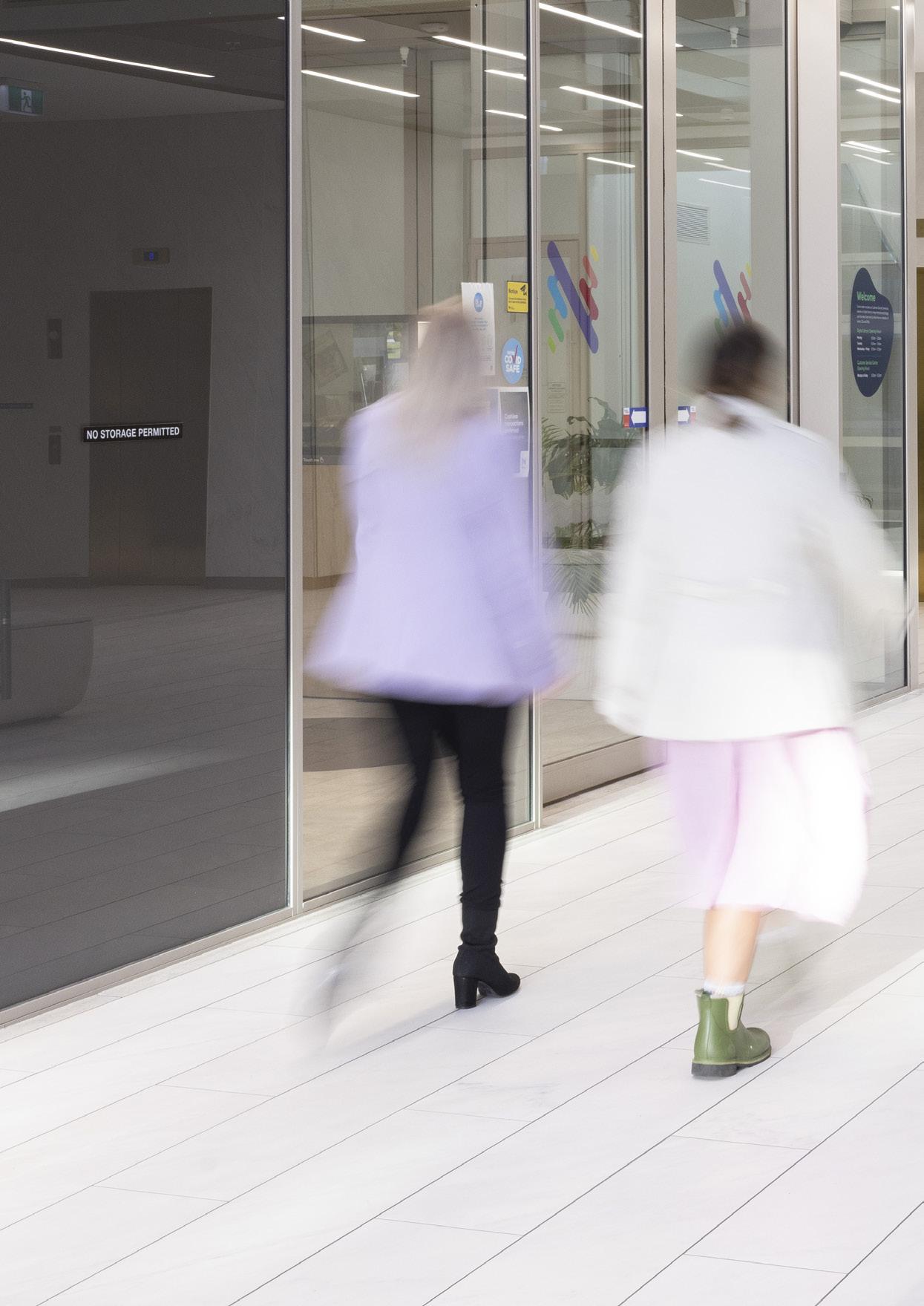
Contents:
Democratic governance
• Council wards
• Role of councillors
• Our councillors
• Council and committee meetings
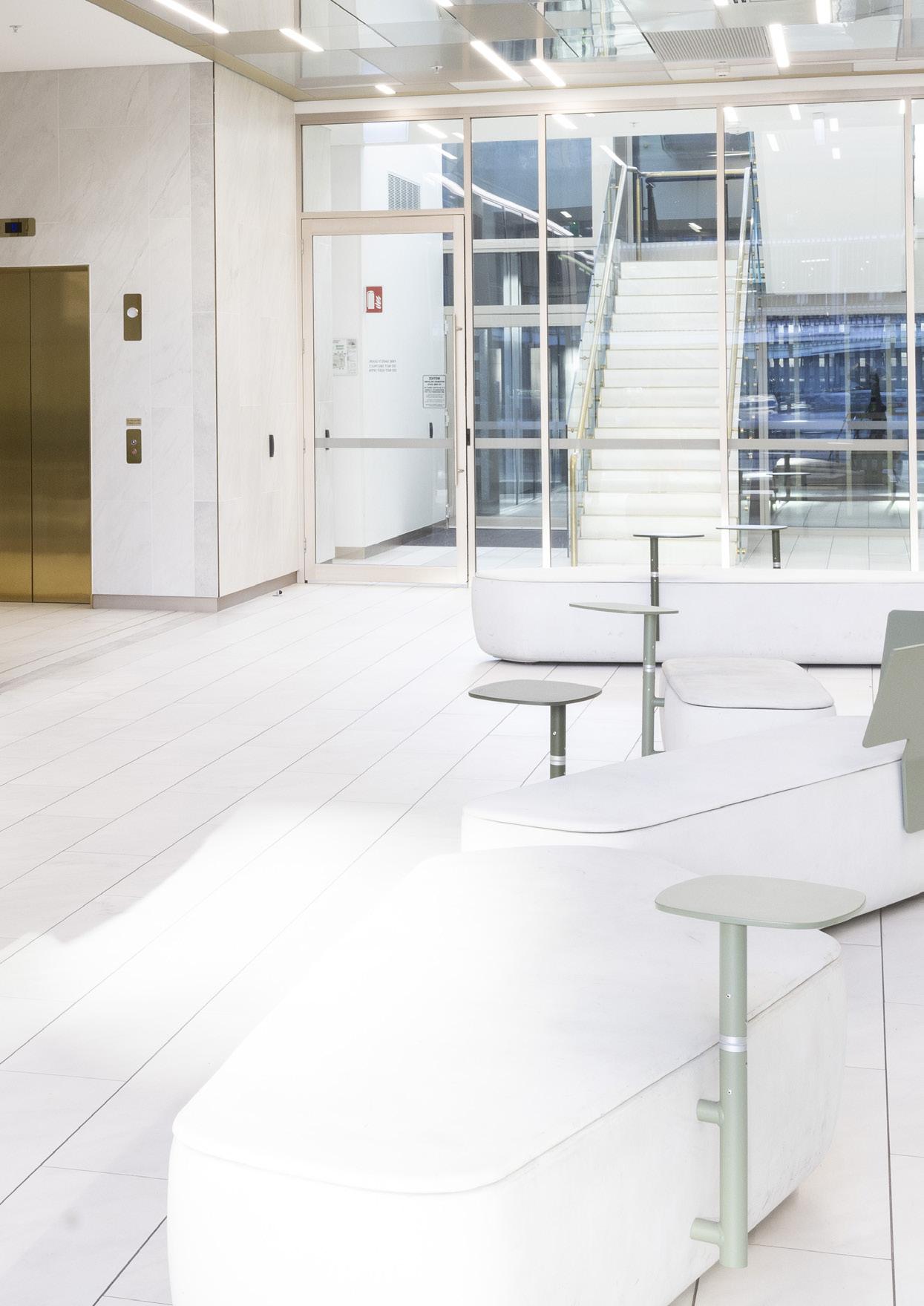
Corporate governance
• Our corporate governance framework
• Codes of Conduct
Corruption prevention framework
• Reports of wrongdoing
• Legislative compliance Policy framework
• Strategic Advisory committees
• Risk management
• Internal audit
• Accountability and leadership
• Legislative context and operating environment
Statutory information
• Councillor fees and expenses
• Overseas visits
• Councillor professional development
• Legal proceedings
• Information management
The Newcastle LGA is divided into four wards, with each ward represented by three councillors who are elected for a four-year term.
Carrington
Cooks Hill (part)
Islington
Maryville
Mayfield
Mayfield East
Mayfield West
Newcastle
Newcastle East
Newcastle West (part)
Stockton
The Hill
Tighes Hill
Warabrook
Wickham
Adamstown
Adamstown Heights
Bar Beach
Broadmeadow
Cooks Hill (part)
Hamilton
Hamilton East
Hamilton South
Kotara (part)
Merewether
Merewether Heights
Newcastle West (part)
The Junction
Birmingham Gardens
Callaghan
Georgetown
Jesmond
Hamilton North Kotara (part)
Lambton
New Lambton
New Lambton Heights
North Lambton
Rankin Park
Wallsend (part)
Waratah
Waratah West
Beresfield
Black Hill
Elermore Vale
Fletcher
Hexham
Lenaghan
Maryland
Minmi
Sandgate
Shortland
Tarro
Wallsend (part)

A popularly elected Lord Mayor and 12 councillors make up the elected Council. The people who live or own property in CN’s LGA are eligible to vote for candidates to represent them on Council.
Council elections are held every four years in NSW. In October 2024, a new term of Council commenced.
CN’s councillors are responsible for electing the Deputy Lord Mayor from among the councillors. At the Inaugural Council Meeting held on 8 October 2024, Council elected the following as Deputy Lord Mayors during the 2024–2028 term of Council:
Callum Pull (8 October 2024 to 7 October 2025)
• Charlotte McCabe (8 October 2025 to 7 October 2026)
• Declan Clausen (8 October 2026 to 7 October 2027)
• Deahnna Richardson (8 October 2027 to the expiry of the current Council term)
Under the Local Government Act 1993, councillors have a responsibility to:
• Be an active and contributing member of the governing body
Make considered and well-informed decisions as a member of the governing body
• Participate in the development of the IPR framework
• Represent the collective interests of residents, ratepayers and the local community
• Facilitate communication between the local community and the governing body
• Uphold and represent accurately the policies and decisions of the governing body
• Make all reasonable efforts to acquire and maintain the skills necessary to perform the role of a councillor.
A councillor represents residents and ratepayers, provides leadership and guidance to the community, and facilitates communication between the community and CN.
Cr Ross Kerridge
Lord Mayor (Independent)
First elected in 2024.
Dr Ross Kerridge became the 15th Lord Mayor of Newcastle in October 2024.
Ross was born in Newcastle. Both his parents were active citizens who strongly believed that everyone had an obligation to improve our community. Ross shares these values.
He attended Newcastle Boys High School and after graduating worked at the BHP steelworks as a labourer, as did many of his schoolmates. Ross went on to study medicine at University of Sydney and after initially working in General Practice and Indigenous Health in Central Australia, he specialised as an anaesthetist, training in Sydney, London and Canada.
Prior to becoming Lord Mayor, Ross worked for many years as a Senior Specialist Anaesthetist at the John Hunter Hospital. He teaches medical students as an Associate Professor at UON and is involved with HMRI. During his medical career, Ross was involved in a number of changes to improve safety, efficiency and quality of care in hospitals and healthcare. He was a recognised leader and strong advocate for the development of Perioperative Medicine across the globe.
Membership on CN Committees:
• CEO Performance Review Panel – Member
Declan Clausen was first elected to Council in a 2015 by-election and is now serving his fourth term as part of the Newcastle Labor team. From 2017 to 2024, he continuously held the position of Deputy Lord Mayor, playing a pivotal role in advancing key initiatives for the city.
An energetic and dedicated Novocastrian, Declan is driven by a passion for sustainability, equality and urban development. His academic achievements include a Master of Sustainable Urban Development with Merit from the University of Oxford, a Bachelor of Engineering (Environmental) with First-Class Honours from UON, and a Graduate Certificate in Professional Accounting from the University of Wollongong. He is also a Graduate of the Australian Institute of Company Directors and the Australian Institute of Superannuation Trustees, and has completed the Bloomberg Harvard City Leadership Program at Harvard University.
In addition to his Council responsibilities, Declan serves as Group Manager of Strategy & External Affairs at Hunter Water Corporation and as a Non-Executive Director at Active Super. His expertise and leadership continue to shape Newcastle’s future while contributing to regional and national sustainability efforts.
Membership on CN Committees:
• Future Fund Governance Committee – Member
Asset Advisory Committee – Chairperson
• Strategy and Innovation Advisory Committee –Chairperson
CEO Performance Review Panel – Member
Membership on External Committees:
• Newcastle Art Gallery Foundation Board –Member
Charlotte McCabe is in her second term as an elected councillor. Her working career has been in primary school teaching and as a community organiser. She has worked closely with community groups and local campaigns, covering a range of social and environmental issues.
Charlotte is committed to positioning Newcastle and the Hunter as a global leader in the clean, sustainable industries of the future, and to delivering outcomes that address inequality.
Membership on CN Committees:
Infrastructure Strategic Advisory Committee –Member
• CEO Performance Review Panel – Member
• Guraki Aboriginal Standing Committee – Deputy Chair
Membership on External Committees:
• Newcastle Bush Fire Management Committee –Member
• Hunter and Central Coast Regional Planning Panel – Member
Peter Gittins was born, raised and educated in Newcastle before embarking on a career in international education that saw him leading schools in Vietnam, Sri Lanka and Germany. Peter has also consulted widely on governance, strategy and change management, working with boards in both the public and private sectors.
A proud Novocastrian and independent councillor, Peter is committed to ensuring the best possible outcomes for the constituents of Ward One and to providing genuine representation and opportunities for community engagement in the interests of all who live in this wonderful city.
Membership on CN Committees:
• Asset Advisory Committee – Member
• Liveable Cities Strategic Advisory Committee –Member
Paige Johnson is a sixth-generation and lifelong Novocastrian, elected to Council in 2024 as a member of the Australian Labor Party. She is deeply committed to ensuring Newcastle is a smart, progressive, sustainable and inclusive city.
Paige holds a Bachelor of Engineering (Civil) (Honours) from UON. While studying, she served as a non-executive on the UON Council and was recognised as Newcastle’s Young Citizen of the Year for her contributions to the city and community.
In addition to her role as a councillor, Paige works in local government as a Senior Civil Engineer, responsible for managing billions of dollars in public infrastructure. Her leadership extends to the wider community, where she has an active role in the union movement and in social justice, civic advocacy and governance roles.
Membership on CN Committees:
Youth Council Standing Committee – Member
• Infrastructure Strategic Advisory Committee –Member
Membership on External Committees:
• Newcastle City Traffic Committee – Member
Cr Jenny Barrie was re-elected as a Ward 2 councillor in 2024, after serving as a Liberal Ward 2 councillor since 2021.
Jenny is a very proud mother of two adult children and grandmother to four grandchildren.
Jenny is proud of her achievements in the last term of Council in Ward 2, including her advocacy for surf life saving, beach safety, community safety, installation of infrastructure (including a sprinkler at Dixon Park Beach and a colourful garbage bin at Merewether Beach car park bus stop), pavement works, pot hole repairs, and traffic and parking issues, together with working to improve Awaba Park at Hamilton Railway Station for community safety, and the revitalisation of the business precinct.
Jenny enjoys leadership roles as Chair, Community and Cultural Committee and Deputy Chair, Strategy and Innovation, as part of the team of Councillors working collaboratively across all aspects of the operations of CN with the ELT and all staff..
Membership on CN Committees:
• Community and Culture Strategic Advisory Committee – Chairperson
• Strategy and Innovation Strategic Advisory Committee – Deputy Chairperson
Membership on External Committees:
Hunter and Central Coast Regional Planning Panel Alternate Delegates – member
Cr Joel Pringle is a community worker, social policy advocate and political campaigner focused on the local community and social and environmental justice. He is a long-term member of the Australian Greens.
Having originally studied as a music teacher, he also holds a Postgraduate Certificate in European Policy Making from the Brussels School of Governance and has extensive experience in not-for-profit and community governance.
Membership on CN Committees:
• Audit, Risk and Improvement Committee –Member
• Public Art Standing Committee – Deputy Chairperson
• Liveable Cities Strategic Advisory Committee –Chairperson
Cr Mark Brooker (Independent)
Mark Brooker was first elected to Council in September 2024. He is proud to have stood independently and been elected without party affiliation.
Mark has lived and worked in Newcastle and the Hunter for more than 30 years, and in Ward 3 in particular since 2007. As the publisher of a monthly community newspaper, The Local, which serves a number of the suburbs making up Ward 3, Mark has been a committed and passionate advocate for his community.
Prior to commencing his own publication in 2014, Mark enjoyed a career spanning more than 20 years in media sales and general management with some of Australia’s largest regional newspaper publishers.
Membership on CN Committees:
• Access Inclusion Standing Committee – Member
• Guraki Aboriginal Standing Committee – Member
• Strategy and Innovation Strategic Advisory Committee – Member
Membership on External Committees:
• Hunter and Central Coast Regional Planning Panel Alternate Delegates – Member
Peta is a proud Novocastrian living, working and raising her four children locally, alongside her partner Alister.
She is an educator with over 25 years’ experience in the family/youth sector. Peta sits on the Board of Hunter Homeless Connect and Hunter Rugby, and is passionate about all things Newcastle. She works closely with many local organisations and advocates for all, and is particularity interested in the provision of facilities and services for local community groups.
Peta is particularly driven to engage young people and make sure they are heard while ensuring that we have a thriving, activated and amazing place to live!
Membership on CN Committees:
• Infrastructure Strategic Advisory Committee –Chairperson
• Public Art Standing Committee – Member
• Guraki Aboriginal Standing Committee – Member
Membership on External Committees:
• Hunter and Central Coast Regional Planning Panel Alternate Delegates – Member
• Fort Scratchley Historical Society Incorporated –Member
• Hunter Sports Centre Incorporated – Member
Sinéad was a postgraduate in leisure and tourism studies and a lover of performing and creative arts. Sinéad worked as a union organiser for the National Tertiary Education Union, and was a branch secretary for the United Services Union and a member of the Hunter Workers Women’s Committee.
Sinéad campaigned for the environment, workers, women, refugees, First Nations rights, housing, live performance, youth, community and justice. She spearheaded a number of high-profile campaigns, including the campaign to save Tower Cinemas. Sinéad was a published freelance writer and an accredited mediator. She served as Membership Officer for the NSW Greens for two terms and more broadly served on the NSW Greens Committee of Management for four terms.
Membership on CN Committees:
• Youth Council Standing Committee – Deputy Chairperson
• Access Inclusion Standing Committee – Deputy Chairperson
Community and Culture Strategic Advisory Committee – Member
Membership on External Committees:
• Hunter and Central Coast Regional Planning Panel Alternate Delegates – Member
Tragically, Sinéad passed away in June 2025, after serving just eight months as a councillor. A scholarship is being established in her memory by CN, in conjunction with the Women’s Environmental Leadership Australia organisation. This scholarship will be open to women and gender-diverse changemakers who are undertaking paid and unpaid work to improve the environment and combat climate change.
Cr Dr Elizabeth Adamczyk (Labor)
Liz lives in Wallsend and was elected to represent the people of Ward 4 at the end of 2021. In her time as councillor, she is proud to have delivered more accessible and inclusive public infrastructure at our pools, parks and playgrounds, as well as transport upgrades in the western corridor; championed environmental conservation and rehabilitation; introduced more sustainable living; and celebrated community belonging and inclusion.
Liz works as a human geographer with expertise in social, economic and environmental justice, and holds a Bachelor of Science (Architecture), Bachelor of Development Studies (Hons 1 and the University Medal) and a PhD (Human Geography). Liz is a union leader, and has worked in the non-profit sector in homelessness and disadvantage, and in local government in environmental sustainability. She is passionate about nurturing Newcastle’s diverse and unique creative talents.
Liz feels privileged to be able to continue to work with the community to deliver on their wants and concerns, from finding solutions to everyday improvements to higher-level concerns in the continued development of Newcastle as an inclusive, caring and healthy city.
Membership on CN Committees:
Access Inclusion Standing CommitteeChairperson
• Liveable Cities Strategic Advisory CommitteeDeputy Chairperson
• Public Art Standing Committee - Chairperson
Membership on External Committees:
Hunter and Central Coast Regional Planning Panel - Member
• Newcastle Bush Fire Management CommitteeAlternate Member and Chairperson
• Newcastle Airport Partnership Trust - Director
Other
• headspace Newcastle Advisory CommitteeMember
• NSW Government Food Regulation Forum Board, Shelter NSW - Member
• ICLEI Oceania RexCom - Chairperson
• Hunter Workers (Newcastle Trades Hall Council)Executive
• Branch Committee, NTEU
Macquarie University Planning Advisory Committee - Member
Callum has served as the Liberal councillor for Ward 4 since he was first elected in 2021. He currently serves as the Deputy Lord Mayor of Newcastle.
At 20 years old, he became the youngest councillor ever elected in Newcastle’s history, and at 23, he also became its youngest ever Deputy.
Callum is passionate about Newcastle, and has a strong focus on economic development, housing supply, and building the roads and infrastructure needed to support our growing city.
Callum is also a Director of Newcastle Airport Pty Ltd and Greater Newcastle Aerotropolis Pty Ltd.
Membership on CN Committees:
• Youth Council Standing Committee – Member
Future Fund Governance Committee – Member
• Asset Advisory Committee – Member
• Audit, Risk and Improvement Committee –Member
• CEO Performance Review Panel – Member
Membership on External Committees:
• Hunter and Central Coast Regional Planning Panel Alternate Delegates – Member
• Newcastle City Traffic Committee – Member
• Hunter Water Customer and Community Advisory Group – Member
Deahnna Richardson is a proud Wiradjuri woman who was born on Wiradjuri Country and has lived on Awabakal and Worimi Country since 2005. In 2021, she became the first Aboriginal woman ever elected to CN. Deahnna is passionate about ensuring that First Nations voices are heard and included in our community. She believes in fairness, justice and equality, and is committed to ensuring that the communities in Ward 4 are vibrant, thriving and inclusive, with amenities and infrastructure that meets their needs.
Having grown up in Peak Hill, a rural town in the Central West, Deahnna has a keen focus on ensuring that communities in the western suburbs of Newcastle have equitable access to essential council services.
Deahnna holds a Bachelor of Laws, a Bachelor of Commerce with a major in Economics, and a Diploma of Legal Practice from UON. She was admitted as a solicitor by the Supreme Court of NSW in 2017 and is currently employed as a federal public servant. She has previously served as a Public Service Association delegate to Hunter Workers, and is a member of the Hunter Workers Women’s Committee. She lives in Wallsend with her partner Beau and their three children.
Membership on CN Committees:
Community and Culture Strategic Advisory Committee – Deputy Chairperson
• Guraki Aboriginal Standing Committee –Chairperson
• CEO Performance Review Panel – Member
Membership on External Committees:
• Hunter and Central Coast Regional Planning Panel Alternate Delegates – Member
• NSW Public Libraries Association – Member
• Hunter Water Customer and Community Advisory Group – Member
Councillors no longer holding office
Council also thanks those councillors no longer holding office for their contributions to CN:
John Church (IND): 2017–September 2024
• Carol Duncan (ALP): 2017–September 2024
• John Mackenzie (GRN): 2017–September 2024
• Emeritus Lord Mayor Nuatali Nelmes (ALP): 2008–February 2025
• Margaret Wood (ALP): 2021–September 2024
The elected Council conducts its business at open and publicly advertised meetings (details available on CN’s website), generally held on the third and fourth Tuesdays of the month. Meetings are live-streamed and accessible via the CN website. Business papers and minutes are also available on the website.
Council meetings are conducted in accordance with an adopted Code of Meeting Practice (the Code). The Code applies to Council Meetings, Extraordinary Council Meetings and Committee of Council Meetings. The object of the Code is to provide for the convening and conduct of meetings.
The Code covers:
Reminding councillors of their oath or affirmation of office, and of their obligations under the Act and CN’s Codes of Conduct to disclose and appropriately manage conflicts of interest
• Adopting and publicly advertising the dates and times of Council meetings
• Provision of notice of Council meetings and means by which councillors can add items to the Council meeting agenda
• The timeframes and form for the issuing of agendas and business papers by the CEO to councillors and the public
Approval of minutes at the next Council meeting and the signing of minutes by the Lord Mayor
• Quorum at meetings and voting on items of business, including the requirement to vote by division and record the voting by individual councillors on planning matters
• The attendance of the public at meetings, except where meetings must be closed to the public in accordance with the Act.
Public Briefing sessions provide an opportunity for members of the public to make short presentations relating to significant issues of a general, strategic or policy nature, including in relation to planning proposals relevant to CN’s functions, facilities or services.
In addition, when members of the public have raised issues or concerns in respect of a Development Application (DA) that is to be determined by the elected Council at a Development Application Committee, they, and the applicant for the DA, may be provided with an invitation to personally address the elected Council at a Public Voice session. Having such a dedicated meeting means councillors have time to engage with and ask questions to ensure they understand the matters prior to voting on them; these sessions are conducted in accordance with CN’s Public Voice and Public Briefings Policy.
Note: The Council does not make decisions at a Public Voice or Public Briefing session. These sessions are an opportunity for discussion only.
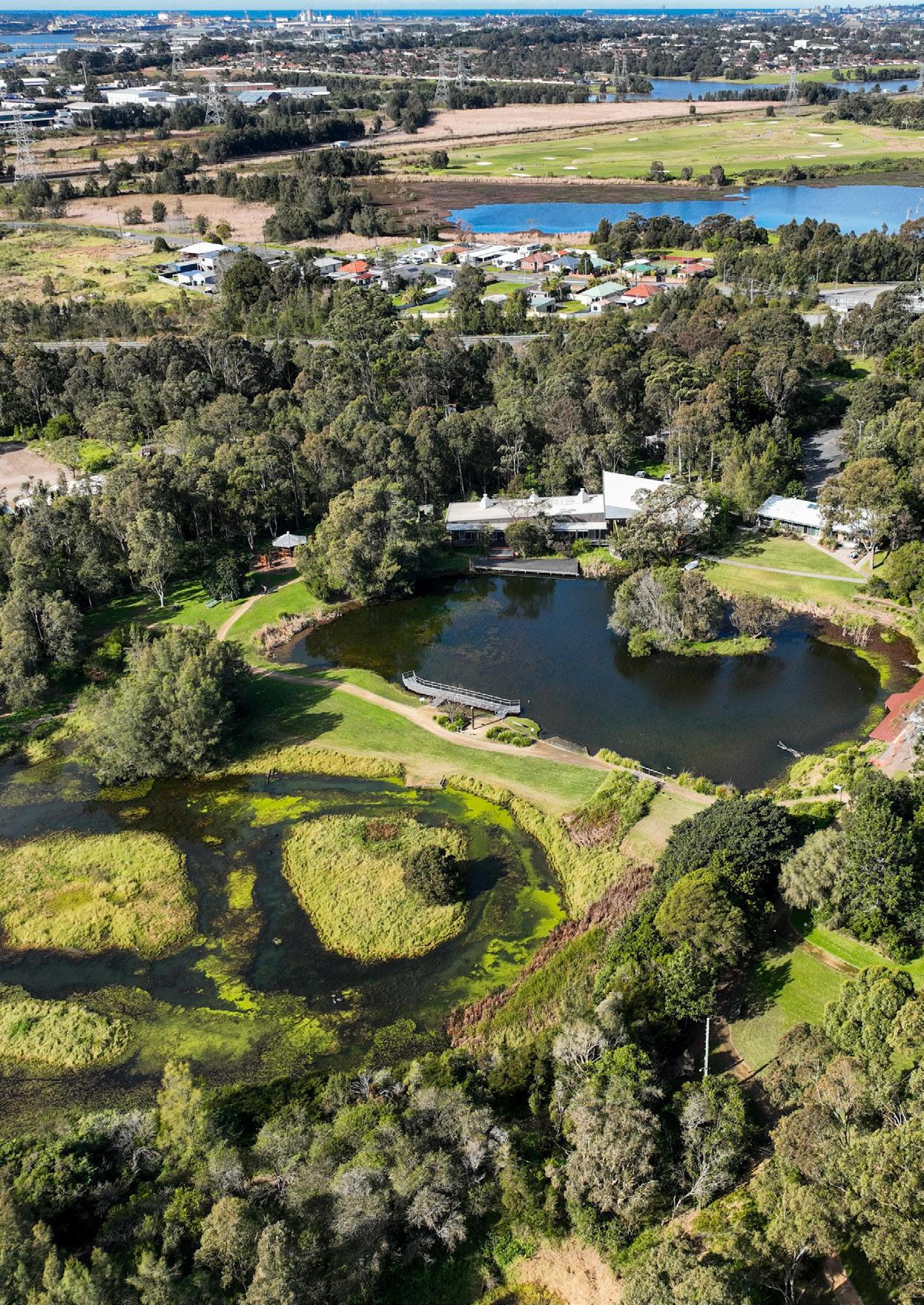
July–September 2024 The following provides a summary of attendance for each councillor for Council meetings prior to the election held in September 2024.
October 2024–June 2025 The following provides a summary of attendance for each councillor for Council meetings held from the commencement of this Council term (October 2024).
Cr Winney-Baartz (elected via countback election in February 2025)
Good corporate governance is one of the cornerstones of any good business and is key to CN meeting its objectives of trust and transparency.
At CN, we are proud of our strong corporate governance framework, which has existed in a formal way for over 12 years. We are focused on continuous improvement and maturing our frameworks to continue to meet legislative requirements as well as community expectations.
CN’s corporate governance framework is based on the ASX Corporate Governance Principles and the Audit Office of New South Wales ‘Governance Lighthouse’ model.
CN has adapted these to suit our functions and to ensure our corporate governance framework is of the highest standard.
Key Stakeholder Rights
17. Key stakeholder management program
Risk Management
16. CEO and management sign-off of internal controls
15. Risk management program
We focus our customer experiences to create a smart, liveable and sustainable global city that is customer-centric.
We regularly review and update opportunities for significant and meaningful citizen engagement based on equity, inclusion and connection. We recognise that this is an important part of local democracy, fostering community cohesion, pride of place and participation in civic life.
We continue to promote open and transparent governance and our key functions, policies and practices are published on CN’s website.
See more information about our proactive release program on page 258, committees on page 213, Public Voice sessions on page 204 and community engagement on pages 258 and 70.
Our enterprise risk management framework is integral to CN providing assurance that we are operating effectively and efficiently. Our senior leaders provide oversight and guidance in mitigating our strategic risks and in managing our operational risks and control measures at the first line. Our internal Governance and Risk (Executive) Committee provides second-line assurance and reports to an Independent Audit and Risk Committee.
Our Enterprise Risk Management Policy sets out our commitment to creating a positive organisational culture that promotes risk management acceptance, communication and management of appropriate risk throughout the organisation. Our approach to risk is integrated into the organisation’s core business and embedded within planning and decision-making processes.
See more information about CN’s enterprise risk management on page 214.
Remuneration
14. Remuneration is fair and responsible
Our organisational structure and roles and responsibilities are linked to delivering CN’s strategic objectives.
We ensure that our remuneration for the CEO and senior officers is fair and reasonable, and we disclose total remuneration in our annual report. The remuneration structure meets all legislative requirements and follows best practice in local government.
In February 2025, the elected Council endorsed our CEO’s performance through a process overseen by a CEO Performance Review Panel, independent assessment and annual performance reviews, with the outcomes publicly reported in open council.
See more information about senior staff remuneration on page 173.
Disclosure
13. Continuous disclosure
12. Annual report
Corporate Reporting
11. CEO and CFO sign-off of financial reports
10. Internal and external audit
9. Audit and Risk Committee
We embrace the opportunity to engage with our community to ensure our planning and reporting is informed, relevant and responsive to community needs. Our strong IP&R program not only meets legislative requirements but provides snapshot and ongoing reports on the progress of principal activities detailed in our Delivery Program. These activities contribute, in the long term, to our CSP.
Our traffic light system promotes transparent disclosure of positive and negative information to demonstrate significant changes to the organisation. Key reporting is published on our website and includes:
Council meetings, including Executive Monthly Performance Reports
• Quarterly performance reports and financial review
• Annual Reports
• General Purpose Financial Statements
• State of Our City reports.
CN’s robust financial governance framework includes financial management policies and budget guidelines to support appropriate financial planning and management. This ensures delivery of organisational and community services and long-term financial sustainability.
Our monthly reporting to the elected Council and the community includes income, operating and capital statements, debtors’ reports, works programs, councillor expenses and investment compliance.
Our financial records are overseen by our independent Audit, Risk and Improvement Committee and include public presentation of the General Purpose Financial Statements detailing audited financial positions that the elected Council receive and adopt, complying with appropriate accounting standards.
We have no findings identified in the audit by the Audit Office of NSW.
Our internal audit function recognises CN’s commitment to continuous improvement, and we are sector leaders in assurance mapping.
CN’s independent Audit, Risk and Improvement Committee facilitates and responds constructively to reviews, findings and recommendations, and has overseen improvements to corrective actions holding the organisation to account for performance and conformance.
See more information about our financial reporting on page 232, more information about internal audit on page 165, and our Audit and Risk Committee on page 164.
8. Compliance framework
7. Fraud and corruption control framework
6. Ethical framework
Structure
5. Key governance committees
Management and Oversight
4. Diversity policy
3. Clear accountability and delegations
2. Regular reporting against plans
1. Leadership and strategic and business plans
Legislative compliance is a critical component of CN’s corporate governance framework. This provides assurance that CN is meeting its obligations and managing legislative compliance risks effectively.
We are leaders in our Corruption Prevention Framework, expanding on the Audit Office Fraud Control Improvement Kit and the Australian Standards to ensure a comprehensive system that guides all corruption prevention management activities. This incorporates our Fraud and Corruption Prevention Policy, Fraud and Corruption Control Plan and reporting on fraud or corruption, including our Public Interest Disclosures Policy.
In addition, our Ethical Behaviour Framework ensures public confidence in the integrity of CN through our Codes of Conduct, Disclosures of Interests of Designated Persons, management of conflicts of interests, and gifts and benefits disclosures.
See more information about our corporate governance framework on page 208.
CN’s Strategic Advisory Committees and Standing Committees align with CN’s strategic objectives and provide broad opportunities for community and stakeholder engagement, enabling greater diversity of input into matters on which the elected Council will be making decisions.
See more information about our Strategic Advisory Committees on page 213.
Our community is enriched by diverse experiences and perspectives. Through our Inclusion, Diversity and Equity Strategy (2023–2027) and Disability Inclusion Action Plan (2022–2026), CN is taking meaningful steps to strengthen our culture and improve access and inclusion for the benefit of everyone in our community.
We regularly report against our achievements and other plans as part of our continuous disclosure and updates on progress against our Delivery Program.
Our Newcastle 2040 CSP, four-year Delivery Program, annual Operational Plan, and supporting strategies and plans are developed with community input and accessible on our website.
Delivering Newcastle 2040 2024/2025 guides our leadership and decision-making.
Our Ethical Behaviour Framework, including the appropriate authorisation to perform a function or exercise decision-making powers, supports our evidence-based decision-making, safeguarding our processes and behaviours to ensure we deliver, act in an ethical way, and meet community expectations of probity, accountability and transparency.
See more information about Delivering Newcastle 2040 2024/2025 on page 16.
CN’s Codes of Conduct are based on the OLG’s Model Code of Conduct and include:
• Code of Conduct for Councillors
• Code of Conduct for Staff
• Code of Conduct for Council Committee Members, Delegates of Council and Council Advisors
• Procedure for the Administration of the Code of Conduct.
Some key elements of the Codes include:
• Gifts and benefits: A gift or a benefit is something offered to, or received by, a councillor, employee or volunteer for their personal use. Councillors may accept token gifts up the value of $100 and staff up to the value of $50 and within reason. All offers of gifts and benefits are declared and captured in CN’s Gifts and Benefits Register.
• Conflicts of interest: A conflict of interest exists where a reasonable and informed person could perceive that a councillor or staff member may be influenced by a private interest when carrying out their public duty. Conflicts of interest are categorised as:
- Pecuniary conflicts of interest, which arise where a CN staff member is reasonably likely to make or lose money because of a decision the staff member might make in the course of their duties
- Non-pecuniary conflicts of interest, which commonly arise out of family or personal relationships or through an association a CN staff member, or someone close to them, may have, through involvement in a sporting, social or other kind of group or association.
All conflict of interest declarations are captured in CN’s Conflicts of Interest Register. Councillors’ conflicts of interest are published on CN’s website
• Disclosure of interest returns: Councillors, Audit and Risk Committee members, and staff identified as designated persons complete a disclosure of interest within three months of employment or a change to an interest, as well as annually. The CEO tables CN’s disclosure of interest register at Council meetings on a quarterly basis and annually. Councillors, Audit and Risk Committee, and ELT disclosures of interest returns are published on CN’s website
CN reports annually to the OLG on complaints received and managed under the Code of Conduct for councillors.
CN’s Fraud and Corruption Prevention Framework outlines CN’s commitment to preventing fraud and corruption. Fraud and corruption are interrelated and represent the misuse of public office for private gain. The prevention of fraud and corruption requires that all councillors, staff, volunteers and contractors act ethically, appropriately and in accordance with the respective Code of Conduct
CN’s Fraud and Corruption Prevention Framework is based on the NSW Fraud Improvement Kit and aligns with the Australian Standards on Fraud and Corruption Control (AS8001-2008). Our framework includes a Fraud and Corruption Prevention Policy, Fraud and Corruption Control Plan, reporting of fraud and corruption, and training and awareness.
In 2025, an audit of CN’s Enterprise Risk Management Framework included a review of fraud risks, controls and effectiveness. Risks identified as outside of appetite are reported to the Governance and Risk (Executive) Committee and the Audit, Risk and Improvement Committee as part of CN’s Enterprise Risk Management Framework.
CN has a Public Interest Disclosures Policy based on the NSW Ombudsman’s model Public Interest Disclosure Policy. The Public Interest
Act 2022 (PID Act) sets out the system under which people working within the NSW public sector can make reports about the wrongdoing of other workers in the NSW public sector (such as all CN officials).
During 2024/2025, the following disclosures were made under the Policy:
Of Public Interest Disclosures received, the number primarily about: Corrupt conduct
The Public Interest Disclosures Policy:
• Incorporates the relevant provisions of the PID Act and model Policy requirements
• Encourages and facilitates the disclosure of wrongdoing by providing a framework for receiving, assessing and dealing with disclosures of wrongdoing in accordance with the PID Act and ensuring CN complies with the PID Act
• Clearly defines the roles and responsibilities of the CEO, Lord Mayor, Disclosures Coordinator, Disclosures Officers and CN Officials
• Identifies Disclosures Officers from diverse work areas and locations across the organisation who support CN staff making a disclosure.
Legislative compliance means understanding the legislation, regulations, industry standards and codes that apply to CN and using a framework to make sure CN is complying with these obligations. CN’s reporting obligations are led by the OLG’s Calendar of Compliance and Reporting Obligations.
CN’s Policy Framework aims to assist the organisation with meeting compliance in accordance with legislative and regulatory requirements, and empowers CN to carry out efficient and effective decision-making.
Our policies are reviewed within 12 months of each Council term for elected Council–adopted policies, and within three years for CEO-adopted policies.
CN’s Strategic Advisory Committees, Standing Committees and Special Purpose Committees are an essential part of CN’s corporate governance. Each committee has clear objectives and alignment to CN’s CSP and operates under established guidelines. Objectives are documented and published in a Terms of Reference document (available on CN’s website, along with minutes and other relevant information about the committees).
The committees are led and chaired by councillors (as listed in their bios on pages 197-203) and include community and stakeholder members with relevant experience and skills. They provide an opportunity for consultation and expert advice prior to a matter being considered by the elected Council.
Throughout 2024/2025, CN’s Strategic Advisory Committees included:
• Community and Culture Strategic Advisory Committee
• Infrastructure Strategic Advisory Committee
• Liveable Cities Strategic Advisory Committee
• Strategy and Innovation Strategic Advisory Committee.
CN has a number of ongoing advisory committees, known as Standing Committees, including:
• Access Inclusion Standing Committee
• Guraki Aboriginal Standing Committee Public Art Standing Committee
• Newcastle Youth Council Standing Committee.
CN’s Strategic Advisory Committees and Standing Committees submit annual reports to the elected Council, which are available on CN’s website
CN Special Purpose Committees include: Asset Advisory Committee
• Future Fund Governance Committee.
At CN, we are committed to strong corporate governance and fostering a positive organisational culture that encourages risk awareness, open communication, and effective management of risk within appetite across the organisation.
Our Enterprise Risk Management (ERM) approach continues to align with the Australian Standard ISO 31000:2018 Risk Management and the OLG Guidelines. Risk is embedded into CN’s core business activities and integrated into strategic planning and decision-making processes. Over the past year, the ERM Framework has been further embedded across CN, strengthening our resilience and decision-making capability.
Our Risk Management Structure follows the Three Lines of Defence Model:
• First Line: Our leaders are responsible for identifying and managing their risks, including implementing and maintaining internal controls.
• Second Line: CN’s Enterprise Risk Team and internal Governance Risk (Executive) Committee (GREC) provide expert support, guidance and oversight on behalf of the CEO and ELT.
• Third Line: Internal audit and the Audit, Risk and Improvement Committee (ARIC) deliver independent assurance that CN’s risk management and governance practices are effective and compliant.
The ERM team reports quarterly to CN’s internal GREC and independent ARIC, ensuring transparency and accountability in the implementation of the ERM Framework.
Activities undertaken in operationalising the ERM framework are represented below. These are interrelated and will evolve as the risk maturity of the organisation continues to progress.
Effective Audit, Risk and Improvement Committees are critical in local government to help deliver trust and confidence in financial reporting and risk management. In the past 12 months, CN’s independent ARIC has focused its efforts on ensuring the right balance of risk, trust and opportunity as we build a strong foundation for governance priorities of the future.
The ARIC provides independent assurance and oversight on:
• CN’s control framework, including the effectiveness of controls
• Risk management, recognising that this is an integral part of CN
• Reviews that assess the effectiveness of CN’s policies, guidelines and controls
• External accountability, including reviewing CN’s financial governance and reporting legislative compliance
• The Forward Internal Audit Plan to ensure it considers the broader risk management plan
• Fraud and corruption – receiving and reviewing CN’s Fraud and Corruption Control Plan.
As of 30 June 2025, members of the committee include:
Stephen Coates (Independent Member and Chair)
• Vivek Chopra (Independent Member)
• Robert Lagaida (Independent Member)
• Cr Callum Pull (Councillor Member)
• Cr Joel Pringle (Councillor Observer).
As per best practice, the CEO is invited to and attends all committee meetings. Other attendees include the Executive Director Corporate Services and CFO, Chief Information Officer, Executive Manager Legal & Governance, Executive Manager Finance, Property & Performance and Deputy CFO, Internal Audit Coordinator, Enterprise Risk Manager, Governance Manager, and the Audit Office of NSW, as well as representatives from both our internal and external audit providers.
Internal audit is a key contributor to ensuring CN undertakes continuous reviews of the effectiveness of its risk management framework, internal controls and governance processes. The reviews are undertaken in collaboration with service units to add value and improve CN’s operations.
During 2024/2025, CN outsourced seven out of eight internal audits and managed the remaining audit in-house. Outsourcing internal audits ensures a high level of independence and autonomy from CN’s management, and enables specialised knowledge and skills to be procured to conduct audits.
The reviews assess the effectiveness of CN’s policies, guidelines and controls. Action items to develop and improve the associated governance, risk management and control processes are established and agreed. The implementation of these agreed audit actions is monitored by CN’s Internal Audit Coordinator and regularly reported to the committee.
Over the past 12 months, internal audit has reviewed and provided assurances and recommended control efficiency improvements across the following diverse functions and operations of CN:
1. RMS DRIVES24 Compliance Review 2024
2. Enterprise Risk Management Audit
3. Integrated Planning & Reporting Audit
4. Coastal Risk Management Audit
5. Civil Construction Management Audit
6. Community Centres and Halls Audit
7. Development Application Audit
8. Payroll and Electronic Timesheet Control Audit
The CN Consultative Committee plays a vital role in fostering constructive and respectful relationships between employees, management and unions. Meeting on the third Thursday of each month, the committee provides a structured forum for open dialogue on significant workplace matters.
While the committee does not hold decision-making authority, it serves as an advisory body. Its primary purpose is to ensure that consultation is both effective and genuine, occurring early enough in the process to meaningfully shape outcomes. This approach allows management to make informed decisions that reflect a broad range of perspectives.
The committee’s responsibilities include:
Fostering collaboration between employees, management and unions
• Openly discussing significant workplace issues to ensure transparency and shared understanding
• Reviewing operational performance and effectiveness, identifying areas for improvement
• Providing recommendations, feedback and observations for management to consider
• Striving for consensus on key matters wherever possible.
Through these functions, the Consultative Committee supports a culture of inclusion, trust and shared responsibility. It ensures that employee voices are heard and considered in shaping the workplace, reinforcing CN’s commitment to collaborative and informed decision-making.
The administration of CN is organised into four Directorates, plus a Waste Services Business unit, each with a range of responsibilities.
The CEO leads the administrative arm of CN. Reporting to the elected Council, the CEO is responsible for the efficient and effective operation of CN, and for overseeing CN’s staff to enact the decisions of the elected Council.
The Elected Council and The Administration
Council’s structure requires the elected members and the administrative body to have a strong and interconnected working relationship to successfully deliver the vision of the community. CN is proud of its achievements in 2024/2025, and at the heart of this is the effective working relationship led by CN’s Lord Mayor, Deputy Lord Mayor and CEO.
Council’s governing body - elected councillors
Providing policy framework
Setting strategy
Monitoring performance
Allocating resources
Reporting to council on activities and outcomes
Implementation of council’s decisions
CEO - council staff
Implementing strategy and policy
Ensuring compliance
Advising council on strategies
Council’s administrative body
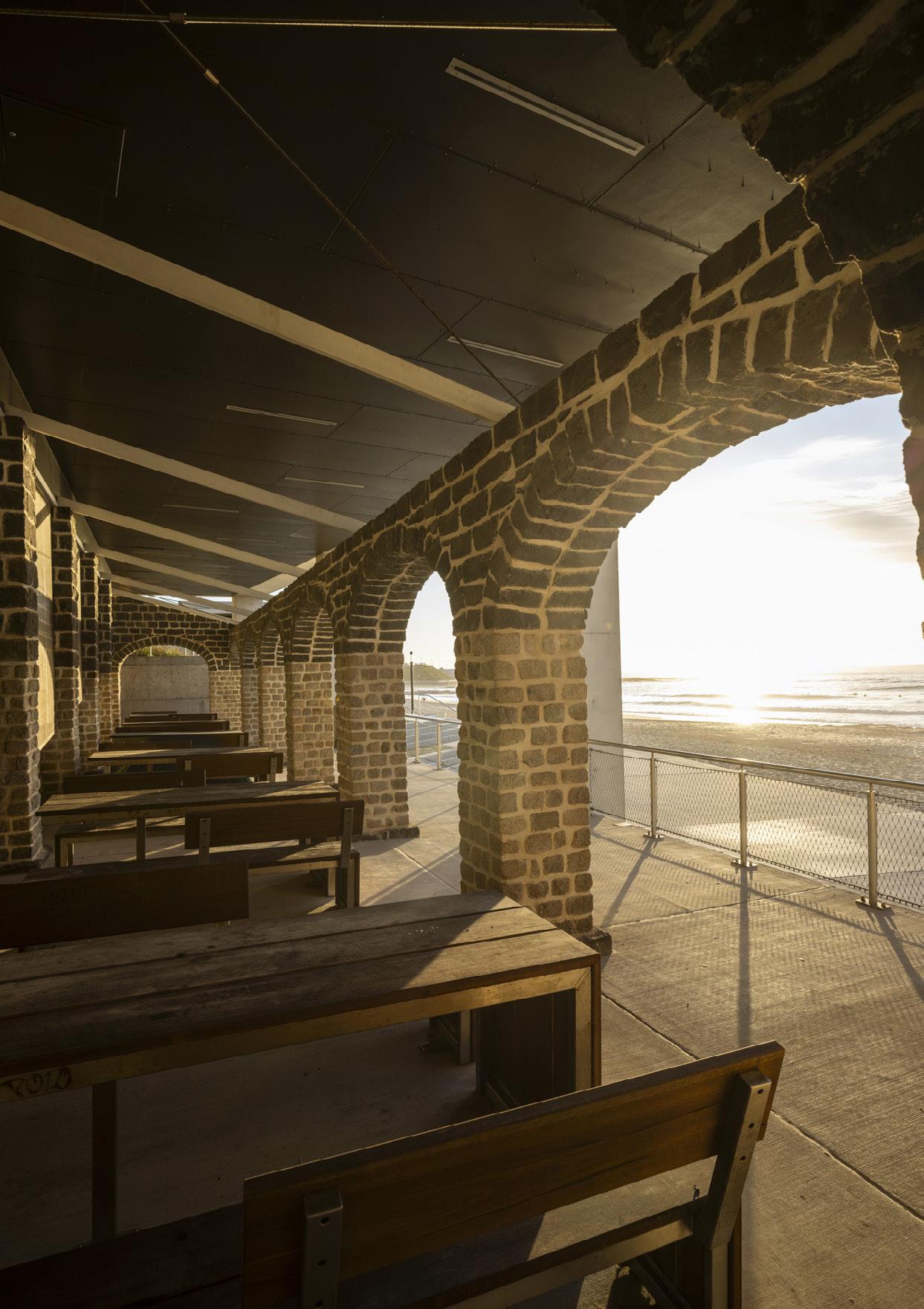
Local councils work within the laws established by the NSW Parliament. The NSW Local Government Act 1993 (LG Act) provides a legislative framework that gives councils broad powers to plan for and provide local community services and facilities. Local councils are expected to provide effective representation, leadership, planning and decision-making, including by managing their land and assets to best meet the current and future needs of the community. The LG Act is administered by the Minister for Local Government through the OLG.
In addition, local councils are entrusted to undertake functions and exercise powers under a range of laws, regulations and policies. Examples include:
• Regulatory powers regarding the health and safety of land and premises under the LG Act
Building and development controls under the Environmental Planning and Assessment Act 1979
• Environmental protection under the Protection of the Environment Operations Act 1997
• Support for emergency management under the State Emergency and Rescue Management Act 1989
• Animal control under both the Companion Animals Act 1998 and the Impounding Act 1993
• Provision, maintenance and management of roads under the Roads Act 1993
• Protection of public health under the Public Health Act 2010.
Local councils are required to carry out their functions and exercise their powers in accordance with the LG Act and associated regulations. They are also subject to a Model Code of Conduct, which sets out standards of proper and ethical behaviour for councillors and staff of local councils and requires each council to adopt a code of conduct that incorporates the provisions of the Model Code.
Regulation cl217(1)(a1)
Councils are required to provide facilities to assist councillors to carry out their duties. CN has adopted a Councillor Expenses and Facilities Policy that outlines the circumstances where CN will reimburse or pay for a councillor’s expenses to support their civic duties.
The following councillor expenses are the combined total for the Lord Mayor and 12 councillors.
The reporting of these expenses is in line with the Local Government (General) Regulation 2021.
FINANCIAL YEAR 2024/2025
JULY –SEPTEMBER 2024 (INCLUDES PROVISIONS PRIOR TO THE ELECTION HELD IN SEPTEMBER 2024)
OCTOBER 2024 – JUNE 2025 (INCLUDES PROVISIONS POSTELECTION HELD ON 14 SEPTEMBER 2024 AND A CHANGE TO COUNCILLOR REPRESENTATION)
* Includes costs not included in the audited financial statements, as these were provided in-house.
Regulation cl 217(1)(a)
No overseas travel was undertaken by councillors during this period.
Regulation cl 186
Under section 232 of the LG Act, councillors have a responsibility ‘to make all reasonable efforts to acquire and maintain the skills necessary to perform the role of a councillor’.
CN supports the training, education and ongoing professional development of the Lord Mayor and councillors to ensure they develop and maintain the knowledge and skills required to undertake their roles and responsibilities effectively. Each councillor has the opportunity via a survey conducted each Council term to indicate their individual requirements for professional development.
In 2024/2025, councillors participated in professional development through:
• A Councillor Induction Program was held in October 2024 to equip councillors with the information they need at the commencement of the term to perform their role effectively
Four workshop evenings, held from July 2024 to September 2024 (former Council term), covering a variety of topics including but not limited to development and environment planning, financial sustainability and strategy updates
• 18 workshop evenings, held from October 2024 to 30 June 2025 (current Council term), covering a variety of topics including but not limited to financial sustainability, planning and environment matters, strategic planning and updates on various projects
• Enrolment in professional development courses.
The below table lists the number of monthly councillor workshops and additional professional development courses attended by councillors from July 2024 to September 2024 (former term of Council):
The below table lists the number of monthly councillor workshops and additional professional development courses attended by councillors from October 2024 to June 2025 (current term of Council):
(Regulation CL 217:1:a3)
Expenses incurred
General legal matters
During 2024/2025, the total amount incurred by CN in relation to legal proceedings was $404,913.20. The amount of legal costs recovered by CN was $61,214.43.
Debt recovery
Legal costs expended undertaking litigation to recover overdue rates and charges were $254,579.09. The amount of legal costs recovered by CN within 2024/2025 was $204,905.09. The balance of legal costs not recovered to date will be recovered in a subsequent year based on agreed payment arrangements.
Workers compensation
Legal costs expended undertaking litigation to recover workers compensation payments were $94,490.70 (excluding GST).
All legal proceedings to recover both overdue sundry debts and rates and charges were instigated in the Local Court. CN commenced action in 315 instances. Of these, 97 required further legal action to resolve the outstanding debt. Resolution was by immediate payment of the debt or by an agreed payment arrangement based on the personal circumstances of the debtor.
Legal proceedings in the Local Court include prosecutions by Council, usually concerning failure to obtain or comply with orders or development approvals issued by Council. In 2024/2025, Council was not involved in any Local Court prosecutions or appeals.
Legal proceedings in the Local Court also include enforcement of penalty notices. Court-elected parking penalty notices are dealt with by the police prosecutors (except in special circumstances where Council may deal with a matter directly, for example, if the defendant is a Police Officer). For all other court-elected penalty notices, Council’s Legal Services Unit will review and determine whether the matter should proceed in the Local Court or whether the penalty notice will be withdrawn.
In 2024/2025, Council was involved in five matters:
• Three matters were withdrawn;
• One matter in which the Court fined the Defendant;
• One matter in which the Court made control orders as agreed by the parties.
In 2024/2025, Council was involved in one appeal to the District Court against a Local Court conviction. The appellant failed to appear, and the appeal was dismissed.
Class One appeals in the Land and Environment Court are related to environmental planning and protection appeals. This includes appeals on the merits only against refusals, or deemed refusals, of development consents or conditions of development consents.
Sixteen appeals were ongoing in the Land and Environment Court against Council in 2024/2025:
• In seven matters, the appeal was upheld.
• In one matter, the appeal was dismissed.
• In one matter, the appeal was discontinued.
In seven matters, the proceedings are yet to be finalised.
CN was not involved in any Supreme Court proceedings in 2024/2025, although Council did respond to a subpoena for production of documents in one Supreme Court matter.
Administrative
NCAT reviews administrative decisions made by government agencies. The decisions of CN and agencies we interact with may be subject to review by NCAT. Reviewable decisions include those relating to privacy, personal information and access to government information.
CN was involved in two NCAT matters in 2024/2025:
In one matter, the proceedings were withdrawn.
• In one matter, the decision was upheld.
Government Information (Public Access) Act 2009, s 125(1)
Government Information (Public Access) Regulation 2018, cl 8, Schedule 2 State Records Act 1998
CN recognises that the information we hold is one of our most important assets. Quality information is essential for accountability and transparency, for supporting evidence-based decision-making and for providing better customer service.
Management of official information at CN is regulated by the State Records Act 1998 (NSW), and State Records NSW conducts a yearly assessment of all public offices to measure the state of recordkeeping in NSW.
Our results over the years of this assessment have seen CN steadily increase its compliance. CN is considered by the authority as ‘mature’ in recordkeeping, achieving or exceeding the baseline compliance rating score of 3 out of 5 in 17 of the 19 categories.
The implementation of actions from the Records Information Management 5-Year Roadmap 2023–2028 will see CN’s recordkeeping maturity increase, with a focus on promotion and education over the coming financial year.
An established program to digitise hard-copy information continues, and further progress was made during the past year. Digitisation allows CN staff easier and faster access to the information they need to carry out their duties and deliver services to customers.
A key intention of the GIPA Act is to encourage proactive public release of government information by NSW public sector agencies. This is one of the major ways to meet the GIPA Act’s broader goal of advancing democratic government that is open, accountable, fair and effective. CN undertook a number of initiatives as part of the review of its proactive release program for the reporting period. For more detail on these initiatives, see Appendix page 258.
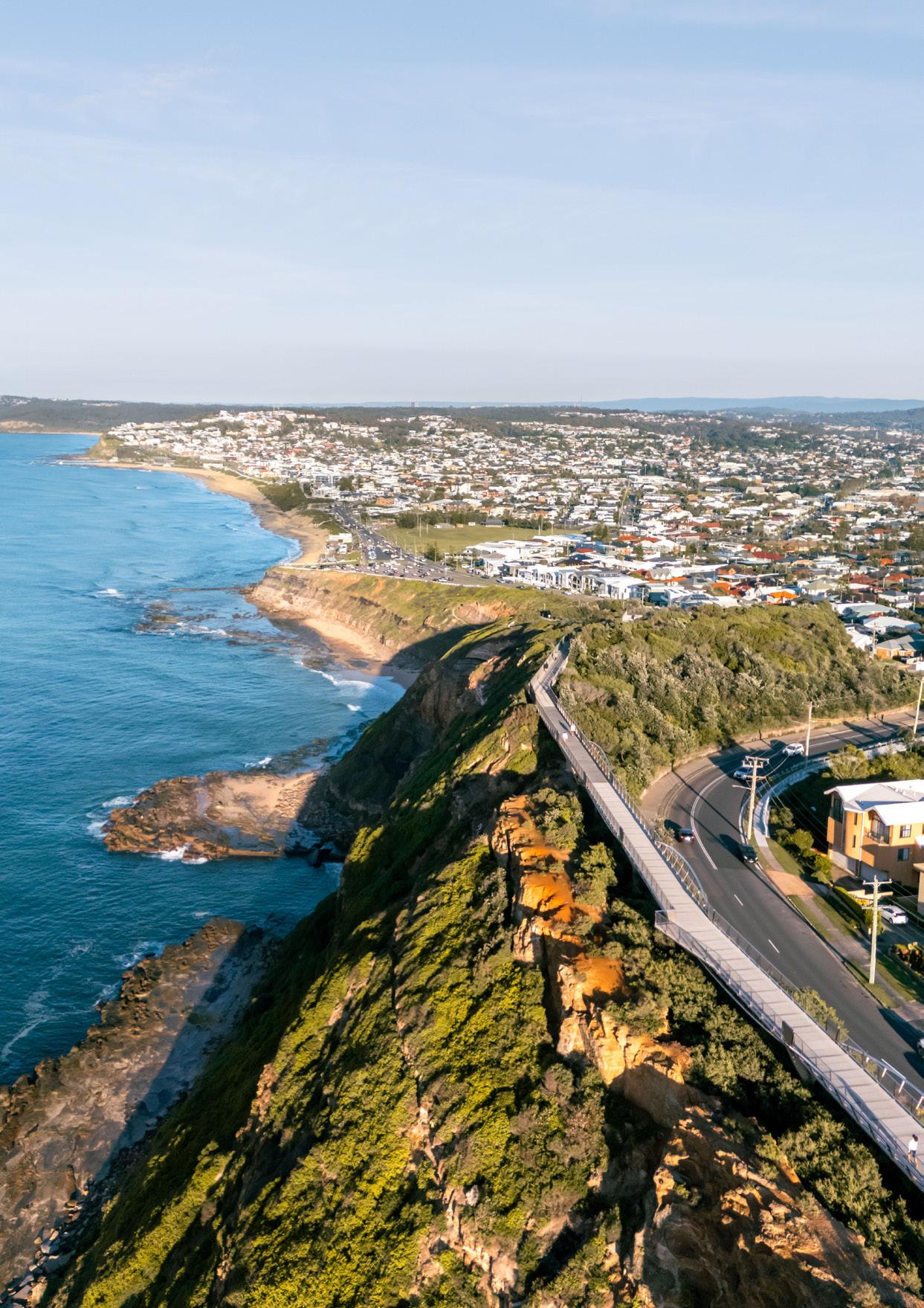
During the reporting period, CN:
• Received a total of 60 formal access applications (including withdrawn applications but not invalid applications)
• Refused zero access applications because the information requested was information referred to in Schedule One of the GIPA Act
Statistical information about access applications – Clause 8(d) and Schedule 2
Access granted in full
Access granted in part
Access refused in full
Information not held
Information already available
Refuse to deal with application
Refuse to confirm/ deny whether information is held
Members of the public (application by legal representative)
* More than one decision can be made in respect of a particular access application. If so, a recording must be made in relation to each such decision. This also applies to Table B.
Access granted in full
Access granted in part
Access refused in full
Information not held Information already available
Refuse to deal with application
Refuse to confirm/ deny whether information is held
Personal information applications*
Access applications (other than personal information applications)
Access applications that are partly personal information applications and partly other
* A personal information application is an access application for personal information (as defined in clause 4 of Schedule 4 to the Act) about the applicant (the applicant being an individual).
Reason for invalidity
Application does not comply with formal requirements (Section 41 of the Act)
Application is for excluded information of the agency (Section 43 of the Act)
Application contravenes restraint order (Section 110 of the Act)
TABLE D: CONCLUSIVE PRESUMPTION OF OVERRIDING PUBLIC INTEREST AGAINST DISCLOSURE: MATTERS LISTED IN SCHEDULE 1 OF THE ACT*
* More than one public interest consideration may apply in relation to a particular access application and, if so, each such consideration is to be recorded (but only once per application). This also applies in relation to Table E.
TABLE E: OTHER PUBLIC INTEREST CONSIDERATIONS AGAINST DISCLOSURE: MATTERS LISTED IN TABLE TO SECTION 14 OF THE ACT
TABLE F: TIMELINESS*
after 35 days (by agreement with applicant)
TABLE G: NUMBER OF APPLICATIONS
* The Information Commissioner does not have the authority to vary decisions but can make recommendation to the original decision-maker. The data in this case indicates that a recommendation to vary or uphold the original decision has been made.
TABLE H: APPLICATIONS FOR REVIEW UNDER PART 5 OF THE ACT (BY TYPE OF APPLICANT)
TABLE I: APPLICATIONS TRANSFERRED TO OTHER AGENCIES UNDER DIVISION 2 OF PART 4 OF THE ACT (BY TYPE OF TRANSFER)

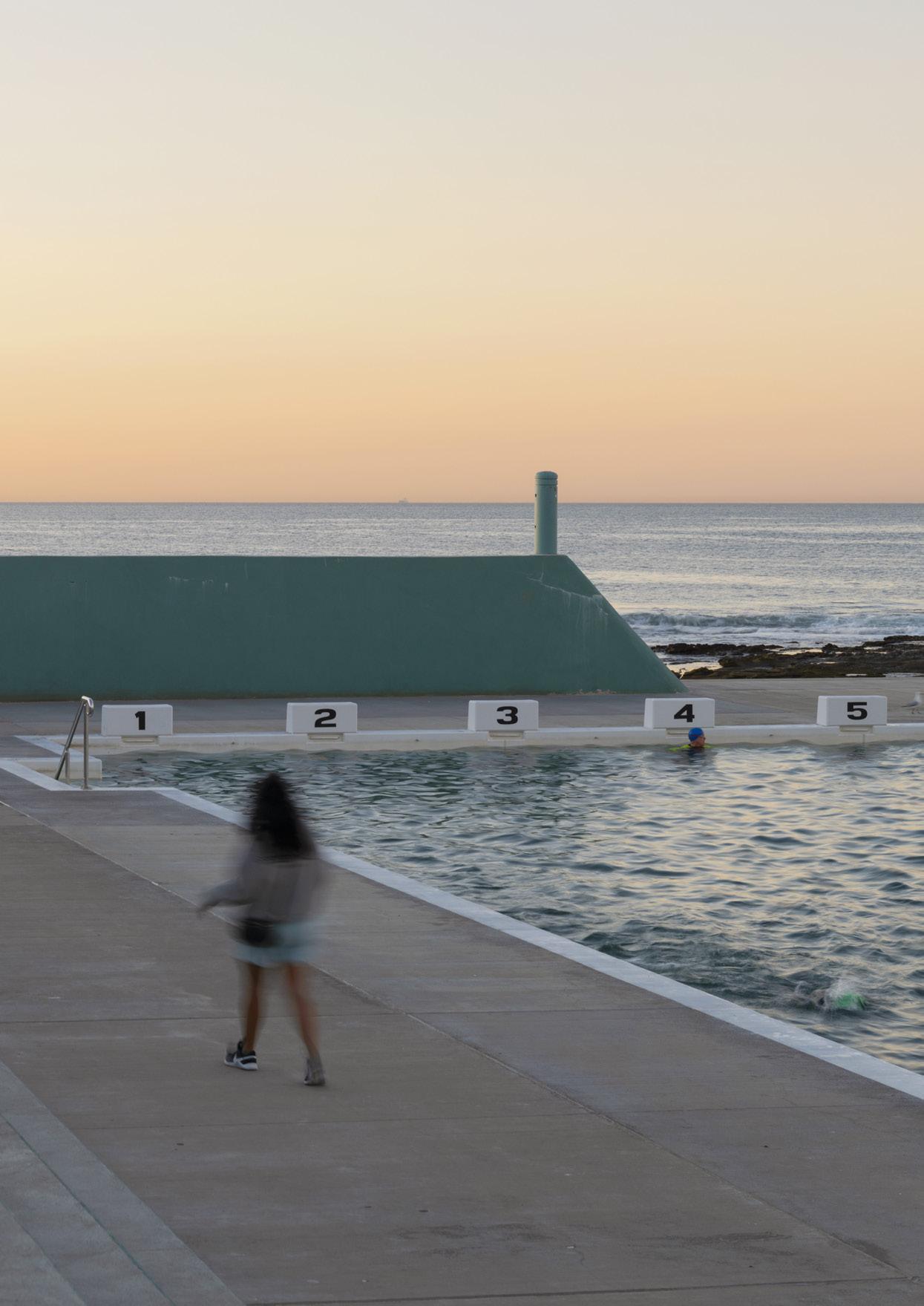
Contents:
• Performance measures
• Strategic asset management
• Special rate variation
• Audited financial statements
Newcastle Airport
Rates and annual charges 47% | $232.8 million
Rates and annual charges are collected for:
• Residential rates
• Business rates
• Domestic waste rates
Stormwater levies
• Special rates User charges and fees 22% | $108.5 million
User charges and fees are collected when CN is providing a service to the community, which includes:
• Waste management
• Regulatory fees
• Development application fees
• Parking meters
• Facility hire
• Child care
• Ticketing income
Operating grants and contributions are a source of income received from multiple funders to complete a specific action or service to the community. These are received from Federal Government, State Government and other government and private bodies and include:
Grants and contributions for capital purposes 18% | 89.6million
Capital grants and contributions are received by CN to complete capital renewal or upgrades of our assets for the community. They are received from both State and Federal Governments.
This category includes developer contributions received by CN under section 7.11 and 7.12 plans. These contributions are utilised for capital upgrade projects on assets, or for the creation of new assets within the community.
In 2025, CN recognised income for several key projects, including:
• Smith Park sports field upgrade
• Newcastle Art Gallery expansion
• CN's share of the Newcastle Airport terminal upgrade
and investment income 4% | $21.8 million
• Blackbutt Reserve cafe and community facility
• Non-cash donations of infrastructure related to Minmi and Black Hill estates
Interest and investment income includes revenue from both cash and non-cash sources from CN's investment portfolio. This includes:
• Interest income on investments and overdue rates
income 2% | $10.6 million
• Dividend revenue
Other income includes CN's rental income received from properties leased to the community and lease income from our investment properties. This also includes fair value adjustments in these properties as well as in CN's investment in the TCorp long-term growth fund.
Employee benefits and on-costs 38% | $149.7 million
Employee benefits and on-costs include:
• Salaries and wages
• Superannuation Employee leave entitlements
• Workers compensation
and services 27% | $109.7 million
Materials and services are the costs of providing services. The types of costs include:
• Consultancy fees
• Materials and consumables
• Fleet costs
• Equipment and plant hire
• Street lighting, utility costs and insurance
• Events, exhibitions and programs
• Software license costs
as well as
representing a finance cost for remediation provisions, representing the interest that accrues on the obligation.
•
Net loss from disposal of assets 3% | $12.1 million
Net loss on disposal is the difference between the proceeds from the disposal of the asset against the value of the asset at the time of disposal. Assets includes infrastructure, property, plant and equipment.
Depreciation, amortisation and impairment of non-financial assets 18% | $71.9 million
Depreciation is the value of CN's assets deteriorating over a period of time. Depreciation is calculated using the straight line method to allocate their cost net of their residual values, over their estimated useful lives.
The OLG has removed the following performance measures from the 2024/2025 Code of Accounting Practice and Financial Reporting, pending a formal review. These ratios have not been audited for the year ended 30 June 2025. However, CN has calculated them using the same methodology applied in previous years. Until new measures are released, we will continue to report our results in the Annual Report to ensure accountability and alignment with our Community Strategic Plan Objective of financial sustainability.
Operating performance ratio
This ratio measures CN’s achievement of containing operating expenditure within operating revenue. It is important to distinguish that this ratio focuses on operating performance. Capital grants and contributions, fair value adjustments and reversal of revaluation decrements are excluded.
Own source operating revenue ratio
This ratio measures fiscal flexibility and the degree of reliance on external funding sources such as operating grants and contributions. CN’s financial flexibility improves the higher the level of its own source revenue.
Unrestricted current ratio
The unrestricted current ratio measures CN’s ability to meet its short-term obligations using current assets adjusted for any external restriction.
Debt service cover ratio
This ratio measures the availability of operating cash to service debt including interest, principal and lease payments.
Rates and annual charges outstanding percentage
This ratio assesses the impact of uncollected rates and annual charges on liquidity and the adequacy of recovery efforts.
Cash expense cover ratio
This liquidity ratio indicates the number of months a council can continue paying for its immediate expenses without additional cash inflow.
$4.6 billion infrastructure portfolio* *Gross Replacement Cost (GRC) as per Report on Infrastructure Assets as at 30 June 2025.
Service Asset Plans
$556 million natural assets
CN manages over $4.6 billion of infrastructure assets and approximately $556 million of natural assets to deliver services to residential and business communities. These assets include roads, footpaths, buildings, drainage, waste management, parks, beaches, bushland and other natural assets, as well as fleet and plant. CN applies best practice asset management through systematic, coordinated activities and practices that enable cost-effective life cycle management of assets.
The Asset Management Policy, Asset Management Strategy and Service Asset Management Plan form a key part of CN’s resourcing strategies within the IP&R Framework. These key documents were updated during 2024/2025 and adopted by Council as part of the IP&R documents at the Ordinary Council Meeting held on 17 June 2025.
Strategic, well-resourced asset planning is essential to deliver services sustainably and equitably to the community. CN’s asset management planning aligns with Newcastle 2040 themes, priorities and objectives. It informs the Operational Plan and Delivery Program, as well as supporting the management of long-term asset renewal, new and upgrade planning, and funding requirements. The following 10 service asset management principles guided our 2024/2025 planning and delivery process.
Key strategic principles
1. Align service delivery expectations with available funding to achieve sustainable management of all required supporting assets.
2. Identify funding levels for a sustainable Capital Works Program and assess their impact on levels of service (LOS).
3. Adjust resources and invest in building capacity to deliver works programs.
4. Ensure renewal and maintenance funding to minimise life cycle costs and maintain agreed LOS.
5. Use service asset plans (SAPs) to coordinate decision-making regarding LOS and implement relevant strategies and plans.
6. Only approve new services and/or assets where the full life cycle cost has been evaluated and appropriate budget allocations made.
7. Capture and improve asset data and service information.
8. Align asset management activities with Newcastle 2040
9. Ensure accountability, responsibility and reporting requirements for assets are established, relevant, clearly communicated and implemented.
10. Incorporate environmental sustainability into service delivery and asset management.
During 2024/2025, infrastructure and natural assets supported a wide range of services provided to the Newcastle community, including, but not limited to:
• Administrative services (including DAs and compliance services)
Community, arts and cultural facilities and programs
• Customer service
• Environmental management
Libraries and learning
• Parks and recreation (including sporting facilities, aquatic services and natural areas)
Tourism and economic development
• Traffic and transport
• Urban water cycle management (including flood mitigation and protection)
Waste services.
These services rely on well planned, built and maintained infrastructure, which is only achieved through coordinated and planned asset management. CN’s 28 operational SAPs were reviewed and updated during 2024/2025. Each operational plan identifies appropriate standards for the maintenance and renewal of assets, detailing levels of service and funding requirements.
CN’s Service Asset Management Plan 2025–2035 (SAMP) is a 10-year strategic planning document that plans the management of this asset portfolio. The SAMP includes a summary of asset management practices such as community consultation, LOS, risk, demand management and continuous improvement when managing an asset from acquisition to disposal. Our asset management planning supports long-term asset renewal as well as new and upgrade planning and funding requirements, which in turn inform the Operational Plan and Delivery Program.
CN’s asset management goals are to proactively manage our assets from a lowest whole-of-life cost perspective in accordance with recognised industry practice, while maintaining LOS and the continual improvement of asset management systems. Service levels are defined to measure service performance, typically considering location, functionality, environment, quality, quantity, safety, capacity/utilisation, aesthetics, reliability and responsiveness. They provide the connection between high-level community, corporate and asset management objectives, and detailed operational goals. LOS are defined using customer and technical measures, defining service attributes from a customer perspective and ensuring assets are managed efficiently to meet service expectations.
LOS are assessed using a 1–5 star rating system, which provides a universal platform for comparing service performance at a corporate level. These ratings are collated to form an average LOS, offering a structured benchmarking system for evaluating and improving service delivery. A general description of each star rating is provided below.
Basic quality standard. Low community usage, limited functionality.
Average quality standard and presentation. Moderate community usage and functionality.
Good quality standard and presentation. Medium–high community usage. Fit for purpose. Maintained and presented in good condition.
Very good quality standard. High community usage, functionality and capacity. Maintained and presented in very good condition. Services LGA community and beyond.
Excellent quality standard. Very high community usage, functionality and capacity. Maintained and presented in excellent condition. High profile; delivers important economic benefits and services beyond the LGA and regional community.
A summary of service star ratings for 2024/2025 is shown below.
Asset-Based Service LOS Service Description
Newcastle Art Gallery, located in Newcastle’s cultural precinct, is the city’s major cultural institution for the visual arts and is responsible for the curation and preservation of its nationally significant collection. The Gallery plays a significant role in contributing to the city’s social and economic vibrancy. It delivers high-quality exhibitions, public programs and events that connect to diverse audiences locally and nationally, fostering curiosity and passion for the visual arts.
The Gallery is one of the only regional galleries to provide full-time staff within its public exhibition spaces. This is key to providing a high level of customer service through face-to-face communication with visitors. Staff answer questions and share expert knowledge about exhibitions and works of art, enriching each visitor’s experience and engagement.
The Gallery is currently undergoing an expansion. During this time the collection will still be available online and will be displayed on digital screens through CN’s Henge initiative, which will allow the community to engage with the collection in unexpected ways at various times of the year throughout the city. Educational programs, special activations and community partnerships will also continue through the closure period.
CN’s bushland, watercourses and public trees create the green and blue corridors that weave through the city, providing the ‘living’ in our liveability and sustainability aspirations. Bushland, watercourses and public trees are the baseline of a desirable urban environment that enhances amenity, liveability, resilience, psychological wellbeing and sense of place – from vegetated horizon lines to natural running waterways to shaded green cycleways and footpaths.
Bushland, watercourses and public trees provide a multitude of community services, including:
• Ecological and habitat preservation
• Scientific and educational opportunities
• Recreational opportunities
• Quality of life
• Scenic and aesthetic amenity
Historic landscape preservation
Climate control
• Air quality
• Water quality
• Stormwater attenuation and conveyance
• Economic benefit
Direct economic return to residents.
The service is centre-based long day care for children aged between six weeks and school age, and is managed on a community based not-for-profit business model. It is one of nine childcare facilities owned by CN, but the only centre managed by council staff.
The service offers recreational and educational programs to the Newcastle and broader community. The reserves are highly valued by the Newcastle community as places for recreation, wellbeing, relaxation, socialising, education and learning.
Stockton Beach Holiday Park is located on Crown land on the beachfront of Stockton Beach and operates as a commercial enterprise through a management contract. The park is currently operated by Australian Tourist Park Management and branded ‘NRMA’.
Cemeteries are critical community infrastructure. Vital for remembrance and reflection, they are also a rich source of cultural and environmental heritage and provide valuable open space. CN cemeteries offer pleasant and cost-effective burial and ash memorial sites. They provide lawn and monumental sites for burial and ash interments, as well as memorial sites for the placement of ashes, including niche wall and memorial gardens.
The Newcastle City Hall and Venues service provides:
• Commercial services – live performance presentation, venue hire and hospitality
• Cultural services – support of the performing arts
• Civic services – civic functions related to Newcastle City Hall, Council meetings and some ceremonial and hospitality events.
The service also manages functions in the Fort Scratchley Community Centre, as well as the Parade Ground and Barracks at the Fort Scratchley Historic Site.
The Civic Theatre is operated as a commercial venue for hire and is primarily a provider of live performance and associated hospitality. The Theatre is also the principal provider of artform support of the performing arts. This occurs through provision of opportunities for professional development of local performing artists, programming of locally created work and a variety of creative/presentation partnerships. The Theatre’s performing spaces include:
A 1,450-seat two-tier proscenium arch theatre (the Civic)
• The Playhouse Theatre, an arena-style studio theatre seating 195 in raked seating
• The Civic Theatre service regularly programs and present events in the 805-seat Concert Hall at Newcastle City Hall.
The Theatre also supports civic functions related to Newcastle City Hall, Council meetings and some ceremonial and hospitality events.
The service aims to measure, monitor and reduce community and operational greenhouse gas emissions to meet climate change targets of net zero by 2030 for Council operations and 2040 for the community, as well as build a resilient city that is better prepared for the impacts of climate change. This is achieved through developing and delivering strategy, infrastructure and programming across three streams:
• Towards net zero emissions
Know and share climate risk, resilient urban and natural areas Drive a circular economy.
The Visitor Information Centre offers hands-on interactive experiences, tourist information and unique souvenirs for visitors and those welcoming friends and family to the city. Conveniently located at the Civic Light Rail stop at 430 Hunter Street, the Centre is open seven days a week.
The coastline is a sensitive and dynamic natural environment that is exposed to natural processes, population growth, coastal lifestyles and coastal hazards that create complex challenges. The coast, estuary and wetlands provide a variety of services, including:
Ecosystem services coastal and estuarine landscapes support a complex system of interdependent ecological processes, producing biologically diverse habitats for native species. These habitats nourish local species and serve as important foraging and roosting grounds for many migratory species, some of which are threatened and/or endangered
• Increased resilience of beaches, estuarine and coastline infrastructure from erosive processes
• Beach and coastal amenity and safety
Beach and river access for social and ecological benefit
Water quality to meet recreational and ecological purposes
Economic benefits to urban communities, fisheries, industry, tourism and recreation
• Significant contribution to psychological wellbeing, including enduring connection to Country
• Intergenerational equity in the context of a changing climate.
Community centres and halls provide opportunities for social interaction, activities, recreation and meeting spaces for the community throughout the Newcastle LGA and surrounds. There are community halls and centres in each ward; combined, they form a network of facilities with a variety of sizes and purposes.
The Information Technology service supports the delivery of a range of services for CN and the community, including:
• Digital services
• IT infrastructure and network
• Technology enablement
• Geospatial information services
Information and network security.
Newcastle Libraries provides library services to the Newcastle LGA through a network of 11 branch service points and the substantial online library. Newcastle Region Library is also responsible for systems management and the acquisition and cataloguing of resources for Dungog and Port Stephens Councils.
Newcastle Museum is a collection of multiple facilities whose primary role is to provide science education and interpretation of movable cultural heritage. Through collaboration and stakeholder relationships, the service also enables other organisations to achieve similar outcomes for the community.
Community assets are leased or licensed to community groups or organisations (generally not-for-profit) that provide services or goods that deliver benefits to the community. These properties support the delivery of a diverse range of community services, including surf lifesaving activities, community meal provision, childcare and early learning services, and emergency response services (SES headquarters).
Investment properties are operated to provide a financial return and/or provide for future income/profit generation.
Newcastle is home to artists, galleries, creative enterprises, art organisations, cultural collections and a community that embraces cultural expression. This service enhances public spaces through the provision of permanent and temporary art installations, fountains, monuments and memorials.
Public Art, Monuments and Memorials
Recreation –Aquatic Services
Recreation – Open Spaces
Stormwater Drainage and Water Quality
Aquatic services provide facilities and programs for the health, wellbeing and enjoyment of the community, including learn-to-swim classes and water safety education. Attracting visitors to the city as a sporting and leisure destination, the service supports recreational activities at patrolled beaches as well as inland and coastal pools. These facilities enable a range of recreational activities to be practised and enjoyed.
CN provides a diverse range of open spaces, including parklands, reserves, recreation facilities, sportsgrounds and other public land. The approach to managing park and recreational spaces incorporates the principles and outcomes of:
• Accessibility and connectedness
• Equity and opportunity
Safety and security
Sense of place and wellbeing.
CN provides stormwater drainage and water quality for the health and safety of the community and environment. This service integrates closely with the delivery of transport, public spaces and environmental management, contributing to vibrant, safe and activated public places, protected environments and a liveable built environment.
Depot Operations provide the facilities to support services CN delivers to the community. This includes the Works Depot and supporting structures, including:
• Administrative buildings
• Amenities buildings
• Garaging and car parking for fleet and plant
Outdoor storage facilities
Records warehouse
• Store warehouse and weighbridge
• Vehicle fuelling facilities and washbay
• Workshops – fleet and plant; building trade services; tyre shop.
This service supports CN in delivering a wide variety of services to the community, ranging from the collection of household waste to the maintenance of local roads and parks.
Bridges and structures support the transport network, enabling the movement of people and goods across the community.
CN provides on-street and off-street spaces (paid and unpaid) for short-term vehicle parking. Car parking enables participation in the city’s opportunities, including work, education, health, social and recreational activities.
CN provides footpaths, shared paths and associated infrastructure (such as pedestrian refuges and kerb ramps) to facilitate the safe access and movement of pedestrians and cyclists. The service involves maintenance and renewal of existing paths and facilities and augmentation of cycling and pedestrian networks through the construction of new assets.
We are aiming to build connected networks of cycling and pedestrian paths that: Link homes with places of employment, education, shopping and recreation Encourage walking and riding for transport and recreation
Are well-designed and able to cater for expected increase in future use
• Enhance street amenity and public domain generally.
These assets provide street furniture in the road reserve for the community’s safety, comfort and amenity. Assets include transport stops, street lighting, street signs, guard rails, roadside fencing and line marking. The service also delivers seats, garbage bins, bike racks and advisory signs that provide comfort and amenity to public domain users. The Urban Centres delivery program is also included in this service.
This service provides safe, reliable and efficient road networks through vehicular connection and travel demand management. Newcastle’s road network comprises approximately 865km of roads, of which 751km are classified as local roads, 44km as regional roads and 70km as state roads. Responsibility for transport is shared across all levels of government, with significant overlap. This service also supports the provision of cycleways through on-road facilities and incorporates local area traffic management works, delivering traffic calming of local streets through intersection realignments, horizontal and vertical deflection devices, and improved conditions for walking and cycling. Similarly, the service delivers and supports devices such as raised crossings, kerb extensions and pedestrian refuges to aid pedestrian movement and assist with calming traffic.
These services include:
Kerbside collection – a three-bin system for residential properties in Newcastle, with weekly collections for residual waste and alternating fortnightly collections for recycling and green waste
Public waste and recycling bin collection – this service plays a critical role in improving environmental amenity, as well as providing residents with the opportunity to dispose of waste and recycling away from home
• Household bulk waste collection.
CN also operates the Summerhill Waste Management Centre, which provides recycling, resource recovery and solid waste disposal services for Newcastle residents and commercial/industrial customers.
Special Rate Variation Guidelines* 7.1
The 2015 SRV was approved by Independent Pricing and Regulatory Tribunal (IPART) in May 2015 and has raised $293.2 million over the nine years to 30 June 2024. These funds were used to maintain another year of financial sustainability and a balance of infrastructure renewal and revitalisation projects. 2020/2021 was our fifth and final year of the 2015 SRV.
IPART’s determination has enabled CN to achieve financial sustainability, maintain and enhance existing services, and fund a program of asset renewal and some new capital expenditure.
program ($0’000)
Funds have been applied to maintain and enhance existing services and associated assets, of which a total of $6.9 million has been spent in 2024/2025 and nearly $65 million has been spent since the introduction of the 2015 SRV. PROJECT 2016–2025 ($’000)
See separate document at: https://www.newcastle.nsw.gov.au/about-us/our-responsibilities/integrated-planning-and-reporting/ general-purpose-financial-statements
New website accessibility profile tool launched, signifying the airport’s commitment to improving customer experience for all passengers.
• Williamtown Drive duplication and Nelson Bay Road intersection upgrade project complete – a key component of our international expansion project. Approximately $800K in savings achieved.
• Astra Aerolab milestone: $850M partnership with Kongsberg Defence Australia announced by the Hon. Pat Conroy, Minister for Defence Industry and Capability Delivery. The project will see a factory to service and manufacture naval and joint strike missiles constructed at Astra Aerolab, anticipated to create over 500 jobs during the construction phase and contribute nearly $100M in economic benefit to the local community. Upon completion, the facility is expected to employ around 100 people. Although the facility will manufacture missiles, it will not manufacture explosives, which will be supplied by another site located in western Sydney.
• Full-scale emergency exercise ‘Smooth Skies’ successfully conducted, incorporating the Royal Australian Air Force, NSW Police, State Emergency Service and Ambulance, Fire and Rescue NSW, NSW Rural Fire Service, Australian Red Cross, Port Stephens Council and the Hunter New England Local Health District.
• MOU signed with Destination NSW to attract new airline routes through the multi-million dollar Aviation Attraction Fund for both international and domestic flights. The partnership offers financial support for two years, including route incentives for airlines and strategic marketing.
Astra Aerolab milestone: BAE Systems Australia
obtains state significant development consent for their northern hangar extension to support regional F-35A Lightning II aircraft sustainment.
• MOU signed with MidCoast Council to drive visitation to the Barrington Coast area, boost industries and further enable supply chain and air freight logistics in our regions.
• Aviation Business Development attends the CAPA Airline Leader Summit in Brisbane, meeting with airlines, prospective city pair partners and other aviation industry executives.
• Happy or Not in-terminal feedback program launched.
• Terminal Expansion milestone: Final roof beam of the international terminal expansion lifted into place at a landmark ‘Topping Out’ ceremony, attended by Federal Member for Paterson Meryl Swanson MP and numerous dignitaries.
• Existing loan funding from the Commonwealth Bank converted to an innovative $235M green sustainability-linked loan, linked to specific sustainability actions and outcomes to fund a raft of pioneering sustainability programs at Newcastle Airport.
• October 2024 produces the largest monthly passenger numbers since pre-COVID, with 110,000 passengers travelling through the airport. This equates to +1.1% growth YOY, notably without the Bonza passengers of 2023.
• Half-yearly Cairns service concludes, servicing almost 28,000 more passengers than in 2023.
• Aviation Business Development attends Routes World in Bahrain, meeting with 23 key airline and airport partners from 15 countries around the world.
• Mayor of Port Stephens Leah Anderson and aviation expert Katie Cooper announced as new Airport Board Directors.
Astra Aerolab milestone: State significant development consent received for the Kongsberg Defence Australia guided weapons manufacturing facility, supporting a range of Australian Defence Force programs.
• Cairns 2025 season renewed for July-October.
• Hidden Disabilities Sunflower lanyard program rolled out for a more inclusive customer journey.
• Astra Aerolab milestone: Groundbreaking ceremony takes place for Kongsberg Defence Australia’s manufacturing facility.
• Stage One of the airport’s Airfield Reconfiguration Works project begins, enhancing the airport’s ability to handle larger, long-haul Code E aircraft and installing a new centralised storage area for aircraft servicing equipment.
• Terminal Expansion milestone: New roof and glass facade completed, marking a significant transition point for the project, moving into the final fit-out stage of construction.
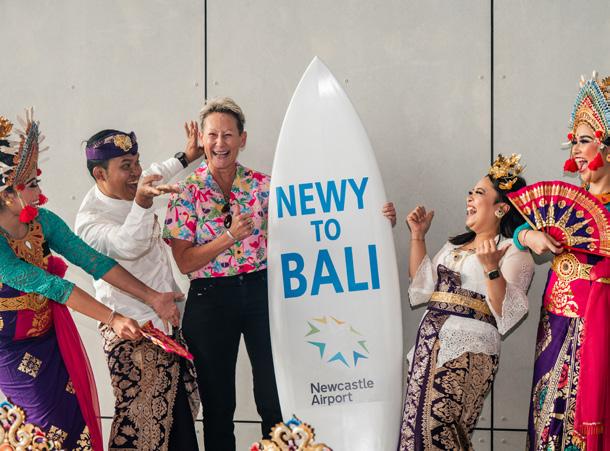
Newcastle Airport becomes the first airport in Australia to achieve Airport Carbon Accreditation (ACA) Level 4+ Transition, joining the top 12% of airports worldwide in reducing our environmental footprint.
• CareFlight establishes permanent aircraft base at Newcastle Airport, enhancing access to critical aeromedical services for communities across Northern NSW and along the east coast.
• FlyPelican announces a morning Gold Coast service, launching March.
• Terminal Expansion milestones: 31-tonne, 20-metre-long aerobridge installed, a first for Newcastle Airport. New precinct substation powered on, providing capacity for future expansion across the precinct.
• Aviation Business Development attends Routes Asia in Perth, meeting with 14 Asian airline partners from seven different countries.
• FlyPelican’s new Gold Coast service takes off four days a week.
• Linc Horton appointed as Chief Executive Officer, commencing in May.
• Astra Aerolab milestone: Development consent received for the development of major hightechnology facility to support a key Australian Defence Force program.
• Terminal Expansion milestone: Hertz relocates to newly built car rental office to support an enhanced customer experience.
• Emeritus Lord Mayor Nuatali Nelmes retires from the Airport Board after 7 years of service.
• Deputy Lord Mayor of Newcastle City Council Callum Pull joins the airport’s Board as Nominee Director.
• Qantas announces Newcastle Airport’s first-ever direct flights to Perth – the Airport’s mostrequested route via social media.
Terminal Expansion milestones: New forecourt opens to passengers, including new Pick Up and Drop Off Zones. Significant expansion of IT network, connecting new public Wi-Fi, additional CCTV cameras, access control systems, digital signage, and building and energy management systems.
• Representatives from across the business attend the Australian Tourism Exchange in Brisbane, with aviation delegates from airports, airlines, government departments and more all in attendance.
• 17-year anniversary of Newcastle Airport’s Ambassador volunteer program.
• Jetstar announces Newcastle Airport’s first yearround international route, with flights to Bali taking off in October.
Terminal Expansion milestones: Mass Passenger Exercise for terminal expansion completed, with over 120 volunteers taking part simulating demand and testing system performance across Check-In, Screening, Immigration and boarding gates. Newly constructed airside apron open, with permanent passenger walkways. Expansion of Common Use Terminal Equipment (CUTE) to all existing and new departure gates, improving operational flexibility, infrastructure efficiency and scalability for growth.
• 35 delegates hosted across seven venues for the Australasia Airport Roundtable, bringing together airlines, airport representatives and aviation professionals to discuss the future of aviation and tourism while showcasing the Hunter Region.
• Artists impressions and fly-through video released for Newcastle Airport’s Commercial Estate, including Astra Aerolab, Aerospace East Precinct and the wider estate.
10-year anniversary of FlyPelican launching its first Regular Public Transport (RPT) service from Newcastle to Canberra.
CN's (former)Lord Mayor, (current) Deputy Lord Mayor and CEO attended Board Meetings for Newcastle Airport Pty Ltd (NAPL) held during the year ended 30 June 2025, as follows:
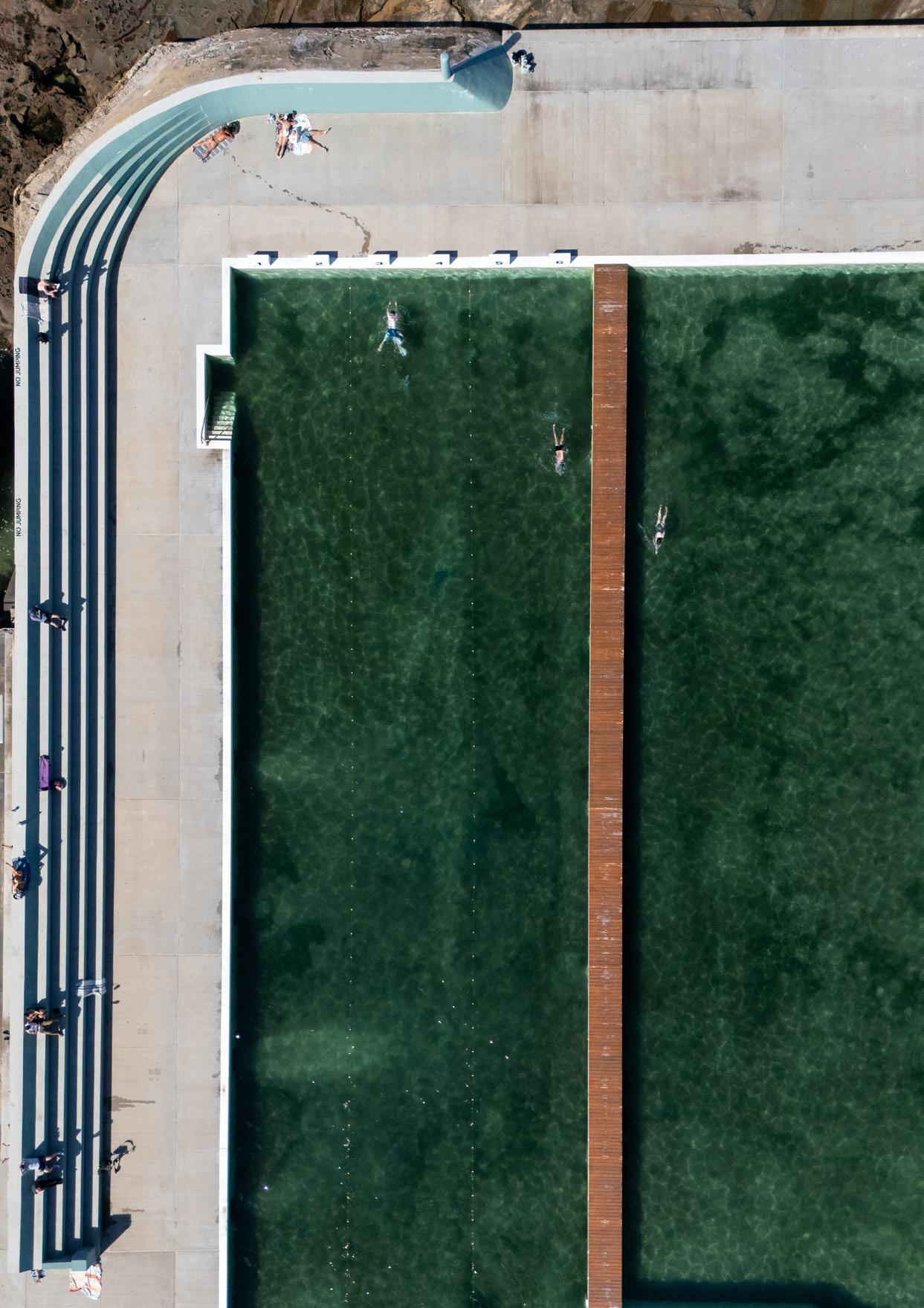

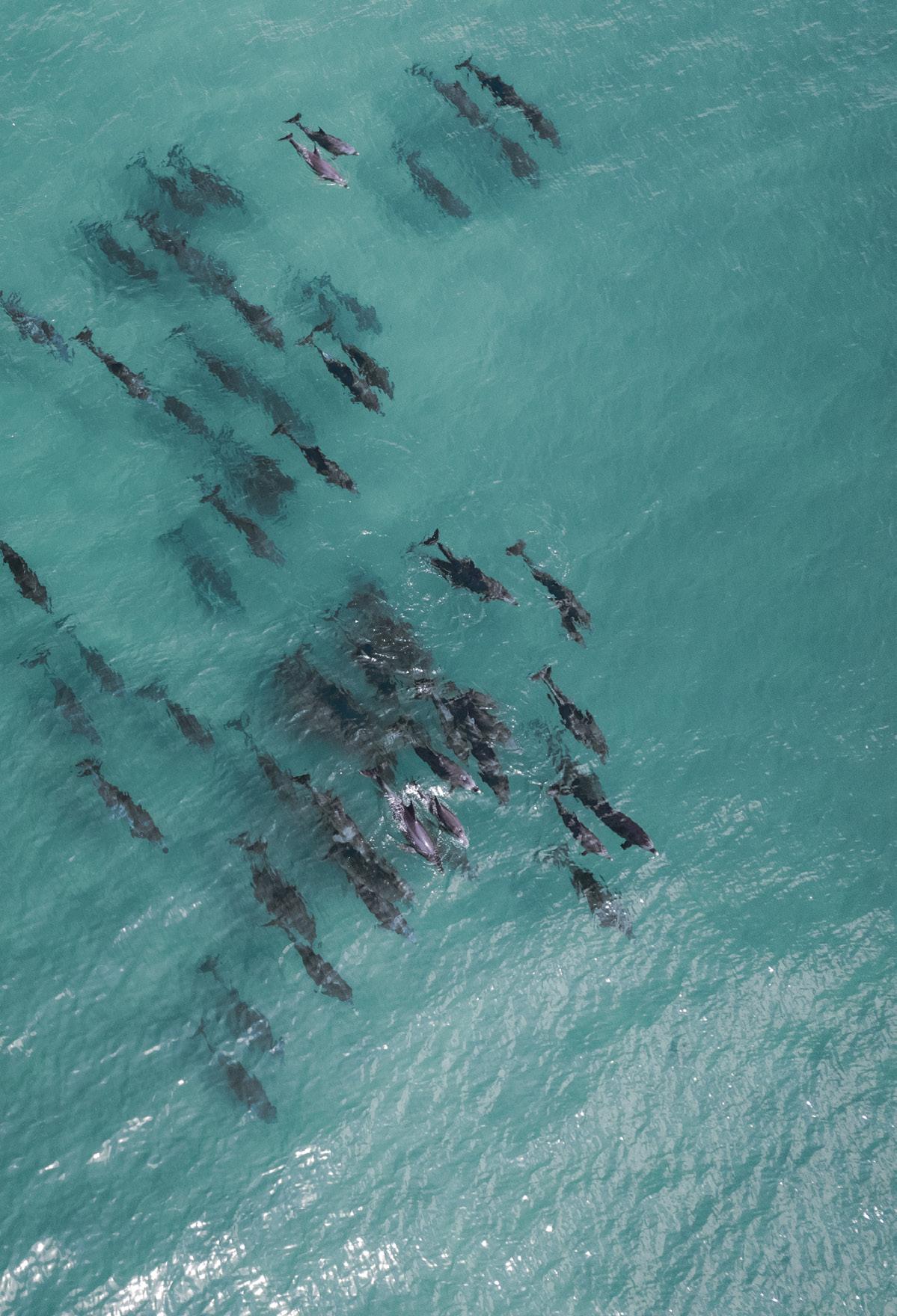
The following report is in accordance with the GRS Modern Slavery Annual Reporting Template, as set out in the NSW Anti-slavery Commissioner’s Guidance on Reasonable Steps.
A.1 Reporting entity details
ENTITY DETAILS
Reporting entity City of Newcastle (CN)
Reporting period – start date 1 July 2024
Reporting period – end date 30 June 2025
Name of individual authorising this report
Position of individual authorising report
A.2 Procurement spend details
Jeremy Bath (in accordance with sections 335(e), 406 and 428 of the Local Government Act 1993 (NSW))
CEO
A.1.1 What was your entity’s total procurement spend in this reporting period, to the best of your knowledge?
$257.3 million (excluding GST)
A.1.2 Complete the following table with information for this reporting period:
Heightened (High) Spend breakdown cost not available*
Standard (Moderate) Spend breakdown cost not available*
Light (Low)
Spend breakdown cost not available*
End User Devices, Network Hardware, Printers/ Multifunction Equipment, Mobile, Computer Accessories, Heavy Commercial Vehicles, Light Commercial Vehicles, Vehicle Repair & Maintenance, Electrical & Lighting Supplies, Other Fuel & Lube
Software as a Service (SaaS), Bulk Fuel, Petrol, Diesel, Asphalt, Bitumen & Aggregates, Asphalting
Concrete, Call Centre & Helpdesk Service, Landscaping, Tyres, Office Workers Contingent Labour
Minimal (Minor)
Spend breakdown cost not available*
Earthmoving & Excavation Equipment Hire, Road & Rail Building Equipment Hire, Architecture, Civil Engineering, Archaeology & Heritage, Electrical Engineering, Geotechnical Engineering & Hydrology, Infrastructure – Program & Project Management, Landscape Architecture, Mechanical Engineering, Planning Advisory Consulting, Structural Engineering, ICT Contingent Labour, Advertising, Training Expenses, Network Hardware Managed Services, Property & Asset Insurances, Government, Regulatory & Administrative Law, Media Monitoring Services, Environmental Impact Assessments, Audit, Quality Assurance, Probity & Risk
*NOTE: CN is still working on capturing its procurement spend data in line with the procurement categories set out in the GRS Modern Slavery Inherent Risk Identification Tool.
B.1 Significant operational issues (section 31(1)(a) of the Modern Slavery Act 2018 (NSW))
CN has not had any issues raised by the Anti-slavery Commissioner during 2024/2025 concerning the operations of the Council.
B.2 Reasonable Steps
REASONABLE STEPS TAKEN CN RESPONSE
1 Commit
1.1 Stakeholder engagement
What steps did your entity take to engage with stakeholders during this reporting period in relation to modern slavery?
Did you engage with external stakeholders on modern slavery risks in this reporting period?
1.2 Identify salient risks at the organisational level
What steps did your entity take to identify salient modern slavery risks at the organisational level (i.e. across all operational and procurement activities) during this reporting period?
Did you conduct or update a Salient Modern Slavery Risk Assessment in this reporting period?
1.3 Modern Slavery Policy
What steps did your entity take to adopt a Modern Slavery Policy during this reporting period?
None during the reporting period
Yes
CN sent a questionnaire to its suppliers to determine: a) the extent to which their business is committed to developing its response to modern slavery risks; and b) how they identified and responded to modern slavery risks in their business operations and supply chains.
No
CN has addressed modern slavery through its Procurement Policy and Statement of Business Ethics.
CN has included the following statement in its Procurement Policy:
CN will ensure it complies with its obligations under the Commonwealth Modern Slavery Act 2018 and any other modern slavery legislation that may come into effect. CN will undertake ongoing due diligence to minimise or eliminate the risk of modern slavery occurring in its supply chain. As part of its due diligence, CN will undertake an annual risk assessment of all CN suppliers. CN will not participate in any procurement with a supplier that is found to be engaging in modern slavery.
In addition, CN’s Statement of Business Ethics includes the following:
Suppliers and contractors must comply with the requirements under the Modern Slavery Amendment Act 2021 (Cth) and all related legislation including the Modern Slavery Act 2018 (NSW). Council will not participate in any procurement with a supplier or contractor that is found to be engaging in modern slavery.
Do you have a Modern Slavery Policy, approved by your senior governing body (e.g. Agency Head/Secretary) in place?
No, but modern slavery is addressed through CN’s corporate Procurement Policy, which has been approved by Council.
Does your modern slavery policy include high-level targets? No
1.4 Modern Slavery Risk Management Plan
What steps did your entity take to adopt a Modern Slavery Risk Management Plan during this reporting period? Nil
Do you have a Modern Slavery Risk Management Plan, approved by your senior management, in place? No
Does your plan assign accountability for performance against high-level targets to specific roles? No
2.1 Identify and map your supply-chain risks for each procurement
What steps did your entity take to identify and map your modern slavery risks at the supply-chain level during this reporting period?
2.2 Develop a risk-reducing sourcing strategy
What steps did your entity take to develop a modern slavery risk-reducing sourcing strategy during this reporting period?
A questionnaire was issued to suppliers to understand the modern slavery risk in their supply chains.
Currently undertaking data gathering of the risks of modern slavery in the supply chains of CN's suppliers.
In what percentage of procurement processes was modern slavery factored into your entity’s sourcing strategy or other procurement planning activities during this reporting period? 0%
Source
3.1 Select appropriate suppliers
What steps did your entity take to address modern slavery risks when selecting suppliers during this reporting period?
In what percentage of competitive procurement processes were the Model Tender Clauses used during this reporting period?
3.2 Adopt a shared responsibility approach to contracting
What steps did your entity take to adopt a shared responsibility approach to modern slavery risks in contracting during this reporting period?
CN will not participate in any procurement with a supplier that is found to be engaging in modern slavery.
50% (of procurement over $250,000 in value)
Model Contract Clauses were included in large value (ie. >$250,000) construction works contracts and for large value long-term service contracts.
In what percentage of competitive procurement processes were the Model Contract Clauses used during this reporting period? 25%, based on value of total procurement spend.
4.1 Monitor and evaluate supplier performance
What steps did your entity take to monitor and evaluate supplier performance relating to modern slavery during this reporting period?
Has your entity required any of your Tier One suppliers to undergo an audit addressing modern slavery risks in this reporting period?
CN issued self-assessment questionnaires to its suppliers.
No
What percentage of your Tier One suppliers underwent an audit addressing modern slavery in this reporting period? 0%
During the reporting period, what percentage of your Tier One suppliers’ workforce were surveyed about their working conditions? 0%
What percentage of your Tier One suppliers’ workforce are temporary migrant workers?
What percentage of workers engaged by your Tier One suppliers in the last reporting period paid or incurred a fee to secure their engagement?
4.2 Develop supplier capabilities
N/A (no data provided to CN)
N/A (no data provided to CN)
What steps did your entity take to develop supplier capabilities relating to modern slavery risks during this reporting period? Nil
What percentage of your entity’s Tier One suppliers reported that they had participated in modern slavery training during this reporting period? 0%
5.1 Provide or enable access to effective grievance mechanisms
What steps did your entity take to provide or enable access to effective modern slavery grievance mechanisms during this reporting period?
How many complaints relating to modern slavery associated with your operations or the goods or services you procure were lodged during the reporting period, whether with your organisation’s grievance mechanism(s) or with others?
5.2 Take safe immediate steps to remedy harm
What steps did your entity take to safely and immediately remedy modern slavery harms to which you were connected during this reporting period?
5.3 Use leverage to remediate deficient practices
What steps did your entity take to use leverage to remediate deficient modern slavery risk management practices during this reporting period?
In how many procurement contracts or arrangements was a material breach related to modern slavery formally notified during this reporting period?
5.4 Withdraw responsibly
What steps did your entity take to withdraw responsibly during this reporting period, in connection to modern slavery risks?
CN's Statement of Business Ethics sets out a mechanism for employees of suppliers or contractors to lodge a submission (in writing or email) to report any wrongdoing or unethical behavior.
Nil
N/A (none reported/identified)
N/A (none reported/identified)
Nil
Nil
How many procurement contracts or arrangements were terminated on modern slavery grounds during the reporting period? Nil
6 Report
6.1 Establish a victim-centred reporting protocol
What steps did your entity take to establish a victim-centred modern slavery reporting protocol during this reporting period?
Nil
Do you have a modern slavery reporting protocol in place that prioritises the interests of the victim/survivor? No
6.2 Report on your modern slavery risk management efforts
What steps did your entity take to report on your modern slavery risk management efforts during this reporting period?
Did your entity report on modern slavery in its prior Annual Report?
During the period, did your entity comply with its obligations to report heightened modern slavery due diligence procurements valued at $150,000 (inc. GST) or more within 45 days?
7 Improve
7.1 Learn lessons from your performance and others’
What steps did your entity take to learn lessons from your modern slavery performance and others’ during this reporting period?
As part of its Annual Report, CN provides a report on modern slavery under the GRS requirements of the NSW Office of the Anti-slavery Commissioner.
Yes
Yes
CN is still in the phase of gathering data and understanding the risks in the supply chains of its suppliers.
CN staff have attended workshops/seminars to learn what other local governments are doing (in relation to modern slavery) and what they have found in their supply chain.
Has your entity updated its modern slavery policies or procedures based on stakeholder feedback or lessons from a grievance mechanism during this period? No
7.2 Train your workforce
What steps did your entity take to train your workforce during this reporting period?
An information session was held for CN project management staff that are involved in tendering/ procurement for CN’s capital works spend.
What percentage of your workforce received modern slavery training in the period? 0%
7.3 Cooperate with the Anti-slavery Commissioner
What steps did your entity take to cooperate with the Anti-slavery Commissioner during this reporting period?
CN has commenced implementing the requirements of the Office of the Anti-slavery Commissioner, as set out in its Guidance on Reasonable Steps to Manage Modern Slavery Risks in Operations and Supply-Chains.
Key CN procurement staff attended a presentation by the Office of the Anti-slavery Commissioner on the GRS requirements, as it applies for NSW local governments.
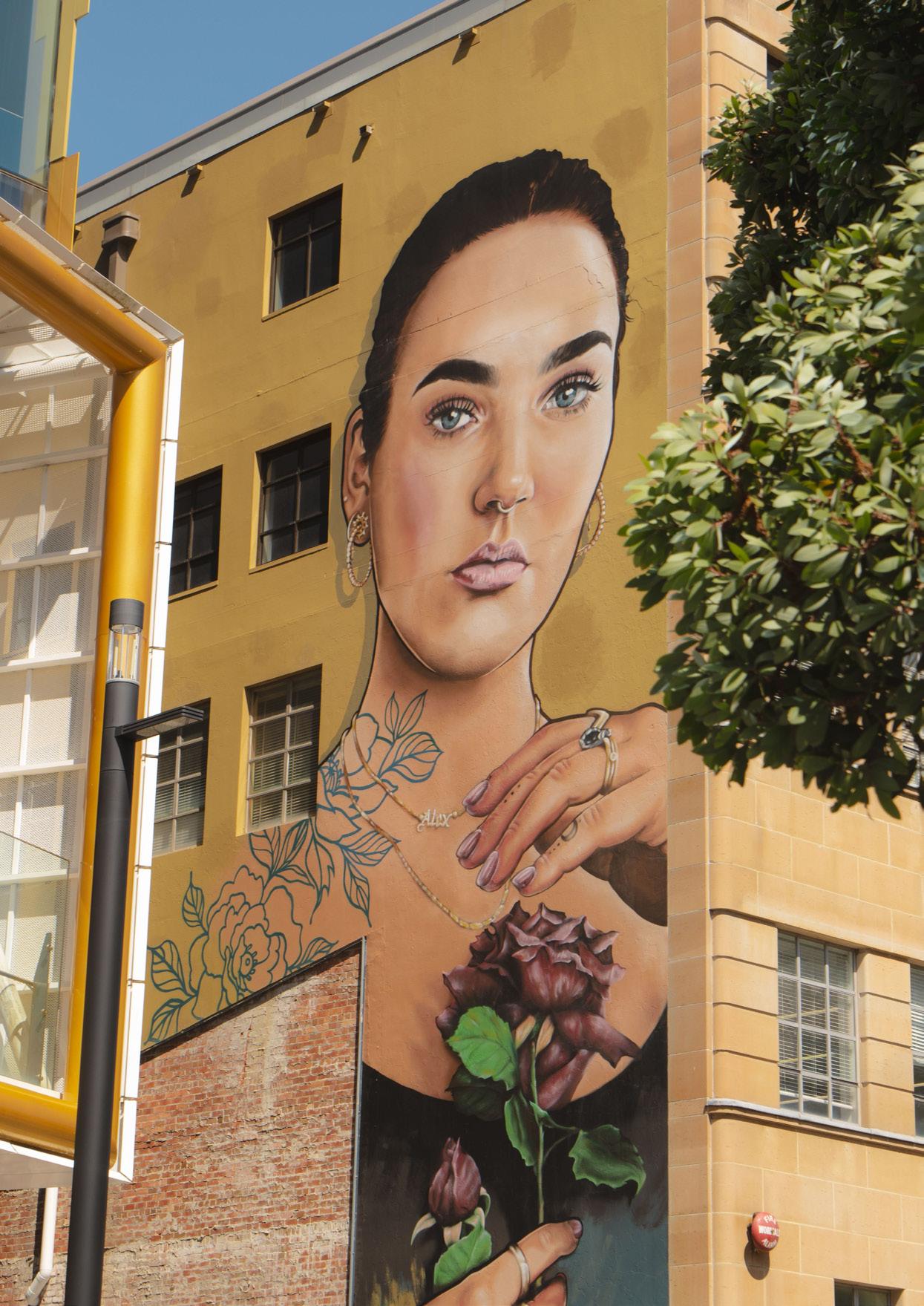
Ongoing updates to relevant stakeholders on regulatory requirements, such as food safety information sent to food businesses, companion animal registration information to animal owners, and other key stakeholders such as skin penetration and cooling tower operators.
• Transport planning including consultation on Traffic Management projects (Cooks Hill, Wickham), Pedestrian Access and Mobility Plan projects (pedestrian crossings and footpath construction in Beresfield, Merewether, Lambton, Elermore Vale, Wallsend and Waratah), Local Area Traffic Management projects (Adamstown, Cooks Hill), cycleways projects (Islington, Newcastle, and Lambton), Parking Plan projects (Newcastle, Hamilton, Cooks Hill), and various other traffic and parking projects across the city.
Consultation related to the development of the Principal Pedestrian Network, and subsequent approval of the Walking & Mobility Plan, including various updated communications around the associated outcomes.
Construction updates on key Transport Program projects, including: Islington Cycleway improvements; priority crossings in Nash Street, Wallsend; Jesmond cycleway; road safety improvements, including new traffic lights in Glebe Road, Adamstown, and signalised crossing in Maud Street, Waratah; and Parkway Avenue roundabout safety improvements.
• Public activity events, such as ‘Ride to Work Day’ and ‘Pups in the Park’, as well as a range of outreach community programs throughout the year.
• Repeated community engagement activities, including with schools around traffic and parking management, residential communities on animal care and ownership, and business groups for options for maximising parking opportunity and turnover.
• Web content uplifted so key call driver pages are easily accessible, including Pets and Animals, Parking, and Contact Us.
Development Activity Map recording the location and details of all DAs and Complying Development Certificates determined from an interactive map.
• Exhibitions on proposed legislative changes and important planning documentation.
• Online Application tracker for Development Applications, Modifications, Reviews, Complying Development Certificates, Subdivision Certificates, Construction Certificates, Planning Proposals and Fire Safety Certificates.
• Development e-newsletter providing important development and legislative updates.
• Trees – information online and webforms to facilitate street tree selection.
• CN grants – two rounds of Youth Climate Action Fund, environmental grants and sustainability grants.
• Online map showing CN-owned and -operated EV chargers.
• Community engagement events delivered as part of CN’s environment education program, Natural Connection, including National Tree Day at Tarro Reserve, Beresfield.
Community engagement events delivered as part of CN’s Empowering Newcastle program.
• Engagement events delivered as part of CN’s Youth Climate Action Fund, and environment and sustainability grants programs.
• Street and park tree photo competition – part of the urban forest community engagement program, Living Streets.
• Printed and website community updates, and stakeholder briefings, on the implementation of actions from the Stockton Coastal Management Program 2020 and progress on the development of the Extended Stockton Coastal Management Program.
• Natural Connection monthly e-newsletter.
• Empowering Newcastle bimonthly e-newsletter.
• Q&A in relation to street and park tree replacement planting and ‘Tree Map’ portal on CN website providing public tree details.
• Letters to residents offering choice of tree species for planting under CN’s street and park tree replacement program.
Letters to residents offering a conversation with CN officers on street corners as part of choice of tree species for planting under CN’s street and park tree replacement program in various suburbs.
Letterbox notification advising of proactive tree works being undertaken in the designated suburb.
• Environmental education signage developed for coastline monitoring at Stockton, rock platforms of southern beaches and bushland rehabilitation works.
• Website update (project and works) on the development of the Blackbutt Multipurpose Facility and Café.
• Website update (project and works) for Blackbutt bookings and events.
• Project updates regarding CN’s new 34 EV charging ports across 11 locations.
• Information session, training program and related materials for the Empowering Climate Champions program.
• Website and Chargefox updates relating to revised electric vehicle charging costs commencing on 1 July 2025.
• Website updates on Go Electric Action Plans and Your Cool Home Action Plan.
• Letterbox notification for proactive prevention of tree vandalism in designated suburb.
• Various media releases on environment and sustainability projects and programs.
• CSP Review – Have Your Say.
• Draft Delivering Newcastle 2040 2025-2029 for public consultation.
• Public notification of proposed leases.
• Monthly financial reporting.
• Publicly accessible maps of development activity within the LGA, waste collection, heritage and tree information.
• Data and mapping to various CN strategies and reports.
• Held in-person community information sessions (26 May 2025 and 3 June 2025) – New Lambton landslip incident.
• Published Local Emergency Operations Centre updates to CN’s website – New Lambton landslip incident.
• Implementation of a new customer request service catalogue webpage and delivery of 75 new digital customer request forms. Subsequent improvements to the General Enquiry Form and acknowledgement process.
• Subsequent remediation of CN's App to link to the new digital customer request forms.
• Phase 3 of Your City, Your Way social media campaign to promote awareness of CN online services to ‘report an issue’ or ‘request a service’ across animals, waste and illegal dumping.
• Webpage created to inform community about CN’s Digital Transformation journey.
• Further enhancements made to the chat bot, which supports the web chat service to provide information and direct customers to relevant online services. Chat bot has also been expanded to manage enquiries received via CN’s Instagram account.
• Presented to LG Professionals NSW Customer Experience Conference on CN’s chat bot implementation journey and the improvements to service delivery achieved.
• Improved content and design on our Customer Service webpage and Privacy Management Plan relating to added content around CN’s use of call recordings for calls made to the CSC.
• Expanded the disclaimer around the use of call recordings on the CSC Interactive Voice Response (IVR)/phone line.
• Improvements to the Get In Touch webpage design and content to make it easier for customers to find the right call to action/form.
• Added a new webpage to provide community with information on how to submit a petition to the elected Council.
• Public exhibition – Local Event Day for Newcastle Show 2025.
• Progress published in Quarterly Performance reports and the Annual Report.
• Comments published to the community via CN website.
• Details of a CN-registered vehicle were requested by a member of the public in connection with an alleged assault that occurred nearby. The information was provided to support a witness statement and to assist with the ongoing police investigation.
• Notification to residents/businesses in Mayfield, Hamilton and Wallsend CBDs of pressure washing to footpaths (June 2025).
Letterbox notifications to residents of works.
• Letterbox notifications to residents of night and weekend works.
• Letterbox notifications to residents for CN work undertaken on behalf of Transport for New South Wales.
• Maud Street, Waratah – road safety improvements: Projects and Works webpage, site signage, resident notification letters –commencement of works, media on completion.
• Georgetown Local Centre: Projects and Works webpage, business and resident notification letters – Stage One works.
• Various cliffs: South Newcastle cliff line, Kilgour cliff, Shortland Esplanade Embankment stabilisation –Project and Works webpage, site signage, social media.
Various creeks: Maryland Creek; Nereida Close, Kotara; Claremont Reserve; city-wide channel creek maintenance; site signage, Projects and Works Webpage.
• Bar Beach remediation works: Projects and Works webpage, site signage.
• Glebe Road, Adamstown – traffic improvements: Projects and Works webpage, business and resident notification letters, site signage.
• Memorial Drive, The Hill, road embankment stabilisation and new footpath: Resident notification letter, consultation – Landcare Group, adjoining properties, Projects and Works webpage, media release – project completion.
• Inland pools solar replacement: Mayfield Swim Centre, Wallsend Swim Centre, Projects and Works webpage.
• Fernleigh Tunnel renewal works: site signage, social media, notification to local residents and face-to-face door knock.
• Mall carpark site investigations: Business and residential works notification letters.
• Queens Wharf redevelopment and site investigations: Projects and Works webpage updates, site signage.
• Throsby Creek Connected Pathways: Protect Our Mangroves proactive campaign, Islington Footbridge works correspondence with residents via letterbox drops and site signage.
• Ironbark Creek: Lewis Street and Andrea Close drainage notifications of works, heritage brickworks works signage.
• Dixon Park cliff failure: Rock bag works, notification of works, site signage, traffic control signage, proactive Stage 2 site signage.
• Carrington mangrove boardwalk: site signage, website update.
• Newcastle Ocean Baths Stage 2: Detailed and summary consultation reports, community group meetings and community information sessions.
• Union Street, Wickham: Multiple community group meetings, works notification letters.
• Camp Shortland: Community consultation, draft concept landscape rehabilitation plan.
• Civic Public Domain Plan: Community consultation including Have Your Say, workshops and popups.
• Coastal Buildings Revitalisation Plan: Site signage, community values survey, focus discussion groups with the community.
• Bathers Way, King Edward Park: Community consultation of concept plans – Have Your Say, community information sessions.
• Western corridor (Longworth Avenue and Minmi Road): Projects and Works webpage, works notifications.
• Orchardtown Road, New Lambton Local Centre upgrade: Façade improvement grant funding opportunity - notification to businesses.
• East End Revitalisation Project: Projects and Works webpage, works notifications, site signage for project information, traffic closures and businesses information.
• Parkway Avenue roundabout bypasses: Community consultation including site signage to area and Have Your Say project webpage.
• Merewether Surf Club electrical and roof maintenance works: Business and Surf Club notification letters.
• Newcastle Art Gallery Expansion: Project update public briefing, site signage, stakeholder and local business and resident notification letters, Projects and Works webpage update.
• Blackbutt Café and multipurpose facility: Regular Projects and Works webpage updates, media release (May 2025) – opening of café & multipurpose facility, site signage with project and directional signage, community event communications.
• Foreshore Park playspace: Playspace contract award media release (March 2025), website update, playspace EOI media release.
• Gregson Park playground: Media releases (August 2024), opening event invite.
• Fort Scratchley Bridge: Site signage, notification letter to Fire Brigade and Fort Scratchley Historical Society, Facebook post, 2NURFM.
• South Newcastle Beach sea wall: Safety site signage.
South Newcastle Beach Skate Park repairs: Site signage, holding lines for media queries.
• Bar Beach: Media release, site signage, letter drop to local residents.
• South Newcastle cliff line rock column remediation: Projects and Works webpage, temporary fencing with CN banner mesh, site signage for project information, Instagram post.
• Newcastle Ocean Baths Stage One – defect inspection: Media release, social posts, website update.
Media, Engagement, Economy & Corporate Affairs
• City events: Program updates about New Annual cultural festival as well as major events and business conferences hosted in Newcastle, NAIDOC Week, Youth Week, Seniors Week, Count Us In Festival, citizenship ceremonies, Newcastle Museum and Newcastle Libraries exhibitions and events, International Transgender Day of Visibility, Newcastle Citizen of the Year awards, New Year’s Eve event, Freeman of the City event, Keys to the City event. (Wallsend 150th, Lord Mayor’s Scholarship recipients, National Tree Day, Trainee Lifeguards, World Stroke Day morning tea, Refugee Welcome Zone anniversary, Civic Theatre.)
• Promotion of Open Space projects and plans: Harbour Foreshore Masterplan including allabilities playspace and waterplay area, Gregson Park playspace and masterplan, Newcastle Ocean Baths upgrade, South Newcastle Beach Bathers Way project, Gregson Park, Bathers Way King Edward Park upgrade, No.1 Sportsground reopening, new and renovated facilities. (Level the Playing Field Program, Affordable Housing, Delivering Wallsend, Bar Beach upgrades, Orchardtown Shopping Precinct upgrades, Mayfield local centre upgrades, Islington Cycleway, Memorial Drive upgrades, Adamstown safety improvements, Smith Park upgrades, Hamilton Station Park, East End Village project, playground replacement program, Lambton Park café.)
• Information about funding programs: Special Business Rate program, infrastructure, event, economic development (inclusive tourism funding) and community grants and sponsorships, New Annual Made New funding. (Trainees and scholarships, Youth Climate Grants.)
• Miscellaneous: Accelerated Development Application system, Walking and Mobility Plan, Cultural Plan.
• Community engagement projects: Newcastle Regional Show Day 2025, Blackbutt Reserve Plan of Management, Camp Shortland, National Park Landscape Masterplan, Islington Cycleway improvements, planning for Mayfield, Parkway Avenue roundabout safety improvements, reduced pool entry fee trial, Affordable Housing Contributions Scheme, Broadmeadow Place Strategy, Newcastle 2040 CSP, Delivering Newcastle 2040, Planning Proposal and Development Controls – Cameron’s Hill Heritage Conservation Area, Planning Proposal – new heritage item at 22 Victoria Street, Mayfield, Planning Proposal – new heritage item at 13 Section Street, Mayfield, proposed reclassification of land parcels, Extended Stockton Beach Coastal Management Program, Rising Tide event application, Advisory Committees Expressions of Interest, Astra Aerolab and Newcastle Airport Masterplan, Civic Public Domain Plan, Newcastle Ocean Baths Stage 2, Bathers Way Extension into King Edward Park, Coastal Buildings Revitalisation Plan, indoor year-round facility at Lambton Pool, Planning Proposal – 14 Sunderland Street, Mayfield, Local Strategic Planning Statement Update 2025, Draft Planning Agreement – 1/21 Railway Street, Wickham, Councillor Expenses and Facilities Policy, Walking and Mobility Plan, Waratah Park Masterplan, western corridor traffic changes, Civic Theatre Visitor Experience Survey, Newcastle Museum Visitor Experience Survey, Community Satisfaction Survey.
• Open tender for supplier for development and delivery of 10-Year Cultural Plan via website, media and social media.
• Use of a variety of traditional media and digital channels to reach relevant target audiences such as TV, digital video, print, native advertising, direct to customer, radio, out of home and social media; increased investment in digital content and platforms to meet residents’ expectations, including launch of corporate Instagram.
• Facilities (such as inland pools, playgrounds, dog parks, sporting facilities), including dedicated letterbox drops to nearby residents and businesses.
• Councillor memos and reports regarding Newcastle Maritime Museum Society support, Museum Visitor Survey and Newcastle Libraries engagement to capture customer satisfaction.
• Museum and Newcastle Libraries exhibition, programming, collection information released via website and social media, recruitment advertising.
• Beresfield Community Children’s Education Centre page available on CN website
Promotion of Youth Mock Council.
• City Venues – websites for City Hall and Fort Scratchley provide information about spaces for hire, package prices and inclusions; packages produced and distributed detailing venue inclusions and menu information in digital form (July 2024).
Notification to residents regarding Liquor Licence changes – Fort Scratchley Function Centre.
• Website and social media for Civic Theatre provides information on programming, venue and access information.
• Civic theatre promotes and circulates information regarding UpStage via EOI process.
• The annual Civic Theatre Visitor Survey captures customer satisfaction and feedback.
• Exhibition, programming, commission, collection information and Art Gallery expansion updates released via e-newsletter, website, social media and Community Update.
• Surveys to capture data from outreach programming.
Youth to Collection website featuring works from Newcastle Art Gallery’s collection and local emerging artists project.
Release of bonus episodes of Conversations from the Collection podcast celebrating stories from artists within the Gallery’s collection.
• Media releases.
• Promotion of recruitment and EOI processes for vacancies and new Gallery Guide roles.
• Online and print advertisement for makers and suppliers to stock the Gallery shop.
• Promotion of CN cultural plan request for submissions.
• Promotion of construction hoarding activation.
• Opinion piece published in the Newcastle Herald, ‘Bringing home our collection’ (14 December 2024).
Release of ‘virtual tour’ flythrough video of the expanded Gallery building.
• Video content that highlights Gallery programs, the collection or the expansion project.
• Promotion of Sport & Recreation projects and plans: Inland Pools Strategy 2043; swimming pools; Gregson Park playground; Adamstown Park Masterplan and Smith Park Masterplan upgrades; various playgrounds across the LGA; Crown Land Plan of Management; new and renovated facilities (such as playgrounds, dog parks, sporting facilities), including dedicated letterbox drops to nearby residents and businesses for any new works.
• Increase in information available on CN’s website relevant to CN’s management of pools, including Inland Pool Community Network.
Community engagement and published public exhibitions for feedback on CN’s dedicated ‘Have Your Say’ webpage.
Promotion of projects and plans: Inland Pools Strategy 2043; swimming pools.
• Beaches and Baths page available on CN’s website: beach water quality, beaches in Newcastle, beach safety tips, water safety guides in nine languages, lifeguard patrols, ocean baths, surf clubs.
• Swimming Pools page available on CN’s website.
• Water Safety page available on CN’s website: water safety tips, rip currents, school water safety education program.
• Learn to Surf licencing on CN’s website.
• Release and promotion of 2025 Seniors Directory (March 2025), 2025 CALD Community Services Directory (June 2025).
• Release of 24 Community Sector e-news as a publication of information relevant to paid and voluntary community sector workers locally in Newcastle (annual).
• Campaign for 2024 Count Us In and promotion on what inclusion within the community means (September 2024).
• Information on household chemical collection held at TAFE student carpark – Environment Protection Authority partner DL flyer.
Information provided, including on CN’s website, regarding bin types and waste types permitted in kerbside bins, bulky waste and commercial waste collection service, how to report missed services, broken and missing bins, upgrade of recycling bin, how to order a new waste service, self-haul tip voucher, types of waste accepted for disposal (including those with specific requirements such as asbestos waste and waste tyres) or recycling at Summerhill Waste Management Centre including waste accepted free of charge, safety procedures that need to be observed while attending Summerhill.
• Interactive map that allows residents to search for their address to determine bin collection days.
Curby soft plastic recycling service.
• Home Composting Revolution – online tutorial on composting and online order form.
• Webform:
To request a bulky waste kerbside collection
• To obtain self-haul voucher for disposal of bulk waste at Summerhill Waste Management Centre and associated condition
• To enable booking of waste education service.
• Social media posts and promotional flyers:
Plastic Free July
• Beyond the Bin recycling event
• Clean Up Australia Day
• Household Chemical Clean Out events (and cancellation updates)
• Garage Sale Trail
• Give A Sheet textile recycling event
• Community Tour of Summerhill Waste Management Facility
Kids' Tour of Summerhill Waste Management Facility
• Community Recycling Stations at Libraries
• Repair Cafes
Kintsugi for Clothing Mending workshops
• Eco Decorations workshops
• Composting & Worm Farming workshops (kids and community)
Tetrapak Recycling workshop
• Plant Swap & Garden Tool Repair workshops
• Summerhill Waste Levy Exemption update (May storm event)
Refashionista Recycled Fashion event.
• Natural Connection newsletter promoting workshops and events.
• Waste Management Review article: ‘Summerhill Waste Management Centre opens doors to children’.
• Waste Service information flyers (A4): Kerbside Bin Service, Bulk Waste Service, Household Chemicals, Sort and Save, Sharps/Medical Waste.
• L-Bin trial at Summerhill: information flyer plus customer survey.
• Waste calendars: print (10 varieties), digital (web PDFs), schools (digital, emailed), online map search, CN App.
• Bin placement (print) DL flyers and web graphics. Vehicle livery: information on Council services promoted on side of waste collection vehicles.
• Kerbside collection service changes over Christmas week (radio, social media, IVR, website).
• Summerhill fees and charges flyer (print and digital on website).
• Give a Sheet (textile recycling event) promotional flyers, bin media panel posters and digital campaign.
• Garage Sale Trail promotional flyers, bin media panel posters and digital campaign.
• Marine flares drop-off days (NSW Government event) promotion on website.
• Battery recycling DL flyer – distributed at libraries and fire stations.
• On-hold messages: batteries, household chemicals, bulk waste, syringes/medical sharps, Summerhill hours/contact details.
• Pollution Incident Response Management Plan for Summerhill Waste Management Centre.
• Environmental Monitoring Map for Summerhill Waste Management Centre.
Result of Environmental Monitoring, including:
• Dust monitoring
• Noise monitoring
• Surface and subsurface gas monitoring
• Groundwater monitoring
• Surface water monitoring.
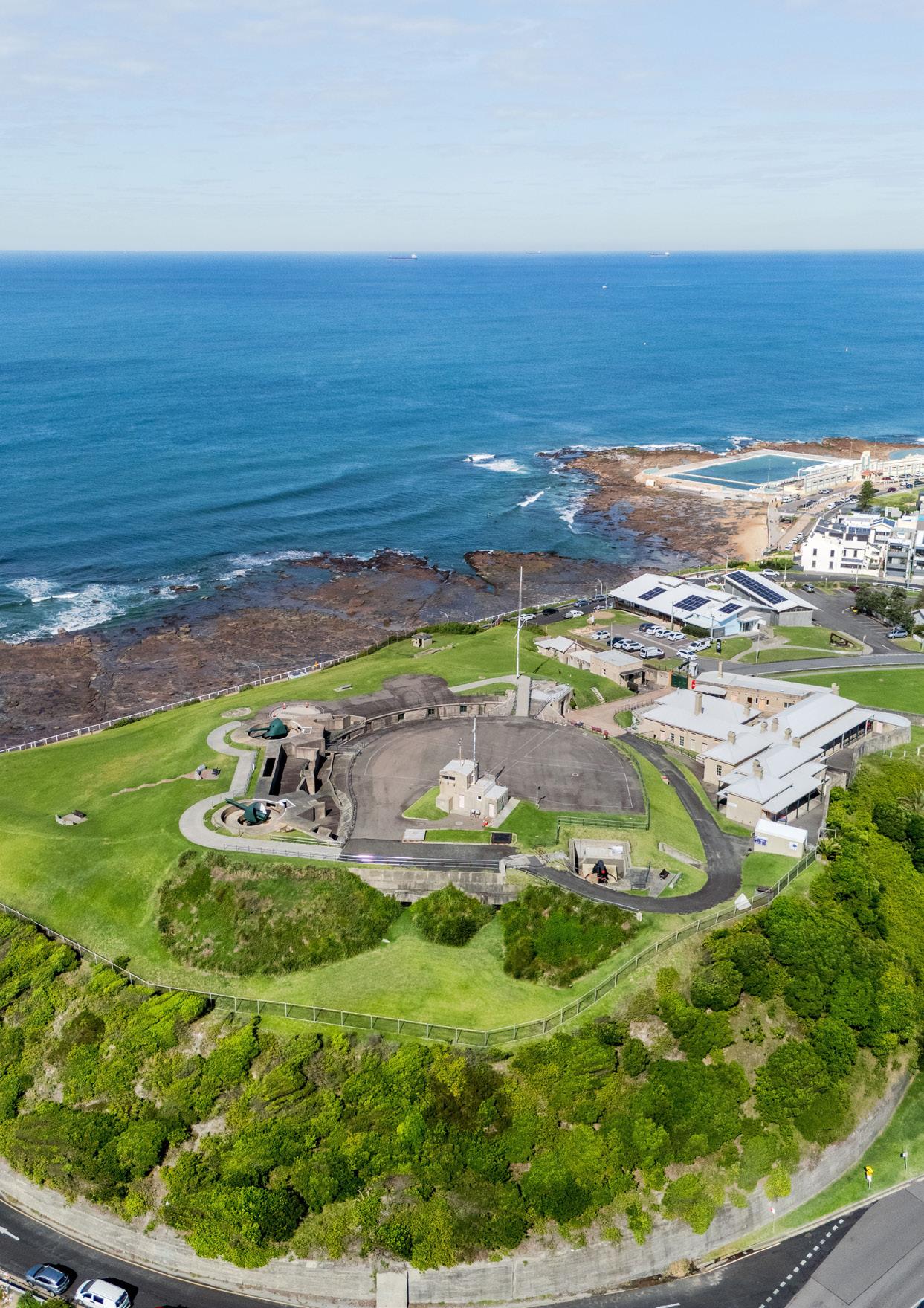
ABS Australian Bureau of Statistics
ADVOCACY The act of speaking or arguing in favour of something, such as a cause, idea or policy. In the context of the Strategic Priorities it refers to another sphere of government or organisation delivering a service or outcome for the city.
AES Aboriginal Employment Strategy
AGM Annual General Meeting
AMF Animal Management Facility
AO Officer of the Order of Australia
ARA Australiasian Reporting Awards
ASX Australian Securities Exchange Ltd
BAU Business As Usual
BENCHMARKING A process of comparing performance with standards achieved in a comparable environment with the aim of improving performance.
BIODIVERSITY The variety of all living things including plants, animals and microorganisms, their genes and the ecosystems of which they are a part.
CALD Culturally and Linguistically Diverse
CBD Central Business District
CEO Chief Executive Officer
CMP Coastal Management Program
COMMUNITY LAND Land classified as community land must be kept for use by the general community. All community land must be regulated by a Plan of Management, which may apply to one or more areas of land.
CN City of Newcastle
CREW Collaboration, Respect, Excellence and Wellbeing
CROWN LAND Land that is owned by the NSW Government but managed on its behalf by Council.
CSC Customer Service Centre
CX Customer Experience
DA Development Application
DELIVERY PROGRAM A strategic document with a minimum four-year outlook, which outlines the key strategies the organisation will undertake to achieve its desired outcomes. (Note: this is a legislative requirement.)
DIAP Disability Inclusion Action Plan
EA Enterprise Architecture
ELT Executive Leadership Team (CN’s ELT is led by the CEO and comprises four Directorates: Planning & Environment, City Infrastructure, Corporate Services and Creative & Community Services)
ERM Enterprise Risk Management
EV Electric Vehicles
FBT Fringe Benefits Tax
FINANCIAL YEAR The financial year we are reporting on in this annual report is the period from 1 July 2024 to 30 June 2025.
GIPA The Government Information (Public Access) Act 2009 (NSW), or GIPA Act, replaced freedom of information legislation.
GRS NSW Anti-Slavery Commissioner’s Guidance on Reasonable Steps
GST Goods and Services Tax
HMRI Hunter Medical Research Institute
HSR Hunter Street Revitalisation
IDE Inclusion, Diversity & Equity
IEI Inclusive Employer Index
IPART Independent Pricing and Regulatory Tribunal
IP&R Integrated Planning and Reporting
IT Information Technology
JO Joint Organisation
LATM Local Area Traffic Management
LGA Local Government Area
LGBTIQ+ Lesbian, Gay, Bisexual, Trans/Transgender, Intersex, Queer and other sexuality, gender and bodily diverse people
LOS Levels of Service
NAIDOC National Aborigines and Islanders Day Observance Committee
NCAT NSW Civil and Administrative Tribunal
NEWCASTLE 2040 COMMUNITY STRATEGIC PLAN
(CSP) The integrated CSP provides clear strategic direction for the long term, and identifies the main priorities, aspirations and future vision of the community.
NRLW National Rugby League (Women’s)
OAM Medal of the Order of Australia
OLG Office of Local Government
OPERATIONAL PLAN A document with a one-year outlook that outlines the key activities to be undertaken to achieve the desired outcomes set out in the CSP. (Note: this is a legislative requirement.)
PA Planning Agreement
PAMP Pedestrian Accessibility and Mobility Plan
PARTNERING A structured approach to working together with other parties to achieve a mutually beneficial outcome.
PDP Public Domain Plan
PERFORMANCE The results of activities and progress in achieving the desired outcomes over a given period of time.
PID ACT Public Interest Disclosures Act 1994
PPN Principal Pedestrian Network
PSC Port Stephens Council
RAAF Royal Australian Air Force
RAP Reconciliation Action Plan
REF Review of Environmental Factors
RISK MANAGEMENT A discipline for developing appropriate procedures to reduce the possibility of adverse effects from future events.
RSL Returned and Services League of Australia
RSPCA Royal Society for the Prevention of Cruelty to Animals
SAMP Service Asset Management Plan
SDGs Sustainable Development Goals
SMSC Stormwater Management Service Charge
SRV Special Rate Variation
SUMMERHILL Summerhill Waste Management Centre
SUSTAINABLE DEVELOPMENT Development that meets the needs of the present generation without compromising the capacity of future generations to meet their needs.
TAFE Technical and Further Education
TARGET A goal to be reached by a specific date, which may be higher than the forecasted performance. It aims to continually improve performance.
TRuST Transparent, Respectful, You, Simple, Timely
UN United Nations
UON University of Newcastle
WDSP Workforce Development Strategic Plan
WHS Work Health and Safety
WSL World Surf League
CN’s achievements in implementing its delivery program Local Government Act 1993 (Act) s 428(1)
CN’s audited financial reports
Statement detailing the action taken by the council in relation to any issue raised by the Anti-slavery Commissioner
Statement of steps taken to ensure that goods and services procured by and for the council during the year were not the product of modern slavery within the meaning of the Modern Slavery Act 2018
Environmental upgrade agreements entered into by CN
s 428(4)(a)
s 428(4)(c)
Report on activities funded via a SRV of general income Special Rate Variation Guidelines* 7.1
Amount of rates and charges written off during year Local Government (General) Regulation 2011 (Reg), cl 132
Information about councillor induction training and ongoing professional development
Details, including purpose, of overseas visits by councillors, CN staff or other persons representing CN
Payment of expenses of and the provision of facilities to councillors in relation to their civic functions
incurred by CN in relation to legal proceedings
Resolutions made concerning work carried out on private land
Total amount contributed or otherwise granted to financially assist others
External bodies and partnerships in which CN held a controlling interest (including whether or not incorporated)
Equal Employment Opportunity management plan implementation
cl 217(1)(a1) (i), (ii), (iii), (iiia), (iv), (v), (vi), (vii), (viii)
cl 217(1)(a4) & Act s 67, 67(2) (b)
cl 217(1)(a5) & Act s 356
cl 217(1)(a6)
cl 217(1)(a8)
cl 217(1)(a9)
Total remuneration package of CEO and senior staff Reg cl 217(1)(b)(i), (ii), (iii), (iv), (v) & Reg, cl 217(1)(c) (i), (ii), (iii), (iv), (v)
REQUIREMENT
Statement of total number of persons who performed paid work on Wednesday February 14 2024 Reg cl 217 (1)(d) (i),(ii),(iii),(iv)
Statement detailing stormwater management services provided Reg cl 217(1)(e)
Statement detailing coastal protection services provided Reg cl 217(1)(e1)
Activities in relation to Companion Animals Act 1988 and the Companion Animal Regulation 2018 Reg cl 217(1)(f) Companion Animals Guidelines*
Report on certain proposed capital works projects where a capital expenditure review has been submitted OLG Capital Expenditure Guidelines*
Compliance with the Carers Recognition Act 2010 Carers Recognition Act 2010, s 8(2)
Implementation of CN’s Disability Inclusion Action Plan Disability Inclusion Act 2014, s 13(1)
Particulars of compliance with and effect of planning agreements in force during the year
Disclosure of how development contributions and development levies have been used or expended under each contributions plan
Environmental Planning & Assessment Act 1979, s 7.5(5)
Environment Planning and Assessment Regulation 2021 cl 218A(1)
Details for projects for which contributions or levies have been used Reg 218A (2)(a),(b),(c),(d),(e),(f),(g)
Total value of all contributions and levies received and expended during the year Reg 218A(3)(a),(b)
Recovery and threat abatement plans
Details of inspections of private swimming pools
Information included on government information public access activity
Information included on public interest disclosure activity
Environment Planning and Assessment Regulation 2000, cl 35A
Swimming Pools Act 1992 (SP Act), s 22F(2) Swimming Pools Regulation 2018 (SP Reg) cl 23
Government Information (Public Access) Act 2009, s 125(1) Government Information (Public Access) Regulation 2018, cl 8, Schedule 2
Public Interest Disclosures Act 1994, s 31 & Public Interest Disclosures Regulation 2011, cl 4
newcastle.nsw.gov.au